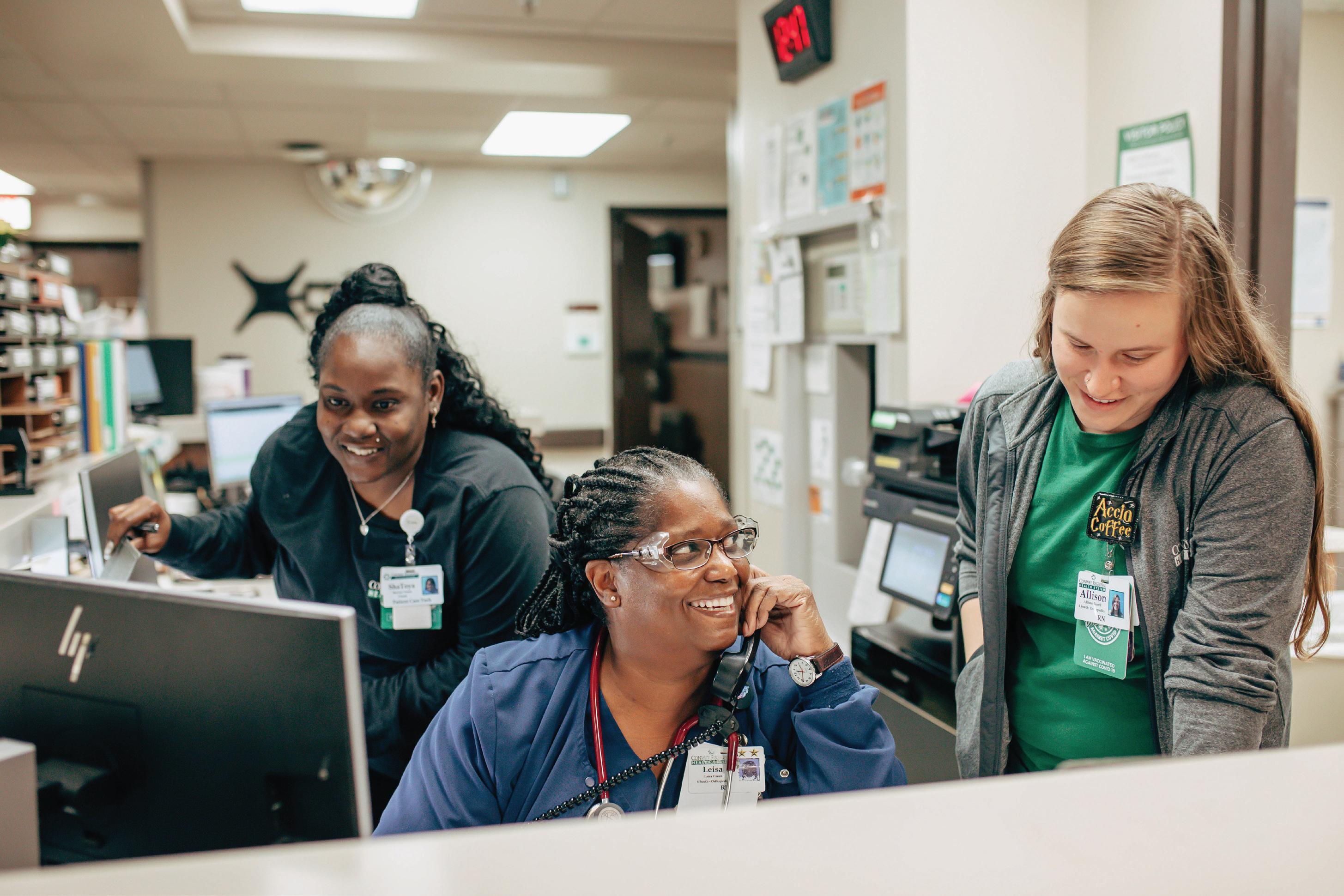DOCTORS NEEDED: STAT



DOCTORS NEEDED: STAT


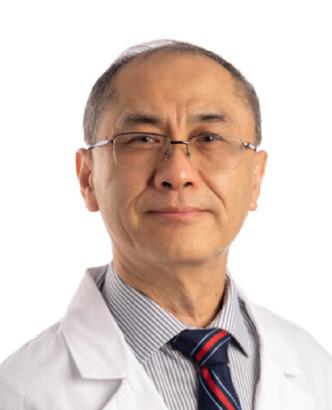
It is important to know that if you or someone you love has cancer, you have the combined expertise of Baptist Health and UAMS Winthrop P. Rockefeller Cancer Institute. The UAMS Baptist Health Cancer Clinic-Little Rock has a team of experienced cancer specialists working to create personalized treatment plans for each patient. Our providers collaborate to ensure complete care, including clinical trials that provide cutting-edge therapies not available anywhere else in Arkansas.

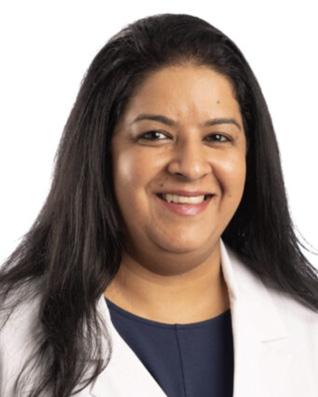

The UAMS Baptist Health Cancer Clinic on the campus of Baptist Health Medical Center-Little Rock is dedicated to providing comprehensive cancer care. This commitment ensures that every patient receives the highest quality, compassionate care and the best possible outcomes. Our partnership offers specialists with advanced training in all cancer types who coordinate with everyone on your care team. We strive to expand cancer services and resources to support all Arkansans facing cancer.

Great people, great service, and great products from companies like Siemens. This is how we create customers for life. One customer at a time.

Heating and Cooling
l Controls
l Air Distribution
l HVAC Equipment

l Parts
l NEBB TAB Service
l Mechanical





l Controls
l Boilers
l Chillers
Hospitals depend on a clean, safe, and comfortable environment for the health and well-being of their patients, visitors, and staff. As the state’s premier HVAC, controls, and service company, we have the people, the equipment, and the expertise to deliver systems for controlling infection and air movement, as well as maintaining ideal temperature, humidity, and indoor air quality.
877.274.7127
www.powers-hvac.com
In the fast-paced world of healthcare, where every second matters and patient care is paramount, having a reliable and efficient IT infrastructure is no longer a luxury—it’s an absolute necessity.














At Pinnacle IT, we understand the unique challenges faced by the healthcare industry, and we’re here to empower your organization with cutting-edge technology solutions that will transform the way you operate. With our expertise and unwavering commitment to excellence, we are your trusted partner in revolutionizing your IT.
What basic steps should you be following to make sure that your practice is protected?






As a rm built on relationships, our handshake matters. It means a warm greeting, the privilege of doing business together and knowing you can count on us. A handshake between two brothers, Witt and Jack Stephens, provided the foundation for a family-owned legacy that Jack’s son Warren upholds today. Under Warren’s leadership, Stephens continues to grow as one of America’s largest privately held independent nancial services rms, with of ces throughout the United States and in Europe. Our performance builds relationships with our clients, many of whom have become old friends. It’s why shaking hands with us means just a little bit more.

111 Center Street




Little Rock, AR 72201

(800) 643-9691









A NEW APPROACH
IS THERE A DOCTOR IN THE HOUSE?
As doctors and other health care providers in small towns and rural areas retire, communities are finding it hard to attract replacements.

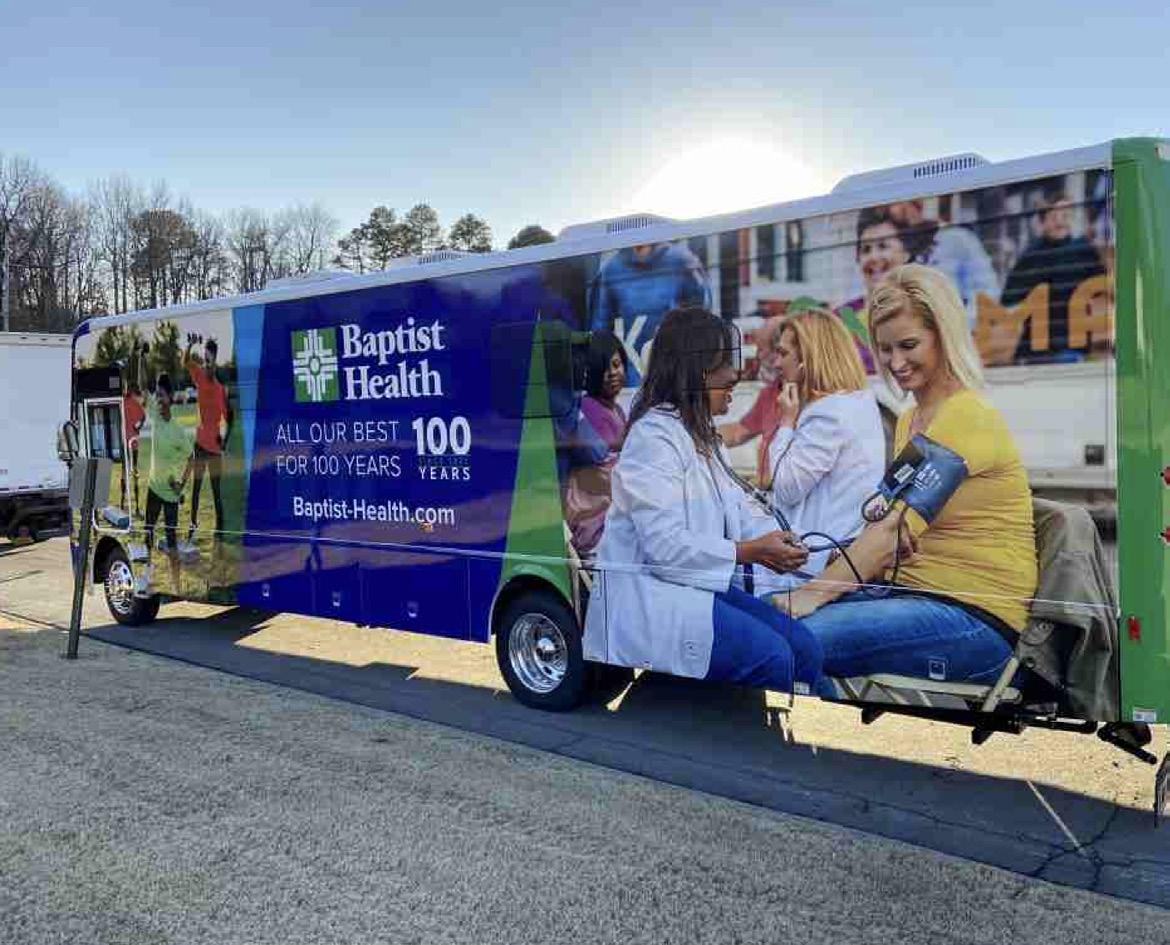
IS THERE A WELDER IN THE HOUSE?
Arkansas, like states across the country, has jobs but fewer candidates to fill them.
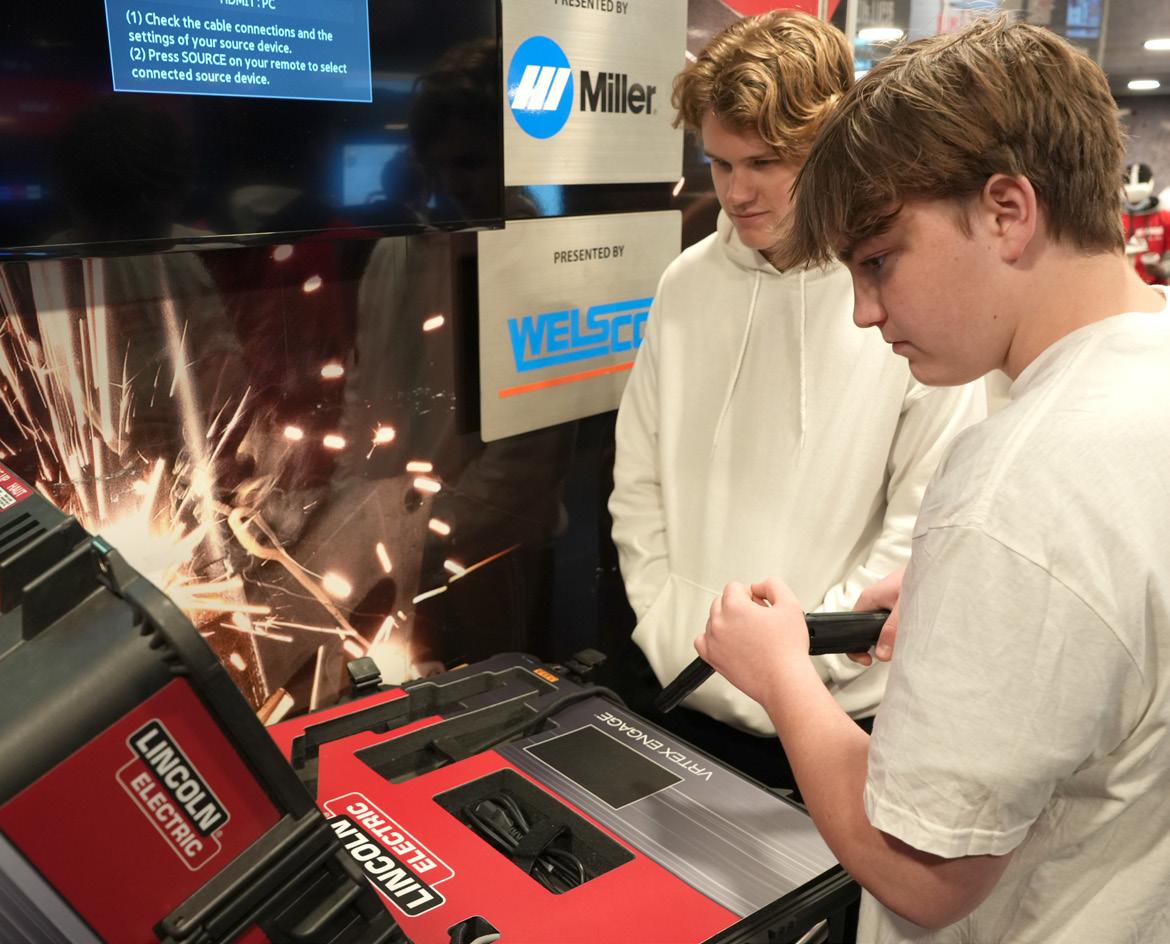
Only about 10 percent of American hospitals are awarded the prestigious Magnet designation for nursing. Arkansas is home to four of them.
Unity Health’s move into Jacksonville not only infuses life back into an old hospital building, but it also pumps some momentum into town.
CARTI has served cancer patients in Arkansas since 1976, and recently opened a state-of-the-art cancer surgery center on its main campus.
Dr. Anusha Jillella of UAMS Baptist Health Cancer Center spoke to AMP about the new infusion center on the Baptist campus in Little Rock.
Businesses are rethinking what it means to report to work. Many have found employees to be more productive and happy working remotely.
Earlier this year, Gov. Sarah Sanders named Mike Rogers the state’s first chief workforce officer. Rogers came into the job ready to roll up his denim sleeves. Little Rock developer John Flake has built more buildings and managed more real estate than even his prodigious memory can count.
PRESIDENT & PUBLISHER
Heather Baker | hbaker@armoneyandpolitics.com
EDITOR-IN-CHIEF
Dwain Hebda | dwain@armoneyandpolitics.com
SENIOR EDITOR
Mark Carter | mcarter@armoneyandpolitics.com
ASSOCIATE EDITORS
Sarah Coleman | scoleman@armoneyandpolitics.com
Mak Millard | mmillard@armoneyandpolitics.com
EDITORIAL COORDINATOR
Darlene Hebda | darlene@armoneyandpolitics.com
STAFF WRITERS
John Callahan | jcallahan@armoneyandpolitics.com
Katie Zakrzewski | katie@armoneyandpolitics.com
MANAGING DIGITAL EDITOR
Kellie McAnulty | kmcanulty@armoneyandpolitics.com
ONLINE WRITER
Kilee Hall | khall@armoneyandpolitics.com
PRODUCTION MANAGER
Mike Bedgood | mbedgood@armoneyandpolitics.com
GRAPHIC DESIGNERS
Lora Puls | lpuls@armoneyandpolitics.com
Jenna Kelley | jkelley@armoneyandpolitics.com
SENIOR ACCOUNT EXECUTIVE
Greg Churan | gchuran@armoneyandpolitics.com
ACCOUNT EXECUTIVES
Mary Funderburg | mary@armoneyandpolitics.com
Colleen Gillespie | colleen@armoneyandpolitics.com
Karen Holderfield | kholderfield@armoneyandpolitics.com
Dana Rodriquez | dana@armoneyandpolitics.com
Jona Parker | jona@armoneyandpolitics.com
EXECUTIVE ASSISTANT
As entrepreneurs juggle responsibilities and race between opportunities, more are struggling with how to cope and reporting mental health issues.
Jessica Everson | jeverson@armoneyandpolitics.com
ADVERTISING COORDINATOR
Bethany Yeager | ads@armoneyandpolitics.com
CIRCULATION
Ginger Roell | groell@armoneyandpolitics.com
ADMINISTRATION billing@armoneyandpolitics.com
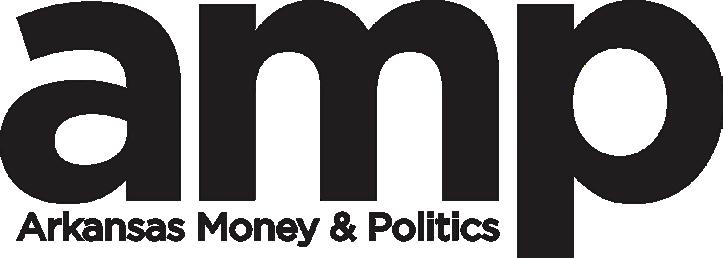
CEO | Vicki Vowell
TO ADVERTISE call 501-244-9700 email hbaker@ armoneyandpolitics.com
TO SUBSCRIBE | 501-244-9700
ADVISORY COMMITTEE
You voted; we report. Readers shared with AMP their choices for our annual Champions of Health Care, which recognizes top professionals and institutions.
Susan Alturi, Scott Hamilton, Tommy Keet, Bobby Martin, Shannon Newton
CONTRIBUTORS
Becky Gillette, K.D. Reep, DeWaine Duncan, Kenneth Heard, Douglas Hutchings, Jason Masters, Steve Spencer, Chris Wright
Mandy and T.J. Lawhon were the perfect couple to chair this year’s Arkansas Game and Fish Foundation Arkansas Outdoor Hall of Fame Banquet.
Following a roller-coaster 2022, Razorback fans are optimistic that the return of a top QB and RB, plus some portal prizes, could lead to a big ´23.
as individual circumstances vary. Products and services advertised in the magazine are not necessarily endorsed by AMP. Please recycle this magazine.
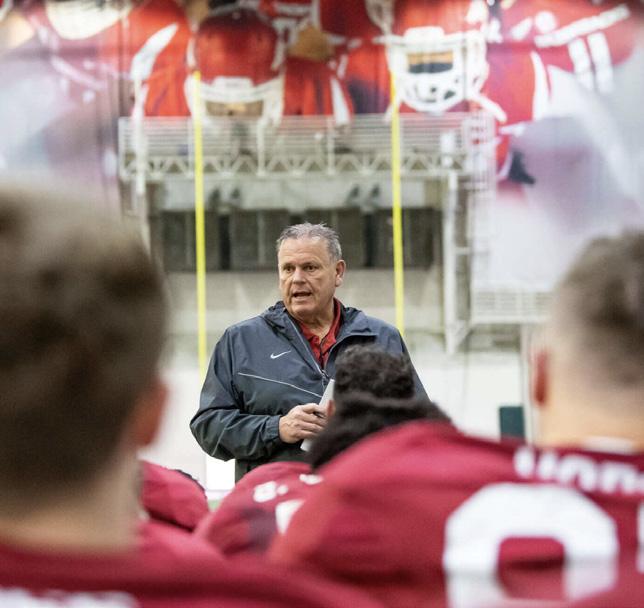




DOCTORS NEEDED:
Health care is the focus of the August issue, and AMP takes a look at the need for doctors and other health care professionals in rural parts of Arkansas.

Page 15
IS BENTON GETTING A BUC-EE’S?
“They are a fun place and think of the economic impact it could have for Saline County, I do hope we get a Buc-ees.”
Ann Justice McMahanKOENIGSFEST HIRED AS EXECUTIVE DIRECTOR OF BIG BROTHERS BIG SISTERS
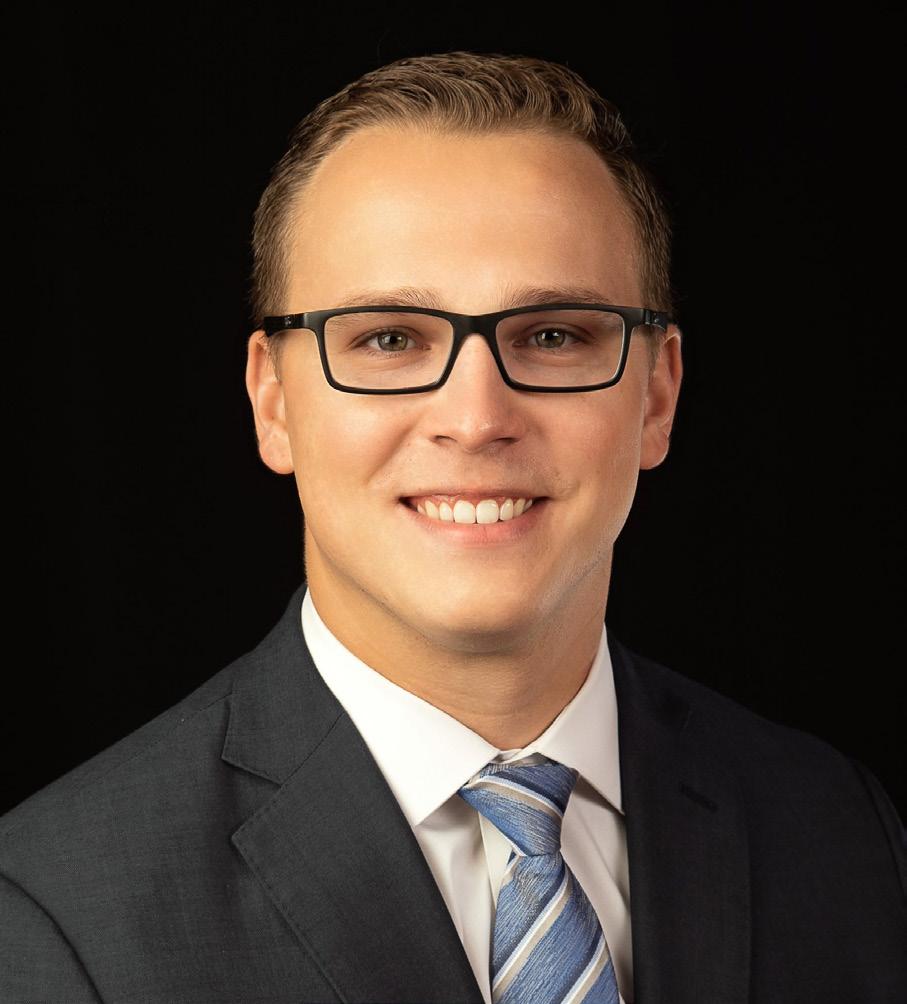
“Congratulations Kristin!!!”
Sonya Campbell
JOHNELLE HUNT PLEDGES $250K TO UAMS NORTHWEST REGIONAL
“Such a sweet lady. Glad she is in a position to help others and hope this inspires all of us to lift each other up.”
Branden LeeCARESOURCE PASSE WELCOMES LAWSON AS DIRECTOR OF PHARMACY
“Congratulations Jessica Lawson”
Nicki BarnesTUGGLE RECEIVES 2023 JUDY LOVE ALUMNI ACHIEVEMENT AWARD
“Congratulations to an amazing woman in business and life, Cathy Tuggle!!”
Rochelle LedbetterSOUTHERN TAIL BREWING BREAKS GROUND AT SITE OF FUTURE BREWERY
“Thank you, AMP!! We’re so excited and happy to be progressing on this awesome project!” Southern Tail Brewing
July 4 – August 4
5
7
The calendar may turn each January, and fiscal years refresh in July, but brass-tacks reality reminds us that August is the functional new year for many of us.
In addition to the annual humidifier, August delivers a scholastic preseason of open houses, orientation and registration. In other words, summer’s last hurrah before Academia reclaims the podium. For parents, August indeed is the starting line to a race that resets each May for the better part of two decades and culminates, ultimately, in a bittersweet gut punch.
A scene in the 2016 animated fable, “The Red Turtle,” serves as reminder for this August rite of passage.

The film’s a strange one, no doubt, but it’s unique animation alone is worth a watch. And though you won’t hear any dialogue over its 80-minute runtime, the absence of vocal clutter enhances the story’s message. Language was a necessary gift, but communication is most effective when simply conveyed. A look, a smile, a nod. Here, adrift in this 21st century pop-culture yelling match, we’ve forgotten the lesson of Less Is More.
The film opens to a shipwrecked pro-
tagonist, alone on an Eden-like island, whose attempts to leave are thwarted by a giant red turtle. Eventually, the
sea-framed horizon.
Ultimately, symbolic August dawns and the son, transformed seemingly in an instant from romping toddler to idling young adult, recognizes his own path ahead of him.
And grieving parents let him go.
There’s much more to take from this quiet, resonating tale. But Less Is More, and all.
unlikely antagonist transforms into the castaway’s Eve and soon, a son is born. The boy is raised in a state of bliss; the island and surrounding sea provide everything the family needs to survive in comfort, if only its members are willing to put in the work. No moment is left not fully savored; every ounce of satisfaction is squeezed from the fruits of their lives together.
One scene stands out: Father and young son romping carelessly across a late-afternoon hillside meadow, laughing and soaking up a sun set to dip all too soon below the linear perfection of a
As painful as letting go can be — whether it’s nudging your first-born into the classroom on the first day of kindergarten or sending them off to a first job multiple states away — all is right with the world when we find the strength to let go at the proper time.
Blind faith is at a premium these days, especially where kids and schools are involved. Thus, a simple reminder on the cusp of August: hug your kids this month as you send them off to school. Savor every moment, and then hug ‘em some more. Romp across the meadow.
And don’t be afraid to take that bittersweet gut punch when it’s time for them to leave the island.
By Heather BakerOf all the industries we cover in AMP, health care may be the one that impacts all of us the most. And while we have a healthy buffet of stories to tell in this month’s issue, the focus for AMP in August is health care.
Inside, we’ll visit the Alice Walton School of Medicine, under construction in Bentonville. Though this new medical school will adopt a different and holistic approach, its launch will help address an urgent need in Arkansas and get more health care providers where they’re needed.
We also talk with the leadership at CARTI, which recently opened its new CARTI Surgery Center in Little Rock. The new facility offers extended stay for cancer patients as well as the renowned da Vinci surgical robots. Its opening has raised the
bar for cancer treatment in the state.
The folks at UAMS and Baptist Health, two of the state’s most trusted names in health care, are among the providers meeting that bar. The UAMS Baptist Health Cancer Center opens its new infusion center on Sept. 1, and inside we chat with Dr. Anusha Jillella, who will lead it.
We’ll investigate health care “deserts” in Arkansas and efforts underway among providers to deliver access to isolated areas of the state that need it. Plus, we’ll look at the state’s Magnet hospitals and Unity’s much awaited entry into the Jacksonville community.
As always, there’s much, much more. Hit me up with your questions or story ideas at HBaker@ARMoneyandPolitics.com.
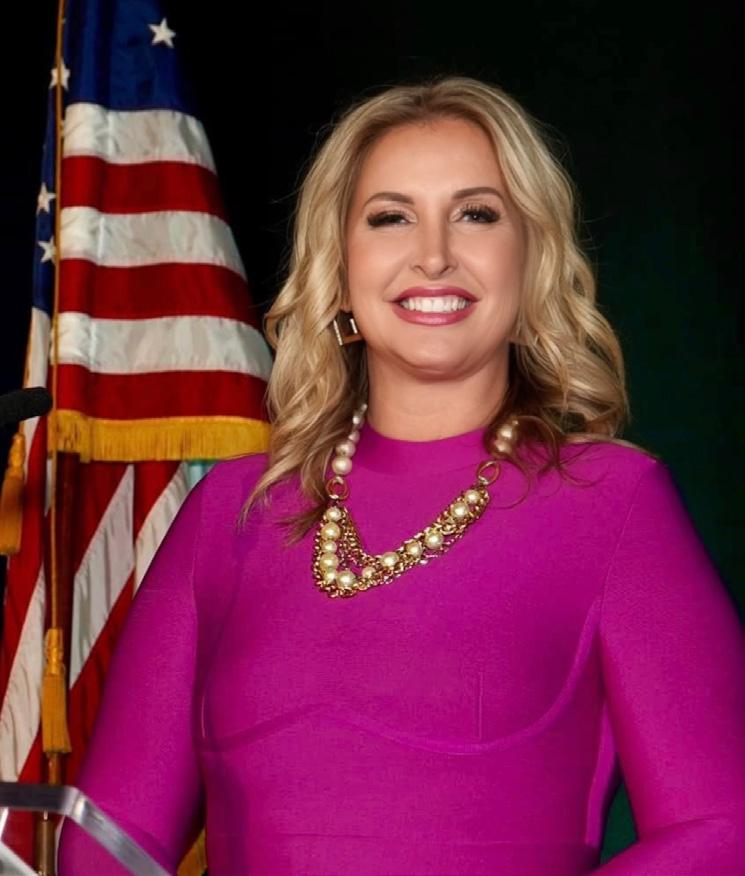
Gone are the days of floppy disks, dial-up modems and flash players. So why would these antiquated or obsolete technologies still be covered in an organization’s cybersecurity policies? If I ask a company how it is protecting its digital systems, and the team drags out a dustcovered, three-inch binder of protocols, it begs the question, “What’s even the point?”
Far too often, I see organizations that view cybersecurity as a necessary evil. They believe these practices are burdensome items on their to-do lists, only needed for government compliance. This adversarial mindset toward proactive cyber hygiene can put entities at risk for breaches or attacks. As I’ve witnessed, this leeriness can also result in stalled or uninformed responses if or when incidents occur.
Understandably, the health care industry recognizes and is inundated with cybersecurity concerns. Whether multi-state providers or specialty clinics, these entities have access to sensitive, personal information. That makes them a treasure trove for potential attackers. Yet even they can be guilty of only doing the work to check the compliance box, especially when expanding beyond the Health Insurance Portability and Accountability Act (HIPAA).
In some cases, health care organizations believe or have been counseled incorrectly only to deploy the cybersecurity protocols needed to meet basic government regulations. Thinking they’ve got their bases covered, they don’t strengthen or tailor their tactics to address potential gaps or risks within their companies. And that leaves them — and the patients and families they serve — vulnerable.
Fortunately, health care entities don’t have to decide between compliance and risk management. They can adopt mandated practices and invest in cyber hygiene. The key to shifting from this either-or mentality to a strategic approach is to recognize these following cybersecurity truths.
Compliance is a baseline. In health
care and other heavily regulated industries, compliance is often confused with security. Compliance is the minimum. Take HIPAA or the Health Information Technology for Economic and Clinical Health (HITECH) Act as examples. These regulations are starter packs, pointing entities in the right direction about what protocols or recognized security practices to consider. Organizations should conduct risk assessments to modify, shape and strengthen these tactics to address their specific threats.
HIPAA isn’t the be-all and end-all of cybersecurity practices. HIPAA was signed into law nearly three decades ago. Since then, technology has dramatically changed, leaving some cybersecurity-related regulations woefully outdated. Because it takes an act of Congress to update, these issues aren’t always addressed. These discrepancies and the law’s unwieldy language can lead to confusion among health care entities over what practices to implement.
Cybersecurity templates don’t cut it. A simple Google search will confirm how easy it is to download and edit a cybersecurity policy document. The jargon and legalese may make it sound appealing, but these templates offer health care organizations little to no protection against cyberattacks or breaches. That’s because these standardized documents can’t cover every risk for every industry. Entities should determine their pain points and develop custom strategies to fill those potential gaps. Essentially, they should ask themselves, “What threats exist within our organization, and what practices can we implement to protect ourselves?”
Cybersecurity requires time and effort. Establishing and maintaining a strong cybersecurity posture requires organizational buy-in and support. Surprisingly, a fair number of breaches occur due to internal process failures. For example, say an employee is tasked with contacting patients to communicate care or billing information. Without direct oversight or internal quality
assurance, she sends a mass mailing with a spreadsheet attached. The result is that personal health information is inadvertently distributed and must be reported as a breach.
Organizations can prevent incidents like these by better planning, documenting and strategically executing their cybersecurity processes.
Effective cybersecurity is a process. Cybersecurity documents should be concise, well-understood and regularly reviewed by key staff members. They aren’t designed to sit on a shelf or in a filing cabinet. The longer they languish, the more time it takes to revamp them. Health care entities should update their processes annually or as organizational changes occur. Often, all it takes is 30 minutes of minor tweaking to ensure the policies reflect the current organizational structure and security landscape.
I often say, “You can’t put a screen door on a submarine and not expect it to fill with water.” Sure, it’s a protective barrier, but it wasn’t designed to stop water, nor does it meet your specific needs in this case. The same goes for cybersecurity. For the health care industry, checking the boxes to avoid government penalties has long been the modus operandi. But complying with federal regulations is only one piece of the puzzle. Instead, health care entities should take a strategic approach — balancing compliance with risk management — to safeguard their systems and those they serve.
Christopher Wright is co-founder and partner at Sullivan Wright Technologies, an Arkansasbased firm providing tailored cybersecurity, IT and security compliance services. For more information, visit SWTechPartners.com.
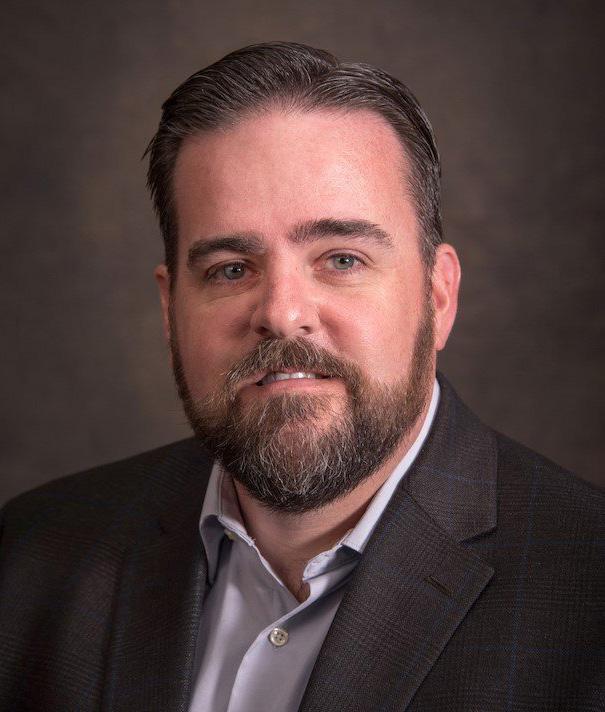
If you’re reading this, I assume that you either know a business owner, or you are one yourself. If that’s the case, I need to sound the alarm on a big problem: the statistical odds of your business surviving are not good. In fact, for small businesses in the United States, only 20-30% are successfully transitioned past the initial startup generation. You heard that right. When you decide that you want to sell your business, the cards are often stacked against you. This staggering rate of failure comes down to the fact that the average business owner is typically very good at running their business, but almost never spends the necessary time to make a real exit plan.
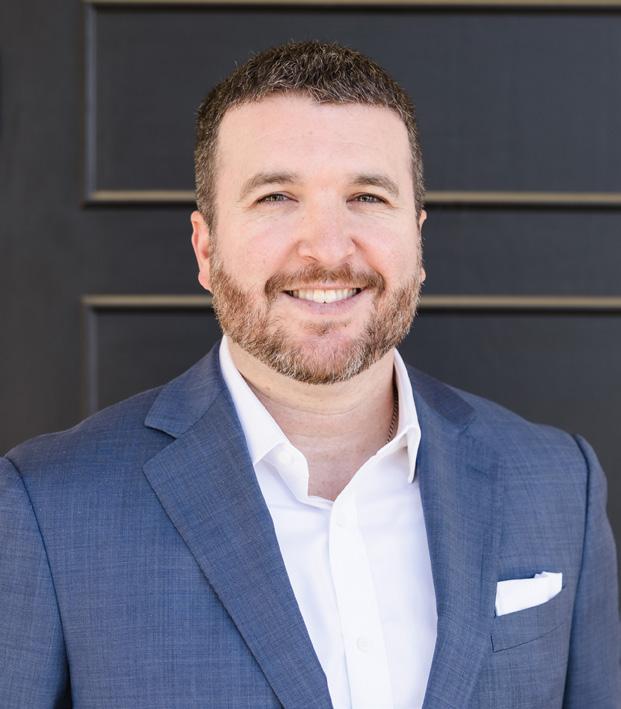
I hear business owners every day who tell me that they are confident that their business is “worth a lot of money” and that “the right buyer will come along at the right time.” But the fact is, even if the right buyer shows up, the business itself may not be ready to sell. Owners underestimate the amount of work that needs to be done to prepare a business to sell – especially if they plan to sell to a third party. No one in their right mind wants to buy a business that will wither overnight once the seller walks away; if your potential buyer is not convinced that your business can live without you, any potential deal is likely dead on arrival.
Unfortunately, most small businesses just aren’t spending the right amount of time preparing the organization to exist after they are gone. In fact, most owners spend a lot of time making their entire team more dependent on them. One way to see where you stand? Take a good, hard look at your team. Could you do each of their jobs better than they can? If the answer is yes, then you have either hired the wrong people or you have failed to train the right ones. To put it bluntly: you cannot be the central hub if you expect to step away one day.
You might say that you will sell your business to a family member instead, and that’s a fantastic thing to do – one that requires an even more stringent plan. Now, you’re not only preparing the business to function in your absence, you’re preparing your team to transition to new leadership under a person who, up to that point, they’ve likely seen more as a friend or peer than a boss.
Think about it: who wants to work for the kid that used to run laps around the office when mom or dad brought them to work? I’m not saying that the family member isn’t capable – although many will take over businesses they aren’t prepared for – but overcoming that psychological hurdle is an essential part of the exit planning process.
My point is this: don’t treat your exit as something that will take care of itself. The odds are that this business is your largest asset by a wide margin, so don’t leave things to chance. Take care of your business, and take care of the people who work there. Have a plan and write it down. Get input from others. Make changes as you gather more information. Hire a professional who knows how to do this, and listen to their advice.
If you approach exit planning with the same passion and attention that made your business successful in the first place, you and your business have a good chance of succeeding where many others have failed.
Victor Werley CFP, ChFC, CDFA, CVA, MAFF, CFE, CEPA is a financial consultant in Little Rock and the founder of Pinnacle Advisors. Werley has been practicing for over 20 years and has managed hundreds of business transitions for himself and his clients. He has spoken to numerous groups in the business and legal fields about business valuation, how to structure good business deals, and many other topics. He is passionate about small businesses and helping the

Iam a big fan of stories, and I find myself thinking about the type of stories that I remember. My hope is that the things that hook my attention incorporate something that I can repurpose to help motivate others. One, in particular, that has always stuck with me is the CFO asking the CEO, “What happens if we invest in developing our people and they leave?” to which the CEO responds, “What happens if we don’t, and they stay?”
Most successful enterprises invest in their people. Generally, it is good for the bottom line to recruit strong talent and invest in those already within.
This is absolutely true for the business of research.
Innovation and economic growth are inseparably linked to research. The investment made in research and development (R&D) not only drives technological advancements, it creates whole new industries. Pioneering research in pharmaceuticals has led to breakthroughs that have eradicated or controlled once-deadly diseases like polio, smallpox and more recently, provided rapid responses to global health crises such as the COVID-19 pandemic.
Beyond the health sector, research has transformed the way we communicate effectively (or don’t) with one another. Research talent is our primary tool to overcome global challenges, whether they are health-related, environmental or social. The value of research extends far beyond patents and products; it’s a tool for unlocking human potential and building a more resilient, prosperous future. Investing in research talent is investing in the solutions, innovations and opportunities that shape our world.
Exploring how others are recognizing this opportunity is instructive. For instance, in 1990 a group of Georgia leaders established the nonprofit Georgia Research Alliance (GRA) to help business, research universities and state government collaborate to build a technology-driven economy fueled by breakthrough
university research. The GRA is connected to Georgia’s research universities, including the University of Georgia, Emory University, Georgia State University, Georgia Tech and others.
The goal set by GRA was ambitious: attract some of the world’s most brilliant scientists to establish new programs of research and development at affiliated Georgia institutions. The focus would be in areas with the most potential for generating new companies and creating new science and technology jobs. I recently had an opportunity to visit several of their eminent scholars and distinguished investigators to learn more about how the programs translate to tangible local impact.
The result of these meetings were personal stories that help add context to the $11,700,000,000 (yes, measured in billions!) of economic impact in Georgia attributed to investment in these individuals over 30 years. It is interesting to note that roughly 10 percent of the ROI is attributed to the last year reported. These are investments with returns that accumulate over time and where outsized value accrues to those who invest early.
The Arkansas Research Alliance (ARA) was established in 2008, modeled after GRA. Last month in this column, Bryan Barnhouse, ARA president and CEO, provided insight into the impact of ARA activities based on a third-party evaluation that is underway. The full report will be released soon.
The goal in establishing ARA and GRA is similar — advancing the states’ economies — but the methods to accomplish the goal are tailored to the unique environments in which the researchers operate. Both organizations work alongside research institutions to provide strategic investments into human and infrastructure capital. ARA efforts include supporting the translation of research to the private sector through industry engagement and/or new company formation along with working to facilitate collab-
orative research across disciplines.
This is complemented by investing in the soft skills of our researchers to help ensure they can convey the importance of their work in venues like Arkansas Money and Politics

I am reminded of an oversimplified explanation of the venture capital model. In many ways, the goal is to find a machine where you can put in a dollar and get more than a dollar back in return. Once the model is proven scalable, you generally work to stuff as many dollars into the system as possible. We know that investing in Arkansas talent has a compelling multiplier, and we know the model has been proven to scale well. The question then is,
This is a question that cannot be answered in a vacuum. However, after this visit to GRA and sneak preview of ARA’s impact report, I find myself with a very tangible view of what is possible. The competitive side of me knows that Arkansas can accomplish the things we make a priority as well as anyone else in the world.
Douglas Hutchings was named the ARA Academy’s first director in July 2019. A graduate of Hendrix College in Conway, he holds a master’s and Ph.D. from the University of Arkansas, and is widely known for his active leadership in the state’s entrepreneurial community. Working closely with noted entrepreneurship educator Carol Reeves at the U of A, he founded a solar energy technology company and has mentored countless startup teams. His unique status as a citizen of both the business and academic communities brings authenticity, experience and vision to his important leadership roles.
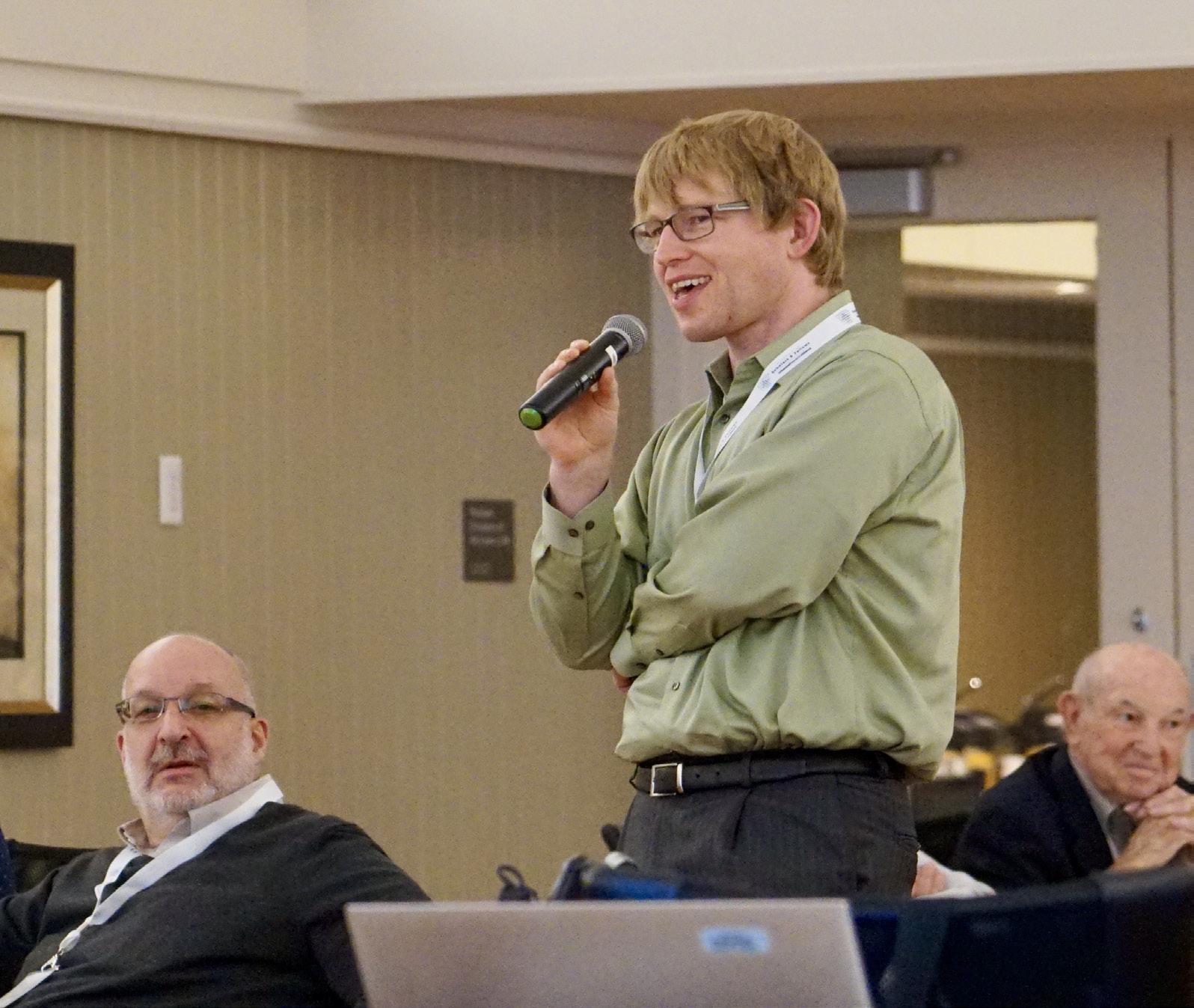
“Most successful enterprises invest in their people. Generally, it is good for the bottom line to recruit strong talent and invest in those already within.”
- Douglas Hutchings
Since






They
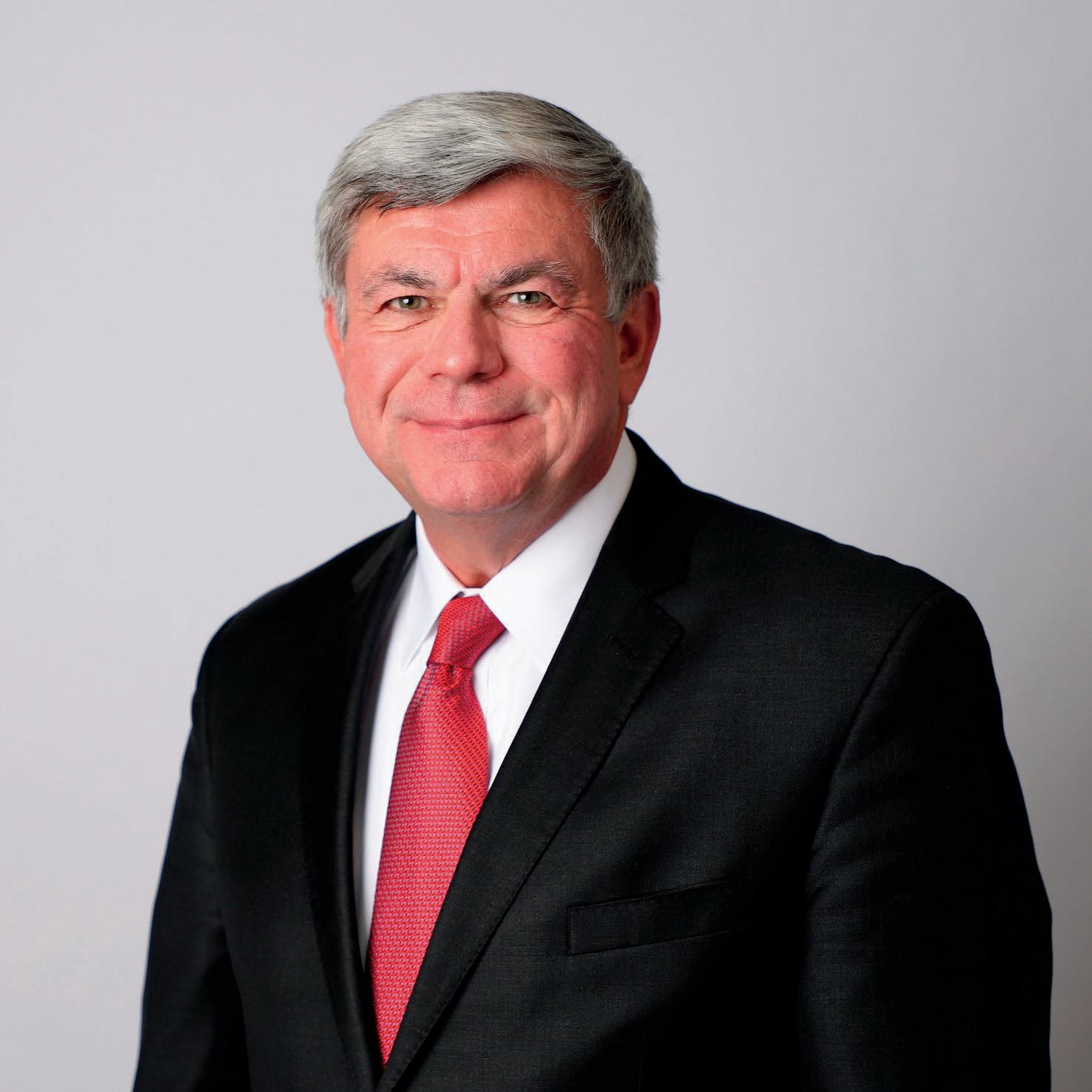
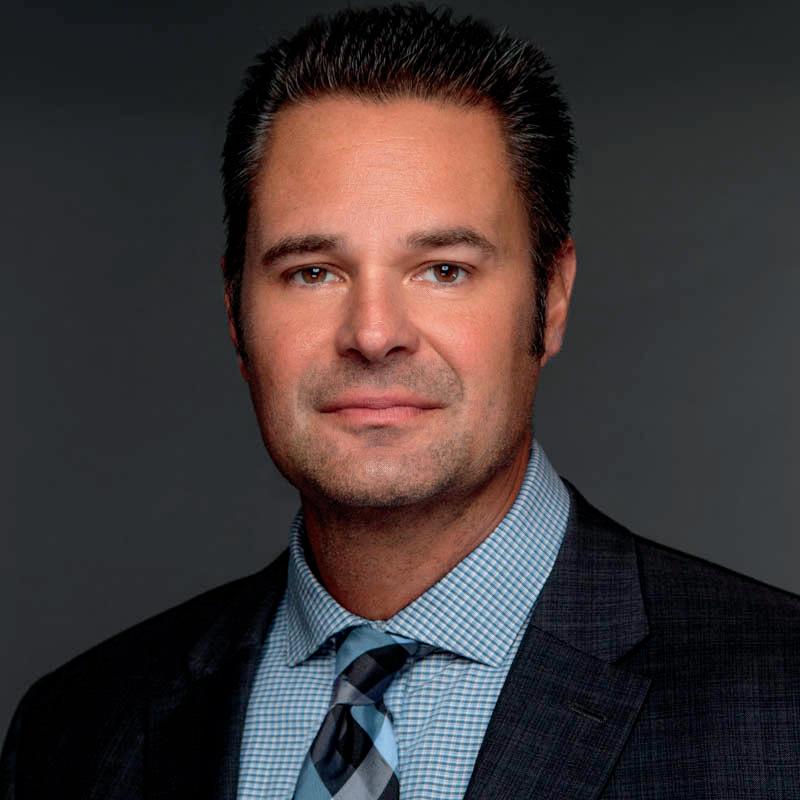
20 23
It’s conceivable for a person in this age of technology to subsist without many modern necessities. Insurance, banking, education... Not easy, nor advisable. But conceivable. There’s one industry, however, that impacts us all, whether we want it to or not: health care. It’s at the crux of what it is to be human. At some point, even hermits living truly off the grid will have to self-administer health care in one form or another.
In its August issue, AMP looks at health care in Arkansas — how leaders are working to fill in the gaps in health care coverage that turn rural areas into “deserts”; the growth of cancer care in the state at institutions like CARTI and the partnership between UAMS and Baptist Health; what to expect from the Alice L. Walton School of Medicine taking shape in Bentonville; a list of administrators at the state’s largest hospitals, and much more.

The new Alice L. Walton School of Medicine under construction in Bentonville next to the Crystal Bridges Museum of American Art goes by the acronym AWSOM. It is a particularly apt abbreviation because Walton’s vision for transforming medical school training to be healthier and more holistic for students and the people who will become their patients, some might say, is nothing short of awesome.
Walton’s ambition to launch a medical school that will offer a four-year M.D.-granting program was based on her own personal health care experiences that led her to consider a whole-person approach to care to complement traditional allopathic medicine. If her success with the renowned Crystal Bridges is any indication, AWSOM could play a critical role improving medical training and patient health in Arkansas and far beyond.
Walton said Northwest Arkansas is unique in its entrepreneurial spirit, focus on quality of life, natural resources and thriving art scene.
“This campus will bring together nature, art, innovation and well-being to create an inspiring environment for learning,” Walton said.
AWSOM has assembled an impressive group of staff and faculty to lead the school, which plans to open its doors to its first 48 students in 2025, pending accreditation. Founding Dean and CEO Dr. Sharmila Makhija is an international expert on gynecologic cancer who most

recently served as the department chair of obstetrics & gynecology and women’s health at the Albert Einstein College of Medicine and Montefiore Health System in New York. She has also held faculty positions at the University of Pittsburgh, the University of Alabama at Birmingham, Emory University and the University of Louisville.
Makhija said what will distinguish AWSOM is building upon foundational sciences and clinical practices with a compassionate, inclusive and whole-health approach to care.
“What sets us apart is this community and our unique curriculum,” Makhija said. “The curriculum will be rooted in self-care, teaching students to support their own mental, physical, social and emotional health. We are practicing what we teach in that the school embraces a culture of well-being with offerings such as health coaching for students, allowing them to learn to care for patients and their own well-being. We will transform how health care is taught and delivered by proactively

THIS CAMPUS WILL BRING TOGETHER NATURE, ART, INNOVATION AND WELL BEING TO CREATE AN INSPIRING ENVIRONMENT FOR LEARNING.
— Alice Walton
supporting all aspects of a person’s care. The goal is to promote resilience, prevent disease and restore well-being.”
Makhija said graduates of the school will be well-positioned as physicians of the future, increasing the number of health care providers in an era of industry shortages. There are also significant economic benefits from decreasing chronic conditions while increasing physical and mental well-being. Another important objective is attracting top talent, creating a pipeline for more health care leaders and keeping health care dollars in the region.
The campus sits on 14 acres located next to its sister organization, the nonprofit Whole Health Institute, and is adjacent to Crystal Bridges as well. WHI has the same founder and a similar mission. Its focus is on research, advocacy and partnering with health systems to create a delivery framework that focuses on prevention and is financially sustainable. Another goal is working with communities to share resources and activate systemwide changes and healthy behaviors.
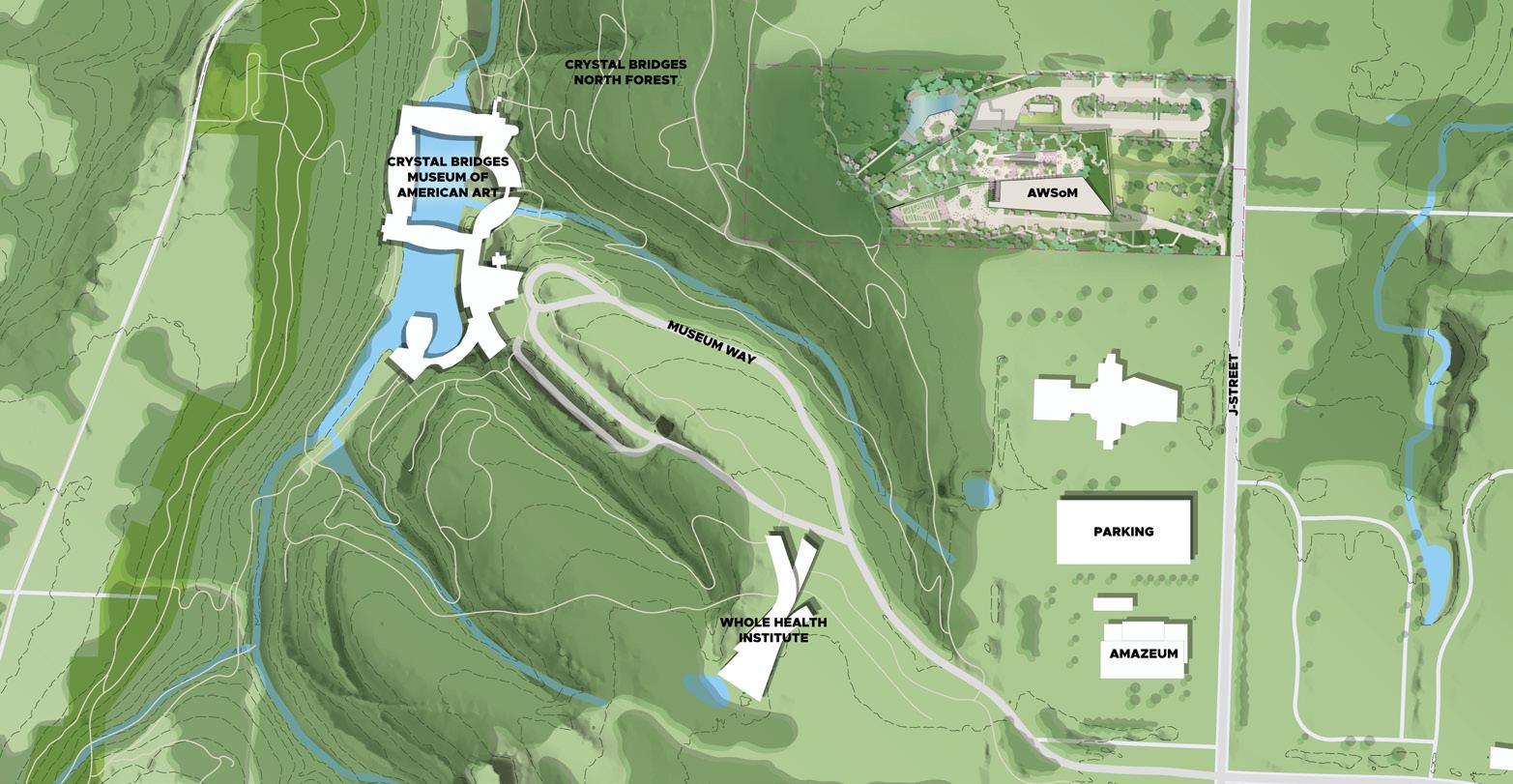
“Starting in Northwest Arkansas first, we hope to build and pilot whole health programs and resources through the School of Medicine and the Whole Health Institute that impacts this region and beyond,” said WHI President Walter Harris. “The goal is to share learnings and serve as a model for how whole health approaches can work in other regions.”
As president of WHI, Harris oversees
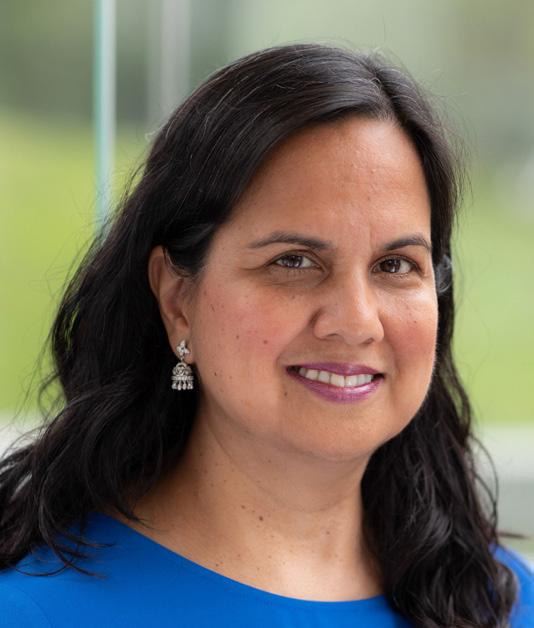
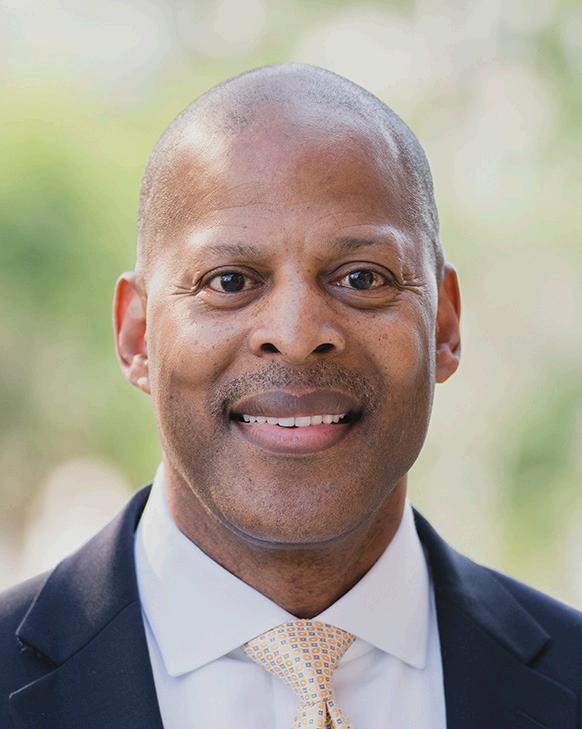
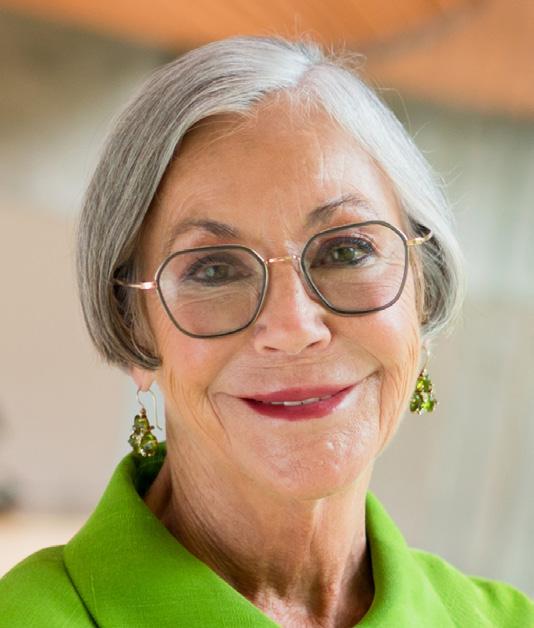
operations for health care transformation initiatives for Alice Walton’s nonprofits including AWSOM. Harris most recently served as senior vice president of administration and finance at the Kaiser Permanente Bernard J. Tyson School of Medicine in Pasadena, Calif. Prior to that role, he served as vice president and chief operating officer at the George Washington School of Medicine and Health Sciences, as global COO for the Food and Drug Administration, as chief management official for the Centers for Disease Control and Prevention and as chief information officer for the Department of Housing and Urban Development. He also held positions within the Veterans Health Administration.
In addition to significant public interest in a whole person approach to care, there is an urgent need for transformation. The U.S. has the lowest life expectancy at birth, the highest death rates for avoidable or treatable conditions, the highest maternal and infant mortality and among the highest suicide rates, according to “Commonwealth Fund, US Health Care from a Global Perspective, 2022: Accelerating Spending, Worsening Outcomes.” Regionally, Arkansas ranks 48th out of 50 states for overall health, according to the Arkansas Center for Health Improvement and Annual America’s Health Rankings Report.
Currently, the Walton School of Medicine is focused on seeking programmatic and institutional accreditation and hiring a team to develop the curriculum further.
The curriculum will be evidence-based, building on conventional medical teachings to include a whole person approach, teaching students about how food and nutrition impact health. In order to build on conventional medicine with an inclusive, whole health approach, there will be a focus on care delivery, interprofessional collaboration, caring for diverse populations, public policy and how to navigate and solve systemic health issues.
The program will be delivered using diverse modalities and active learning methods such as case-based learning and small group activities. In addition, there is a commitment to advancing medical education through technology. AWSOM will have a state-of-the-art facility with a simulation center. Curriculum is being developed exploring features like expanded reality, 3-D printing, artificial intelligence and machine learning. Students will be introduced to electronic medical records early in their education.
Groundbreaking for the project, which includes a 154,000-square-foot medical building, was in late March. The architecture firm, Polk Stanley Wilcox based of Fayetteville and Little Rock, is part-
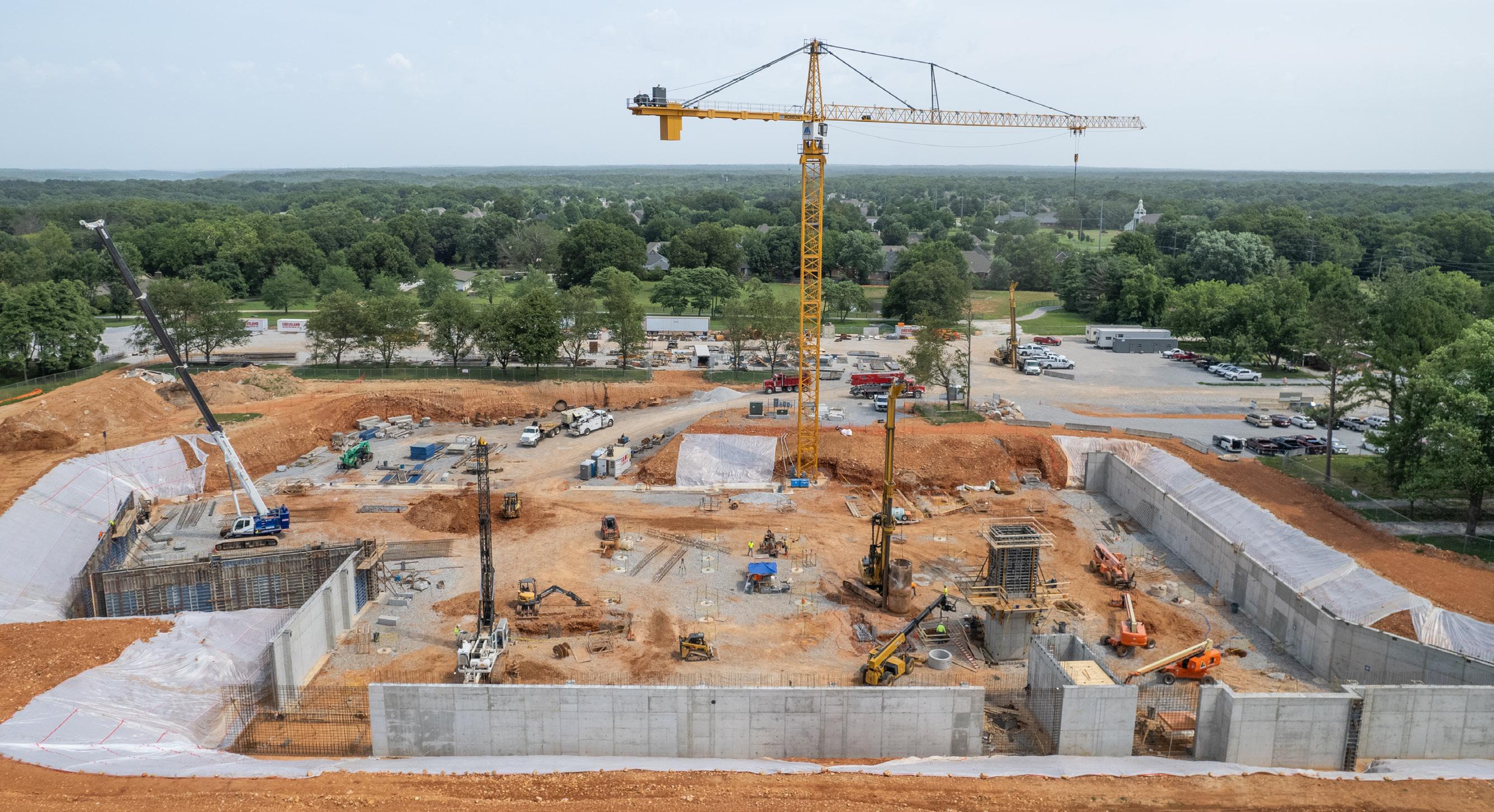
nering with OSD, a design firm based in New York, on the project. Indoor spaces will include classrooms, four simulation suites, a library, 12 clinical exam rooms, administrative offices, a student lounge, recreation areas, 18 group study spaces and underground parking. Outdoor features include meditation areas, foraging and healing gardens, a wetland, outdoor classrooms, an urban farming space, and a two-acre rooftop park that connects to balconies, a cafe and an amphitheater for students and the community at large.
AWSOM has hired about 35 employees including vice deans and assistant deans. Makhija said each brings new perspectives toward the vision to advance medical education by creating a physician of the future who is focused on whole person health.
“I am thrilled to welcome this diverse and dynamic team of AWSOM leaders who are passionate professionals with storied careers educating students and improving care delivery,” Makhija said.
In the coming months, AWSOM will focus on recruitment with the goal of hiring 150 full-time employees by the school’s opening, she said.
STARTING IN NORTHWEST ARKANSAS FIRST, WE HOPE TO BUILD AND PILOT WHOLE HEALTH PROGRAMS AND RESOURCES THROUGH THE SCHOOL OF MEDICINE AND THE WHOLE HEALTH INSTITUTE THAT IMPACTS THIS REGION AND BEYOND
— WHI President Walter Harris.Construction on the Walton medical college as of July 26.
 By John Callahan
By John Callahan
n some ways, Arkansas punches far above its weight in terms of health care, with institutions standing at the forefront of research and at times performing some of the most advanced treatments in the world. Despite this impressive record, The Natural State consistently ranks among the lowest in the nation for health care; US News & World Report ranks Arkansas at No. 45. While high-quality health care exists in the state, one of the main challenges faced by Arkansans is a lack of access to that care. Areas where sufficient care is inaccessible are known as medical or health care deserts.
A health care desert can stem from various root causes. Rural areas, which are home to 41 percent of Arkansas’ population, may lack enough doctors or the economic foundation to keep a hospital running. Alternatively, deserts can exist in urban areas where infrastructure is lacking, as in the case of hospitals with too few beds to support the size of the population. But the rural makeup of Arkansas makes the former causes more prevalent.
“We have 75 counties and about 24 of them, so close to a third, do not have a hospital within their boundaries,” said Shashank Kraleti, M.D., chair of the Family Medicine Department at the University of Arkansas for Medical Sciences (UAMS). “An additional 50 percent that do have hospitals have less than 100 beds. Close to 25 percent of counties do not have good access to primary care, and close to 40 percent do not have access to good pharmacies and medications.”
The consequences of this lack of medical care are dangerous on their own, but they often combine with other factors found in rural areas – an aging population, poverty, insufficient health education – to create a perfect storm that contributes to one of the nation’s lowest life expectancies and its highest rate of maternal mortality.
“People who live in a rural area and don’t have access to health care have a higher incidence of obesity, a lower overall life expectancy, more cardiovascular disease, more diabetes, all of those problems that could have been prevented if they had been seeing [a doctor] all along,” said Dr. Sherry Turner, associate dean of graduate medical education at Arkansas Colleges of Health Education (ACHE) in Fort Smith.
“Every-“We have 75 counties and about 24 of them, so close to a third, do not have a hospital within their boundaries.”
where has those problems; they’re just compounded when you don’t have the opportunity to see that doctor. You aren’t going early enough when you start having symptoms, because you don’t have the time or the money to travel two hours to go see someone and get home.”
The first step to solving the issue of health care deserts is to figure out what medical care people really need. In a perfect world, every county would have a facility with doctors capable of performing heart surgery, but this is neither practical nor necessary.
For Baptist Health President and CEO Troy Wells, part of the problem is defining what constitutes a health care desert. “What are the expectations for health care access? Is it in your town, in the county, down the road, an hour by car and two by boat? What does that mean, to have access?”
Wells identified three types of care as basic necessities that all people should have within a reasonable distance: primary, emergency and maternal. A drive of an hour or more may well be too late to help in the case of a serious medical emergency or unexpected labor and can discourage people from seeking preventative or prenatal care in the first place.
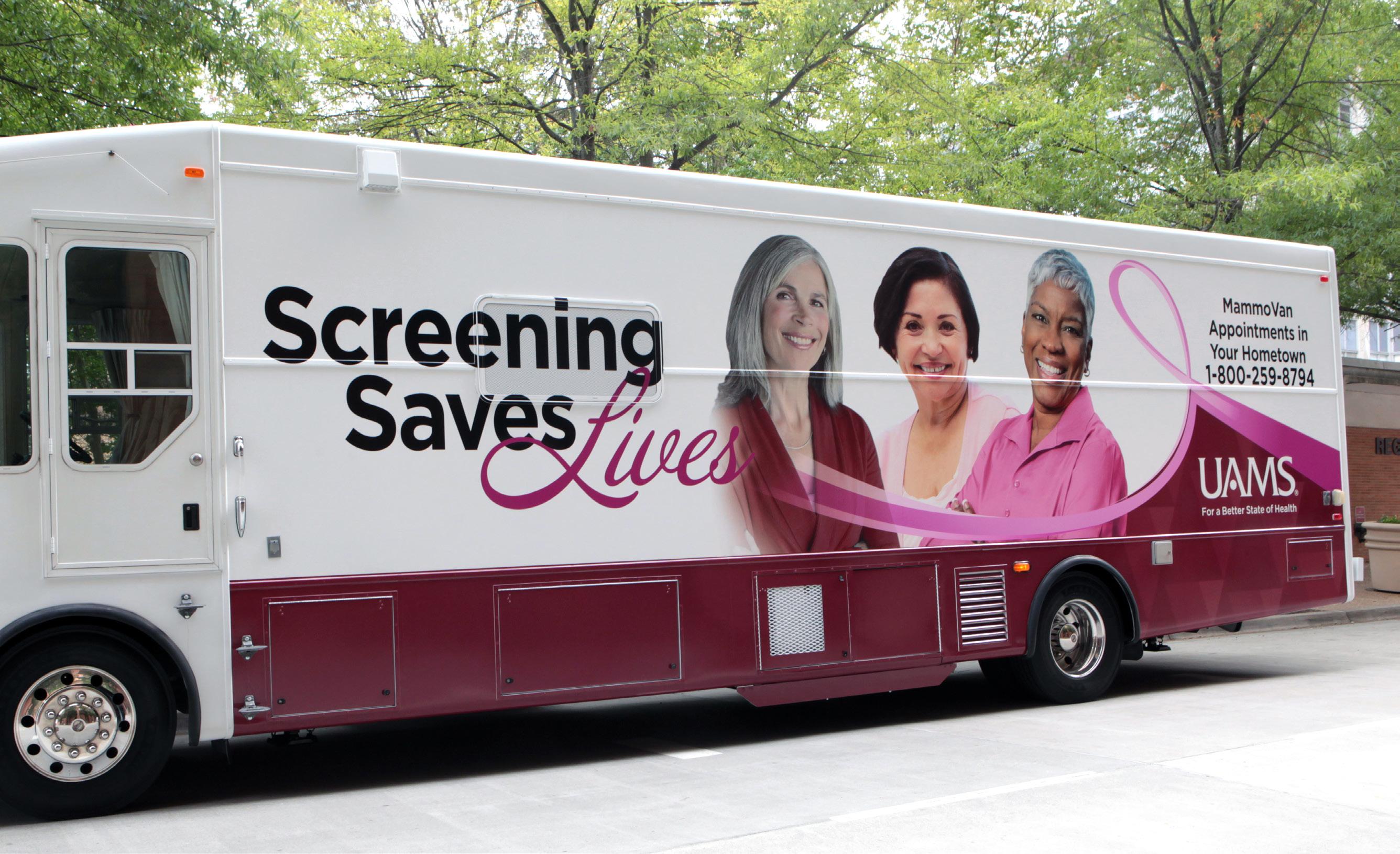
effects of a health care desert, and Arkansas is lucky compared to some neighboring states in that it has not experienced a great deal of rural hospital closures. Thanks in large part to an expansion of the Medicaid program, many rural communities have been able to keep their hospitals open. If just a few of these hospitals did close, they would leave serious gaps in coverage.
While hospitals do exist in rural areas, they often lack enough personnel to cover the needs of the population. A rural hospital may, for example, have only one OB-GYN. Should that doctor retire, the hospital can no longer provide meaningful maternal care and will struggle to find a replacement, as few new doctors choose to move to rural areas.
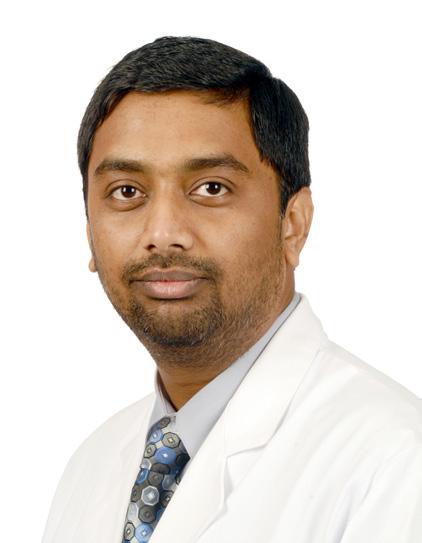
Wells said having a hospital within an hour can lessen the Sherry Turner
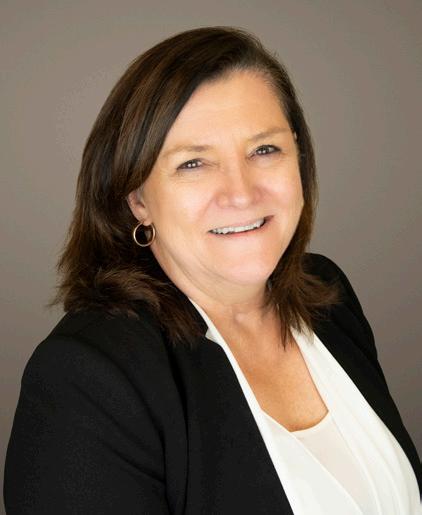
Providing quality care at consistent levels across Arkansas’ rural areas will be neither quick nor easy, but there are a number of short-term solutions that can help provide access while more permanent solutions are put in place, providers say.
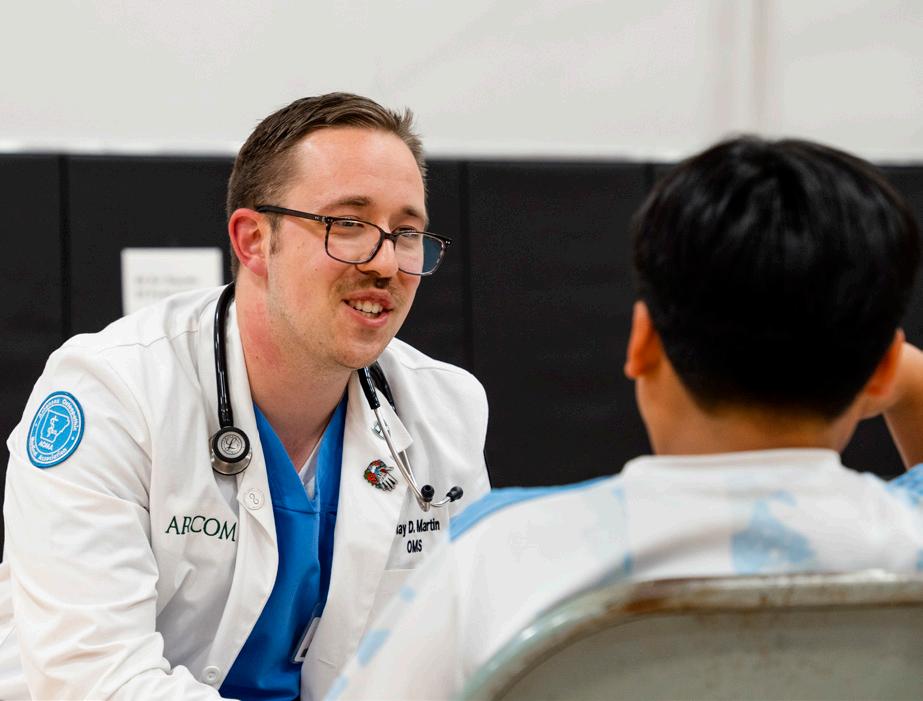
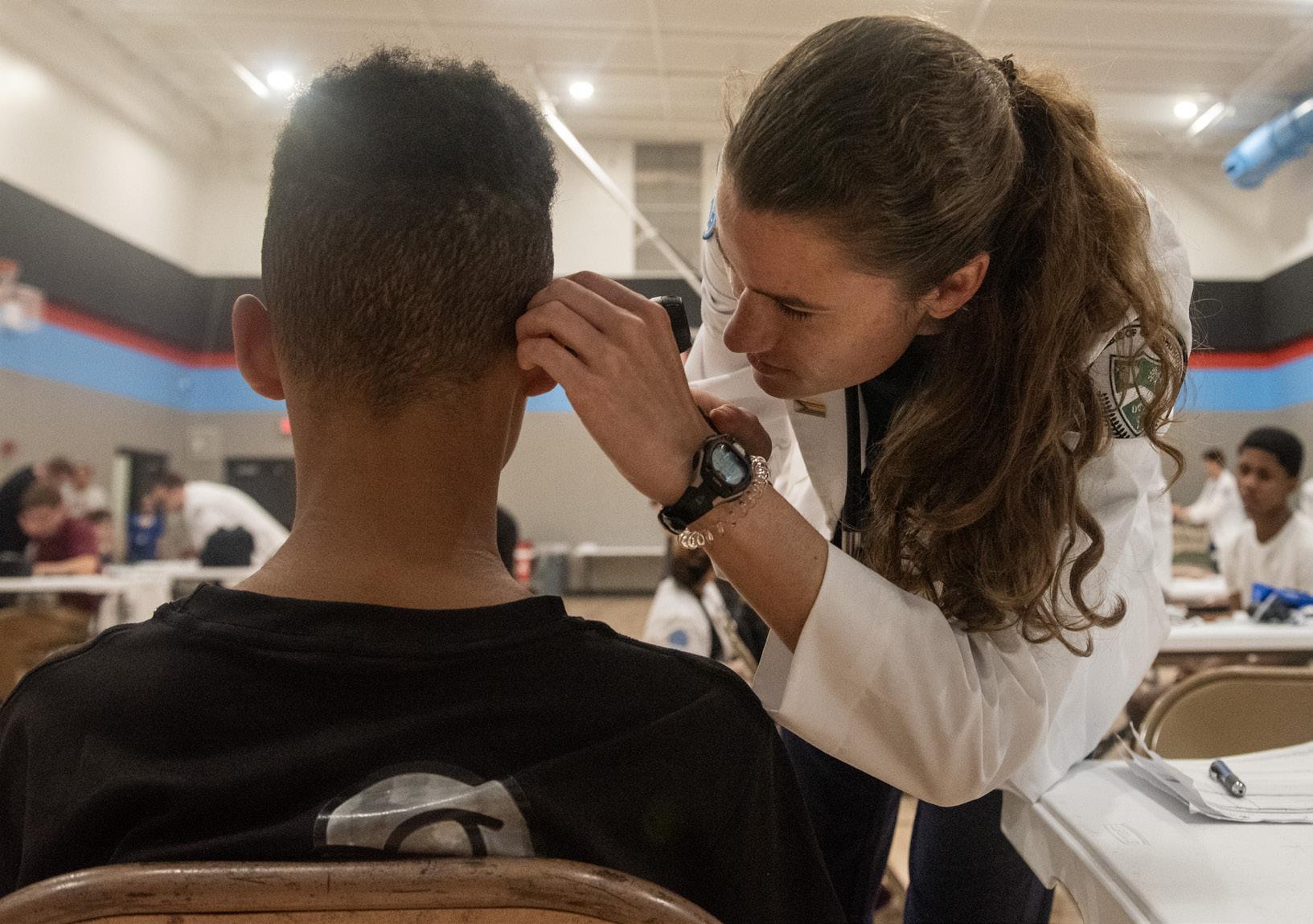
One such solution is telehealth, which arose out of necessity during the pandemic but has since proven to be a convenient way to provide medical care. Though there is only so much a provider can do over the phone, telehealth has the benefit of reaching anywhere with a cell signal or landline.
UAMS, meanwhile, has been investing in more direct approaches. If a patient can’t come to the clinic, UAMS will bring the clinic to the patient.
“We have four mobile health units that we started this year,” Kraleti said. “They will be going to these health care deserts and recruiting patients, bringing them into the health care system, providing access, immunizations and screenings, primarily reducing preventable illness and death. We also are working on an omni-channel approach of providing care, which means that we are not restricted to patients coming into the clinic. With our house calls program, we now offer a hospital-at-home program where patients don’t need to be admitted to the hospital, but we actually take care of them in their home, which has shown to lead to better outcomes.”
In the longer term, perhaps the most crucial factor in ending health care deserts is the training of doctors, nurses and other professionals who can provide the care that is missing across much of the state. Numerous efforts are being made across Arkansas to this end; indeed, the primary mission of ACHE is to provide physicians to rural areas.
The lack of doctors in rural areas, Turner explained, “stems from the way we train our medical professionals, our students and our residents. When students come through, [they may never be] exposed to the option of a rural practice. Rural practice is very different from urban practice. When you’re out there by yourself, you have to have a broader depth of knowledge of multiple things. Rural doctors do a lot of things themselves. They don’t refer patients to a specialist; they manage those things. And it can range from behavioral health to surgical problems, and they still treat that spectrum of patients.”
Historically, the majority of residency programs has been in urban centers around large medical institutions. Osteopathic professions have, by and large, been an exception to that rule, and as osteopathic medicine has begun to gain wider acceptance, more residency programs have been moved into rural areas. Multiple national studies have shown that physicians are most likely to practice near where they were trained — doctors who attend medical school in Arkansas have roughly a 50 percent chance of remaining in the state, and there is a nearly 74 percent chance that they will stay within 50 miles of where they complete their residency.
At ACHE, most students receive at least some of their training in rural settings, with some training entirely in rural hospitals. Thus far, 75 percent or more of ACHE’s students have gone into primary care, which is the most urgently needed specialty in health care deserts. Since ACHE is a young institution, graduating its first class in 2021, more time is needed to collect data on how successful these programs have been. But the results are promising so far.
ACHE is hardly the only organization invested in rural residencies — UAMS has begun a residency program in Berryville, with two more to be developed in Crossett and El Dorado with plans to expand further. UAMS has also partnered with Baptist Health and other medical institutions to support and expand resi-
dencies across the state.
Another educational institution, the New York Institute of Technology College of Osteopathic Medicine, which has a location at Arkansas State University, has also been investing heavily into this model.
“Before we opened our doors, we knew we’d need to help create places in Arkansas for our graduates to go for residency if we wanted them to stay in the state, which is a huge part of our mission,” said Casey Pearce, the institute’s director of external relations and marketing. “In 2015, a year before we opened, we received a $250,000 grant from Arkansas Blue Cross Blue Shield that we used to do things like host ‘GME Readiness’ [Graduate Medical Education] events to educate health care leaders on the process of creating residencies, to send potential program directors to necessary training and to have a consultant show hospitals the financials associated with starting programs.”
That program, in cooperation with others around the state, has seen significant results. According to Pearce, prior to 2015, Arkansas had only one internal medicine residency program with just 16 annual positions. That has since become 10 with 93 positions. The number of family medicine residency programs has also doubled from seven with 57 positions to 14 with 99. In just seven years, NYIT has seen numerous graduates sign contracts to practice in places like Wynne, Piggott, Mena, Manila and Dardanelle after their residencies.
“The problem is that you can’t just do it in three years and fix the problem,” Wells said. “It’s going to take decades of work to change that physician dynamic. Keep in mind, we’re retiring doctors as fast as we’re making doctors, so we’re also fighting that demographic shift in the United States.”
Kraleti, Turner and Wells agree that solving the problem of health care deserts will require collaboration between health systems and educational institutes across the state; no one organization can tackle the issue alone. And as Turner explained, there’s more to it than just putting a doc-
tor in a small town. Proper health care requires dentists, nurses, physical therapists, pharmacists and the transportation to reach them, all of which needs to be built into a community.
Legislation is yet another long-term solution that will be crucial to any concerted attempt to expand health care access.
“Congress has not been very interested in giving money to hospitals to train more physicians, so we keep working on that,” Wells said. “We have a really good delegation in Arkansas that has been supportive of expanding graduate medical education, but we need more people across the country willing to put money into that, so we can continue to train physicians from all parts of the country.”
As they did with Medicare expansion, rural hospitals may find themselves relying on legislation to provide a solid financial foundation. Between sparse populations, poverty and the rising costs of health care, making enough money to stay open is a struggle for many rural hospitals. Programs like Medicare make it possible for more people to receive care while providing hospitals with an essential payer source. Yet, according to Wells, Arkansas also has among the lowest levels of reimbursement from Medicare of any state.
“Trying to pay for a labor and delivery service in a community that only delivers 500 babies is not economically very sound. So, it takes the resources of a health system that takes funding from somewhere to make all this happen, to provide mental health care, to invest in technology for telehealth across the state. All of that takes money, and when you’re funded at a rate less than most others around the United States, it makes it really hard to provide all of those things.”
Turning a desert into an oasis is never an easy task, but it can be done, Arkansas medical leaders said. It will take time and collaboration, but Arkansas has the potential to turn things around and provide for the health of its citizens.
With our house calls program, we now offer a hospital-at-home program where patients don’t need to be admitted to the hospital, but we actually take care of them in their home, which has shown to lead to better outcomes.
We congratulate the outstanding UAMS health care providers and those working in the hospital recognized as Champions of Health Care. They are everyday heroes who are making a difference.
Our Champions of Health Care include:
Innovation in Health Care UAMS Health
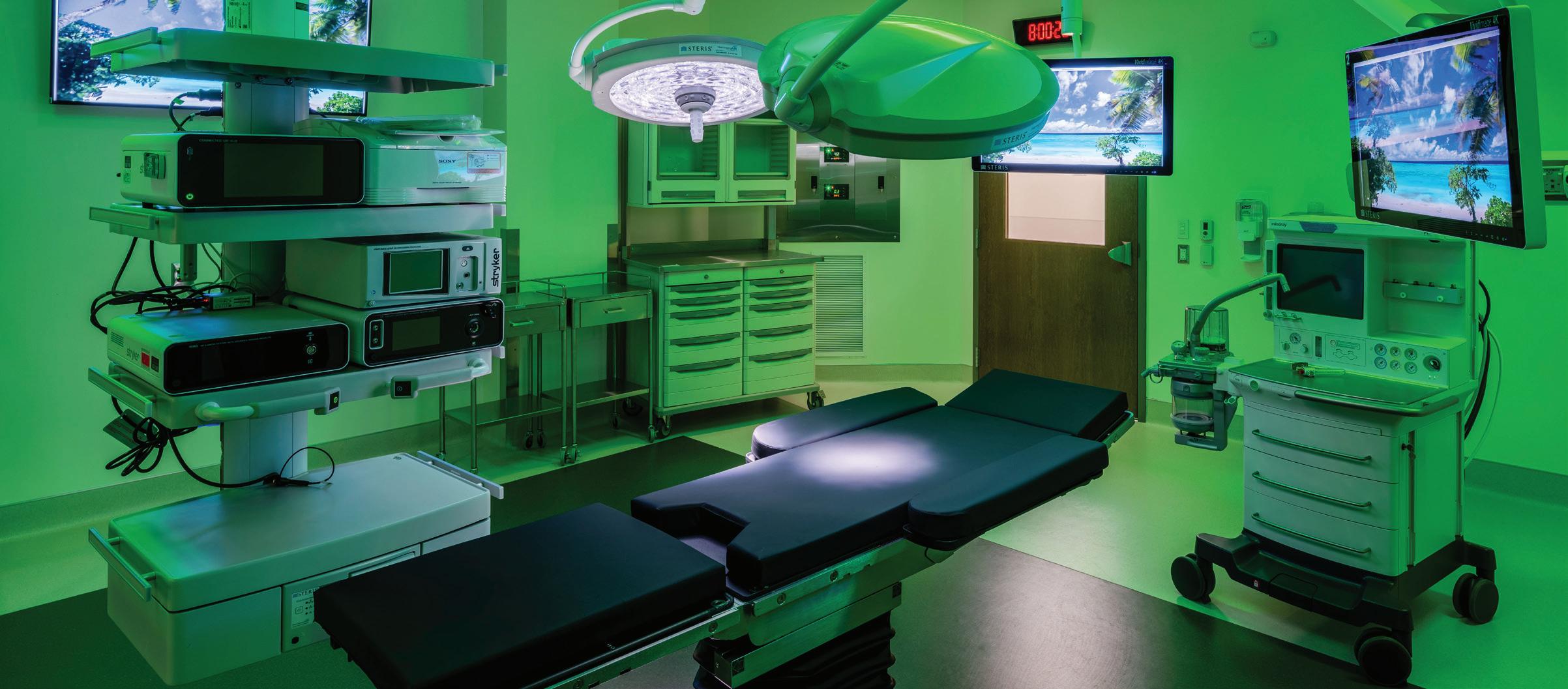
Large Hospital UAMS Health
Surgeon
C. Lowry Barnes, M.D. Orthopaedic SurgeonAt UAMS Health, we’re here to ensure you have access to the best care, right here close to home. With a staff of the best and brightest, personalized medicine and convenient access to clinics, you can feel confident knowing the state of your health is in exceptional hands.

To find a doctor, visit UAMS.Health/Champs or call 501-686-8000.

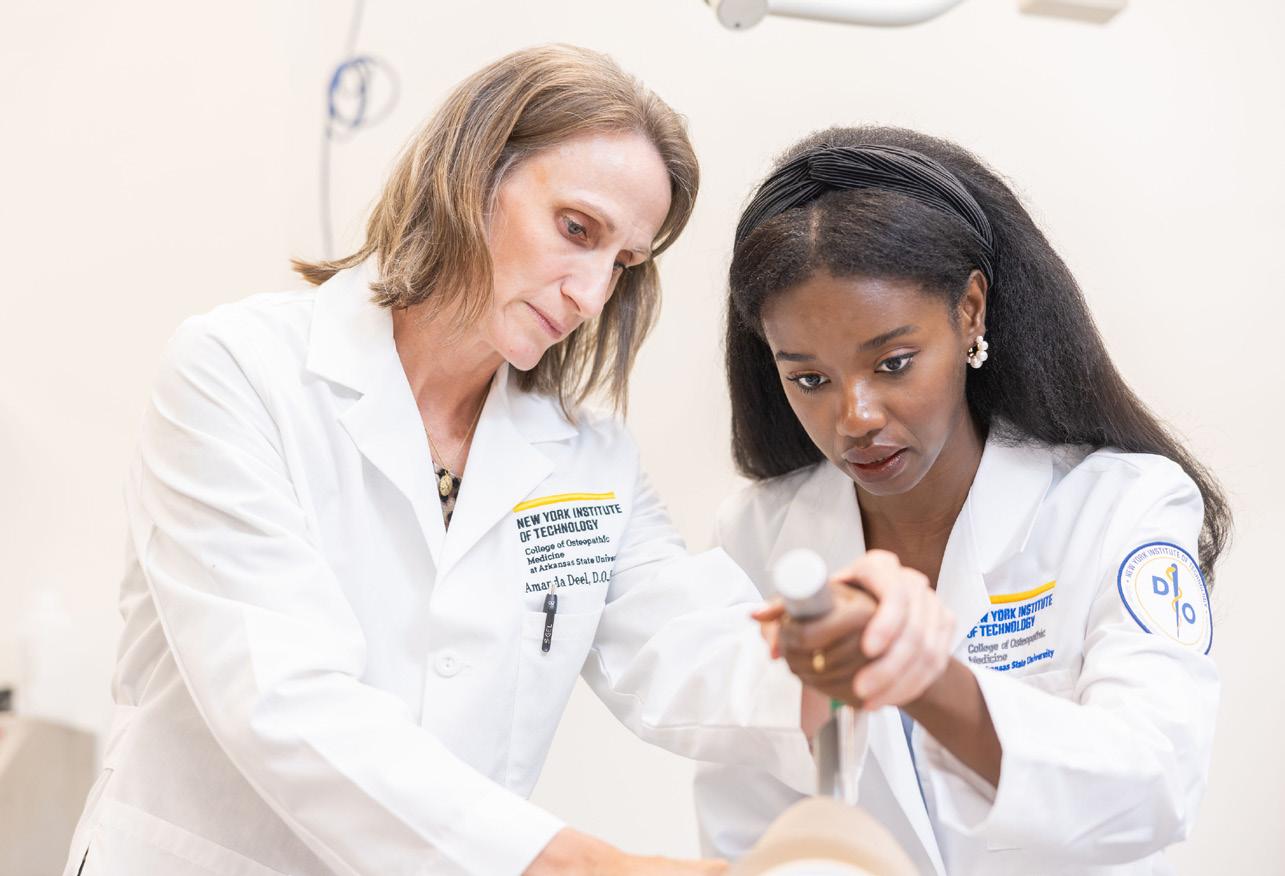
Only about 10 percent of hospitals in the country have received American Nurses Credentialing Center Magnet Program designation for efforts that focus on “high-quality patient outcomes,” “high-quality patient experience” and “superior nurse engagement.”
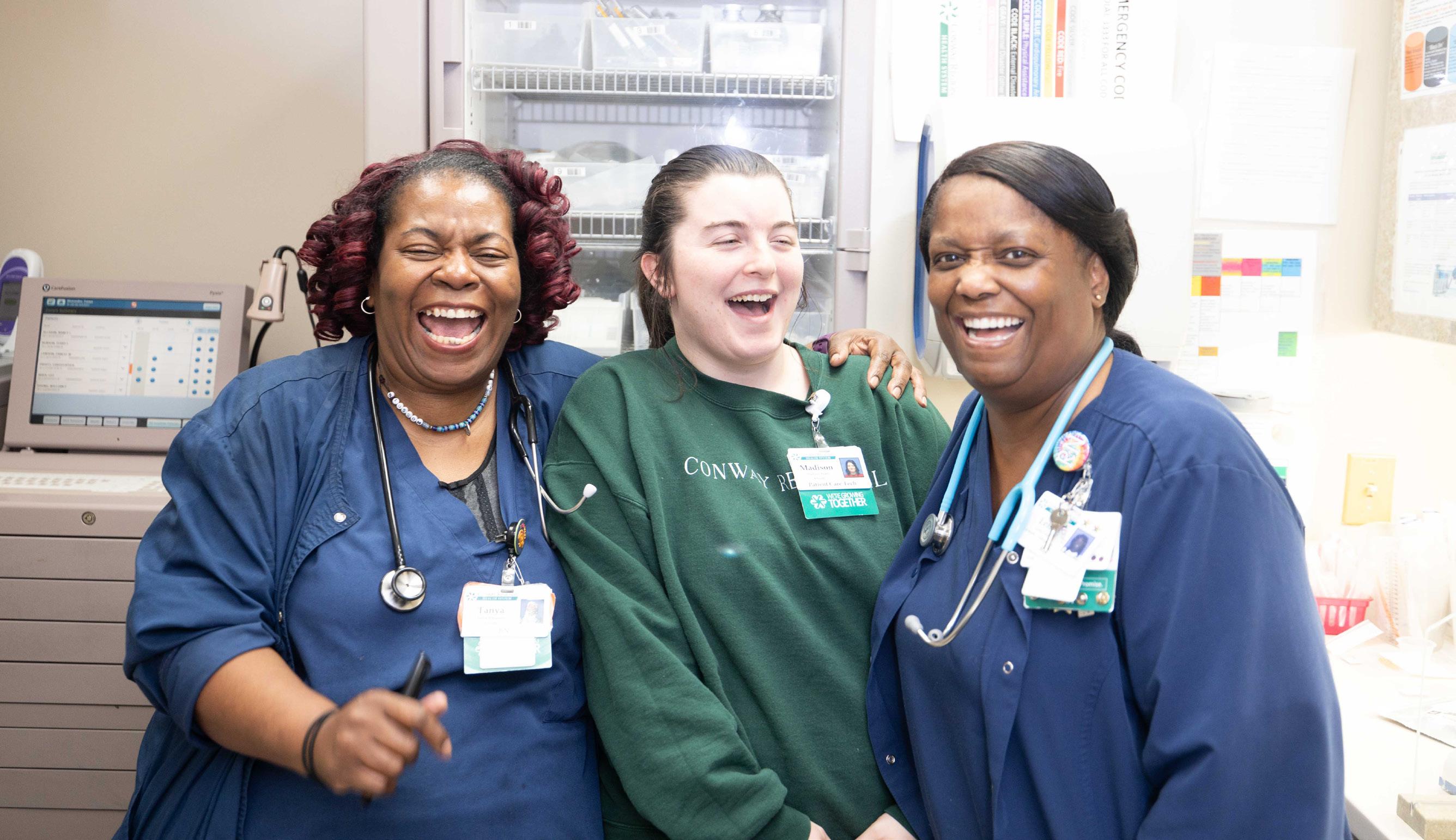
Four Arkansas institutions have been awarded the Magnet designation: Arkansas Children’s in Little Rock; Baxter Health in Mountain Home, Conway Regional Medical Center and CHI St. Vincent Hot Springs.
Institution officials said Magnet designation has been beneficial in many ways.
Magnet designation is widely considered the highest international credential for the professional nursing practice and signifies excellence in clinical care, said Heather Cherry, chief nursing officer for Arkansas Children’s, where she leads the largest division of team members across the state’s nationally ranked pediatric health system.
“Magnet recognition has been shown to provide specific benefits to health care organizations and their communities, including higher patient satisfaction, lower mortality rates and increased job satisfaction among nurses,” Cherry said. “We are thrilled to share this achievement with nurse candidates as they consider joining the Arkansas Children’s team.”
Achieving Magnet status requires meeting rigorous benchmarks. The comprehensive designation process includes an electronic application, written patient care documentation, an on-site visit and a review by the Commission on Magnet Recognition, all requiring widespread participation from leadership and staff.
Cherry said organizations reapplying for Magnet must provide evidence of how staff members sustained and improved Magnet concepts and quality since their original designation. The Arkansas Children’s redesignation process, completed in 2022, included more than 500 staff interviews over the course of three days.
“The Arkansas Children’s team upholds a commitment to excellence
that helps us embody those standards in our daily care,” Cherry said. “By recognizing our world-class nursing care, Magnet status further underscores collaboration across our entire system as we advance children’s best interests together.”
The Magnet designation covers all aspects of nursing from direct patient care to continuing education and many other areas of the hospital. Cherry said the recognition really shows a culture of excellence at Arkansas Children’s.
“Our nurses are surrounded by an exceptional team committed to the improved outcomes of our patients,” she said.
Baxter Health has seen such success with efforts to improve patient outcomes through Magnet program achievements in nursing that the hospital is now working to branch out to the rest of the health system.
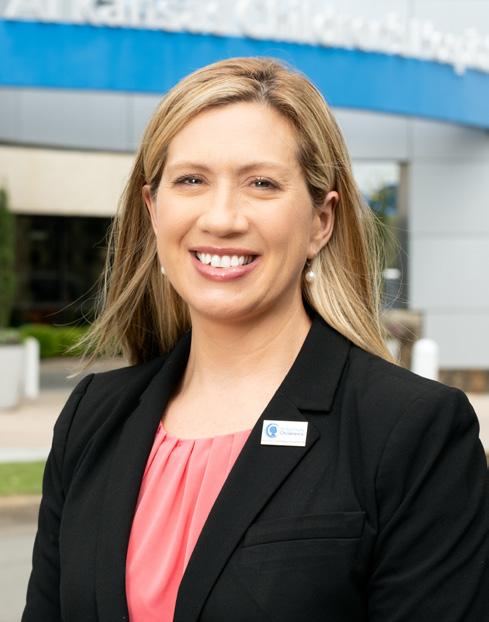
“Our big push going forward now that we have our Magnet program designation is promoting shared governance organization-wide,” said Baxter Health Chief Nursing Officer (CNO) Rachel Gilbert. “We want to pull everyone together in all the departments of the hospital so these other departments can share the benefits of shared governance we have seen in nursing. There are other employees who want a voice in the structure, so it is not all top down. Already, the results we are seeing are pretty amazing.”
Gilbert said the hospital’s Magnet designation validates years of hard work by the Baxter Health team to achieve improved patient outcomes, a better patient experience, more employee satisfaction and a culture that supports all of these components. She also credits the entire community supporting the nursing-led efforts.
Hospitals must achieve two years of outperforming the Magnet mean in eight different metrics to even apply for Magnet Designation.
“Most facilities chose to utilize outside Magnet consultants to facilitate success,” Gilbert said. “Baxter Health met these requirements without a consultant by collaboration of all nursing and ancillary departments across the organization to meet and exceed all requirements. This was made possible by the steadfast lead-
ership of former CNO Shannon Nachtigal, who was instrumental in creating the patient-centered culture we have today.”
The areas covered by Magnet designation include all eligible inpatient and ambulatory settings of Baxter Health. An example of meeting Magnet criteria would be a quality improvement effort like one of the inpatient units identifying a patient safety issue on their unit regarding falls with injury. The unit-based council met to determine the cause and investigated the best evidence-based practice for decreasing falls. The information was then presented to the Shared Governance Council, where nurses representing all units discussed plans to reduce falls with injury. After implementing the chosen intervention, data supported decreased falls with injury resulting in improved patient outcomes.
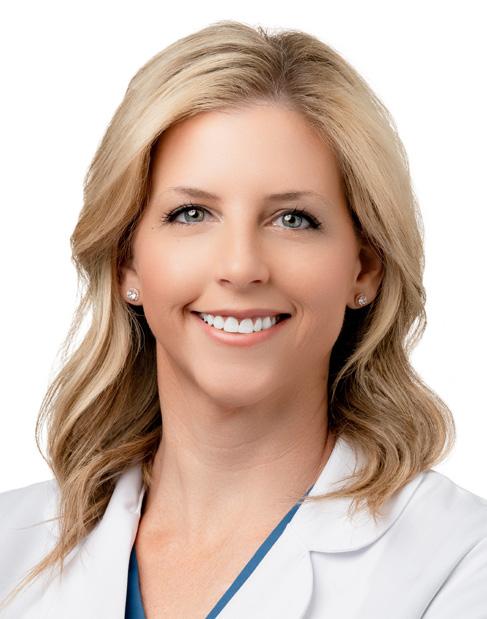
“Baxter Health is proud to be family- and community-oriented,” Gilbert said. “We are who we say we are in our mission, purpose and values. We provide compassionate care beyond measure. Our purpose is to champion access to compassionate, high-quality care by remaining independent, strategically comprehensive and community-focused.”
Prior to pursuing Magnet designation, Conway Regional Medical Center implemented a shared governance model ensuring that front-line clinical nurses and other clinical professionals have a legitimate voice in their practice, said CRMC Magnet Program Director Suzanne L. Harris.
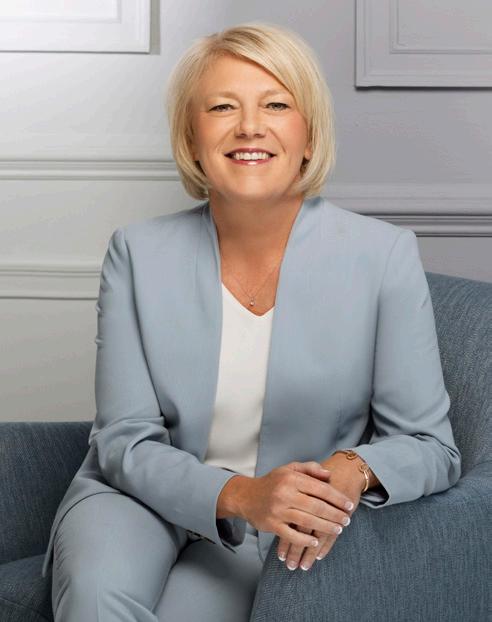
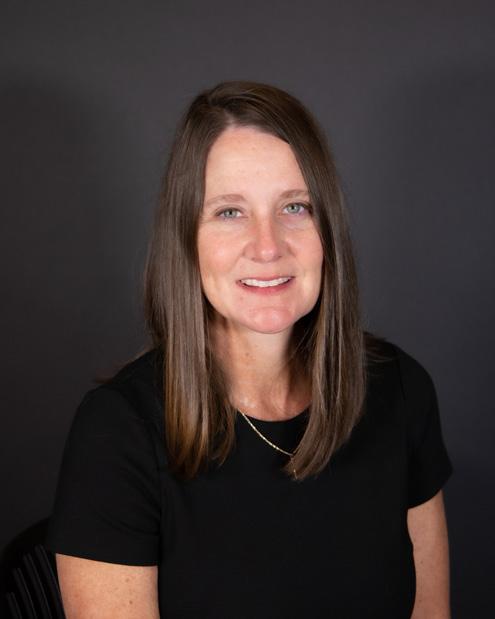
“Conway Regional’s model is unique in that it is an interprofessional model,” Harris said. “Clinical professionals including nurses and non-nurses such as radiology technologists, respiratory therapists and speech pathologists lead departmental councils with member representatives from all roles in the department. These individuals identify opportunities for improvement and lead related performance improvement projects at the departmental level. The council leaders participate in Patient Care Governing Congress, where organization-wide decision-making aimed at improving patient outcomes and experience is conducted.”
Harris said this level of engagement by clinical nurses and other clinical professionals provides the basis for achieving Magnet designation. The designation process includes providing over 90 examples of specific standards related to transformational leadership, structural empowerment, exemplary professional practice and new knowledge, innovations and improvements. Supporting evidence must be provided to substantiate the work completed.
In 2016, Conway Regional nursing leaders committed to following the Magnet model for nursing excellence. Executive leaders supported this jour-
ney. Examples of policies and initiatives implemented or enhanced because of this decision included a certification incentive policy, a tuition reimbursement/programs to support RN-to-BSN eduction and a clinical advancement program that provides incentive payment for clinical professionals who document activities in one of four domains.
Conway Regional also has a partnership with the University of Central Arkansas School of Nursing to mutually support academic preparation of nurses and research and scholarly inquiry at CRMC. Other partnerships are with Arkansas Tech University and University of Arkansas Community College at Morrilton.
The CRMC initial Magnet documentation was submitted prior to COVID-19. After review of the documentation, a site visit was scheduled for April 2020. The site visit was postponed due to the pandemic and eventually held virtually in July 2020. Conway Regional was one of the first organizations in the country to use a virtual format for the site visit.
The journey that resulted in Magnet designation positively impacted CRMC in several ways, said Matt Troup, president and CEO.
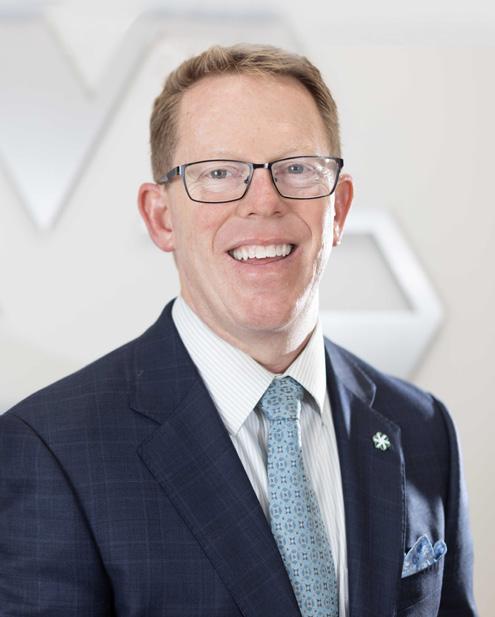
“Nurses and other professionals are empowered in an entirely new way to lead change that improves patient outcomes and experience. It increased interprofessional collaboration,” he said. “And new employees, especially newly graduated RNs, communicate that they are seeking employment at a Magnet-designated organization for the professional nursing practice environment.
“There have been improvements in patient and family engagement through activities such as the Patient and Family Advisory Committee. We established a spirit of inquiry within the culture. There is more focus on implementation of evidence-based practices and nursing research.
“The rate of RNs who hold a BSN or higher degree increased by 25 percent
and is significantly higher than the Arkansas overall BSN rate. The rate of RNs who hold a professional board certification increased by more than 200 percent. The benchmarking of nurse-sensitive quality outcomes increases awareness of opportunities for improvement and recognizes successes.”
Magnet designation is bestowed by the American Nurses Credentialing Center (ANCC) and is the highest honor for an organization for professional nursing practice. It recognizes excellence in nursing leadership, clinical practice, innovations and positive outcomes.
The rigorous process for Magnet designation includes site visits, nurse and patient interviews and public comments. Angie Longing, chief nurse executive at CHI St. Vincent Hot Springs, said nurses are at the core of the patient experience.
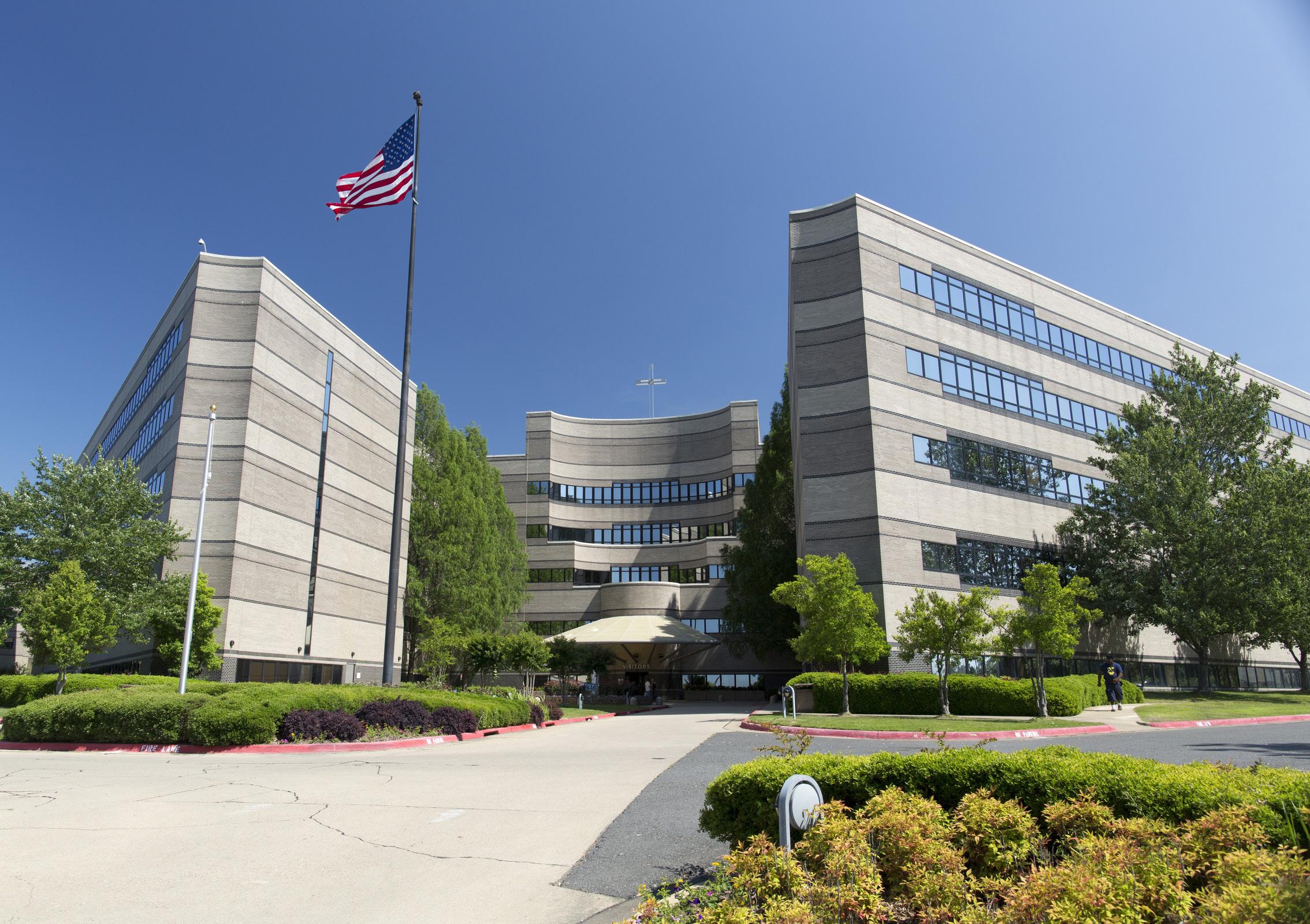
“Magnet designation is an incredible honor for our amazing nurses and all of our health care professionals are committed to this healing ministry and committed to providing compassionate care for this community,” Longing said. “It recognizes not only the excellence of our nursing staff but also this ministry’s dedication to their ongoing development through nursing education. We believe our nurses are crucial components to a patient’s health care experience and positive outcomes, and that is why we work
to train and bring the very best nursing talent here to Hot Springs.
“The nurses at CHI St. Vincent are some of the most committed and professional health care professionals in our state. Our journey through this designation process has empowered them to reach their full potential and truly made an already incredible hospital even better. As we move forward, we remain committed to supporting our nurses through education, development and collaborative practice as we work to continually attract the very best nurses to CHI St. Vincent hospitals so they can deliver the highest quality care to our patients.”
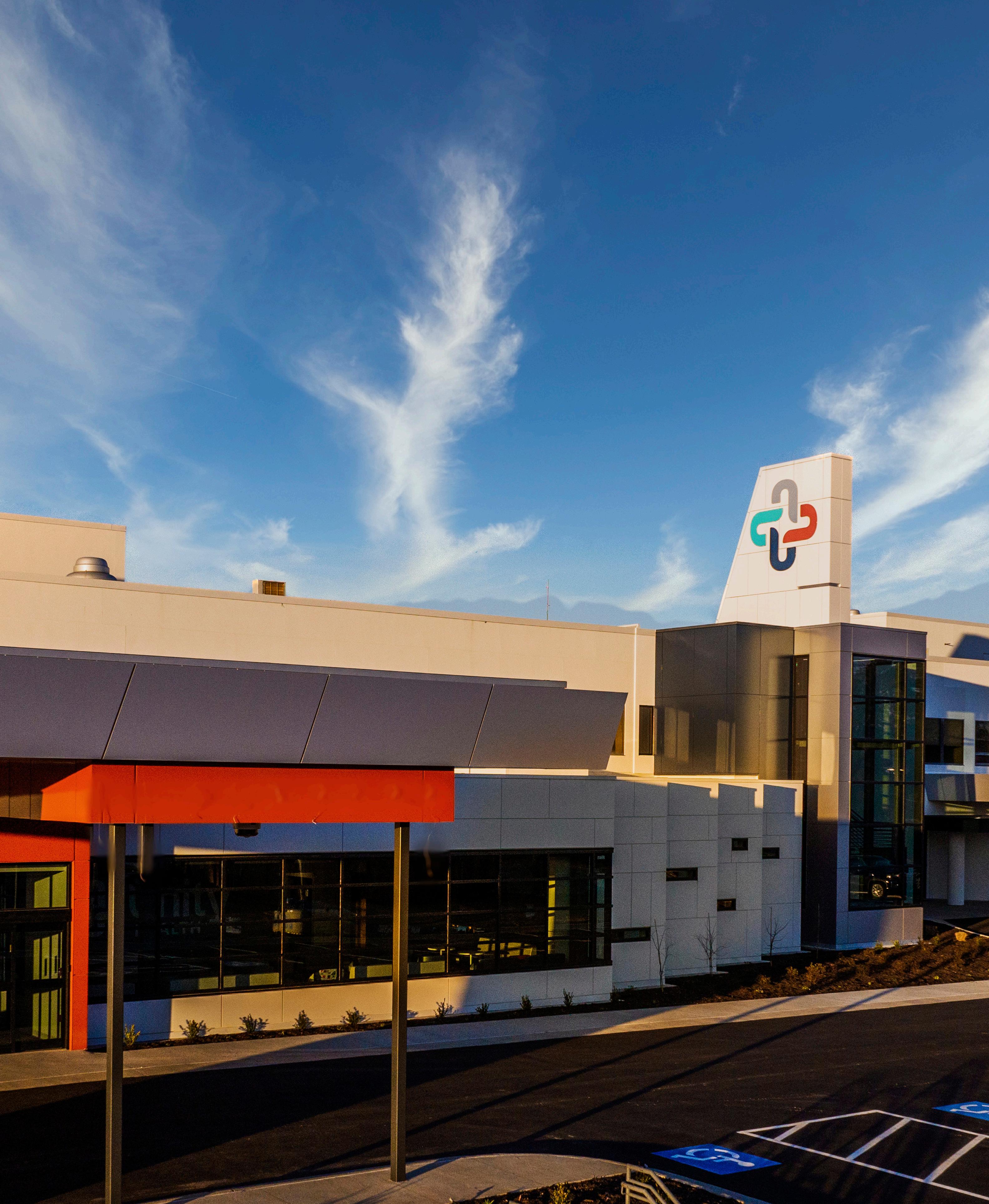 By Mark Carter
By Mark Carter
Life flows once again through the building that had served as hospital for the city of Jacksonville for the better part of six decades.
Unity Health-Jacksonville opened its doors in March, giving residents important health care options that had been missing for several years. The city of 30,000, close to the heart of the metro as the crow flies but a hearty 12-mile commute from it as the freeway functions, had seen locals forced to make the trek down U.S. Highway 67/167 for most of their health care needs once Allegiance Health closed up shop three years ago.
Before Allegiance was North Metro Medical Center and before North Metro took over in 2008, there was the original — Rebsamen Memorial Hospital-turnedRegional Medical Center, opened in 1962.
Locals are thrilled to have a functioning hospital in town again.

“The community has embraced the hospital with open arms,” said Mayor Jeff Elmore. “It’s been huge for the city. It’s great having world-class health care here in town. For our residents not to have to leave town to seek health care is so important. They’ve been a great partner for the city and a great asset.”
And why wouldn’t residents embrace it? The absence of a hospital in Jacksonville left a significant health care void in Central Arkansas, one stretching from CHI St. Vincent North in Sherwood to Unity’s flagship White County Medical Center in Searcy. So, two years ago, city officials reached out to Unity about the possibility of expanding into Jacksonville.
Kevin Burton, administrator for Unity Health-Jacksonville, said the move was as much about meeting the needs of the community as anything.
“Honestly, [Jacksonville] was not on our radar until we were approached with the opportunity to help the community, and we saw it as a great chance to expand our mission to serve the health care needs of the Jacksonville community, locally,” he said.
Unity invested more than $36 million in renovating the old hospital and did so without incurring debt. The network, which grew from White County Medical Center and was renamed once it expanded beyond county lines, has prioritized establishing a strong and stable presence in the communities it serves.
“We have never been bought or sold. In 2015, we underwent a name change to reflect our expansion and
growth,” Burton said. “For over 56 years, we have remained a financially healthy and stable local health care organization run by a board of directors who live and work in our communities. Unity Health has steadily grown and remained financially responsible while providing excellent first-class care for our communities.”
That’s just the kind of stability Jacksonville needed. For Paul Harvel, president of the Jacksonville Chamber of Commerce, the reopened hospital gives the city another important tool for attracting economic development, one that had been missing.
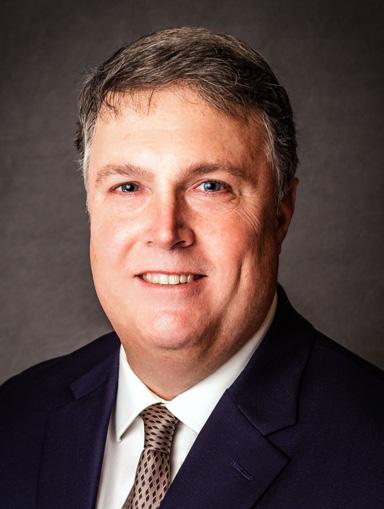
“When you’re recruiting to a city, health, education and labor are at the top of the list,” he said. “It’s great that we have a hospital here where they can take care of you no matter what’s wrong, or they can refer you to someone who can. It’s a blessing that we have it.”
Unity’s Jacksonville hospital provides the community with a 13-bed emergency department; a 24-bed behavioral health unit; imaging services including MRI, CT, X-ray and 3D mammography; acute care services; complete lab services; an inpatient/observation unit; and inpatient cardiopulmonary services.
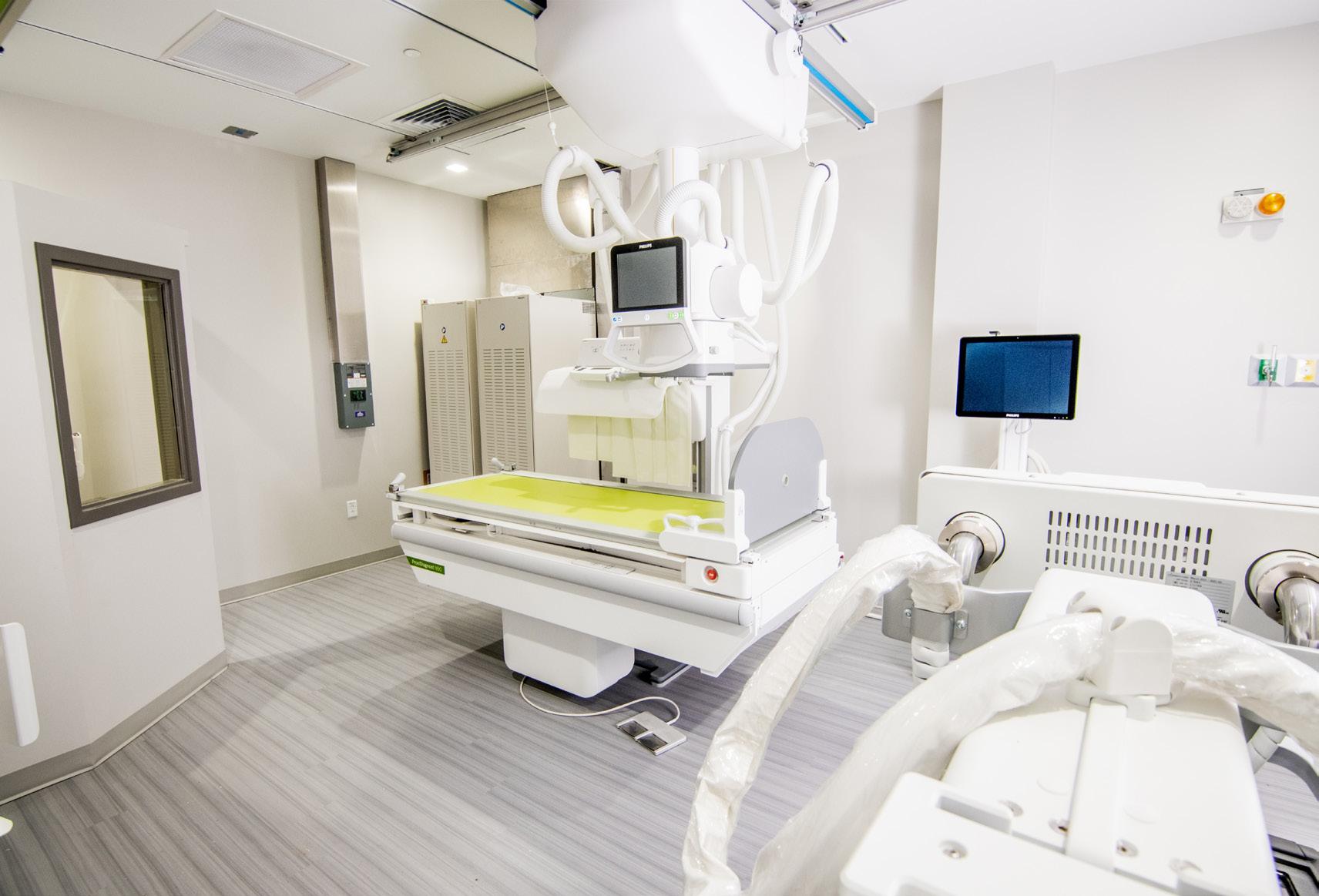
Unity Health is a member of the Mayo Clinic Care Network, and the move into Jacksonville gives it a healthy 44 points of service within its network of hospitals, clinics and specialty areas of practice throughout north-cen-
tral Arkansas. The Unity network includes four hospitals — White County, Jacksonville, Unity Health-Newport and Advanced Care Hospital in Searcy. All told, Unity employs more than 2,300 Arkansans and offers more than 500 licensed beds and a medical staff of more than 160 physicians and specialists.
Though Unity undoubtedly is in growth mode, Burton said Jacksonville represented a “natural extension” of the Unity mission to improve the quality of care in communities served by the health system.
“This area is underserved in many ways, not the least of which is mental health treatment through inpatient and outpatient behavioral-health services. We brought a 24-bed inpatient adult-behavioral health unit to Jacksonville in order to provide a service the community told us is needed. Behavioral health is a specialty in which we are very experienced, and we were excited to bring our expertise to Jacksonville and the surrounding areas.”
Indeed, Jacksonville — with the adjacent Little Rock Air Force Base home to several thousand counting airmen and their families — was a perfect landing spot for Unity.
“It is very important for communities to have local medical care,” Burton said. “Not only do we serve patients for whom transportation is an issue, families often have trouble getting out of Jacksonville to visit
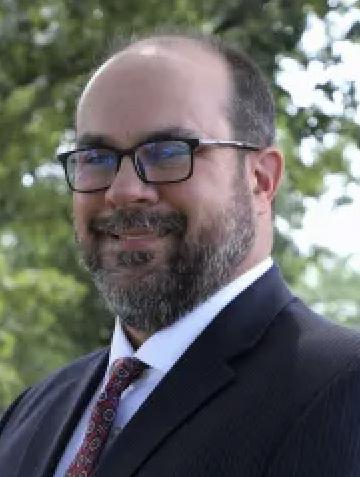
them. This is significant because we know the inclusion of family in the care plan is an important part of healing. In addition, our proximity to so many talented primary care providers in Jacksonville allows our patients to come to us for outpatient testing — radiology, lab, etc. — on the same day they see their physicians.”
Burton said that logistical advantage makes it easier for patients to satisfy all their health care needs close to home. Plus, Unity’s opening in Jacksonville brings more than 150 good-paying jobs to town, providing a muchneeded boost to city coffers.
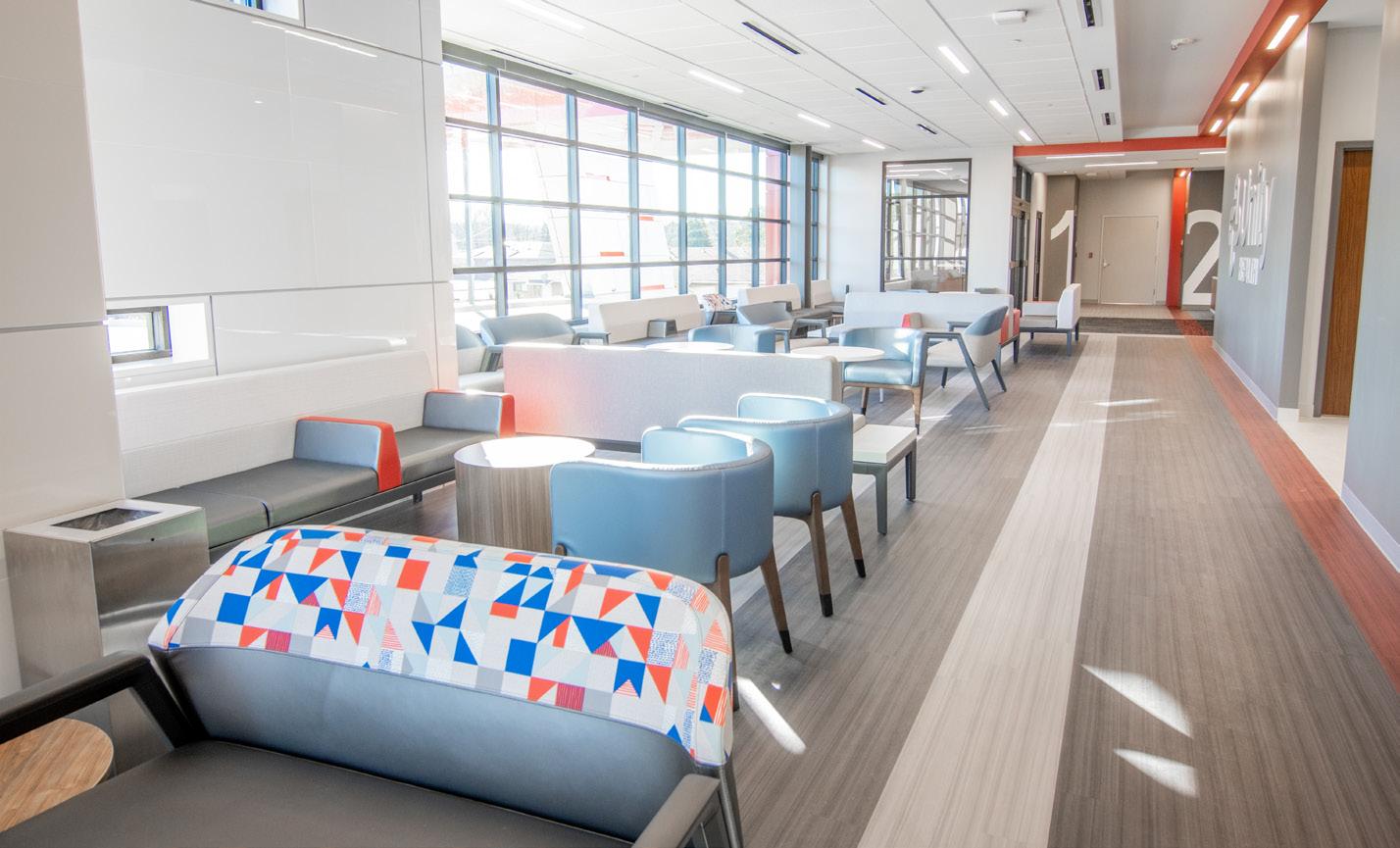
“One more important advantage, and one of which I am extremely proud, is that we are able to provide another outlet for health care services to the men and women at Little Rock Air Force Base,” Burton said. “We are proud to serve our military personnel and accept the TRICARE insurance.”
To say the facility needed some TLC is an understatement. Unity had challenges to meet in getting it ready for patients once again, not the least of which was COVID.
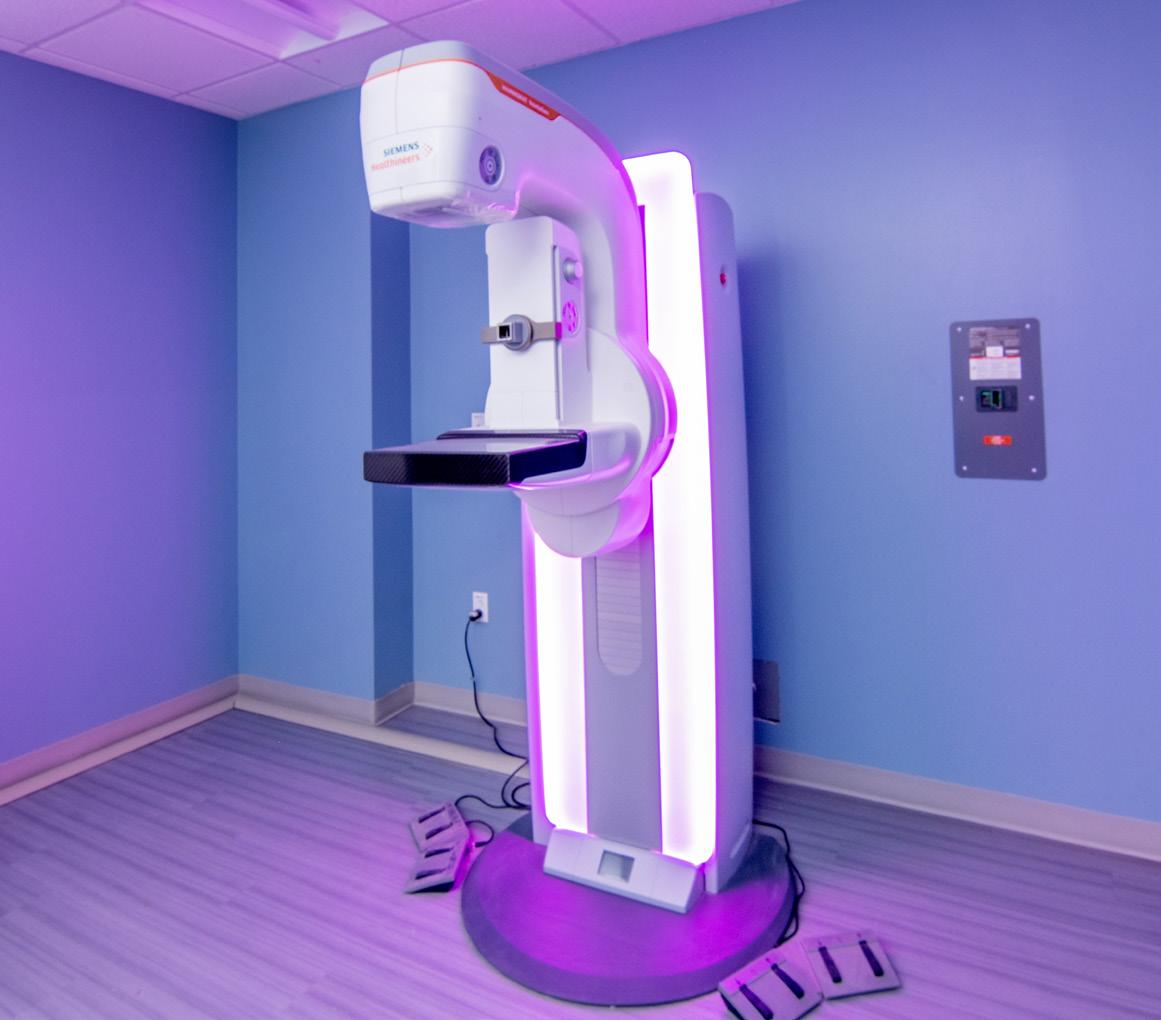
“We’ve worked through our challenges, and there were a few as we practically rebuilt the hospital during a global pandemic,” Burton said. “In our case, one of the biggest challenges was the disruption in supply chain that occurred during the pandemic while we were renovating the existing facility. Another major challenge was the renovation itself. So much of the infrastructure of the hospital had to be completely replaced, not just renovated. Of course, staffing is always a challenge when you open a new facility. There is a limited supply of talent available, so we must have a culture that attracts people to us. We’ve worked really hard to establish that.”
Burton said the Unity facilities team “worked wonders” and every square foot of the building was touched. Unity hasn’t revealed the cost of the renovation, but from replacing the plumbing to ripping out old framing and replacing it with modern infrastructure, it was a massive project.
“We knew that we were not willing to bring a product to Jacksonville that did not meet our standards,” Burton said. “The people of this community deserve the best we can give them, and this state-of-the-art facility is a great testament of our commitment to quality and this community.”
Unity officials have been humbled by the community’s response to their efforts.
“Our patient satisfaction scores are a great measure, but the relationships we are building with our patients tell a better story for me,” Burton said. “So many patients have stopped me to tell me about their fantastic experience. Also, their family members tell me about a nurse or tech or other worker who had an impact on them while they were here. The people of this community have welcomed us with open arms, and we are excited to be here serving them with compassion and expertise.”
In addition to the economic benefits, the resuscitation of the old hospital has infused the city with some psychological momentum.
“The facelift they’ve done to the exterior and the inside…you
walk in and it’s hard to believe this used to be Rebsamen or North Metro,” Elmore said. “It’s an entirely new facility with an older shell.”
Unity may not be done in Jacksonville. Burton said future expansion at Unity Health-Jacksonville is possible.
“We are working to establish a presence with our Phase I offerings, but we have opportunities on the second floor to expand services in the future. There are four sizable operating suites on the second floor, as well as more medical beds. We are working through the planning stages for specific service lines to expand in the future.”
CARTI’s new 57,000-square-foot, extended-stay surgery center at its main campus in Little Rock is the cherry on top of an 18-site network of Arkansas locations.
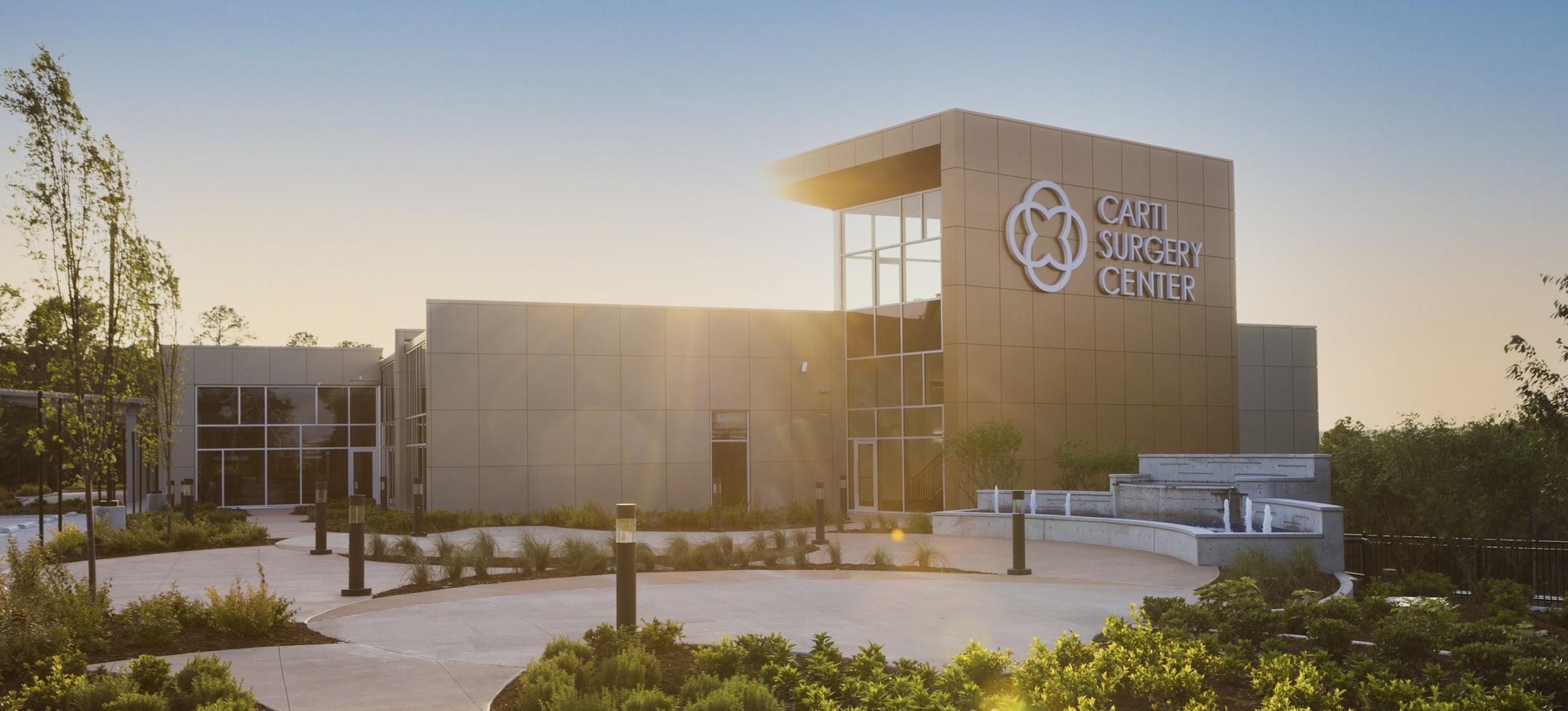
An independent, nonprofit provider, CARTI was opened in 1976 as a specialty provider of radiation-based cancer treatment. It now offers comprehensive hematology/oncology services at 13 locations across the state, radiation therapy at five and diagnostic radiology at six. Its new surgery center was built to advance cancer care in Arkansas with its da Vinci surgical robots, private rooms and more.
AMP visited with CARTI leadership — President and CEO Adam Head; Dr. Scott Stern, chief medical officer and head and neck surgical oncologist; and Dr. Yara Robertson, medical director of surgery and breast surgi-
cal oncologist — about realizing the vision of the surgery center and what it means for cancer care in Arkansas.
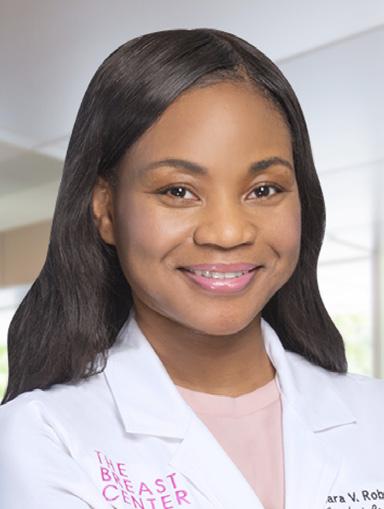
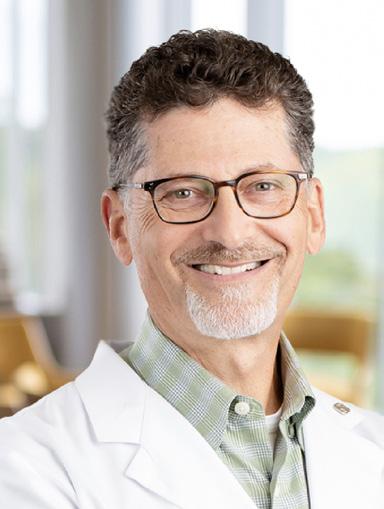
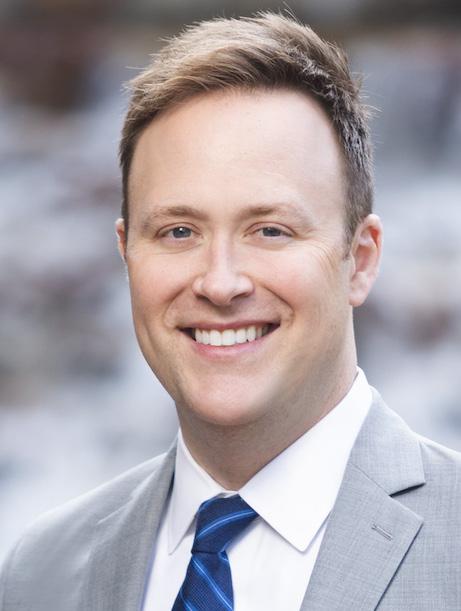
AMP: How was the vision of the surgery center realized, and what makes it unique?
Head: One thing we have consistently heard from our patients is, ‘I wish I could get my surgery done at CARTI.’ In March 2020, a team of CARTI leaders visited Memorial Sloan Kettering Cancer Center in New York to tour its extended-stay surgery center. We’d found our answer. Nearly three years and a global pandemic later, the CARTI Surgery Center opened its doors, becoming the first and only dedicated cancer surgery center in Arkansas. Today, we offer the most technologically advanced surgeries possible — all within the CARTI system and at our flagship Little Rock campus.
AMP: With this center being the only one in Arkansas, and one of only a few in the nation, what does a surgery center like this mean for Arkansans?
Stern: The CARTI Surgery Center is a gamechanger for the patient experience. This facility is equipped with six large operating rooms,
including two equipped with minimally invasive surgical robots, three procedure rooms, 14 pre-op/post-op rooms and eight private recovery suites. It is a ‘mega surgery center’ that will lead to significant benefits for our patients — improved safety, reduced risk, less pain and faster pathways to recovery, to name a few.

AMP: What makes this new center state-of-the-art? And how does it remain that way into the future?
Head: The CARTI Surgery Center was built for the future. We’ve dramatically increased our robotic surgery capability, giving patients priority access to the most technologically advanced surgeries available. Our two da Vinci robots allow extremely technical surgeries to be done safely and efficiently. These tools give our surgeons magnified, high-definition views, ensuring remarkable accuracy and less invasive procedures. The technology and the tools may change, but our goal remains the same: to support our patients and their families during their cancer journeys. From our innovative interventional radiology suites to calming recovery spaces, we designed and built every detail of the CARTI Surgery Center with their safety, comfort and healing in mind.
AMP: With such attention on artificial intelligence and robotic technology, how can CARTI balance technology with personal, one-on-one care?
Stern: We’ve seen firsthand how leading-edge technology can enhance patient outcomes. That said, we firmly believe nothing compares to the personalized, patient-centered care and overall experience our expert team provides. The CARTI Surgery Center’s operating rooms were designed to ease patients’ anxiety with ample windows, color-changing dimmable lights and music. This soothing experience extends throughout the facility.
AMP: What distinguishes the CARTI Surgery Center?
Robertson: Cancer surgery can be a draining and overwhelming experience with multiple procedures, pre- and post-op visits or visits to multiple campus locations. The CARTI Surgery Center eases that burden by keeping their care within one system, in a setting they are already familiar with and comfortable in.
AMP: How does this new center impact the efficiency of care for CARTI patients? Does it also impact the amount a patient pays?
Stern: It offers significant time and monetary savings, primarily from our process and procedure efficiencies and improved patient outcomes. The resulting benefit is much greater than cost reduction alone. For our patients, it’s a more manageable and less stressful experience — allowing them to focus instead on their health and recovery.
AMP: What affect will the center have on women’s oncology?
Robertson: A significant driver behind the CARTI Surgery Center was women’s oncology. For example, let’s take a bilateral mastectomy and reconstruction. Patients previously had to travel to different physicians and campuses for these procedures. Now, the entire care team — the surgical oncologists, plastic surgeons and related physicians — is available under one roof. It streamlines the surgical process and patients’ recoveries,
enhancing their overall experience. CARTI will soon offer even more women’s services with the addition of a gynecologic surgical oncologist.
AMP: What’s next for CARTI in terms of providing treatment options to Arkansans?
Head: The CARTI Surgery Center is the latest step in our mission to make trusted cancer care accessible to every patient we serve through compassion, innovation and purpose. We will continue to look for ways to meet our patients where they are and make their cancer journeys smoother, including moving ahead with plans for The Bridge, a multi-faceted support services center at our main campus that will begin construction soon.
AMP: What should readers take away from the addition of the surgery center to the CARTI portfolio?
Head: The CARTI Surgery Center is for our patients. They are the reason for everything we have sought to do and change in cancer care over the last 47 years. We are given the very high calling of taking care of people who are going to endure about as much stress as someone will ever experience. Our heartbeat is walking alongside patients and their families in those difficult and uncertain moments and providing them with the most trusted cancer care available. CARTI’s mission is making trusted cancer care accessible for every patient we serve through compassion, innovation and purpose. The CARTI Surgery Center is one more step toward that mission. It was specifically built to care for those affected by cancer and all those whose diagnoses or conditions could somehow touch cancer.
 By Mark Carter
By Mark Carter
When Baptist Health and the University of Arkansas for Medical Sciences announced a “statement of strategic intent” in 2017, it represented a continuation of what had already been a decades-long partnership.
Dr. Anusha Jillella is poised to help lead the alliance’s latest iteration, one that officials at both institutions hope will help extend state-of-the-art cancer care to every corner of the state.
The partnership between the state’s largest private health care network and its only public, academic health care system has now resulted in comprehensive cancer centers on Baptist Health campuses in Little Rock and North Little Rock, staffed by oncologists from the University of Arkansas for Medical Sciences Winthrop P. Rockefeller Cancer Institute.
Baptist Health and UAMS started working together in the early 1980s on physical medicine and rehabilitation initiatives, and joint ventures expanded to include vascular
surgery, maternal/fetal medicine, emergency medicine and orthopedics. Ultimately, it led to creation of the Baptist HealthUAMS Graduate Medical Education (GME) program, which trains medical students in family medicine, internal medicine, psychiatry and transitional year residencies.
The cancer centers represented the next step. A new infusion center is scheduled to open on the Baptist Health-Little Rock campus in October, and Jillella, medical oncologist at the Little Rock center and assistant professor in the UAMS Department of Internal Medicine, Division of Hematology and Oncology, believes the Baptist-UAMS partnership represents a “milestone” for cancer care in the state.
Jillella received her medical degree from Gandhi Medical College in Secunderabad, India, and completed her residency at UAMS. AMP visited with her about the potential represented by the partnership between two of the state’s biggest health care brands.
AMP: How significant for cancer care in the state is the partnership between Baptist Health and UAMS?
Jillella: The partnership between Baptist Health and UAMS and their integration is extremely important and a big milestone for cancer care in Arkansas. We are taking the best of Baptist Health and the best of UAMS and building an infrastructure and an enterprise that assures our patients — any patient who walks on this campus — that they’re getting the absolute best answer to their unique problem.
It allows the patient to have access to the strength of Baptist Health, which has amazing outreach into underserved areas of Arkansas, as well as access to the expertise of an oncologist at the university along with its resources including clinical trials. This program allows for cancer care — and not just any cancer care, but the state-of-the-art care — to be delivered to areas that were previously not possible.
With the combined strength of these two prestigious institutions, patients will experience a new standard of comprehensive and personalized cancer care. That is our hope and shared mission.
AMP: Tell us more about the new infusion center scheduled to open this fall.
Jillella: The new infusion center is scheduled to open in October on the Baptist Health Medical Center-Little Rock campus. It is a cutting-edge facility, providing advanced infusion therapies such as blood transfusions, chemotherapy, immunotherapy, etc. Our experienced nursing staff are compassionate and make sure that patients get personalized care in a comfortable environment.
AMP: How would you rate the overall level of care available to cancer patients in Arkansas?
Jillella: We are taking into consideration various aspects including socio-economic wellbeing and access to cancer care. Arkansas has made significant progress in cancer care and has dedicated oncologists who do keep up with ongoing research and provide standard of care, if not care specifically tailored for the patient.
However, it is important to acknowledge that the level of care varies across different regions within the state. Access to treatment, clinical trials and supportive services vary depending on the location in Arkansas. This collaborative effort between Baptist Health and UAMS hopes to bridge that gap.
A new infusion center is scheduled to open on the Baptist Health-Little Rock campus in October, and Jillella believes the Baptist-UAMS partnership represents a “milestone” for cancer care in the state.
AMP: Cancer care used to seem compartmentalized — surgery, chemo or radiation. How has the approach to cancer care changed over the past couple of decades?
Jillella: Over the past few years, cancer treatment has evolved into a multidisciplinary service, and the collaboration between health care professionals is extremely important. To provide treatment plans tailored to each patient’s needs, we have to collaborate with various disciplines. This approach ensures that all aspects of the patient’s conditions are addressed. We have tumor boards where the oncologist, surgeons, radiologist, pathologist and other health care professionals come together to discuss patients and develop a treatment strategy for the patients. This ensures the best outcomes for the patient and also improves quality of life.
AMP: What’s next on the horizon for cancer care?
Jillella: The field of oncology continues to evolve rapidly with advancements in technology and research. There are a lot of exciting developments on the horizon that will change how we diagnose and treat cancer.
A lot of importance is being given to precision medicine, in which we profile the patient’s DNA and tumor characteristics. Now, we have the ability to target certain genes as well. We can expect to see more effective treatments with fewer toxicities if we choose this approach.
Immunotherapy has been around for a while and has made a significant improvement in outcomes in lung cancer, melanoma, etc. Liquid biopsies and circulating tumor DNA offer a less invasive alternative to tissue biopsies for treatment planning or to assess for responses. These elevations ultimately focus on improving patient outcomes.

4200 E WASHINGTON AVENUE HEALTH CLINIC
City: NORTH LITTLE ROCK
County: PULASKI
Project Type(s): Clinic/Medical Office
Valuation: $1,000,000 - $2,999,999
Engineer(s): Thomas Engineering
ACCESS MEDICAL CLINIC
City: CLARKSVILLE
County: JOHNSON
Project Type(s): Clinic/Medical Office
Valuation: $1,000,000 - $2,999,999
Engineer(s): Burrows & Associates
ADULT WELLNESS CENTER
City: BENTONVILLE
County: BENTON
Project Type(s): Clinic/Medical Office
Valuation: $1,000,000 - $2,999,999
Architect(s): Hight-Jackson
ALICE L. WALTON SCHOOL OF MEDICINE
City: Bentonville
County: Washington
Project Type(s): Medical School
Valuation: $60,000,000
General Contractor: Crossland Construction
Architect(s): Polk Stanley Wilcox, Outdoor Spacial Design
Engineer(s): McClelland, Henderson
ARKANSAS CHILDRENS HOSPITAL EXPANSION
City: LITTLE ROCK
County: PULASKI
Project Type(s): Hospital
Valuation: $318,000,000
General Contractor: Nabholz
Architect(s): Cromwell, Polk Stanley Wilcox
CARTI LITTLE ROCK ON SITE SURGERY CENTER
City: LITTLE ROCK
County: PULASKI
Project Type(s): Clinic/Medical Office
Valuation: $25,000,000
General Contractor: Kinco
Architect(s): Cromwell
CENTRAL ARKANSAS FAMILY CLINIC
City: CABOT
County: LONOKE
Project Type(s): Clinic/Medical Office
Valuation: $1,000,000 - $2,999,999
Architect(s): Robert M. Schelle Architect
Engineer(s): ECI, Bond, BDS Energy
CIRCLE OF LIFE HOSPICE FACILITY HUB
City: LOWELL
County: BENTON
Project Type(s): Clinic/Medical Office
Valuation: $3,000,000 - $4,999,999
General Contractor: Core
Architect(s): Milestone
Engineer(s): Brown, JLA, Expedient
CONWAY COUNTY HEALTH & REHAB (REPLACEMENT)
City: OPPELO
County: CONWAY
Project Type(s): Elderly/Assisted Living Nursing/Convalescent Center
Valuation: $12,450,000
CRAWFORD COUNTY COMMUNICATION CENTER AND COUNTY HEALTH BUILDING
City: VAN BUREN
County: CRAWFORD
Project Type(s): Clinic/Medical Office Communication Building
Valuation: $1,030,000
General Contractor: A4 Services
Architect(s): Tim A Risley & Associates
CRAWFORD COUNTY HEALTH UNIT REMODEL
City: VAN BUREN
County: CRAWFORD
Project Type(s): Clinic/Medical Office
Valuation: $1,000,000 - $2,999,999
EUDORA MEDICAL CLINIC MAINLINE HEALTH SYSTEMS
City: EUDORA
County: CHICOT
Project Type(s): Clinic/Medical Office
Valuation: $1,000,000 - $2,999,999
Architect(s): WDD
Engineer(s): Insight
EMERGENCY HOSPITAL
City: FORT SMITH
County: SEBASTIAN
Project Type(s): Hospital
Valuation: $8,129,912
General Contractor: CBM
Architect(s): Roark-Perkins-Perry & Yelvington
Engineer(s): Batson, Greeson & Gatlin
FOOD SERVICE CENTER (EUGENE J. TOWBIN HEALTHCARE CENTER)
City: NORTH LITTLE ROCK
County: PULASKI
Project Type(s): Hospital
Valuation: $14,758,514
General Contractor: Red Eagle Joint Venture (OK)
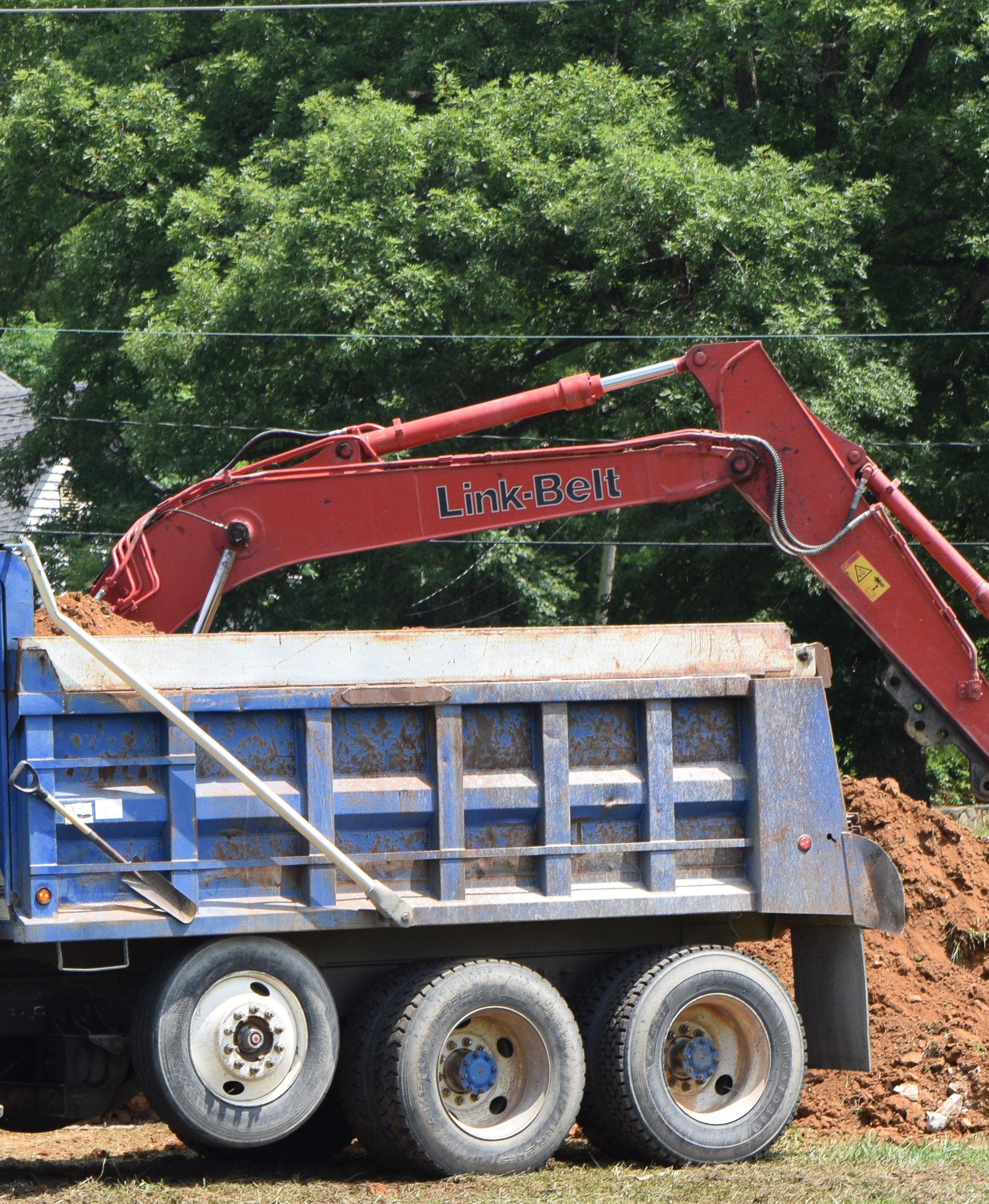
Architect(s): Red Eagle Joint Venture (OK)
HEALTH LANES MEDICAL OFFICE
City: ROGERS
County: BENTON
Project Type(s): Clinic/Medical Office
Valuation: $1,000,000 - $2,999,999
Architect(s): Crafton Tull
Engineer(s): Crafton Tull
IT INFRASTRUCTURE UPGRADES - VA MEDICAL CENTER
City: FAYETTEVILLE
County: WASHINGTON
Project Type(s): Hospital
Valuation: $2,493,642
General Contractor: Spees-Hernandez
Architect(s): Spees Design Build
JEFFERSON REGIONAL MEDICAL CENTER REPLACEMENT (DELAYED)
City: PINE BLUFF
County: JEFFERSON
Project Type(s): Hospital
Valuation: $180,000,000
General Contractor: CDI
Architect(s): Orcutt|Winslow TEG (IN)
JEFFERSON REGIONAL & KINDRED HEALTHCARE REHAB HOSPITAL
City: WHITE HALL
County: JEFFERSON
Project Type(s): Hospital
Valuation: $55,000,000
General Contractor: ESA (TN)
Architect(s): Brasfield and Gorrie (AL)
KIDS SPOT THERAPY CLINIC
City: SPRINGDALE
County: WASHINGTON
Project Type(s): Clinic/Medical Office
Valuation: $6,500,000
General Contractor: CDI
Architect(s): SCM
Engineer(s): ECI, McClelland, Prigm
LEE COUNTY COOPERATIVE CLINIC - NEW CLINIC FACILITY
City: MARIANNA
County: LEE
Project Type(s): Clinic/Medical Office
Valuation: $3,000,000 - $4,999,999
MERCY CLINIC PRIMARY CARE - TOWSON
City: FORT SMITH
County: SEBASTIAN
Project Type(s): Clinic/Medical Office
Valuation: $3,000,000 - $4,999,999
MICRO HOSPITAL (THE VILLAGE AT RAHLING ROAD)
City: Little Rock
County: PULASKI
Project Type(s): Hospital
Valuation: $3,000,000 - $4,999,999
General Contractor: Roark-Perkins-Perry & Yelvington
Engineer(s): White-Daters
MILLENNIUM CHIROPRACTORS CLINIC
City: FAYETTEVILLE
County: WASHINGTON
Project Type(s): Clinic/Medical Office
Valuation: $1,000,000 - $2,999,999
Engineer(s): Jorgensen + Associates
MONETTE MANOR NURSING FACILITY (REPLACEMENT-TORNADO DAMAGE)
City: MONETTE County: CRAIGHEAD
Project Type(s): Nursing/Convalescent Center
Valuation:$9,500,000
Architect(s): Mark E Bixler Architect
MONTICELLO MEDICAL CLINIC
City: MONTICELLO
County: DREW
Project Type(s): Clinic/Medical Office
Valuation: $1,000,000 - $2,999,999
Architect(s): Level Studio Architect
Engineer(s): National Engineering Services, Jess Griffin, ECI
NEA BAPTIST URGENT CARE PLUS City: JONESBORO
County: CRAIGHEAD
Project Type(s): Clinic/Medical Office
Valuation: $1,000,000 - $2,999,999
Architect(s): Haag Brown
NEW EMERGENCY MANAGEMENT CENTER
City: EL DORADO
County: UNION
Project Type(s): Hospital
Valuation: $1,000,000 - $2,999,999
General Contractor: Ideal Construction
Architect(s): CADM
NEW FRANKLIN COUNTY EMS FACILITY
City: OZARK
County: FRANKLIN
Project Type(s): Vehicle Sales/Service Clinic/Medical Office
Valuation: $1,794,900
Architect(s): Hathaway Architectural Design
NEW HORIZON SENIOR LIVING CENTER
City: SHERWOOD
County: PULASKI
Project Type(s): Elderly/Assisted Living Nursing/Convalescent Center
Valuation: $15,500,000
Engineer(s): Thomas Engineering
NEW HOSPITAL
City: CABOT
County: LONOKE
Project Type(s): Hospital
Valuation: $1,000,000 - $2,999,999
O’REILLY RETIREMENT CENTER/SENIOR LIVING COMMUNITY
City: MAUMELLE
County: PULASKI
Project Type(s): Elderly/Assisted Living Nursing/Convalescent Center
Valuation: $25,000,000 - $49,999,999
Architect(s): Stark Wilson Duncan (MO), Jim Cranor Landscape Architect
Engineer(s): White-Daters
PAIN TREATMENT CENTERS OF AMERICA PTCOA MEDICAL CLINIC
City: FORT SMITH
County: SEBASTIAN
Project Type(s): Clinic/Medical Office
Valuation: $1,000,000 - $2,999,999
Architect(s): WDD
Engineer(s): Professional Engineering, McClelland, HSA
PARACHUTE PLASMA CENTER
City: EL DORADO
County: UNION
Project Type(s): Clinic/Medical Office
Valuation: $1,000,000 - $2,999,999
Architect(s): Tony Keller Architect
Engineer(s): Davidson, EEA (TX), Hollingsworth Pack (TX)
PARKING GARAGE
(JLM FISHER HOUSE IMPACT PROJECT, VA HOSPITAL)
City: LITTLE ROCK
County: PULASKI
Project Type(s): Parking Garage Hospital
Valuation: $10,000,000 - $20,000,000
PRIME MEDICAL OFFICE AND WELLNESS BUILDING
City: ROGERS
County: BENTON
Project Type(s): Clinic/Medical Office
Valuation: $5,000,000 - $9,999,999
ROSE CITY MEDICAL CLINIC
City: NORTH LITTLE ROCK
County: PULASKI
Project Type(s): Clinic/Medical Office
Valuation: $5,000,000
General Contractor: Taggart
Architect(s): Alessi-Keyes
SOURCES CENTER FOR INCLUSION
City: FAYETTEVILLE
County: WASHINGTON
Project Type(s): Clinic/Medical Office
Valuation: $1,000,000 - $2,999,999
Architect(s): Core
Engineer(s): HP, Martin/Martin, Morrison-Shipley
UAPB HEALTH AND WELLNESS CENTER
City: PINE BLUFF
County: JEFFERSON
Project Type(s): Miscellaneous Education Building Athletic Facility
Clinic/Medical Office
Valuation: $33,000,000
General Contractor: CDI
Architect(s): AMR
Engineer(s): Crafton Tull, Pettit & Pettit, ECI
VA MEDICAL CENTER RENOVATION
City: FAYETTEVILLE
County: WASHINGTON
Project Type(s): Hospital Military Facility
Valuation: $5,000,000 - $10,000,000
WASHINGTON REGIONAL MEDICAL CENTER EXPANSIO AT DRAKE FARMS

City: FAYETTEVILLE
County: WASHINGTON
Project Type(s): Hospital
Valuation: $5,000,000 - $9,999,999
WHOLE HEALTH INSTITUTE
City: Bentonville
County: Washington
Project Type(s): Hospital/Medical Office
Valuation: $16,550,000
General Contractor: Baldwin & Shell
Architect(s): Marlon Blackwell Architect
Engineer(s): Marlon Blackwell Architect
Source: Dodge Construction Network


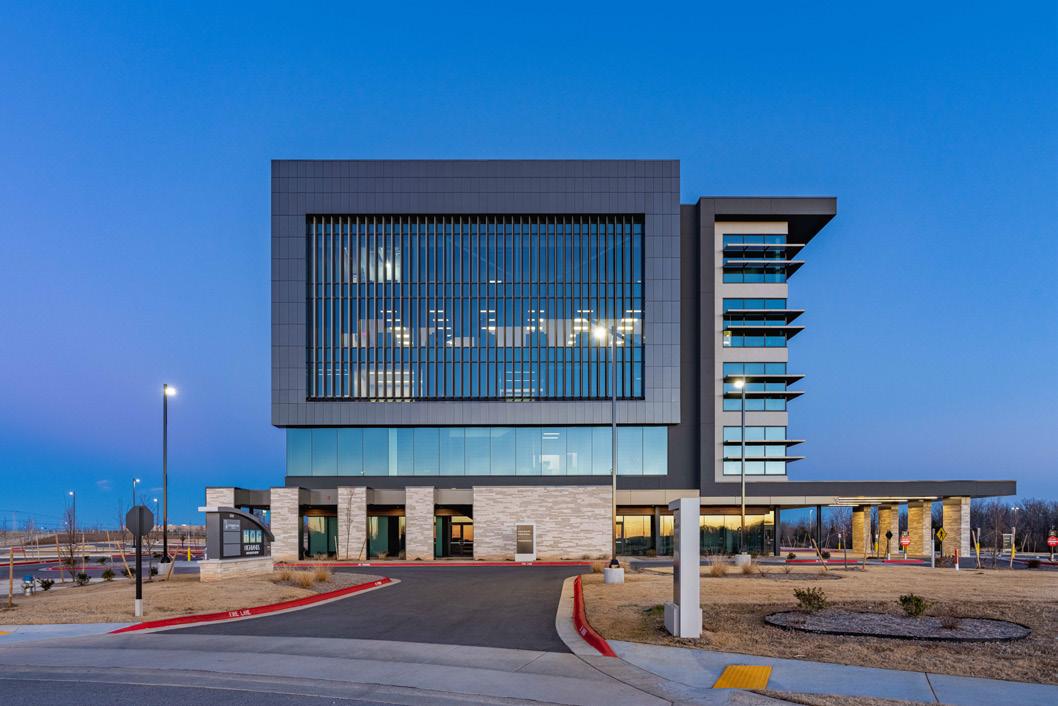
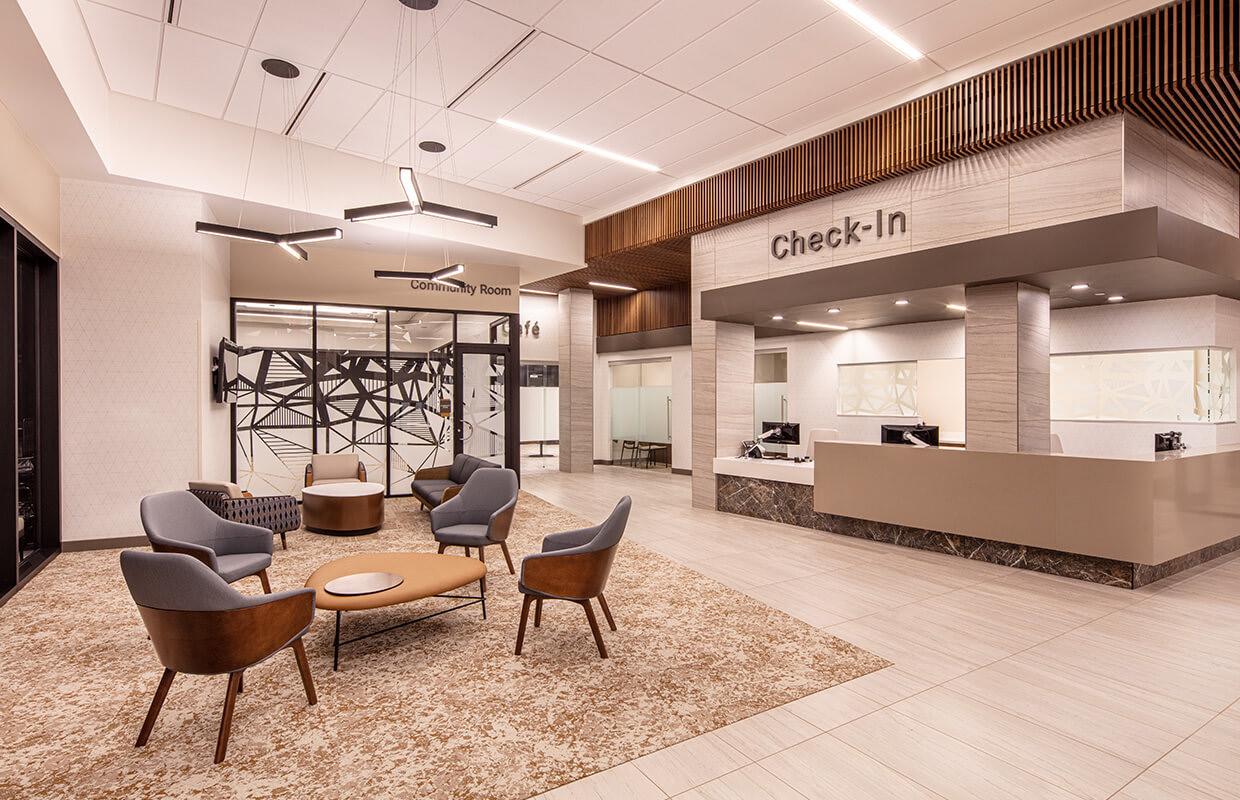
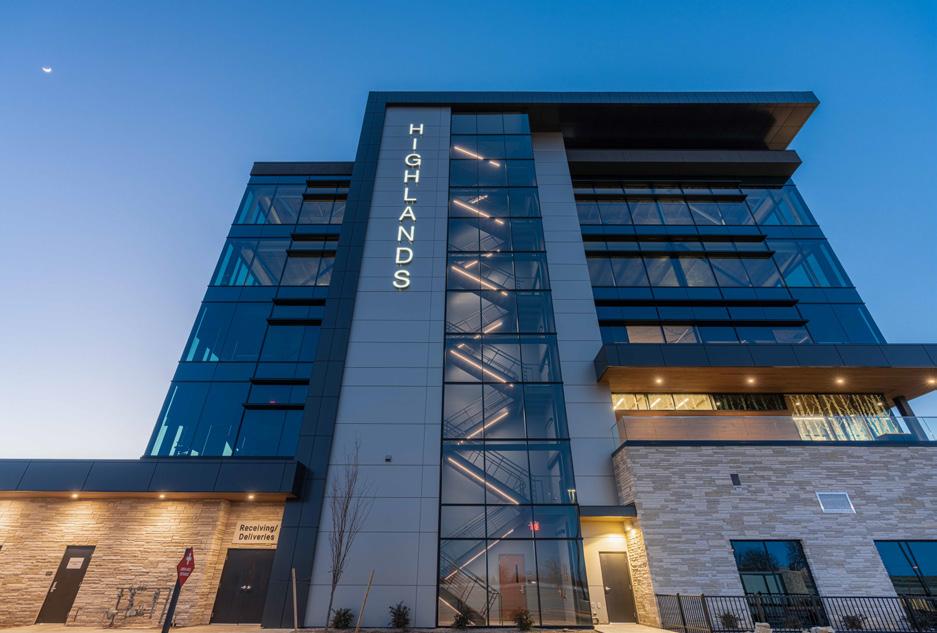

Chad S. Aduddell
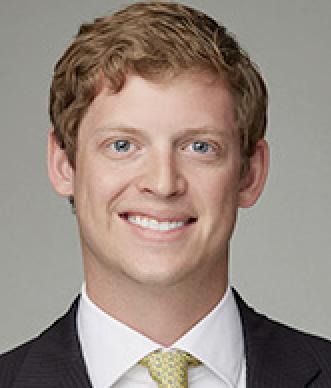
CHI St. Vincent
Little Rock
Chad S. Aduddell has been CEO of CHI St. Vincent since 2015. He previously served as executive vice president and chief operations officer of CHI St. Vincent and president of CHI St. Vincent Infirmary in Little Rock. Aduddell came to CHI St. Vincent from St. Anthony Hospital in Oklahoma City, where he served as president of the Bone & Joint Hospital and chair and administrator of Saints Heart and Vascular Institute.
Unity
Searcy
Mark Amox was appointed president and CEO of Unity Health in 2022. Prior to his role with Unity Health, Amox served as chief operating officer of Sunrise Children’s Hospital in Las Vegas, president and CEO of El Paso Children’s Hospital in Texas and administrator of Shands Children’s Hospital in Gainesville, Fla. Amox also spent eight years as the administrator of pediatrics at UAMS.
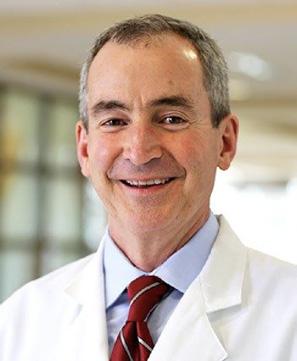
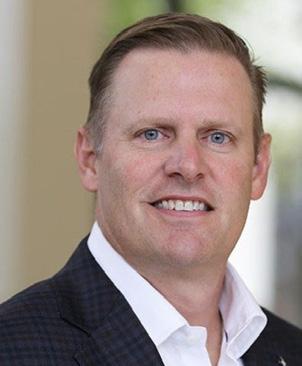
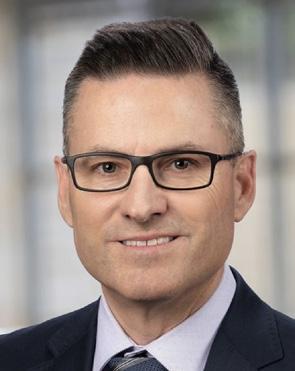
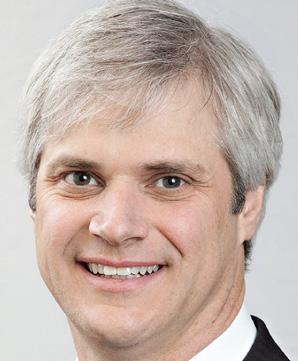
Chris Barber
St. Bernards Medical Center
Jonesboro
Chris Barber is president and CEO of St. Bernards Healthcare, which serves 23 counties in northeast Arkansas and southeast Missouri. In his three decades with St. Bernards, Barber worked his way up from intern to administrator before assuming his current role; he has now overseen the corporate operations of the nonprofit health care system for 13 years.
Shawn Barnett
CHI St. Vincent North
Sherwood
Shawn Barnett became COO for the Infirmary and North at CHI St. Vincent in 2019. He previously served as senior vice president and CFO of CHI St. Vincent. Barnett has an extensive background in health care administration, working for both for-profit and nonprofit health care systems. He came to CHI St. Vincent from CHI St. Luke’s Health-Memorial in Lufkin, Texas, where he served as president and COO. Before that, he was regional CFO for CHRISTUS Santa Rosa Health System in San Antonio.
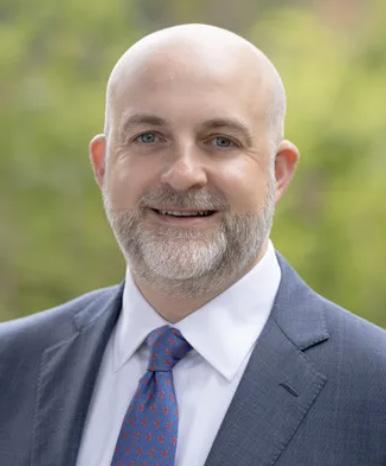
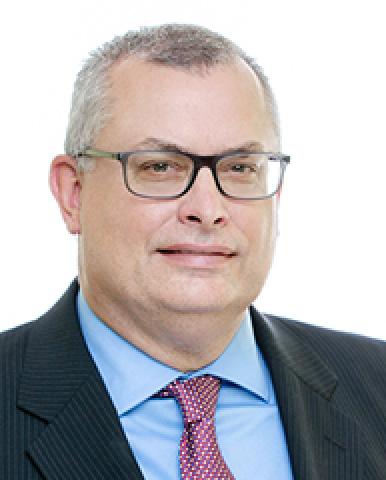
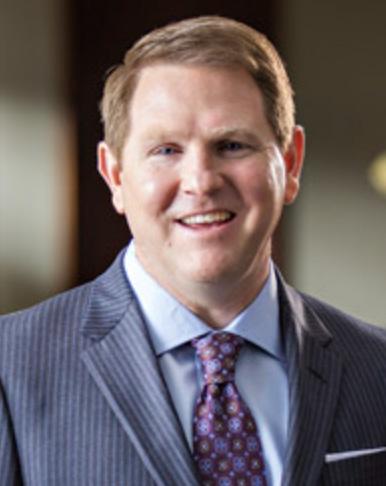
Jeff Carrier
Fort Smith
Jeff Carrier became president of the Baptist Health Western Region in 2022, assuming responsibility for Baptist Health’s hospitals in both Fort Smith and Van Buren. A registered nurse, Carrier previously served as president and CEO of Centura Health in Kansas, as well as holding multiple leadership positions over a span of 12 years at Freeman Health System in Joplin, Mo.
Rogers
Scott Snow Cooper serves as president of Mercy Clinic in Northwest Arkansas. Prior to joining Mercy in 2014, Cooper spent 18 years as an independent orthopedic surgeon in Northwest Arkansas. He previously served as president of the Arkansas Orthopedic and Arkansas Medical societies and currently is the state’s representative to the Board of Councilors for the American Academy of Orthopedic Surgeons.
Sammie Cribbs
North Arkansas Regional Medical Center
Harrison
Sammie Cribbs was appointed president and CEO of North Arkansas Regional Medical Center in 2022. Cribbs was previously named chief nursing officer in 2014, as well as vice president of Clinical Services and chief nursing officer in 2016. She joined the hospital in 2007 and has served in leadership roles since 2011.
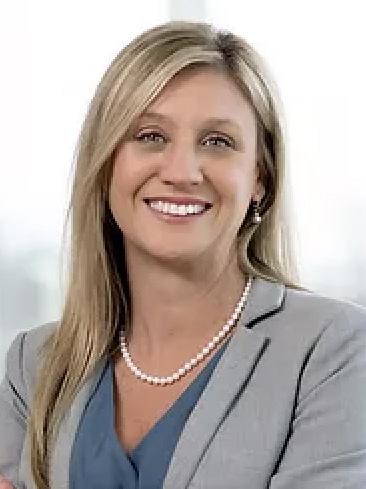
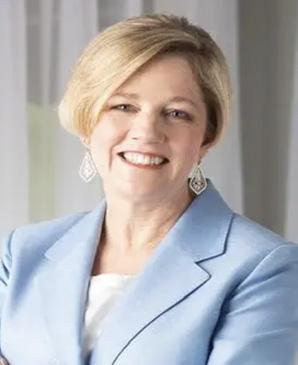
Marcy Doderer
Arkansas Children’s Hospital
Little Rock
Marcy Doderer was named president and CEO of Arkansas Children’s, the state’s only pediatric health system, in 2013. Prior to joining Arkansas Children’s, Doderer held various leadership positions at hospitals in Texas, including at CHRISTUS Santa Rosa Health System in San Antonio, CHRISTUS St. Joseph’s Health System and McCuistion Regional Medical Center in Paris and Presbyterian Hospital of Dallas.
Ryan Gehrig
Mercy Hospital
Fort Smith
Ryan Gehrig is the president of Mercy Arkansas Communities, where he leads all of the Mercy hospitals across the state. Gehrig joined Mercy in 2012 as the president of Mercy Hospital Fort Smith. He previously served as vice president of enterprise systems and chief administrative officer at Moore Medical Center in Norman, Okla., and as chief operating officer of Wesley Medical Center in Hattiesburg, Miss.

Russellville
Robert “Bob” Honeycutt joined Saint Mary’s Regional Health System as CEO in 2020. Honeycutt previously served as CEO at Ennis Regional Medical Center in Ennis, Texas and Parkview Regional Hospital in Mexia, Texas. He has held numerous leadership roles at hospitals across Arizona, Texas and Tennessee, among others.
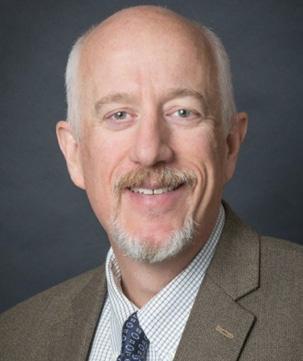
Michelle W. Krause, MD

UAMS Medical Center
Little Rock
Michelle W. Krause was named CEO of UAMS Medical Center and senior vice chancellor of UAMS Health in 2023, having held in both roles on an interim basis since 2022. Krause has been with UAMS since 2002 and most recently served as chief clinical officer. She previously held numerous administrative positions, including ambulatory medical director, vice chair for clinical programs of the department of internal medicine and director of the integrated medicine service line.
Sam Lynd
NEA Baptist Memorial Hospital
Jonesboro
Sam Lynd was named administrator and CEO of NEA Baptist Memorial Hospital in 2020. Lynd previously served as COO for Baptist Memorial Hospital - Memphis and administrator of Baptist’s emergency services system wide. Lynd joined the Baptist Memorial Health Care system in 2011 and previously served as CEO of Baptist Memorial HospitalTipton in Covington, Tennessee in 2014.
Rick Naegler
Northwest Medical Center
Springdale
Rick Naegler was named market CEO of Northwest Health and CEO of Northwest Medical Center - Springdale in 2023. Naegler joined Northwest Health from Poplar Bluff Regional Medical Center in Poplar Bluff, Mo, where he was CEO. He was previously CEO and chief nursing officer of Lake City Medical Center in Lake City, Fla., and has served as chief nursing officer at other hospitals in Florida and Texas.
Gary Paxson
White River Health
Batesville
Gary Paxson, RN, BSN, MS, FACHE, is the president and CEO for White River Health. He is a fellow of the American College of Healthcare Executives and serves on the Board of the Arkansas Foundation for Medical Care and the Arkansas Hospital Association. He is also a member of the Lyon College Board of Visitors, where he serves as chair of the Finance Committee. He also sits on the Arkansas Health Executives Forum board.
Mike Perkins
Baptist Health Medical Center
Little Rock
Mike Perkins is president of Baptist Health Medical Center-Little Rock, with additional oversight for Baptist Health Rehabilitation Institute, Baptist Health Extended Care Hospital and Baptist Health College Little Rock. Perkins has been with Baptist Health for over three decades in various positions, including president of the North Little Rock medical center and vice president and administrator of Baptist Health’s rehabilitation institute and extended care hospital.
Ron Peterson
Baxter Health Mountain Home
Ron Peterson is president and CEO of Baxter Health, formerly Baxter Regional Medical Center, and has served in that capacity since 2007. Previously, Peterson served as president and CEO of Regional Medical Center, a division of Trover Health System in Madisonville, Ky.
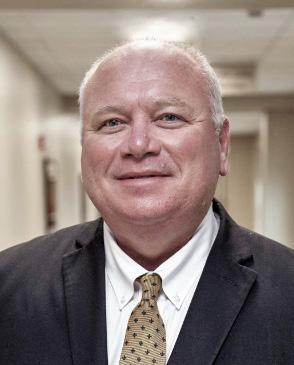
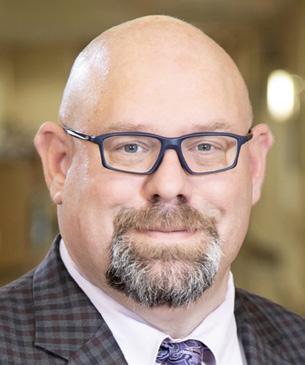
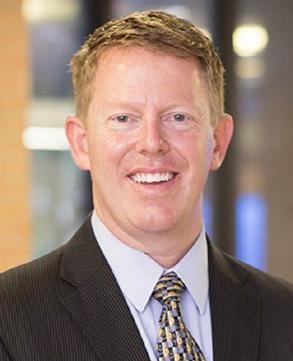
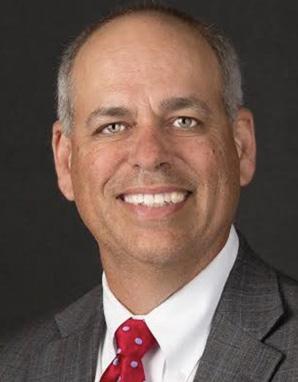
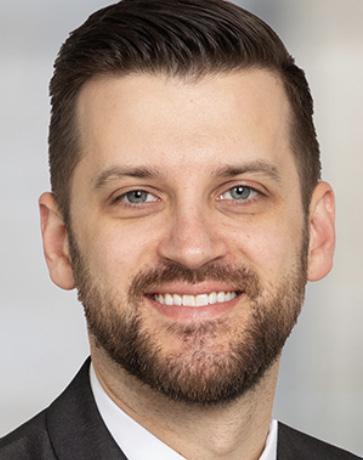
CHI
Hot Springs
Doug Ross, MD became president of CHI St. Vincent Hot Springs in 2019 and has also served as senior vice president and chief medical officer since 2018. He was previously CHI St. Vincent Hot Springs’ vice president of medical affairs. Ross joined the hospital in 2003 as an emergency medicine physician when it was Mercy Hot Springs. His former roles include chief of staff, medical director of informatics and medical director of the emergency department.
Arkansas State Hospital
Little Rock
James Scoggins has served as CEO of the Arkansas State Hospital, the only state-operated acute psychiatric inpatient hospital, since 2019. He has held various leadership roles since joining the hospital in 1997, including director of utilization review, director of admissions and chief nursing officer.
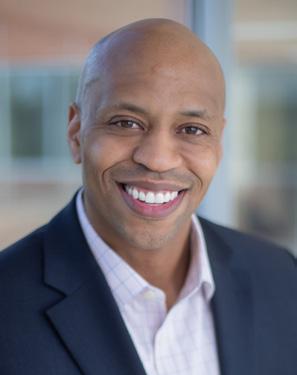
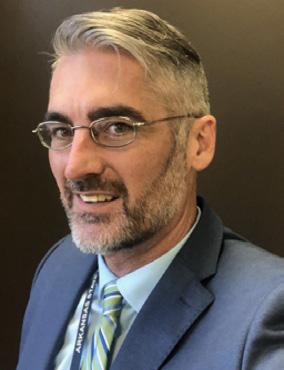
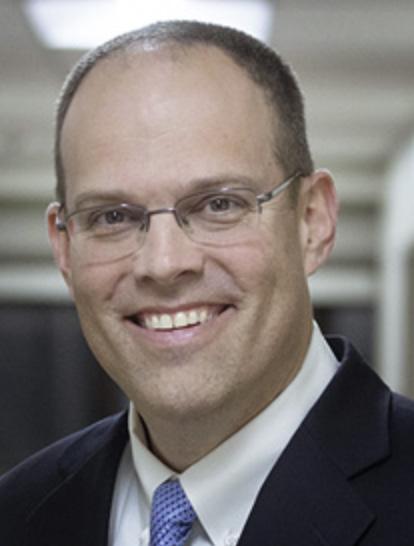
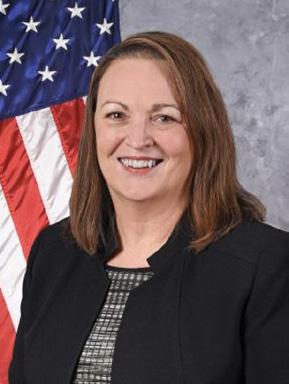
Margie A. Scott was appointed director of the Central Arkansas Veterans Healthcare System in 2016. Scott has previously served in a number of positions across the health care system, including laboratory director, chief of pathology and laboratory medicine service, chief of staff and interim medical center director. Before her appointment to CAVHS, Scott served as the faculty and clinical laboratory director at Vanderbilt University in Nashville.
Washington Regional Medical Center
Fayetteville
J. Larry Shackelford was named president and CEO of Washington Regional in 2017. Shackelford joined Washington Regional in 2010 and served as vice president of strategy and outreach before assuming his current role. Before coming to Washington Regional, Shackelford was CEO of Medical Associates of Northwest Arkansas and worked for the accounting firm Baird, Kurtz and Dobson.
Scott Smith
National Park Medical Center
Hot Springs
Scott Smith has served as CEO of National Park Medical Center since 2020. Smith also serves in the expanded leadership position of market CEO; he oversees both National Park Medical Center and Saline Memorial Hospital, which are both LifePoint Health facilities. Prior to joining National Park Medical Center, Smith was CEO of Western Plains Medical Complex in Dodge City, Kan. He has been part of LifePoint Health since 2006.
Michael Stewart
Saline Memorial Hospital
Benton
Michael Stewart has served as CEO of Saline Health System since 2018. Prior to joining Saline Health System, Stewart had been CEO of Navarro Regional Hospital in Corsicana, Texas, since 2014. Stewart previously served as COO and administrator for Northwest Health System in Springdale and spent seven years in various hospital leadership roles in California and Florida.
Danna Wagnon Taylor
South Arkansas Regional Hospital
El Dorado
Danna Wagnon Taylor is the interim president of South Arkansas Regional Hospital, formerly the Medical Center of South Arkansas, as the hospital transitions to its new status as a locally governed nonprofit hospital this year. Taylor previously served in other leadership roles at the Medical Center of South Arkansas, including chief quality officer and vice president of operations.
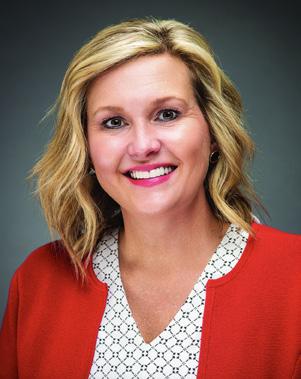
Brian Thomas
Jefferson Regional Medical Center
Pine Bluff
Brian Thomas has served as president and CEO of Jefferson Regional Medical Center since 2017. Thomas first joined Jefferson Regional in 1998 as the director of physician practices and operations support; he then went on to hold various leadership positions at other hospitals, including Howard Memorial Hospital in Nashville, Arkansas, J.F.K. Memorial Hospital in Indio, California and Crestwood Medical Center in Huntsville, Ala.
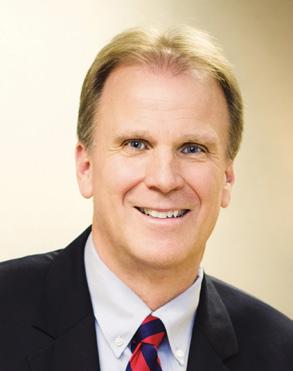
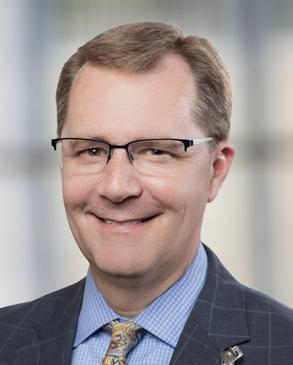
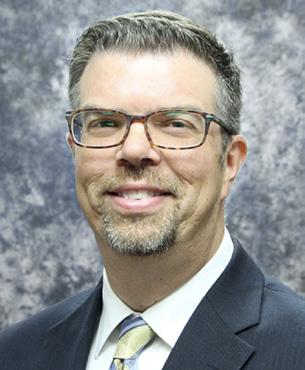
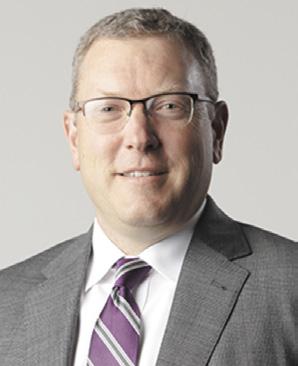
Matt Troup
Conway Regional Health System

Conway
Matt Troup is the president and CEO of Conway Regional Health System. Troup has more than 20 years of executive leadership experience in the health care industry and has held various administrative roles at hospitals in Texas, Oklahoma and Florida. Before joining Conway Regional in 2015, Troup served as vice president of ancillary and support services at CHI St. Vincent.
Cody Walker
Baptist Health Medical Center-North Little Rock
North Little Rock
Cody Walker is president of Baptist Health Medical Center-North Little Rock. Walker previously served as vice president of hospital operations at the Little Rock medical center. Before joining Baptist Health in 2020, Walker held various titles at Brookwood Baptist Health in Birmingham, Ala., including market administrator, interim COO and associate administrator.
CARTI Surgery Center isn’t just the very first dedicated cancer surgery center in Arkansas – it’s truly a one in a million facility. It’s equipped with leading-edge technology and staffed by expert surgical oncologists, all just steps away from CARTI Cancer Center in Little Rock. When it comes to cancer surgery, you have a choice – ask for CARTI Surgery Center.
WHAT SETS CARTI SURGERY CENTER APART?
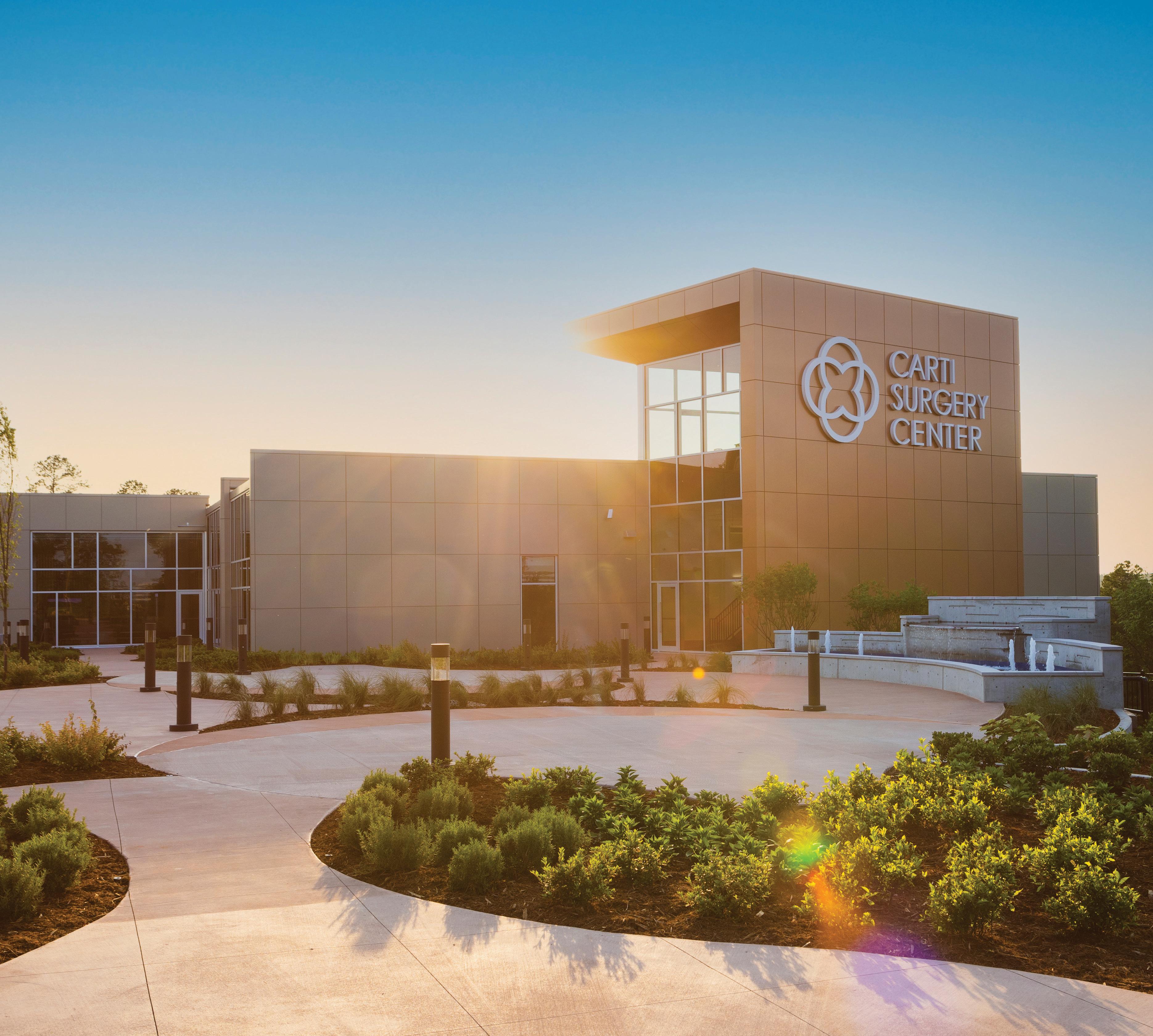
• 8 private rooms
• 12 recovery rooms
• 14 pre-op & post-op rooms
• 3 procedure rooms
• Minimally invasive surgical robots
• 6 large operating rooms
• 57,000 square feet of comfortable, serene space
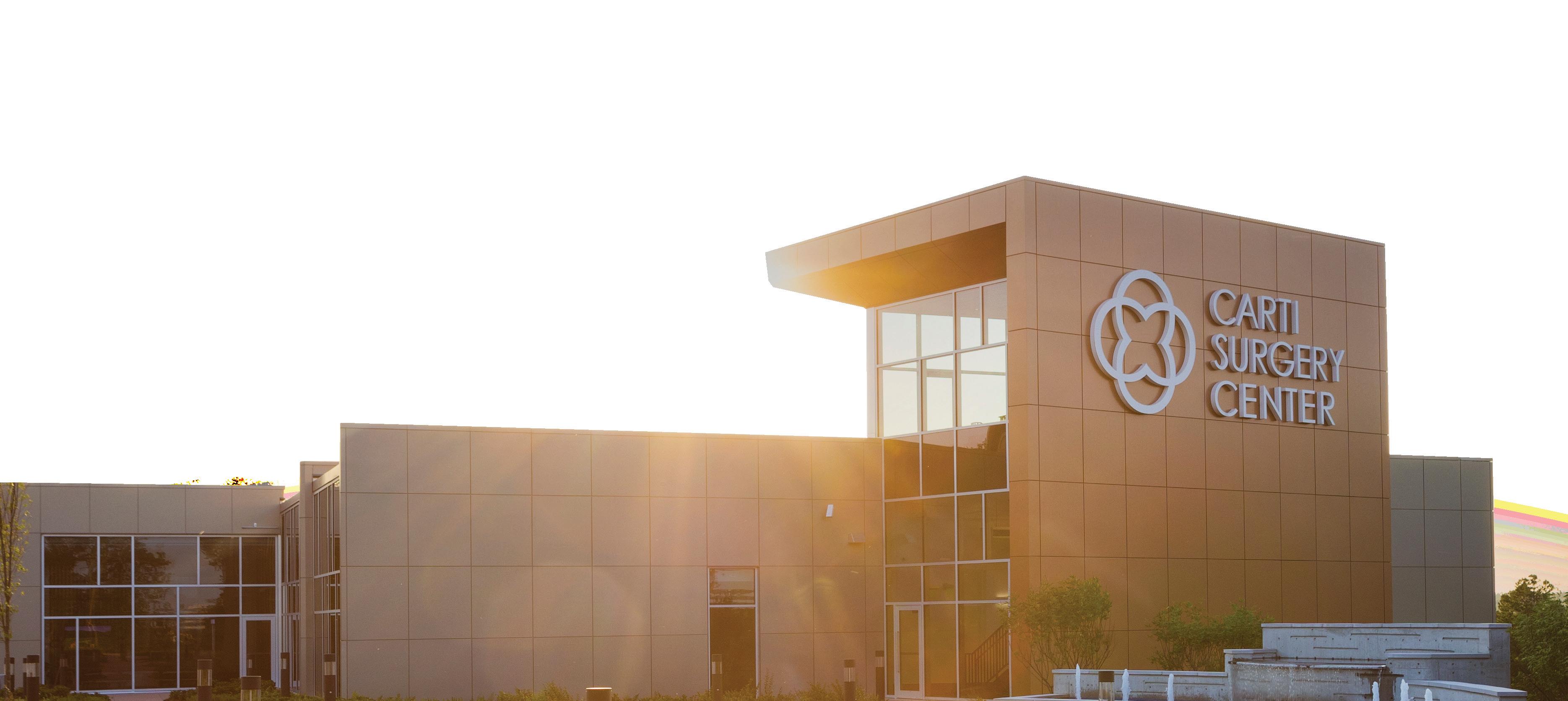
This year, AMP readers selected 85 health-care professionals and institutions across the state to be recognized as Champions of Health Care in 16 categories ranging from physicians and RNs to rural hospitals and allied health care providers. As they continue to work the front lines to help keep us all safe, we salute these true Champions of Health Care.

For all the technological innovations and hard-won medical knowledge improving health outcomes by the day, it is often the empathy shown by those wielding that knowledge that has the most profound impact on patients. That’s not to say that every “people person” is cut out for the strenuous demands of the industry. But for those professionals whose social skills are matched by a bone-deep caring instinct and a drive to help others, there is no greater calling than health care. Though he supposes it’s “a bit cliché” to say, Shane Frazier, CEO of Pinnacle Pointe Behavioral Healthcare System, readily admits to being one of those people. “I have always been a people person,” he said. “When I began considering career paths in college, health care seemed like a natural fit, where I could combine my love for people with a desire to make a positive impact on the world around me.”
Frazier entered the field through nursing, obtaining his degree at the University of Central Arkansas in Conway and spending several years with CHI St. Vincent in Little Rock. As he grew and took on different roles, he gained experience across several service lines and areas of care. Even after earning his MBA and transitioning into leadership, he maintained a passion for behavioral health above all. So, when the opportunity to join Pinnacle Pointe arose, it was an obvious career choice. Nine years into his tenure as CEO of the Little Rock system, Frazier also serves as Group CEO supporting Rivendell Behavioral Health Services and The BridgeWay in Central Arkansas.
“I do not take the privilege of caring for others lightly. It’s a tremendous responsibility to care for someone when they are hurting or vulnerable,” he said. “I hope that I’ve poured good things into Pinnacle and the health care of our community so I can leave it better than I found it.”
In his time at Pinnacle Pointe, Frazier has seen the psychiatric treatment center evolve to provide a full spectrum of care to families. Whether it’s inpatient, sub-acute
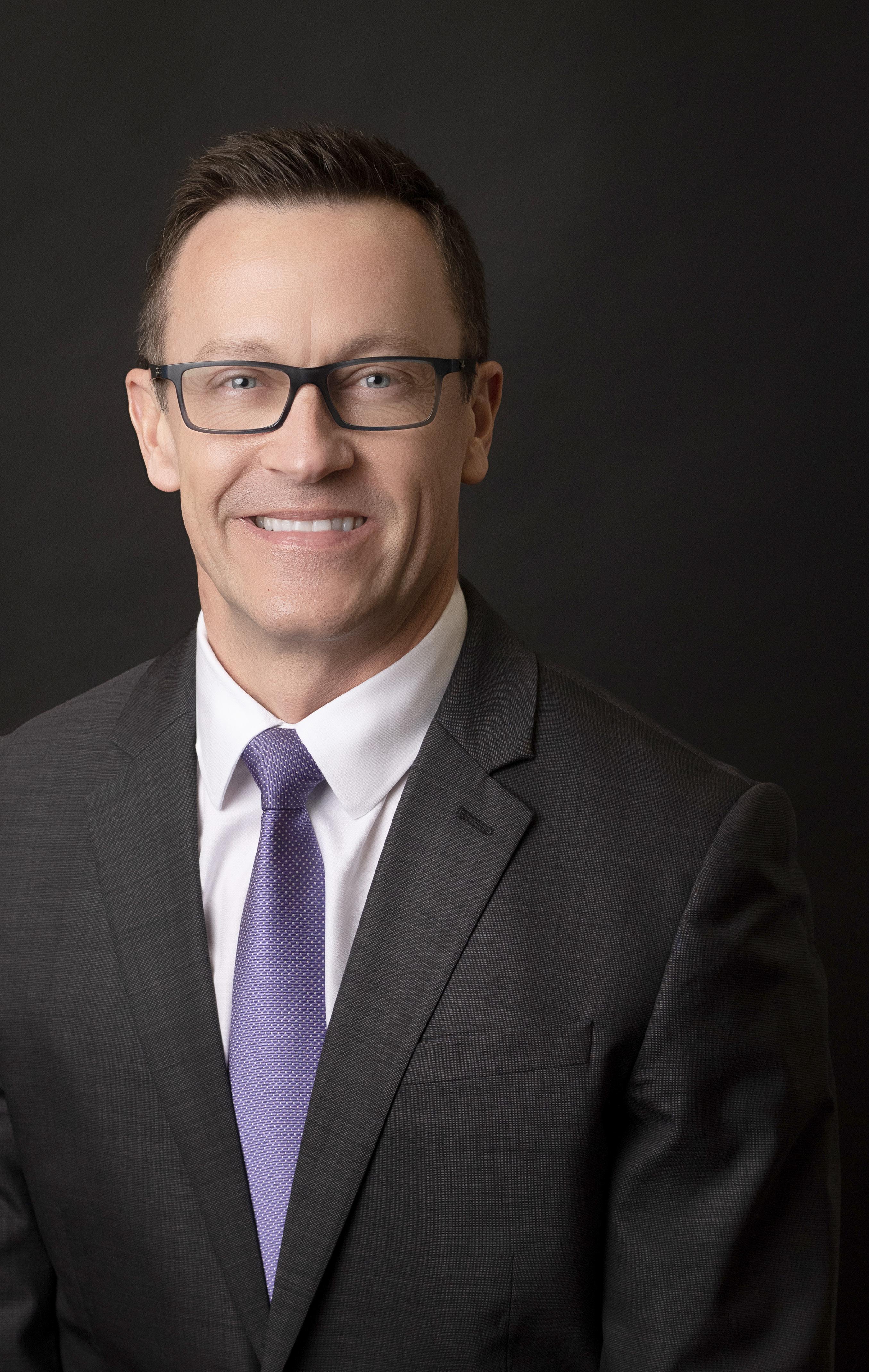
or traditional outpatient care, or even school- or community-based services, Pinnacle Pointe works to meet people where they are.
“Hands down, the most rewarding part of my work is seeing patients get better. I love to hear from the patients or their families how our team helped them get their life or loved one back,” Frazier said. “Our team gives of themselves daily to pour life into others who have often lost their will to live. Their jobs are often emotionally exhausting, but they show up day after day in big ways to help others.”
In addition, Pinnacle Pointe has significantly increased its outreach to military families under Frazier’s leadership. That extra investment has not only benefited the families Pinnacle Pointe serves, it also has earned the health system a Patriot Support Program designation — an accomplishment shared by only nine other child and adolescent facilities across the country.
“Military families have unique needs given the challenges of relocation, deployment and other issues the civilian world rarely encounters,” Frazier said. “Our team has undergone training and education to better understand these unique challenges and offer healing and support to our military families.”
Frazier’s commitment to military families extends beyond the walls of Pinnacle Pointe. He was an honorary commander at the Little Rock Air Force Base for three years and continues to serve on the LRAFB Community Council.
“[I] was able to see firsthand the incredible dedication, sacrifice and resilience of our military families in action,” he said. “It was one of the most rewarding experiences I’ve ever had in my professional life, so I try to stay connected in support of
the base as much as possible.”
Despite the change in scenery from the nurse’s station to the C-suite, Frazier’s nursing experience keeps him grounded in the real meaning behind his work. For him, if the “why” is there, the “what” will fall into place accordingly.
“Regulatory issues, managed care issues and continually changing technology are multi-faceted variables in the delivery of health care in our country. However, they’re distractions from the ‘why’ of what we do,” he said. “None of those issues can take precedence over just doing right by the patient.”
Frazier has seen a lot of changes over his 25 years in the industry, and he is transparent about the challenges — both old and new — that face caregivers at every level of behavioral health.
“Something I often discuss with my team is how patients with a medical illness like cancer or heart disease seek care because they are fighting to live,” he said. “Often in mental health care, it’s the opposite. The patients have lost their hope or their desire to live altogether, while others suffer from an addiction to substances that could end their life if they don’t choose treatment to save them, yet they often contest treatment.
“The patient may come to our facility because a family member or loved one has convinced them to seek care, but oftentimes, due to the nature of their illness, they may lack the desire to get better. It can be tough on our team members, who are wired to help people get better, to work with patients who lack the desire to get better. But the incredible caregivers I am privileged to work with never cease to find ways to convince the patient to ‘want’ to get better and convince them life is worth living.”
One of the most significant trends Frazier has noticed recently is the impact of social media on mental wellbeing. People of all ages can be vulnerable to the negative effects of the internet age, but these consequences can be es-
pecially severe in children.
“We are seeing kids younger and younger with serious and persistent mental illness. The increase in anxiety disorders, depression and issues of selfharm are pervasive,” Frazier said. “Social media platforms have emboldened individuals to say and do things that weren’t allowed, much less advertised, in the past. This constant stream of information often overwhelms individuals to the point where they struggle to function or seek whatever means necessary to escape.”
No matter the given obstacle, Frazier emphasized the importance of having the right mindset as a team to better serve others. If the goal is to change lives, he explained, health care can never be just a “job.”
“Every member of the team must carry out a personal calling to help others, or it will weaken the entire team,” Frazier said. “Behavioral health is a challenging field. It can lead to people approaching a situation with a ‘What is wrong with you?’ mentality, because it’s counterintuitive to think someone might not want to get better. However, if we approach every patient with a ‘What happened to you?’ mentality, it can completely change the interaction from one of judgment to one of empathy, and that makes all the difference.”
Frazier hopes to be an example for his team in this regard. He wants everyone he works with to feel his passion for the work and be inspired by the same vision that pulls him out of bed every day.
“Our mission statement is simple: ‘To Hope, To Heal, To Laugh, To Live.’ We offer hope to the hopeless to begin a path to healing. Healing will bring joy and laughter, and this will empower one to live again. If each member of our team brings this spirit to every interaction, our vision will be fulfilled — nurturing broken lives, healing families and transforming behavioral health care by providing the best care in Arkansas.”











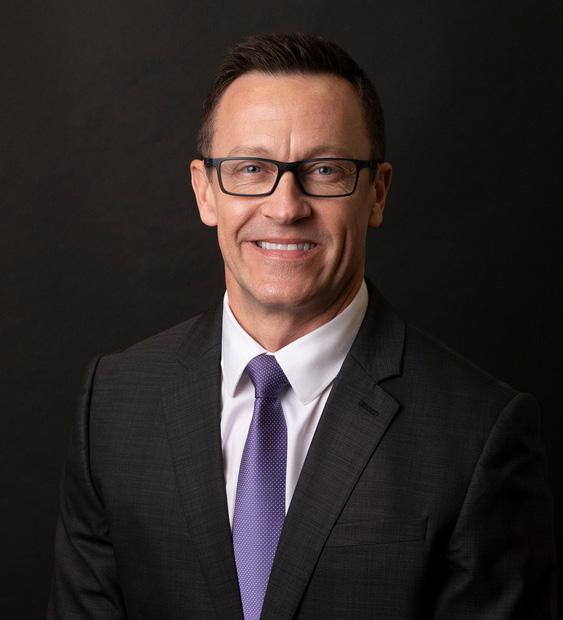
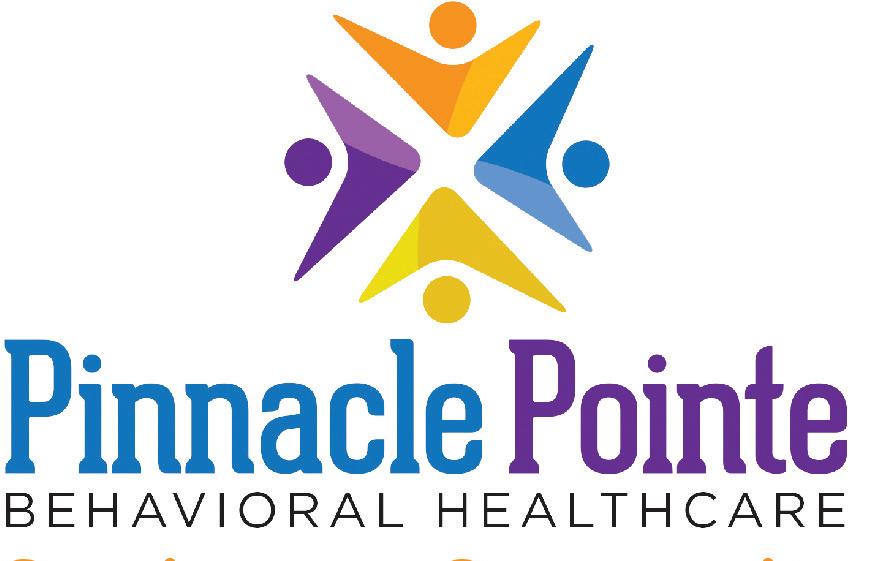
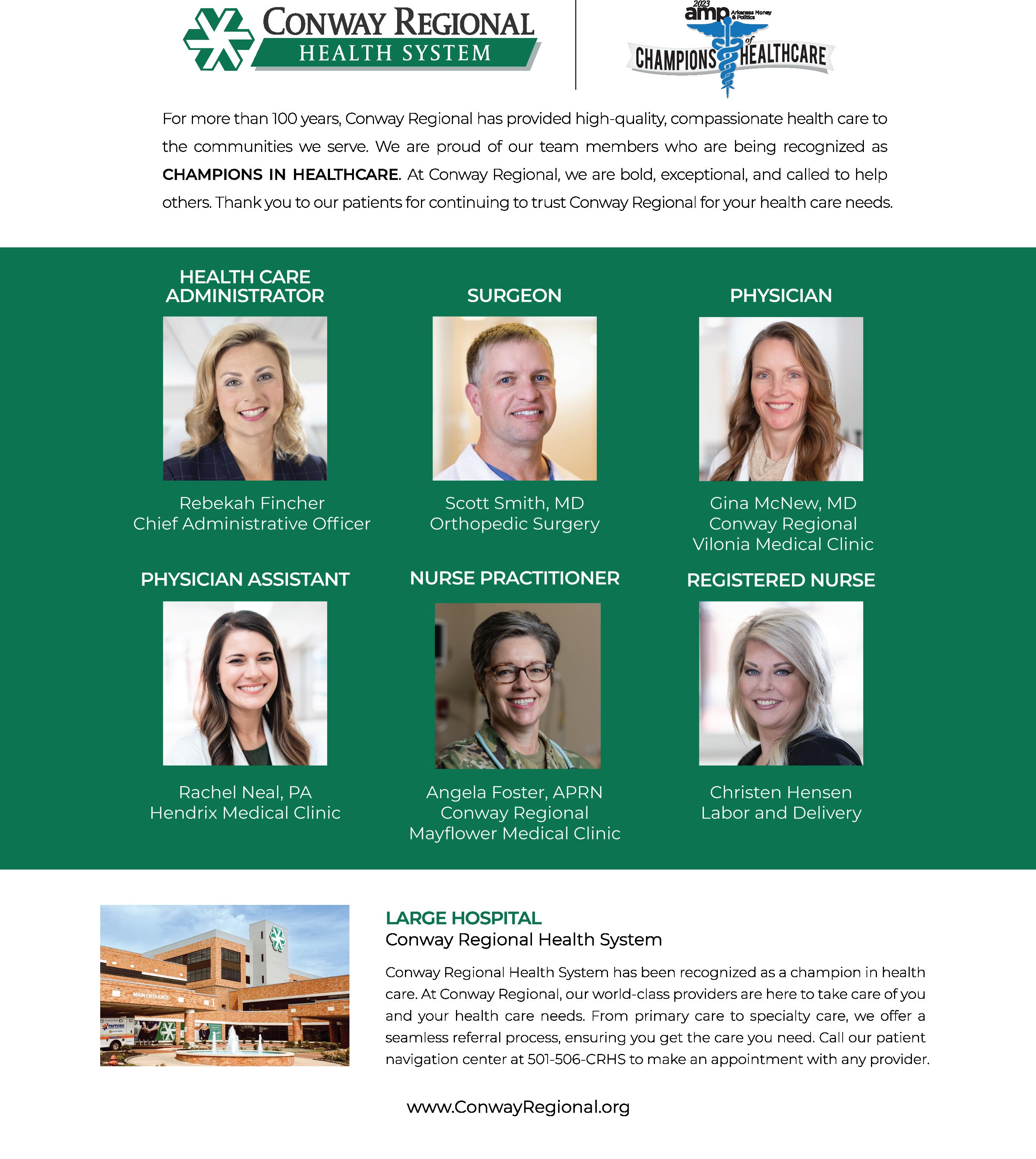
Afew minutes into an interview, Baptist Health President and CEO Troy Wells, discussing the health system’s culture, lobs a remark across the table that’s taken as self-deprecating throwaway. Even though he’s been at Baptist Health for 18 years, he said, sometimes he still feels like the new guy.
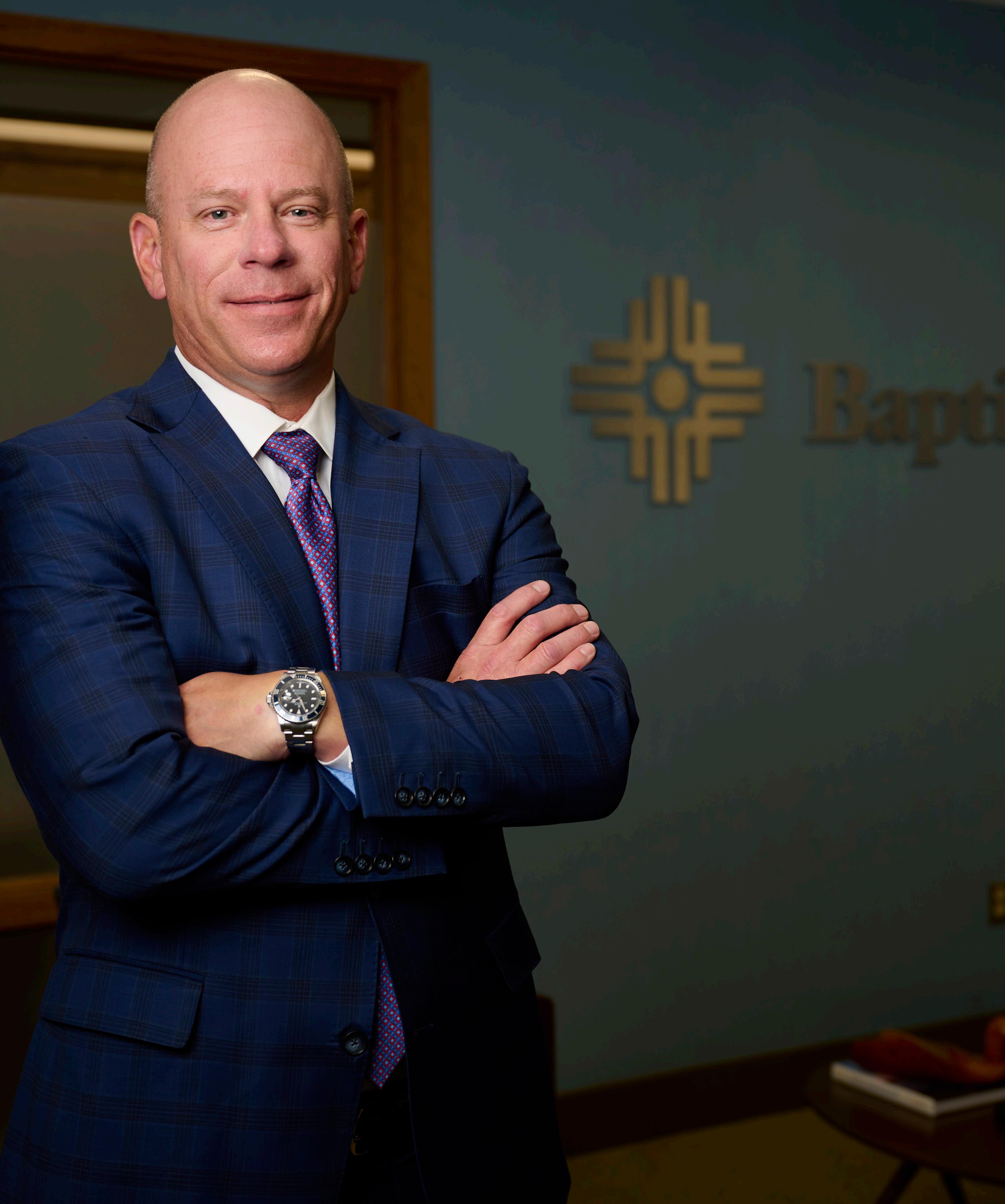
Wells came to work for Baptist Health in 2005 after the rural hospital he was running was sold. Wells knew Russ Harrington, then the CEO of Baptist Health, through industry networking and called him for advice. Harrington told him to show up and he’d find something for Wells to do. Wells took on whatever role or task Baptist needed done at the time. He ranged across departments and got a broader view than most administrators in any industry, picking up an invaluable perspective on the people, culture and mission of the institution.
When Harrington announced his retirement in 2015 after 40 years at Baptist Health, the board of directors decided to forego a nationwide headhunting effort. Instead, it voted to move Wells into the position. He’s been in charge ever since.
Wells’ entry into the health care industry almost didn’t come about. After graduating from the University of Arkansas in Fayetteville, he knocked around for a year, not sure what he wanted to do. He ran into a college friend who extolled the value of a graduate program in health services administration offered by the University of Arkansas at Little Rock.
Wells earned that degree, and a graduate fellowship at St. Joseph’s Hospital in Hot Springs followed, leading him to become administrator of Newport Hospital. There, he learned the day to day of running a hospital and experienced at ground level the issues involved in providing health care to a rural community.
“Coming from a rural hospital to work for the biggest health system in the state was intimidating,” Wells said. “I thought, there’s got to be all these people here that know something that I don’t know. This system is huge, it’s sprawling and I kind of felt lost.”
Founded in 1929, Baptist Health has grown into Arkansas’ largest private, not-for-profit health system, with more than 10,000 employees handling more than 20 percent of hospital business in the state. The organization is, inarguably, a cornerstone of the state’s health care system.
What kept Wells on course was Baptist’s mission. “A lot of people do the same things we do,” he said, “but what differentiates us is the reason why we do what we do.”
Wells stressed that this unity of mission, the ministry, makes Baptist Health’s culture such a palpable one.
“We put people first and foremost. Historically, we have made decisions that favor people over anything else, knowing that sometimes it’s not the textbook business decision. At least, in the short term.
“That mission is why we have so many long-tenured leaders and employees here. They know what we’re doing and why we’re doing it. It creates a feeling of family.”
Wells didn’t so much have to instill a corporate culture at Baptist as to stay true to it in driving the organization’s growth.
“Arkansas is very rural. You have people spread out in a way that makes it difficult for them to access health care,” he said. “I think that health systems here have a responsibility to help communities that don’t have access to health care.”
For Baptist Health, this outreach includes sending physicians to more remote regions on a periodic basis, helping to operate rural hospitals that need help and increasing the use of virtual health appointments and other technologies.
“Our strategic planning breaks down growth into two compo-
nents,” Wells said. “Service growth and growth of the Baptist system.”
The long-term trend has been for more and more services to move outside of a hospital’s walls. “A lot of health care delivered today is in ambulatory environments, physicians’ offices, surgery centers, events that can happen outside the massive institutional settings that are hospitals,” Wells said.
“There are some things, like high-end emergency care, critical care medicine and high-intensity surgical care, that will most likely continue to need to be accomplished inside a hospital.
“We’re also the largest volume provider of women’s health services across the state. We deliver a whole lot of babies. It’s vitally important that we make sure we do the hospital things really well.”
The trend toward consolidation among hospitals means Baptist Health sees opportunities to grow the system, too. “We’re in the middle of bringing Drew County Memorial in Monticello into our system,” Wells said. “And we anticipate that there could be other hospitals that would be interested in talking with Baptist about becoming part of our system at some point in the future.”
Asked about Baptist Health’s biggest challenge ahead, Wells didn’t hesitate.
“Manpower,” he said. “Labor is tight everywhere, but our industry needs a workforce with highly specialized training, nurses and respiratory therapists, physicians and pharmacists.”
Wells is proud of the actions Baptist has initiated to help create the workforce it needs. He noted in particular the system’s Graduate Medical Education program partnership with the University of Arkansas for Medical Sciences.
“We’re training 117 physicians there — internal medicine, psychiatry, family medicine and transition students.”
Baptist has also partnered with high schools to introduce young people to
the possibility of health care careers at a much younger age.
“We are going to keep going upstream to try and solve some of our manpower problems,” he said. “We don’t expect a payoff in the short term, but these efforts are going to have a positive impact on the state for generations.
“Fundamentally, our business is people that need care and people who can provide that care. The job of our leadership team is to help those two groups get together, to support them and to make it all happen efficiently.”
Wells said taking this long-game approach is the backbone of Baptist Health’s strategy to streamline management of the complex, sprawling issues facing today’s health care players.
“You have to think about it like that,” he said.
Still, after almost a decade at the helm, Wells still feels like the new guy.
“While we are continuously bringing new talent into the Baptist system, the average tenure of our leadership team is 13 years. Our head of human resources has been with us 36 years, the central region president 28 years, the chief nursing officer 32 years, the EVP of strategy and innovation 35 years and the president of the medical center in Little Rock for 31 years.” He could’ve gone on with more examples. Wells’ line about feeling like the new guy wasn’t a throwaway; it reflects a deeper truth about the long-term culture of the Baptist Health system.
“We put people first and foremost. Historically, we have made decisions that favor people over anything else, knowing that sometimes it’s not the textbook business decision. At least, in the short term.”
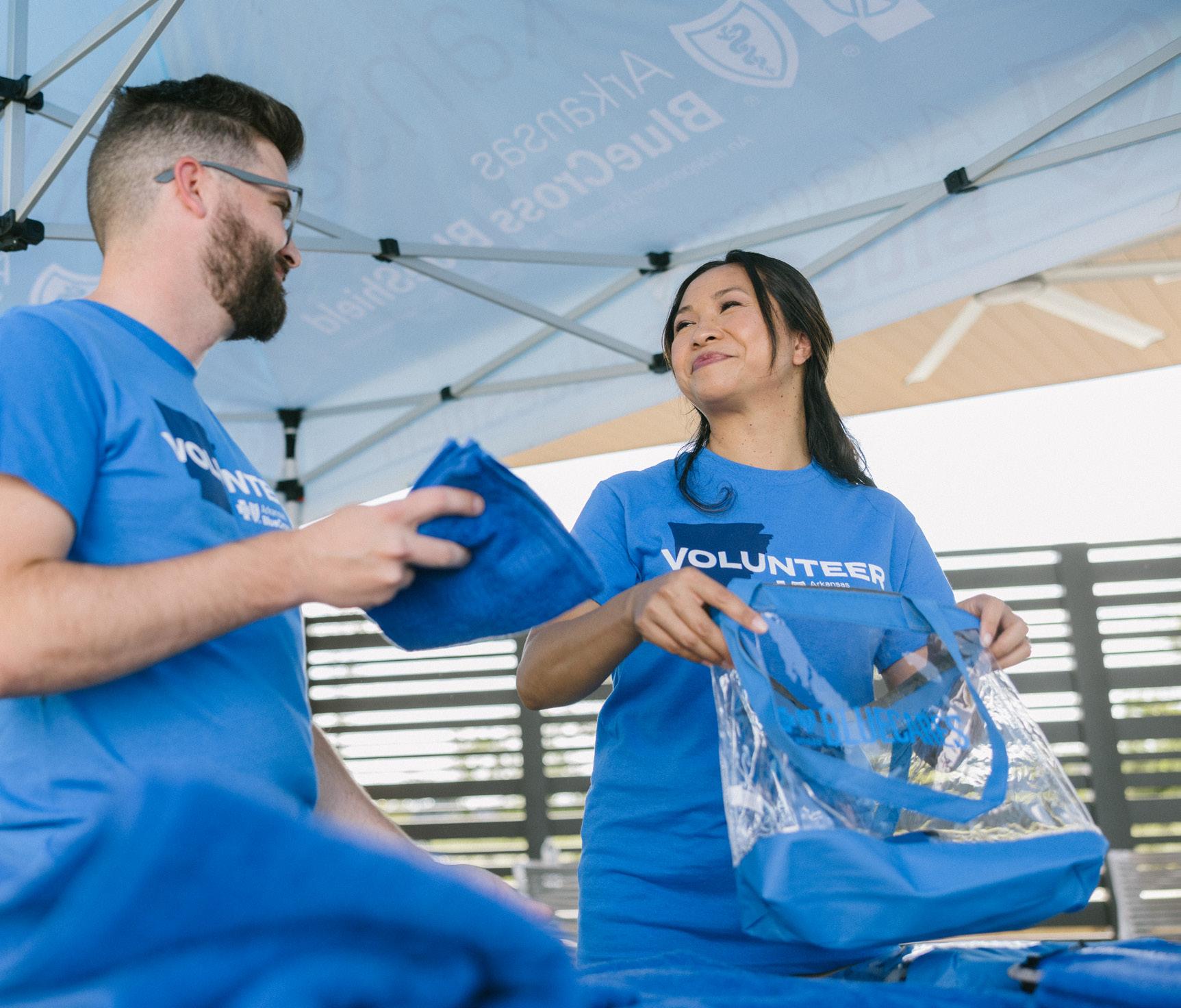



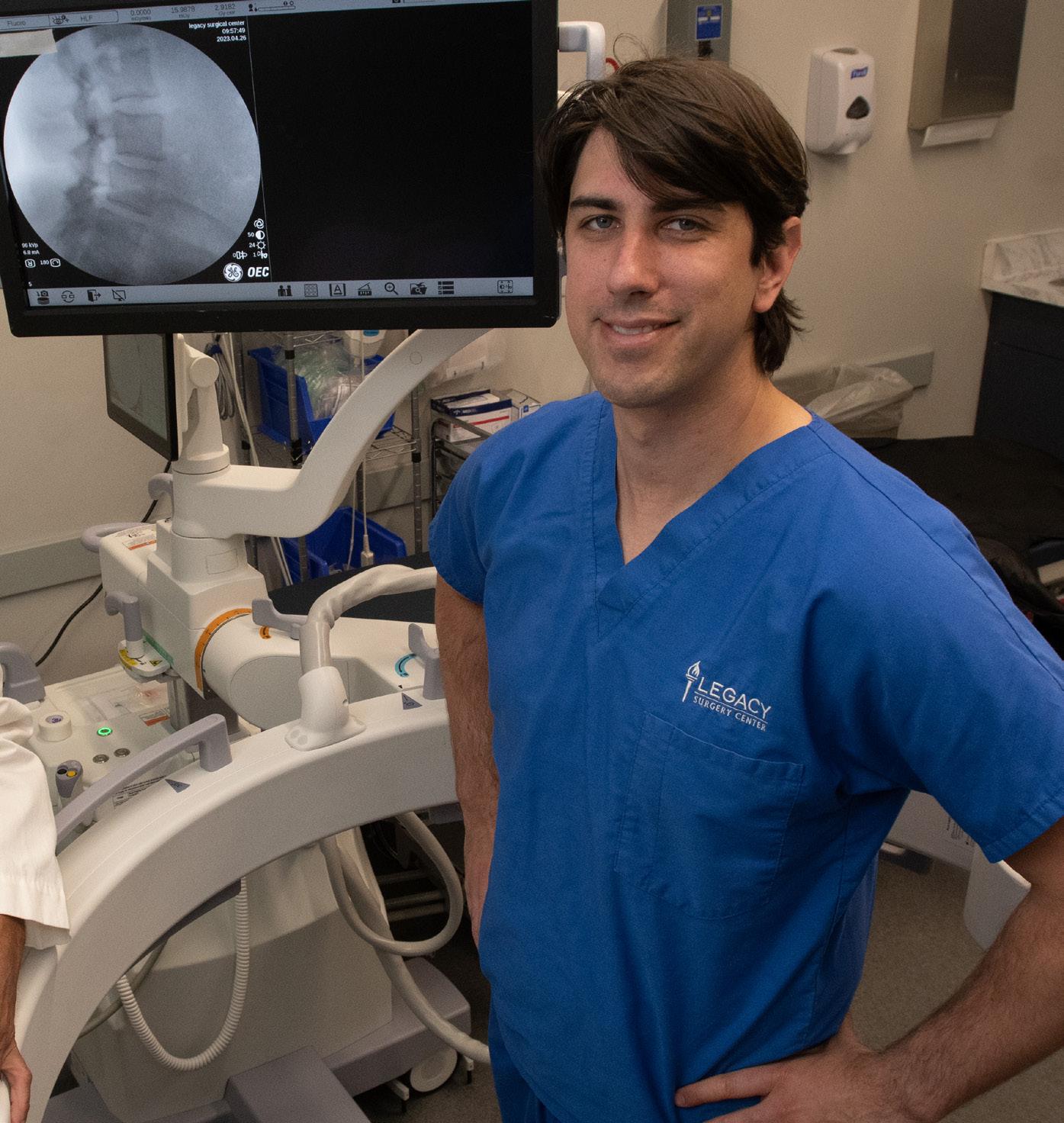

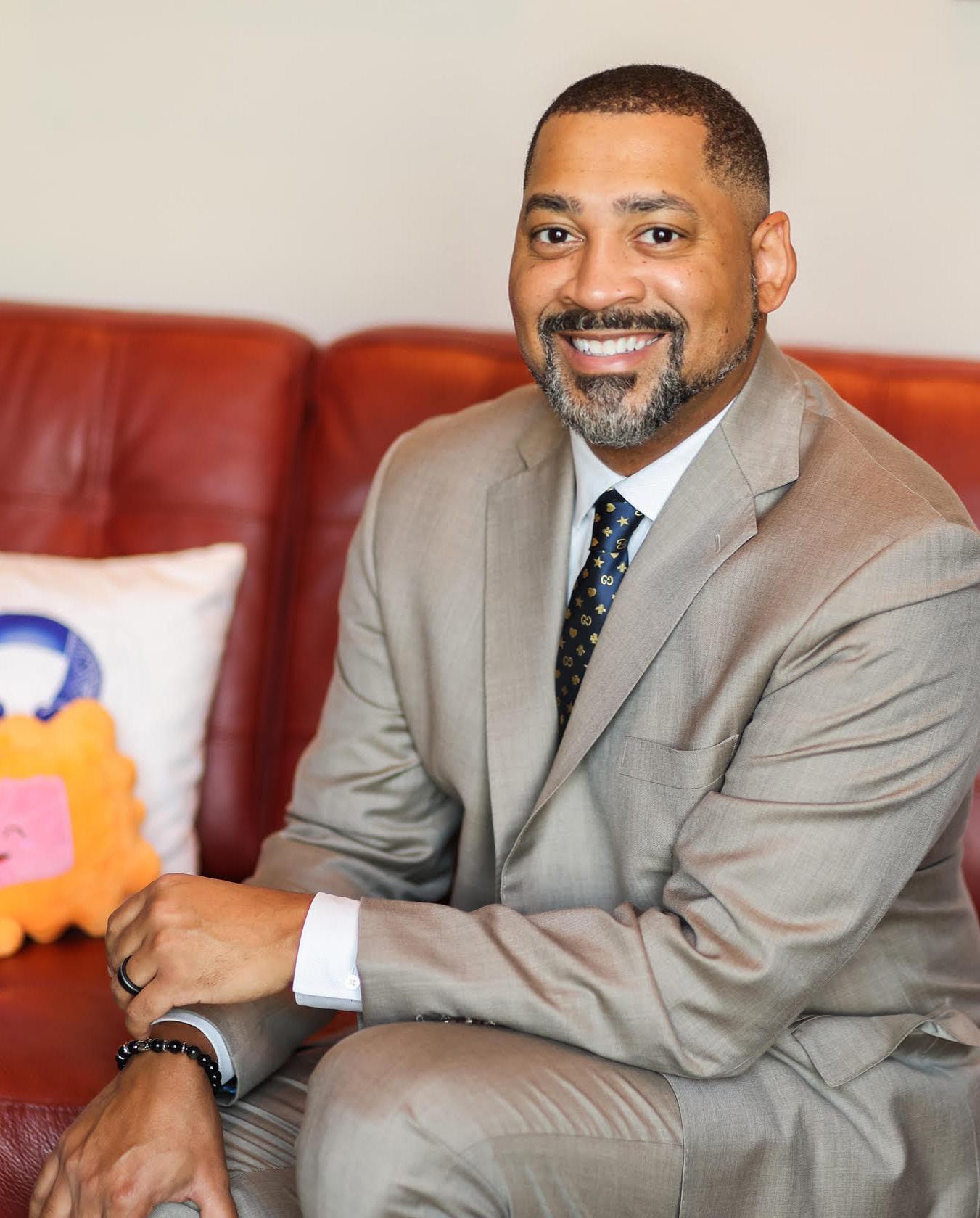

This year, AMP readers selected 85 health-care professionals and institutions across the state to be recognized as Champions of Health Care in 17 categories ranging from physicians and RNs to rural hospitals and allied health-care providers. As they continue to work the front line to help keep us all safe, we salute these true Champions of Health Care.

CHRIS BLACKMON
Blackmon Chiropractic
AMANDA BLEDSOE
Bledsoe Chiropractic


WILLIAM F. HEFLEY, MD
Arkansas Surgical Hospital
Arkansas Surgical Hospital was founded in 2005 by surgeons seeking a more direct and rewarding experience for their patients. The hospital continues to be physician-owned, meaning surgeons are the decision-makers. Champion William F. Hefley Jr., an orthopedic surgeon and physician owner, specializes in minimally invasive surgeries of the knee, hip and shoulder, including arthroscopic and joint-replacement procedures. Hefley has led clinical research trials and served on design teams that help develop new implants for hip and knee replacements.
DEREK LAGEMANN, PT, DPT, FAAOMPT














































Physical Therapy Institute
Physical Therapy Institute (PTI) is a growing private practice with five locations throughout central Arkansas, providing physical, occupational and speech therapy. Its goal is to provide the highest quality rehab services through hands-on care and medical exercise training, educate the patient on their specific pathology, and provide the patient with lifelong self-management.
ROB TILLMAN
Ortho Rehab & Specialty Centers






































































KEVIN BURTON
Unity Health-Jacksonville

Kevin Burton serves at Unity Health–Jacksonville as administrator, where he leads with integrity and shares his ex-
pertise, experience and encouragement. Burton holds a Bachelor of Business Administration degree and a Master of Business Administration degree from Harding University. As a leader, Burton believes it is vital to learn how to listen, serve and value others. Burton is a thoughtful leader with a passion for serving the Jacksonville community and providing the best in health care.
CARSON COPLEN

Cornerstone Clinic for Women
REBEKAH FINCHER
Conway Regional

As chief administrative officer, Rebekah Fincher is responsible for strategy, growth and business development for Conway Regional Health System. In her role, Fincher provides executive oversight of the organization’s physician enterprise including clinic sites, medical staff affairs, physician relations and recruitment, corporate health services and marketing and public relations.

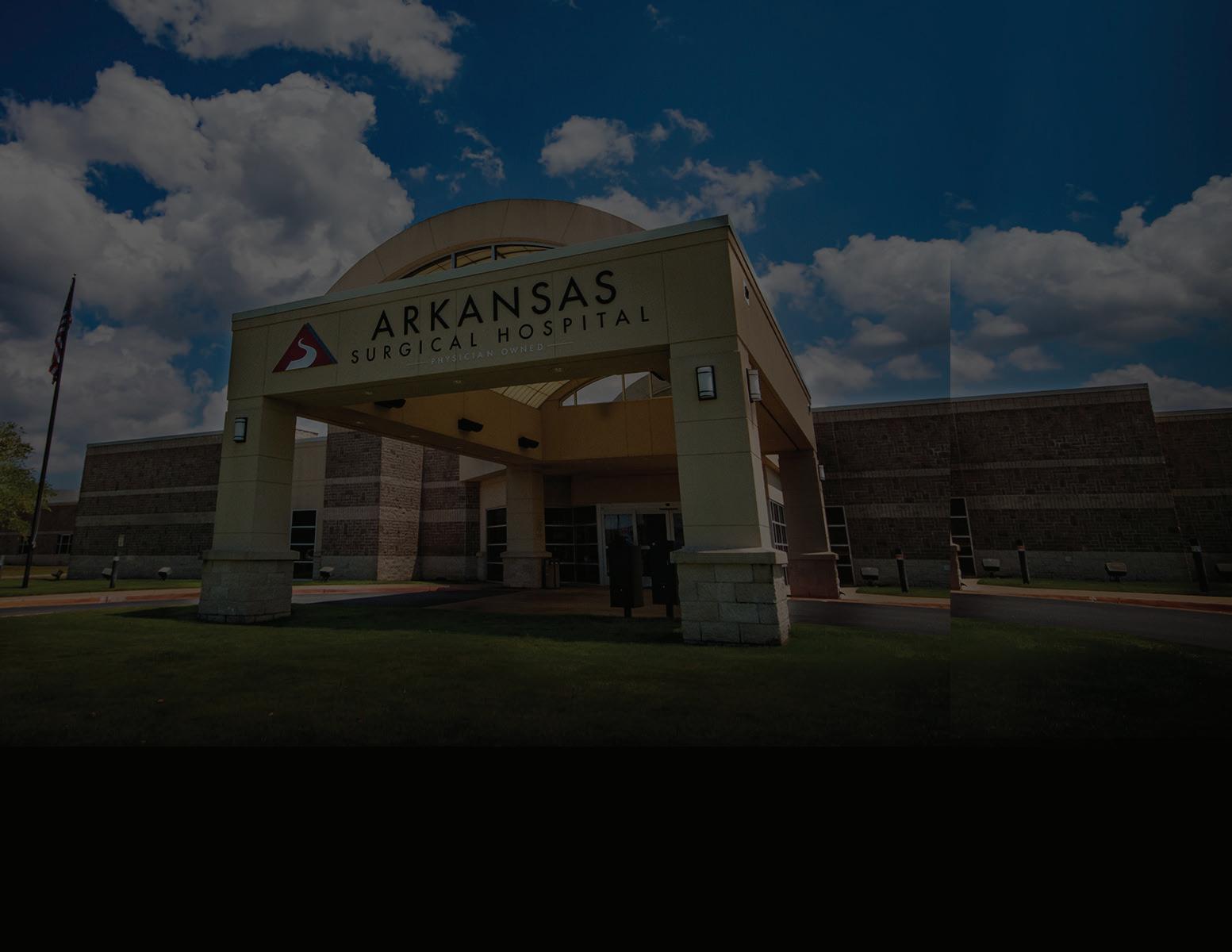
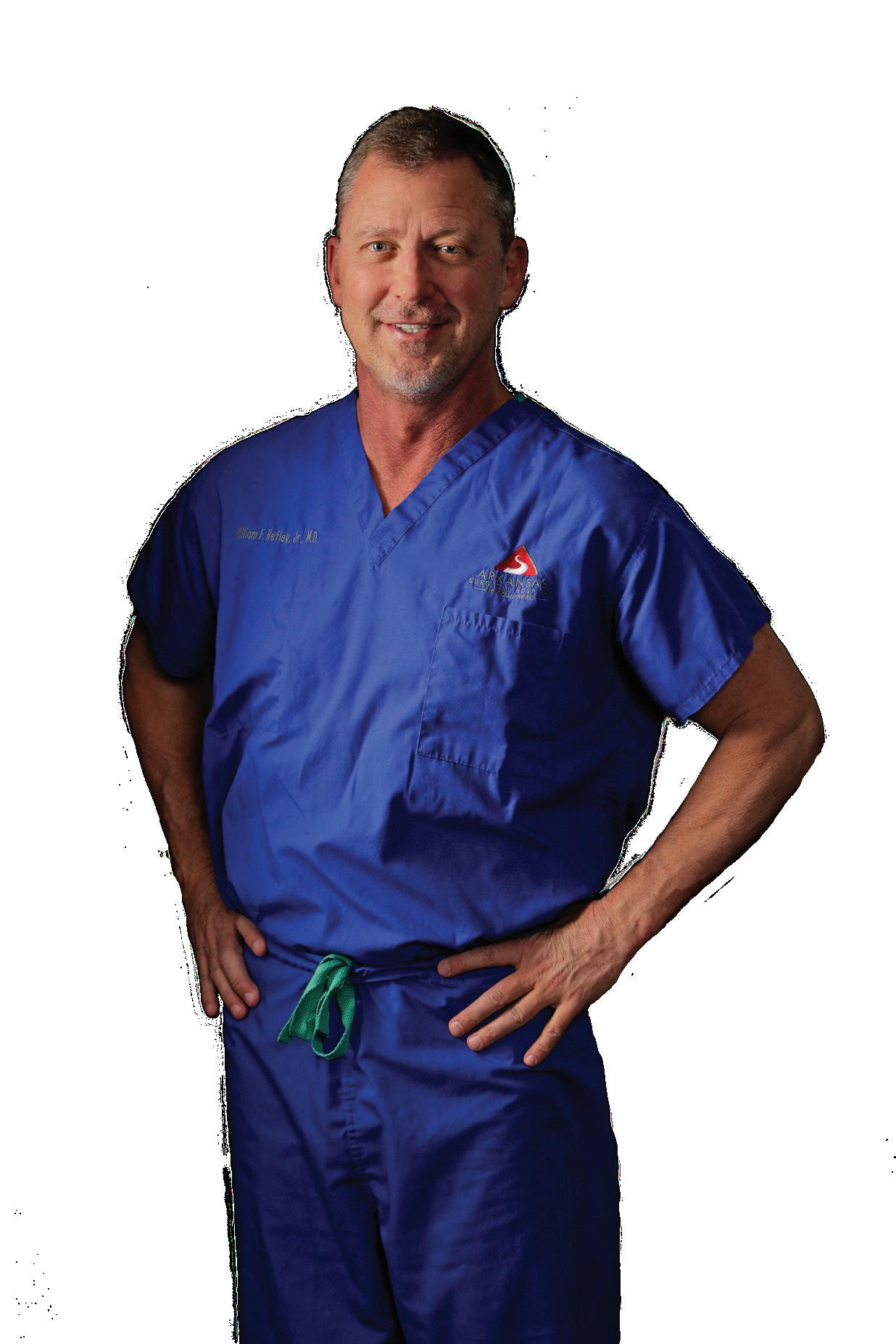
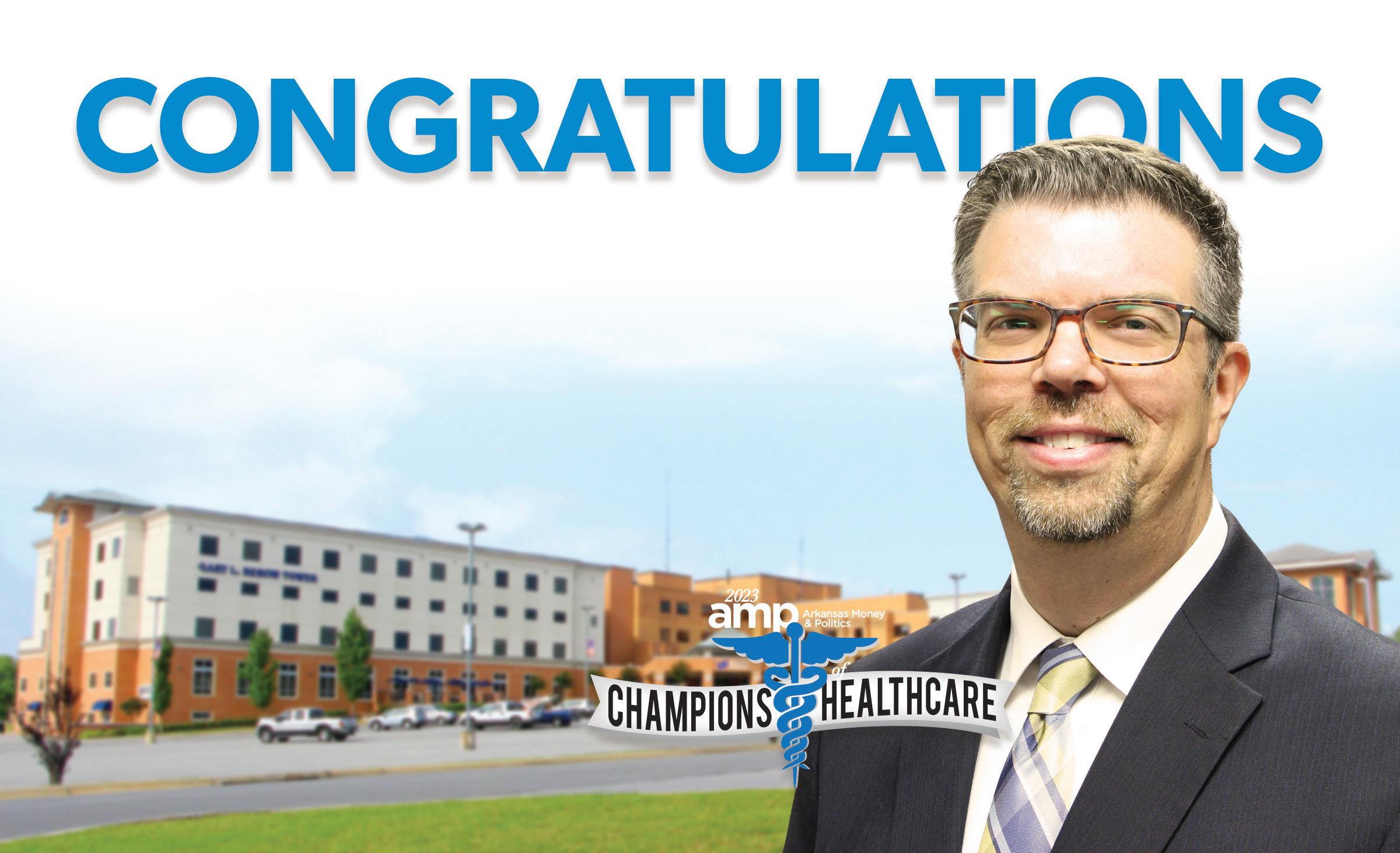
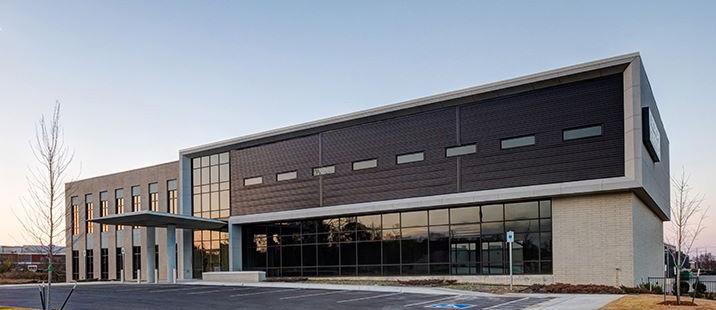

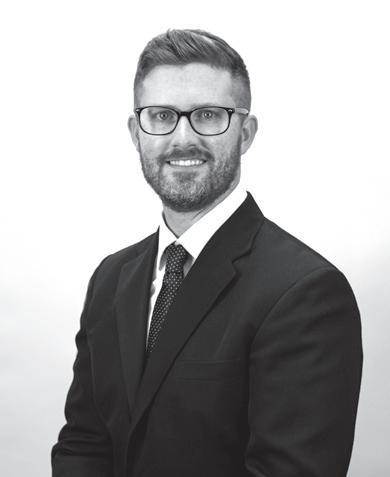

Kindness is a gift that each of us is born with. And when we share it, the goodness that’s released is amazing. This human connection is important to our well-being, but it’s essential when we’re sick and hurting. We know from experience that treating every patient with kindness, empathy, and respect is key to their healing. We call this power humankindness. It has driven us for more than 130 years. It advances the medical excellence we provide to our communities now. And it leads us forward every day.

Fincher received her undergraduate degrees in political science and public relations from the University of Central Arkansas and holds a master’s degree from University of Arkansas at Little Rock.
BRIAN FOWLER
Arkansas Surgical Hospital
Arkansas Surgical Hospital CEO Brian Fowler champions healthcare by ensuring staff and physicians are equipped with the necessary tools and resources to address the unique needs of every patient and their families. Fowler, along with the hospital’s surgeons and the leadership team, is focused on providing Arkansans with state-of-the-art orthopedic and spine procedures in a caring and compassionate environment. Under Fowler’s leadership, ASH continues to rank in the top 95th percentile for patient experience.
MIKE PERKINS
Baptist Health Medical Center
Mike Perkins is president of Baptist Health Medical Center-Little Rock. He has additional oversight for Baptist Health Rehabilitation Institute (BHRI), Baptist Health Extended Care Hospital (BHECH) and Baptist Health College
Little Rock. Since joining Baptist Health more than 30 years ago, Perkins has served in various titles including president of Baptist Health Medical CenterNorth Little Rock; vice president and administrator of BHRI; and vice president and administrator of BHECH.
SHANE FRAZIER





Pinnacle Pointe Behavioral Healthcare System










































































Located in Little Rock, Pinnacle Pointe Behavioral Healthcare brings hope and healing to children and adolescents by providing compassionate care to positively impact their emotional and behavioral health. Champion Shane Frazier, CEO, said the organization holds high expectations for employees, patients and families to ensure patients’ needs are met, that patients believe in their potential for success and that families are supported in a way that allows patients to thrive.
ADAM HEAD
CARTI
As president and CEO, Adam Head has been instrumental in guiding CARTI to achieve its vision of being “the cancer treatment destination.” Under his lead-
ership, the not-for-profit provider has grown to 18 treatment locations across the state and recently opened Arkansas’ first dedicated cancer surgery center. Today, CARTI offers leadingedge medical, radiation and surgical oncology, interventional radiology and specialty services, including audiology, breast care, cancer genetics and risk management, dental care, imaging, urology and more.
Gary Paxson, RN, BSN, MS, FACHE, is the president and CEO for White River Health in Batesville. He is a fellow of the American College of Healthcare Executives and serves on the Board of the Arkansas Foundation for Medical Care and the Arkansas Hospital Association. He is also a member of the Lyon College Board of Visitors, where he serves as chair of the Finance Committee. He also sits on the Arkansas Health Executives Forum board.
BRIAN THOMAS
Jefferson Regional
As the health care industry continues to evolve, so does Jefferson Regional Medical Center in Pine Bluff. In the last two years, an all-inclusive cancer center has opened, three new robots have been added to the surgical department, several new clinics have been launched and construction began on a freestanding behavioral health and rehabilitation hospital. South Arkansas has never had more comprehensive medical care available. Champion Brian Thomas serves as president and CEO of Jefferson Regional.
TROY WELLS
Baptist Health


Troy Wells has been president and CEO of Baptist Health since June 2014. Prior to that, he served as senior vice president of administrative services for the Baptist Health system. Wells also previously served as CEO of the Arkansas Health Group and vice president of Practice Plus, which are divisions of Baptist Health that specialize in physician staffing within the system and the management of affiliated physician clinics. Wells earned a master’s degree in health-services administration from the University of Arkansas at Little Rock and received a bachelor’s degree in microbiology from the University of Arkansas in Fayetteville.
Established in 1921, Conway Regional Health System provides complete health care services to the growing communities of north-central Arkansas. Conway Regional operates 17 specialtycare medical clinics; 9 primary-care clinics; 3 locations dedicated to after hours and emergency care; 4 locations providing imaging and lab services, and 5 rehab and therapy centers.
Harrison
North Arkansas Regional Medical Center staffs more than 850 employees, including 32 physicians, physician assistants and advanced practice registered nurses. The Harrison-based Claude Parrish Cancer Center stands as a model health care facility, offering a comprehensive range of services including radiation therapy, chemotherapy, hematology, nutritional support, social services and travel aid to patients in the community and surrounding areas.
The Unity Health–Cardiology Clinic provides world-class care, close to home. The award-winning clinic features expert cardiologists who provide treatment and diagnosis for a vast majority of heart and blood vessel conditions, from coronary artery disease to heart failure, irregular heartbeats and high cholesterol. With state-of-the-art technology, this expert cardiology team provides an array of heart health services to patients locally.





















Fayetteville





ARKANSAS NURSES FOUNDATION
Little Rock
ARKANSAS UROLOGY FOUNDATION










Little Rock
BLUE & YOU FOUNDATION

Little Rock
The Blue & You Foundation creates a state of better health for all Arkansans by investing in community-based organizations and grantee partners who are committed to improving the lives of







Thank you for recognizing these champions for children as “Champions of Health Care” in 2023.
As the only health care system in the state dedicated to caring for children, Arkansas Children’s statewide network of care ensures children have access to pediatric health care close to home in all four corners of our state, and beyond.
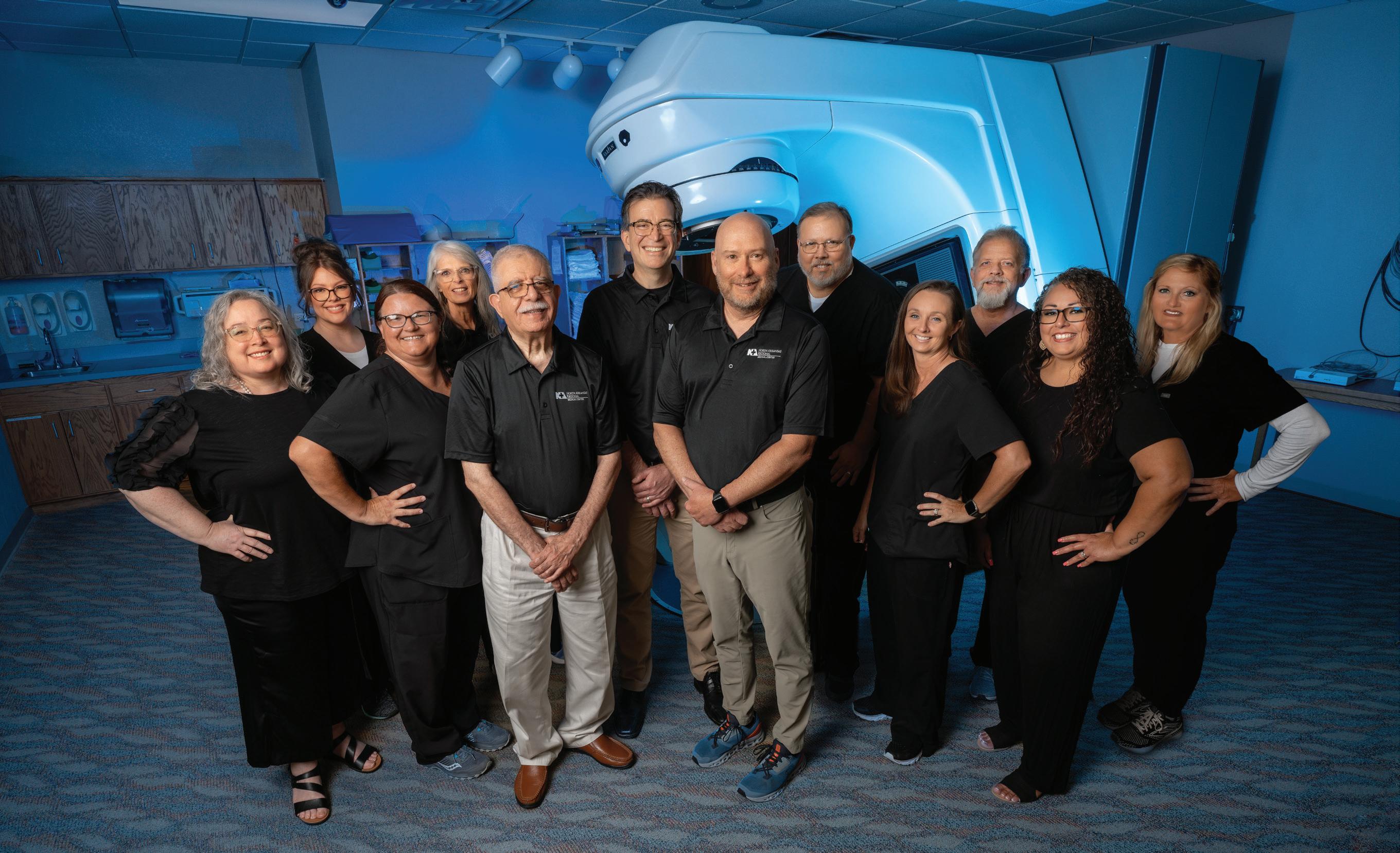

the people they serve. By strategically focusing its grant funding on community-based solutions, the foundation hopes to nurture community health leadership, foster collaboration and innovation and leverage financial, human and community resources to produce a measurable, positive impact.
The volunteer auxiliary of the North Arkansas Regional Medical Center is a commendable group that provides valuable support to the health care system through a variety of activities ranging from staffing information desks to crafting booties for newborns. Volunteers are also responsible for managing Nightingale’s Gift Shop and their thrift shop, the profits from which benefit the hospital.
As the hospital’s volunteer program, the Unity Health Auxiliary includes local residents who give of their time and talents toward helping Unity Health’s patients and their family members, guests, and associates. Auxiliary members donate thousands of hours of service to the hospital every year by providing assistance to various departments and information desks throughout the hospital among other important projects and duties.
ARKANSAS CHILDREN’S




Arkansas Children’s is the only health care system in the state solely dedicated to caring for Arkansas’ more than 700,000 children. The private, non-profit organization includes two pediatric hospitals, a pediatric research institute and USDA nutrition center, a philanthropic foundation, a nursery alliance, statewide clinics and many education and outreach programs — all focused on fulfilling a promise to define and deliver unprecedented child health.
Baptist Health is Arkansas’ most comprehensive health care organization with more than 250 points of access that include 11 hospitals; urgent care centers; a senior living community; over 100 primary and specialty care clinics; a college with studies in nursing and allied health; a graduate residency program; and access to virtual care.
It is also the largest private not-forprofit health care organization based in Arkansas, providing care through the support of approximately 11,000 employees, groundbreaking treatments, renowned physicians and community outreach programs.
CHI St. Vincent is a regional health network serving central and southwest Arkansas. It has served the people of these communities since 1888 with a history of many firsts. The CHI St. Vincent networks include primary care, specialty clinics, urgent care, hospitals, home health, rehabilitation and surgery centers. With more than 4,500 employees, 1,000 medical staff members and 500 volunteers, it consistently receives praise for advancements in care.
Established in 1921, Conway Regional Health System provides complete health care services to the growing communities of north-central Arkansas. In addition to the award-winning Conway Regional Medical Center, the network operates a medical center in Dardanelle. Conway Regional also operates more than 40 clinics, therapy centers, imaging centers and emergency care facilities throughout the region.




Unity Health is an award-winning, Arkansas health care system serving eight counties with four hospitals, 13 family practice clinics and 15 specialties including the Cardiology Clinic, Orthopaedic and Spine Center, Cancer Center and inpatient and outpatient behavioral health and physical rehabilitation. As a leading health care provider, with more than 2,300 associates, 150 specialized physicians and the second largest residency program in the state, Unity Health is serving its communities with expert, compassionate care.
ARKANSAS COLLEGES OF HEALTH EDUCATION





































Fort Smith












Arkansas Colleges of Health Education (ACHE) is a not-for-profit institution located on 500-plus acres in Fort Smith. ACHE is fulfilling its mission of educating future healthcare professionals through its programs: Arkansas College of Osteopathic Medicine (ARCOM), Master of Science in Biomedicine (MSB), Master of Public Health (MPH), School of Physical Therapy (ACHE PT),
and the School of Occupational Therapy (ACHE OT). The ACHE Research Institute Health & Wellness Center (RIHWC) just celebrated the opening of the first floor in the 317,000 square foot facility.
Little Rock
SHARE, the Arkansas State Health Alliance for Records Exchange, is the statewide health information exchange that securely and efficiently gathers and shares medical records from different health care providers. This allows participating hospitals, doctors, nurses and other health care professionals to better coordinate care and correct potential mistakes, especially in emergencies. SHARE makes the process of sharing health records easier, faster, and more secure than past less secure methods like fax, email or postal mail.
Bryant
For more than 38 years, Superior Senior Care has served thousands of families across Arkansas. As the first licensed and nationally accredited caregiver referral service in the state, it has blazed a path by not only providing better care, but also pushing for and attaining higher safety and performance standards in the industry. Superior’s goal is to serve clients and their families the way they need it — safely, dependably and affordably.

Little Rock
The University of Arkansas for Medical Sciences in Little Rock champions health care innovation in Arkansas. In June, UAMS opened the Orthopaedic and Spine Hospital, bringing together orthopedic, spine and pain-management experts under one roof to transform how musculoskeletal health care is provided in Arkansas — and beyond. A month later, UAMS opened a new radiation oncology center with expanded capabilities, including the state’s first proton center, to provide advanced radiation treatments for children and adults with cancer.
BEDS OR MORE)
CHI ST. VINCENT
Little Rock
CHI St. Vincent is a regional health network serving central and southwest Arkansas anchored by CHI St. Vin-

































































































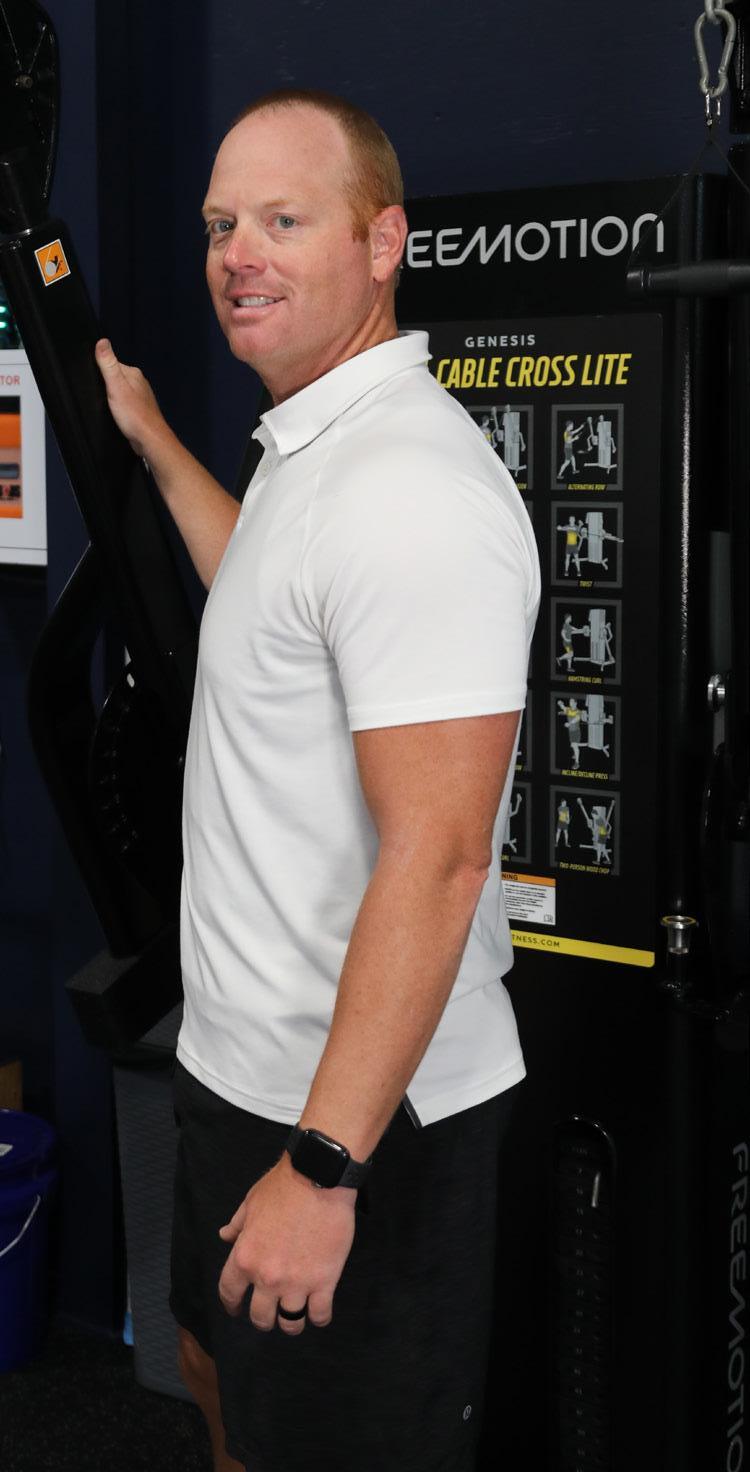

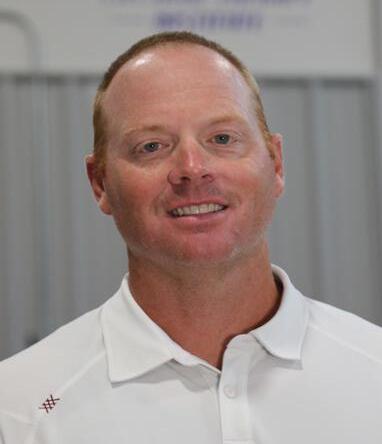
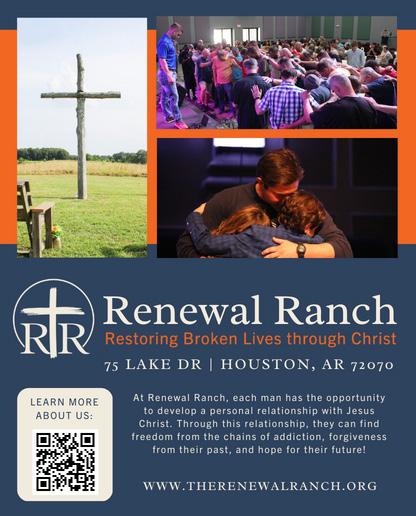


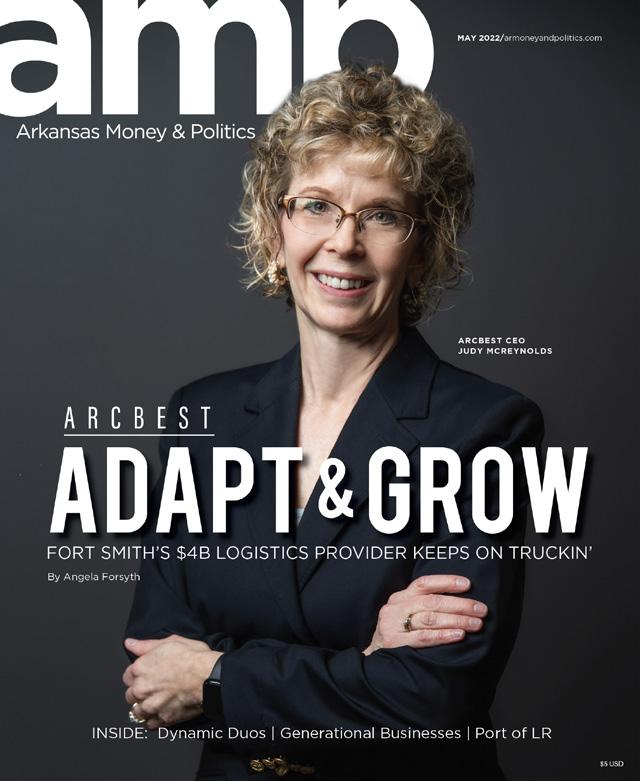


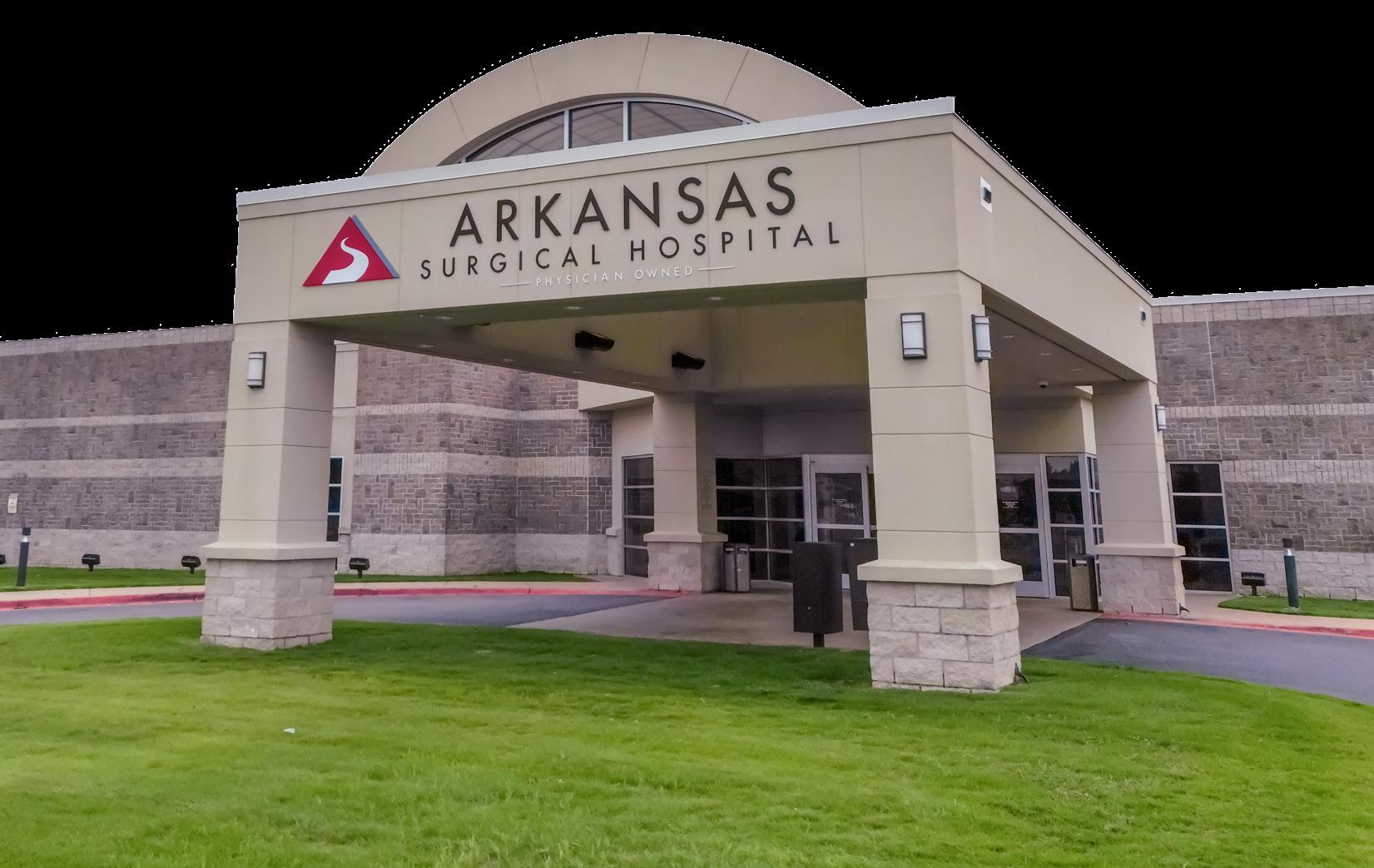
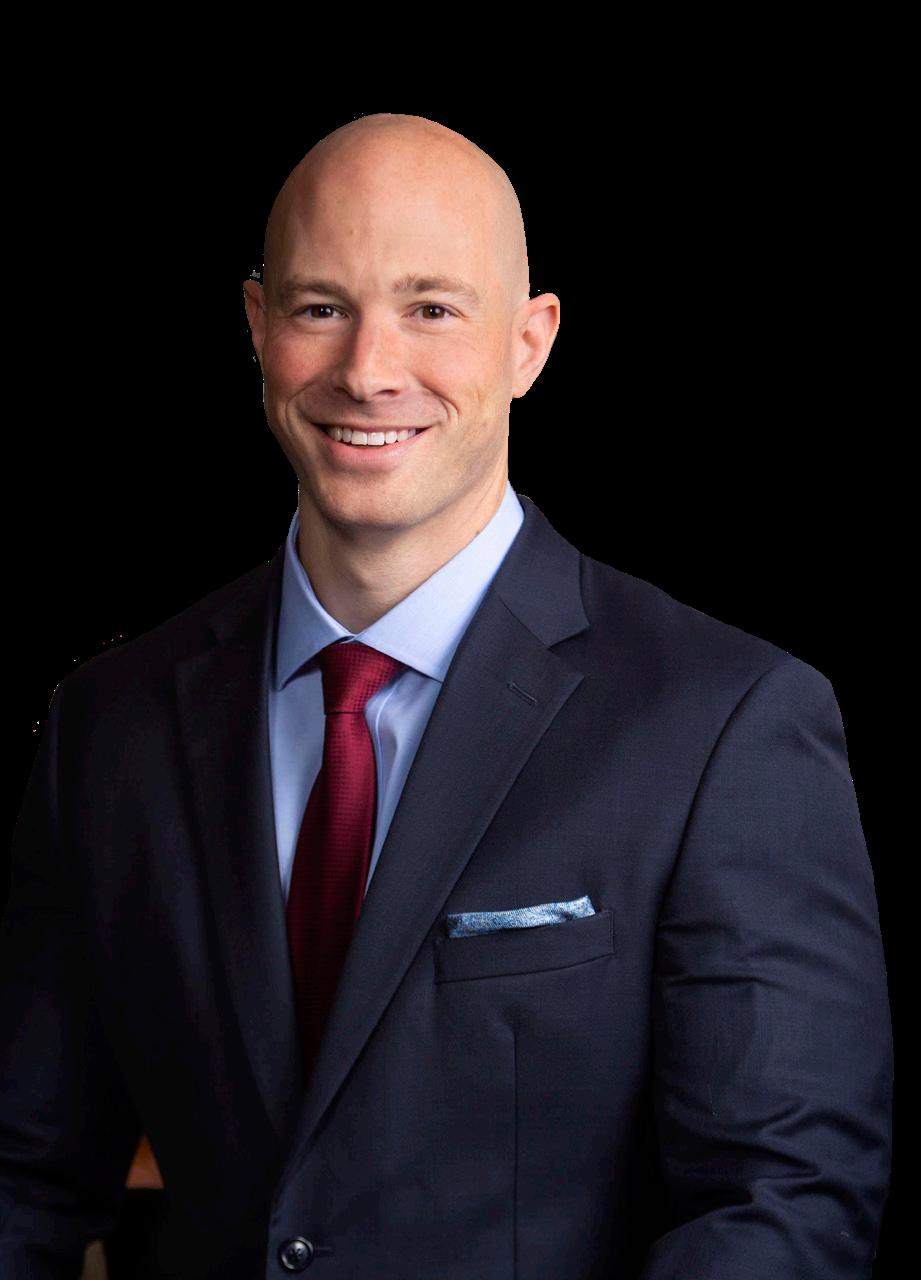









At Conway Regional, our team of talented orthopedic surgeons and specialists are dedicated to helping you regain mobility and recover from injury and disease. We are honored to have been voted AMP’s “Most Admired Company” and to be home to multiple AMP’s “Champion of Healthcare” for multiple years.
We’re not just growing—we’re growing together.
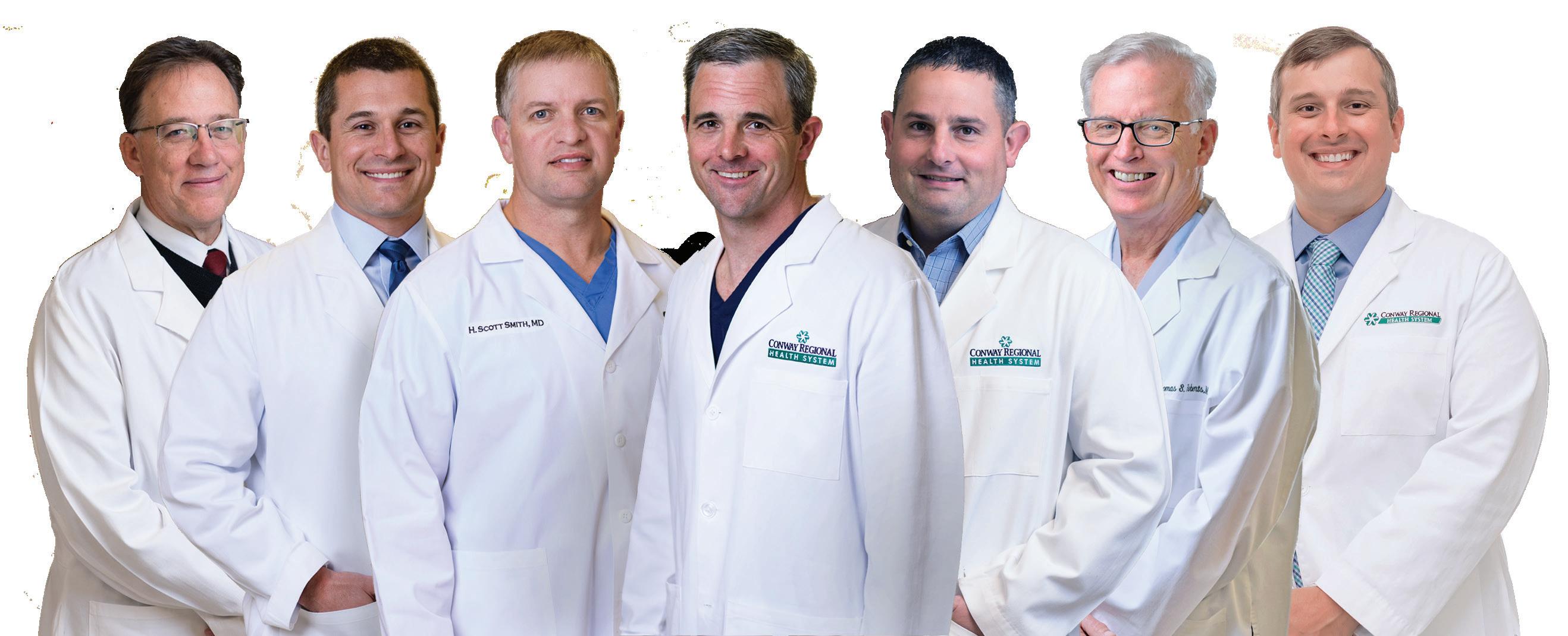
cent Infirmary in Little Rock, opened in 1888. It has served the people of these communities since 1888 with a history of many firsts. The CHI St. Vincent networks include primary care, specialty clinics, urgent care, hospitals, home health, rehabilitation and surgery centers. With more than 4,500 employees, 1,000 medical staff members and 500 volunteers, it consistently receives praise for advancements in care.
Conway Regional has grown to become one of the state’s largest and most respected hospitals and health care systems. It recently completed its $10 million Growing Together Capital Campaign, which raised funds to expand innovative services and access and recruit new specialists. It also fully funded the expansion of the hospital’s clinical laboratory and a 24-bed intensive care unit at Conway Regional Medical Center.

Unity Health–White County Medical Center is the largest health care provider in an eight-county area. The 245-bed hospital includes a full array of medical services and provides patients with outstanding, compassionate care. Since 1967, the hospital has consistently expanded and remains the largest employer in the area. With expert physicians and state-of-the-art equipment and procedures, Unity Health-White County Medical Center provides worldclass care locally and includes Unity Health Graduate Medical Education.
The University of Arkansas for Medical Sciences is Arkansas’ only academic health center. In addition to its Little Rock hospital and clinics around the state, UAMS includes five colleges and a graduate school; nine regional campuses, including one in northwest Arkansas; and seven institutes of excellence. UAMS has 538 beds, including 410 adult beds, 30 adult psychiatric beds, 10 pediatric psychiatric beds and 64 bassinets at the medical center and 24 beds at the newly opened Orthopaedic and Spine Hospital.
Located in the heart of Batesville, White River Medical Center (WRMC) is a 224bed regional referral center and the











































































flagship facility of White River Health (WRH). WRMC’s growth over the years has included the addition of a multistory women’s center in 2005, a fourstory tower in 2012 and, in 2023, the beginning of an expansion of the White River Health Oncology and Infusion Center to enhance the healing environment. WRMC is a participating hospital of the UAMS Institute of Digital Health & Innovation Stroke Program and is a part of Arkansas’s Trauma System with a Level III designation.
BELVEDERE NURSING & REHAB
Hot Springs
BRIARWOOD NURSING AND REHABILITATION CENTER
Little Rock
NURSING & REHABILITATION CENTER AT GOOD SHEPHERD
Little Rock
A champion of long-term care, the Nursing & Rehabilitation Center at Good Shepherd in Little Rock provides residents with private and semi-private accommodations, as well as full-time transportation to and from medical appointments, a calendar of activities, nutritious meals, and free wireless internet. The facility also offers short-term rehabilitation that helps patients return home by providing nursing and therapy in a comfortable atmosphere.



Searcy
Advanced Care Hospital of White County offers compassionate medical treatment for seriously ill patients as they transition from a general hospital setting back to their original residence. This highly trained team serves patients with around-the-clock care, focusing on long-term care needs. A wide variety of treatment options are available specific to each patient including respiratory, post-surgery, in-room dialysis and wound management, as well as occupational, physical and speech therapies among other specialized services.
Little Rock
For more than 50 years, Presbyterian Village has provided comprehensive continuing care for older adults that promotes health, comfort, security and spiritual well-being in a living environment that fosters personal dignity and independence. From independent living to skilled nursing and rehabilitation and
everything in between, Presbyterian Village strives to offer a healthy, secure and joyful environment for all residents.

ARGENTA COUNSELING


































North Little Rock

Little Rock
A champion of mental health care, Pinnacle Pointe Behavioral Healthcare in Little Rock provides psychiatric care to individuals ages 5 to 17 who are experiencing emotional and behavioral issues including anxiety, depression, mood swings, grief and high-risk behaviors. The facility offers individualized mental health treatment in a secure and nurturing environment.
RENEWAL RANCH
Conway
Renewal Ranch is a faith-based residential addiction recovery program for men 21 and older. Founded on the belief that addiction is a spiritually rooted issue, residents are given the opportunity to develop a personal relationship with Jesus Christ. Located on 138 acres near Conway, the program provides men with housing, meals, biblical teaching, counseling, job skills and life skills in order to overcome addiction, reunite with their families and be productive members of society.
THE BRIDGEWAY
North Little Rock
UNITY HEALTHBEHAVIORAL HEALTH
Searcy

Unity Health–Behavioral Health uses a holistic approach to care for its patients through inpatient and outpatient services. With a team of licensed psychiatrists, licensed mental health counselors, psychiatric nurses, and other specialists, patients are provided with medication management, counseling and therapy services as well as psychological testing for all age groups. Unity Health–Behavioral Health consists of outpatient counseling and inpatient treatment for ages 4 and older, featuring an adolescent unit, adult unit and geriatric unit.







MICHELLE BOONE
Compassion Health and Wellness

Unity Health provides medical excellence, incredible access and compassionate care locally for our communities, including our new state-of-the-art hospital in Jacksonville. Our network of award-winning hospitals, clinics and specialists are trusted as some of the top performing in the nation. Focused on quality care and education, Unity Health is a member of the Mayo Clinic Care Network and has the second largest residency program in the state. Looking for high quality care, close to home? Come see us!
• Health Care Administrators: Kevin Burton, Unity Health - Jacksonville
• Health Care Clinics: Unity Health - Cardiology Clinic
• Health Care Volunteer Organizations: Unity Health Volunteer Services





• Hospital System: Unity Health
• Large Hospitals (100 beds or more): Unity Health - White County Medical Center






















• Mental Health Facilities: Unity Health - Behavioral Health









• Nurse Practitioners: Nikki Taylor, APRN, Unity Health - Westside Family Medicine
• Physician Assistants: Abby Rice, PA-C, Unity Health - Family Practice Associates
• Long-Term Care Facilities: Advanced Care Hospital of White County

SUMMER BRACKETT


Arkansas Children’s
Arkansas Children’s is dedicated to making children better today and healthier tomorrow. Safety, teamwork, compassion and excellence are the hospital system’s four core values and inform every decision made at Arkansas Children’s. Summer Brackett, CNP, practices endocrinology at Arkansas Children’s Hospital in Little Rock and Arkansas Children’s Northwest in Springdale.
ANGELA FOSTER
Conway Regional
Angela Foster practices at Conway Regional’s Mayflower Medical Clinic. She was voted among the top three nurse practitioners in Arkansas by readers of AY Magazine in 2020. Her specialty is family medicine. Foster served for more than 30 years in the Army Reserves and Arkansas National Guard, including four deployments. She is a past board president for the Women’s Shelter of Central Arkansas, a domestic violence shelter in Conway.
JULIA PONDER
VA Central Arkansas Health Care
NIKKI TAYLOR, APRN
Unity Health-Westside Family Medicine
Nikki Taylor, APRN, currently serves at Unity Health–Westside Family Medicine clinic in Searcy and will soon transition to serving patients at Unity Health–Cardiology Clinic. She enjoys listening to her patients’ needs and fulfilling them accordingly. With her kind spirit and compassionate heart, she seeks to improve the health and well-being of her patients daily. Taylor’s patients appreciate the great care she provides.
AMANDA DEEL, DO

NYIT College of Osteopathic Medicine-Arkansas
Dr. Amanda Deel is a founding faculty member of the state’s first osteopathic medical school and is passionate about training physician leaders. A native of New Edinburg, Deel joined NYIT College of Osteopathic Medicine at Arkansas State University in Jonesboro in 2015. She serves as associate dean of academic affairs and is a practicing family physician. Deal has played a key role in helping grow graduate medical education in Arkansas and in helping every NYITCOM graduate earn residency placement.
BRIAN MCGEE, MD Arkansas Diagnostic Center
Brian L. McGee was appointed to the Arkansas state medical board in 2022 and is a double board-certified gastroenterologist with a track record of excellence in diagnosing and managing digestive health conditions. Known for his meticulous and patient-centric approach, he specializes in treating disorders of the digestive organs. His dedication to advancing gastroenterology through research and applying cutting-edge treatments helps ensure optimal patient outcomes. McGee remains a valued contributor to the medical community.
GINA MCNEW, MD
Conway Regional
Gina McNew is a highly experienced internal medicine physician with Conway Regional Medical Center-Vilonia. She graduated from medical school and completed her residency training at the University of Arkansas for Medical Sciences. She has served as a preceptor for nurse practitioner and physician assistant students from various programs. She currently accepts patients as the outpatient Internal Medical Residency Program Assistant Director at Conway Regional.
BRIAN WAYNE, MD
Little Rock Dermatology Clinic




































ANNE BROWNE
Baptist Health Family Clinic-West
Anne Brown sees adults of all ages and children ages 5 to 18. She provides care for a variety of chronic conditions, including allergies, asthma, COPD, high blood pressure, high cholesterol, GI disorders, migraines, anxiety and depression. Brown has a special interest in diabetes, weight management and hormonal disorders such as hypothyroidism. Baptist Health Family Clinic-West, located at 6015 Chenonceau Blvd., Suite 140, is open 8 a.m. to 5 p.m. Monday through Friday.
RACHEL NEAL, PA
Conway Regional
Rachel Neal practices at Conway Regional’s Hendrix Medical Clinic on the campus of Hendrix College in Conway. Her specialty is family medicine. Prior to practicing at the Hendrix clinic, Neal had been with the Conway Regional hospitalist program since 2018. She holds a bachelor’s degree from the Uni-
versity of Arkansas in Fayetteville and a degree as a physician assistant from the University of Arkansas for Medical Sciences in Little Rock.
MATT REYNOLDS
Arkansas Dermatology














































































A board-certified dermatology physician assistant and Northwest Arkansas native, Matthew Reynolds received his undergraduate degree from Texas A&M University. He returned to Arkansas to earn a master’s degree from the University of Arkansas for Medical Sciences (UAMS). Reynolds joined Arkansas Dermatology in 2015, where he treats a wide variety of dermatological conditions from psoriasis and acne to atopic dermatitis and skin cancer.
ABBY RICE, PA-C
Unity Health-Westside Family Medicine
Abby Rice, PA-C is beloved by her patients for being caring, considerate and compassionate. She embodies the mission of Unity Health: to improve the quality of health and well-being for the communities it serves through compassionate care. Rice serves at Unity Health–Family Practice Associates in Searcy and is an important part of the Unity Health team of providers.
MEGAN SANTIAGO
Wound Evolution






ALLY AND ZANE FERGUSON
Travel Nurses Across America
Founded in 1999, Travel Nurses Across America is one of the fastest growing health care staffing firms in the country. The organization partners with hospitals across the country to provide qualified nursing talent when it is needed. The agency hopes to improve the health care travel industry by providing honesty, transparency and top-notch customer service. Ally and Zane Ferguson of Conway are travel nurses who were voted Champions of Health Care.
CHRISTEN HENSON
Conway Regional
Christen Henson is the supervisor in the Conway Regional NICU. She received a DAISY award for extraordinary nurses and was nominated by a mother who experienced her exceptional care first-hand. Christen also prioritizes the Arkansas Children’s Hospital alliance to better serve families in Faulkner County and collects birth data on her own initiative to better understand why complications arise and how to prepare for when babies need specialty care.
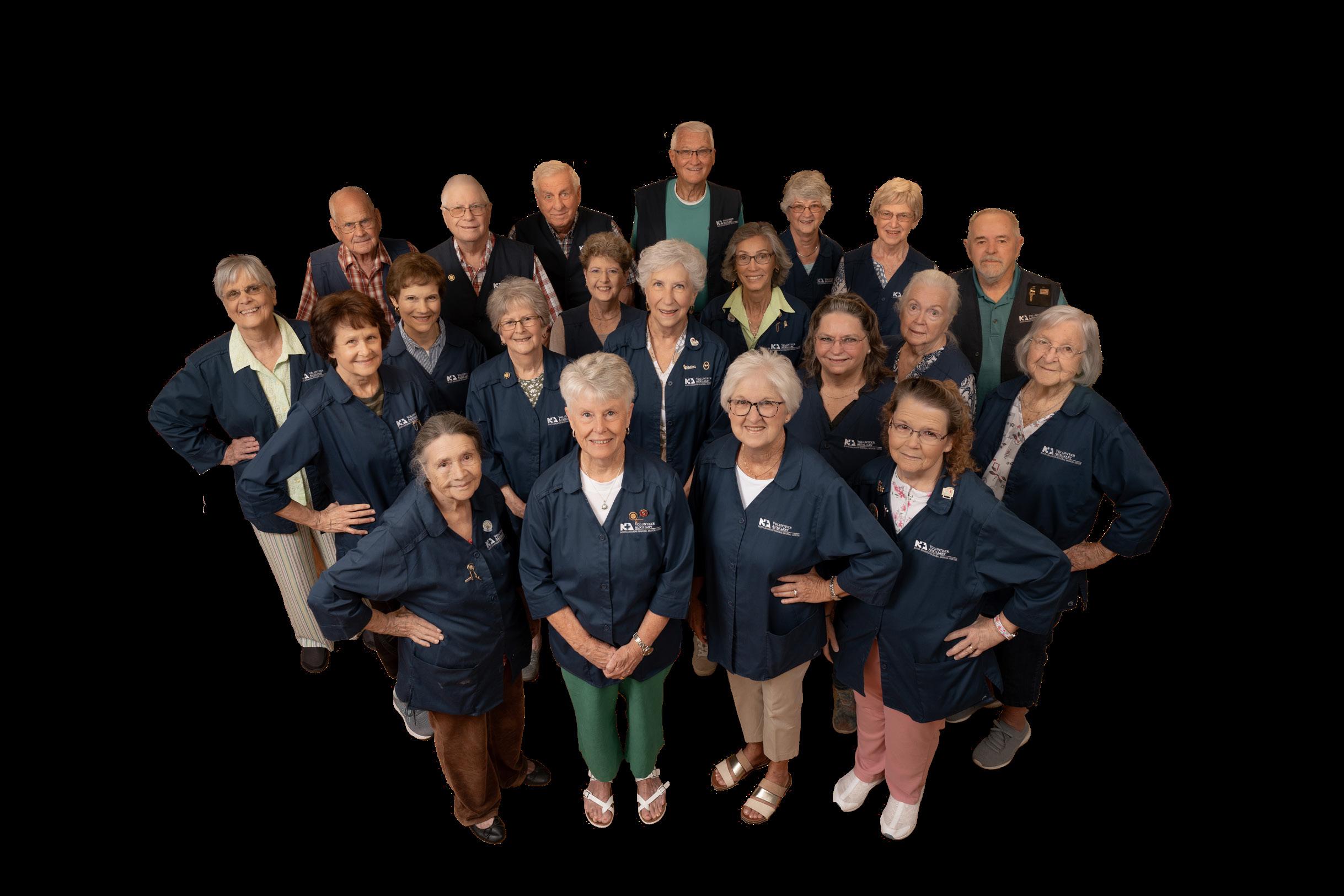
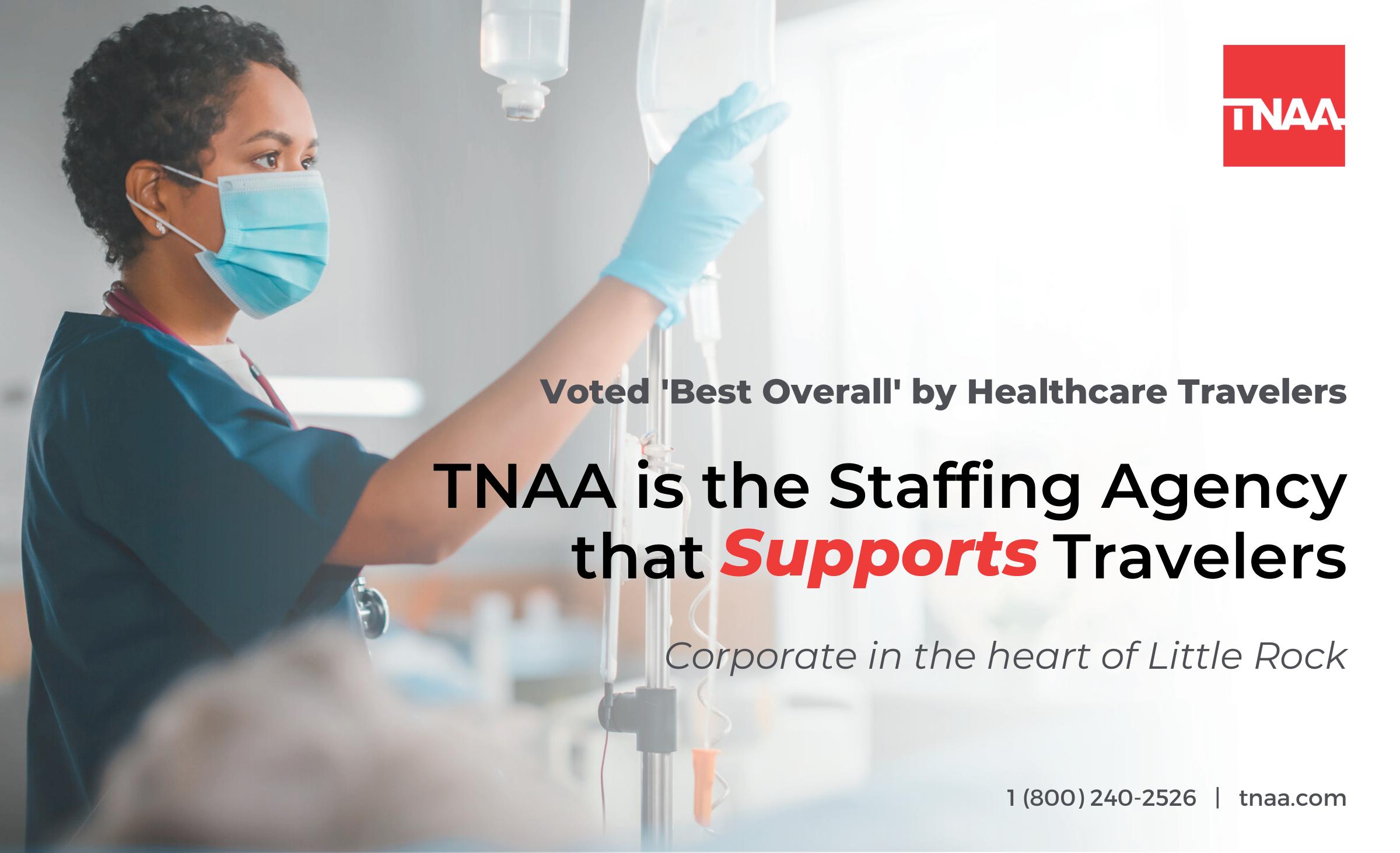
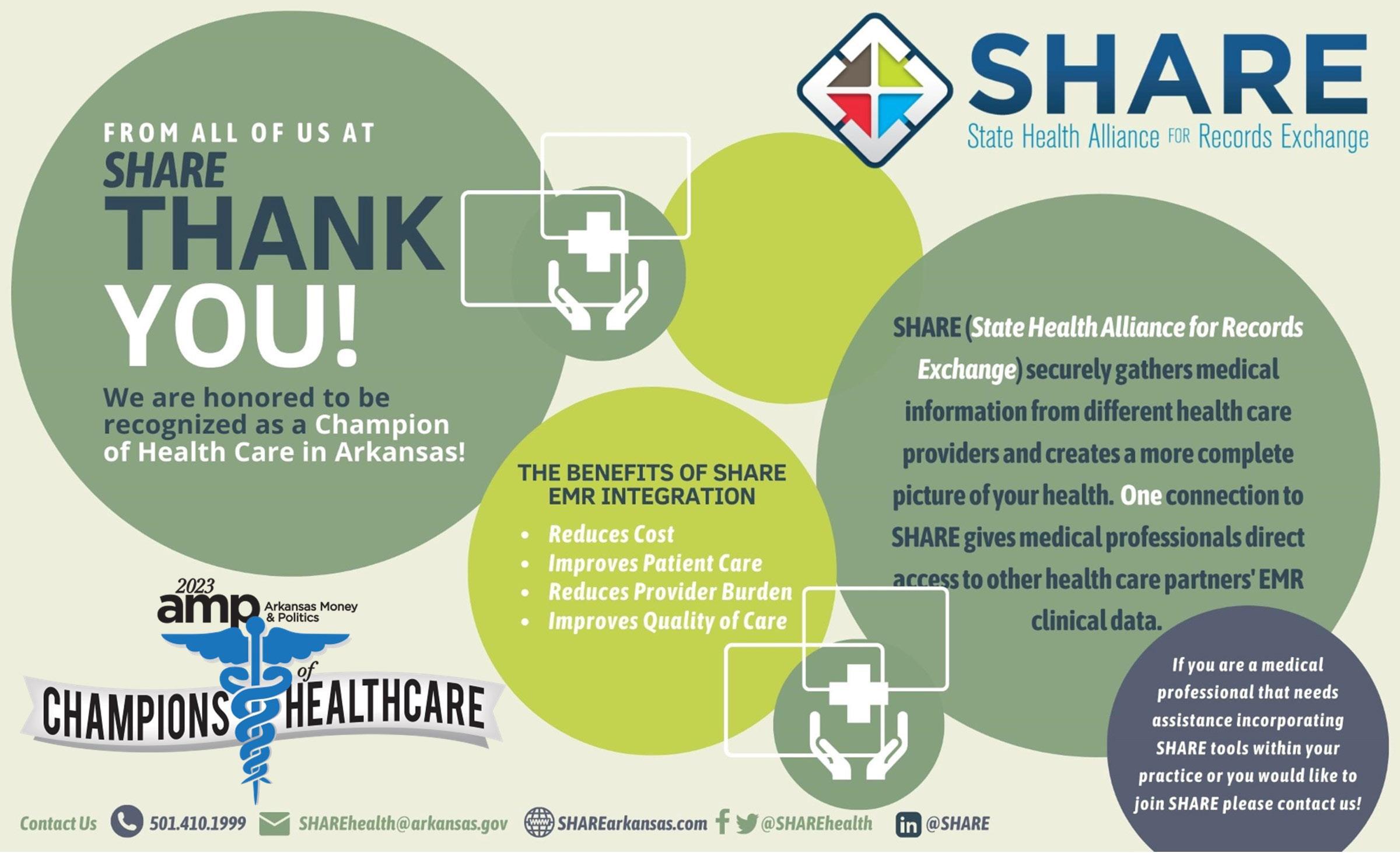
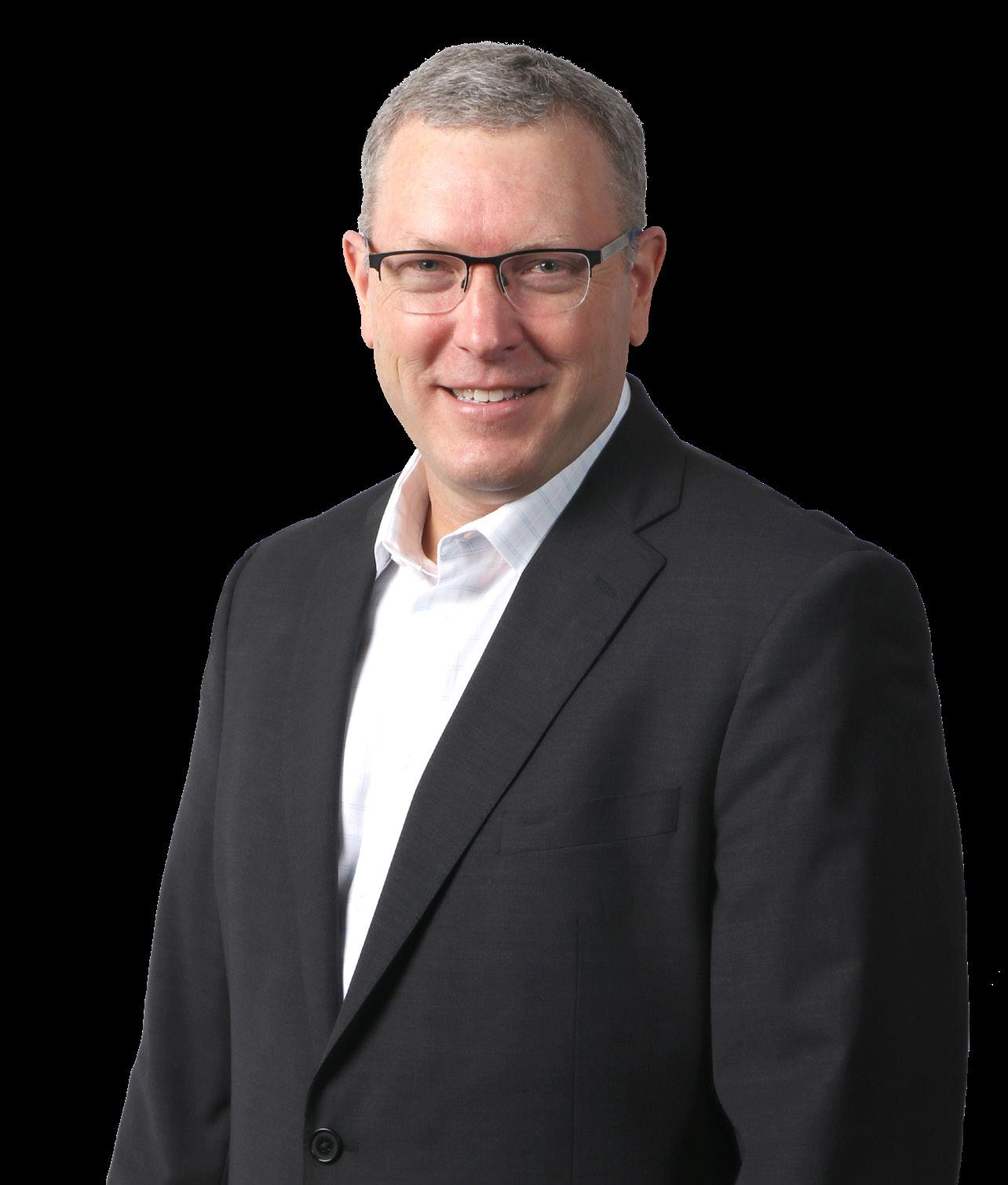


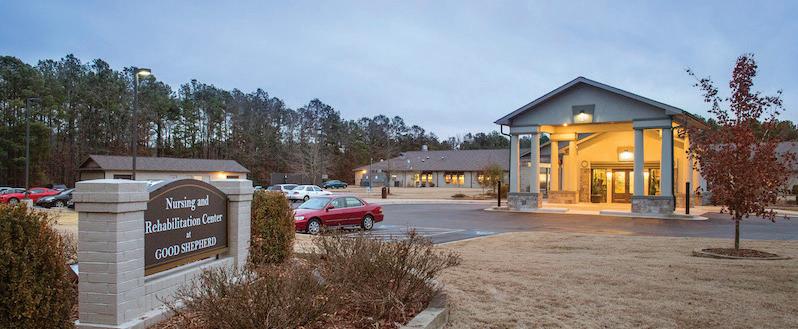

PAIGE KELLY, BSN, RN


























































Wright Plastic Surgery
JENNIFER SELLERS
Arkansas Children’s
Children are at the center of everything staff do at Arkansas Children’s, the state’s only hospital system dedicated solely to caring for children. The system includes two hospitals, a pediatric research institute and a foundation, as well as clinics, education programs and outreach programs. Champion Jennifer Sellers, RN, is a certified diabetes educator for Arkansas Children’s.
MEGAN HIGHTOWER WILSON
Arkansas Children’s

With two hospitals, a pediatric research institute and a foundation, along with clinics, education programs and outreach programs, Arkansas Children’s is a driving force for pediatric care in Arkansas. For more than a century, the hospital system has grown to meet the needs of children in Arkansas and beyond. Megan Hightower Wilson, RN, is one of the champions who cares for patients at Arkansas Children’s.
BAPTIST HEALTH MEDICAL CENTER
HOT SPRING COUNTY

Malvern
Baptist Health Medical Center-Hot

Spring County is a 72-bed community hospital with a long tradition of providing great patient care since it opened in 1923. The nationally recognized, faithbased hospital joined Baptist Health in January 2014. The hospital’s Emergency Department is a Level IV trauma center, which means it has demonstrated the ability to provide advanced trauma life support (ATLS) prior to the transfer of patients to a higher-level trauma center. The staff can provide evaluation, stabilization and diagnostic capabilities for injured patients.
CABOT EMERGENCY HOSPITAL
Cabot
DEWITT HOSPITAL
DeWitt
NORTH ARKANSAS REGIONAL MEDICAL CENTER
Harrison
Situated in Harrison, the North Arkansas Regional Medical Center stands out as an exemplary rural hospital. This progressive nonprofit health care organization additionally operates 13 clinics dedicated to serving rural populations















across northern Arkansas. Driven by a goal to become the most relied upon and favored healthcare provider in the region, this medical system is committed to delivering comprehensive healthcare while upholding its fundamental principles of safety, quality, integrity and community engagement.

NEA BAPTIST MEMORIAL HOSPITAL
Jonesboro

ARKANSAS HEART HOSPITAL
Little Rock
ARKANSAS SURGICAL HOSPITAL
North Little Rock
Arkansas Surgical Hospital is one of the only 5-star hospitals in the state, ranking in the top 5 percent in the nation for patient experience. The hospital features 41 private patient suites and 13 state-of-the-art operating rooms. The surgeons’ specialties range from orthopedic and spine treatments to breast oncology and interventional pain management. The physicians at Arkansas Surgical Hospital perform more joint replacement procedures than any other hospital in the state while maintaining a lower-than-average infection rate.
HOWARD MEMORIAL HOSPITAL
Nashville
LEVI HOSPITAL
Hot Springs
SOUTH ARKANSAS REGIONAL HOSPITAL
El Dorado
C. LOWRY BARNES, MD
UAMS



C. Lowry Barnes is a professor and chair of the Department of Orthopaedic Surgery at the University of Arkansas for Medical Sciences in Little Rock. He is a fellowship-trained orthopedic surgeon specializing in hip and knee joint replacement surgery and serves as the director of musculoskeletal services at UAMS Health. Barnes completed medical school and his residency at UAMS before pursuing a fellowship in total joints replacement at Harvard Medical School. Widely recognized for his expertise, he lectures nationally and internationally on total joint replacement surgery.
PAT COLLINS, MD
Collins Eye

ALI KRISHT, MD, FACS
CHI St. Vincent Arkansas
Neuroscience Institute
Ali Krisht is the director and lead neurosurgeon at CHI St. Vincent’s Arkansas Neuroscience Institute. He is the 2019 recipient of the international Herbert Olivecrona Award for contributions to the field of neurosurgery, rated among the top 1 percdent of all neurosurgeons in the United States by the rating firm Castle Connolly and editor of the journal Contemporary Neurosurgery. Krisht has delivered more than 170 presentations and lectures around the world and received honorary citizenship in Taipei, Taiwan, for his work in neuroscience education in the Taipei community. He earned his medical degree from the American University of Beirut and completed his surgical residency at Emory University in Atlanta.
DOMINIC MAGGIO, MD
Legacy Spine & Neurological Specialists










































Dominic Maggio has published more than 30 scientific papers and won numerous national awards. He performs innovative, first-in-Arkansas surgical techniques such as si joint fusions as well as cervical- and lumbar-artificial disc replacements. One of the nation’s leaders in the development and advancement of computer and imageguided micro spine surgery, he delivers life-changing, minimally invasive neurosurgical care at Legacy Spine and Neurological Specialists, one of the most established practices in the state, providing highly-conservative neurological care.
EVAN NEWBOLT, MD, McFarland Eye Care
SCOTT SMITH
Conway Regional
Scott Smith is an orthopedic surgeon in practice at Conway Orthopedics & Sports Medicine Center. As part of his practice, he performs Mako robotic-arm assisted joint replacement procedures. He attended medical school and graduated with honors from the University of Arkansas for Medical Sciences and completed his residency at Campbell Clinic in Memphis. Smith has more than 25 years of experience in his field.











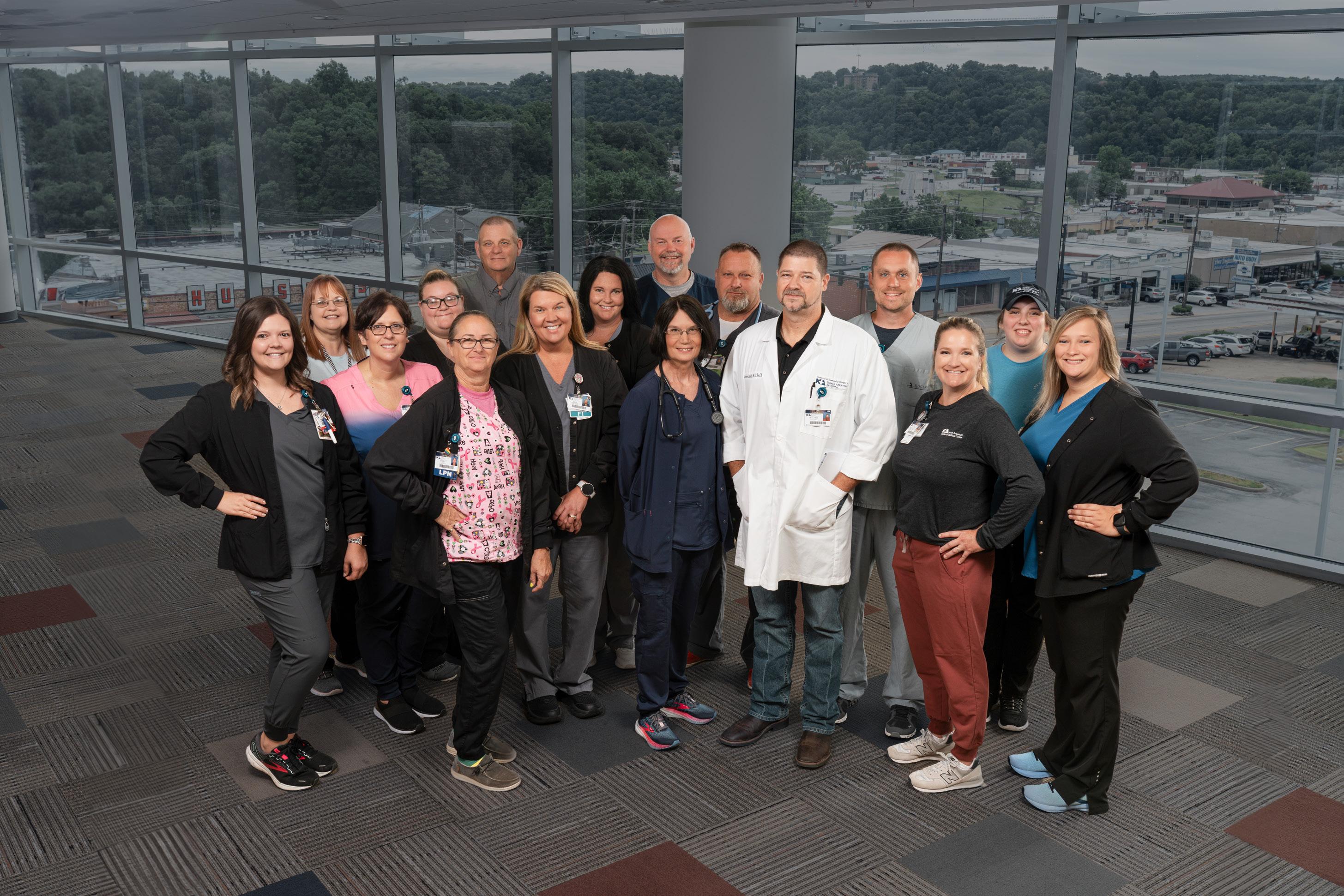
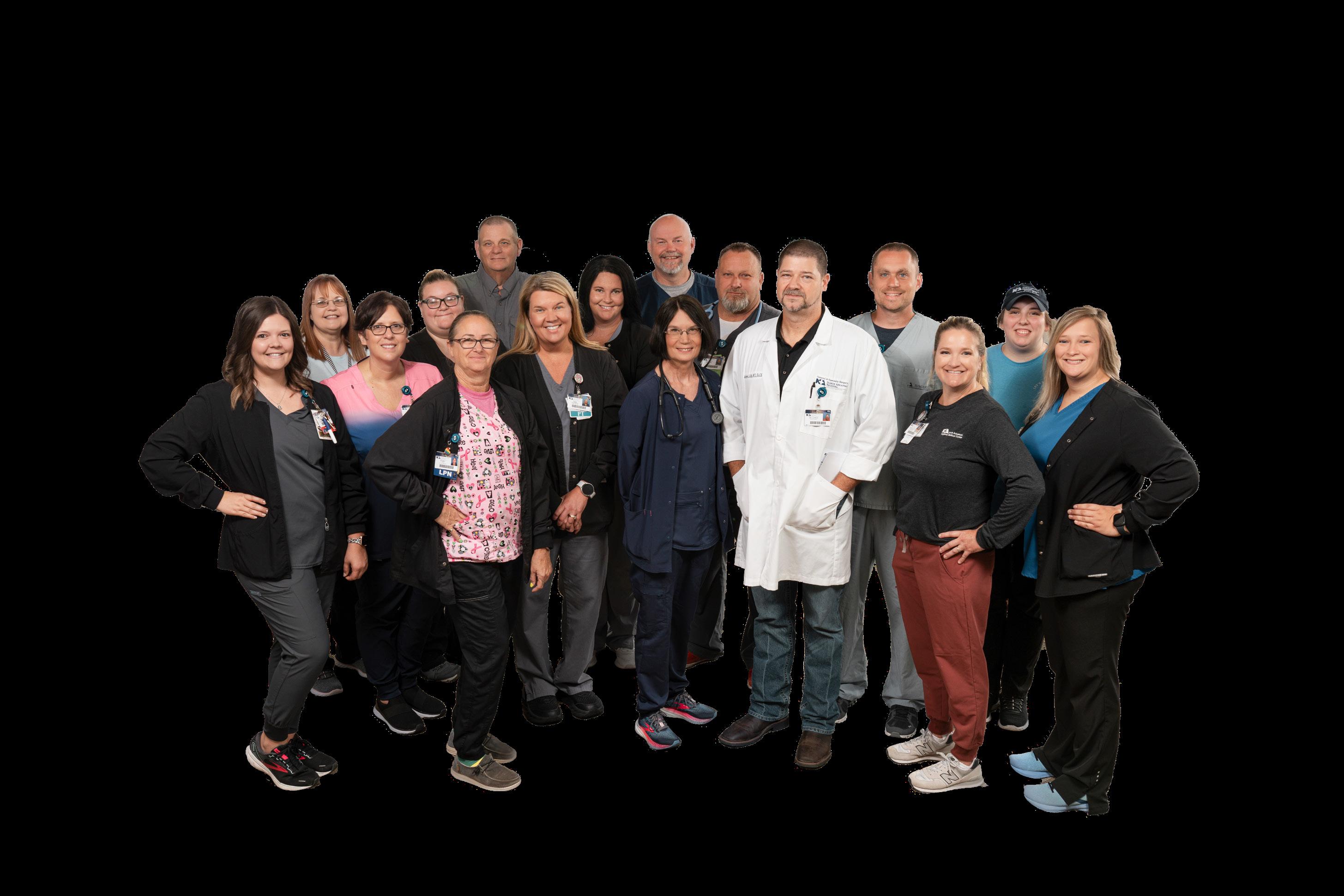





Not unlike the team of doctors, nurses and specialists needed to manage an individual’s health care needs, it takes the coordinated efforts of advocates, analysts and other professionals to support the lifesaving work of hospitals and health care systems across the state. In 1929, a loosely knit but dedicated group of hospital leaders came together to focus on raising the level of Arkansas’ health care services, and the Arkansas Hospital Association was born.
Today, 94 years later, the AHA continues to be the ears, eyes and voice of Arkansas hospitals. Serving as both an advocate and a watchdog, the association has expanded to serve its 106 member institutions in a variety of ways. On the legislative front, the AHA uses its position as the state’s most trusted authority on health care to represent the concerns and interests of its members to officials at both the state and federal level. The AHA has a seat at the table for all major policy initiatives, allowing the state’s hospitals to present a united voice to lawmakers and regulatory agencies.
For hospitals themselves, the AHA gives members indispensable tools for strategic planning and quality improvement through its data and statistics. The association also offers an array of learning and networking opportunities, promoting the constant improvement of the state’s health care services and enhancing the overall level of individual patient care and public health.
The AHA’s unwavering commitment to its members and the health of Arkansans is especially evident on two recent fronts. During the COVID-19 pandemic, the association’s staff provided crucial information and support to hospitals, from weekly situation update calls to snapshot data summaries on hospitalizations, bed use and bed availability. The AHA also worked with the Arkansas Department of Human Services to secure funding for hospital preparedness and direct payments to hospital workers.
Another ongoing facet of the AHA’s work is protecting Medicaid expansion. In 2012, the AHA board voted to endorse Medicaid expansion as prescribed under the Affordable Care Act. During the 2013 legislative session, when it became clear that expanding coverage under the state Medicaid program was no longer an option, the AHA led the charge in pivoting to the “private option” alongside then-Gov. Mike Beebe and a group of Republican leaders from both chambers. Thanks to the advocacy of the AHA and other organizations, Arkansas’ Medicaid-funded insurance subsidy program was the first of its kind approved in the country.
The association has defended the program in every legislative session since. Now called ARHOME, it slashed the state’s uninsured rate by nearly half, providing access to care for almost a
quarter of a million people. The cascading benefits of the program include expedited access to care, increased use of preventive services and screenings, a reduction in unnecessary ER visits and improved maternal and infant mortality rates. The improved health coverage also reduced hospital uncompensated care by 55 percent and, per the association, has been a major reason why Arkansas has not seen significant rural hospital closures.
Of course, the work is never done, and the AHA is working to address pressing issues facing its members today. One of the most urgent of these is the unprecedented economic burdens weighing down Arkansas hospitals, which the association describes as a financial emergency. More than half of the association’s hospitals have negative margins, forcing many to consider reducing services or eliminating unsustainable areas of care to try and avoid total closure.
The negative effects of these challenges are wide-ranging. Limited monetary resources hamper a hospital’s ability to recruit and retain talent; combined with the worsening shortage of health care professionals in the state, many hospitals must rely upon travel agency staffing. According to the AHA, those costs remain more than 50 percent greater than in January 2020.
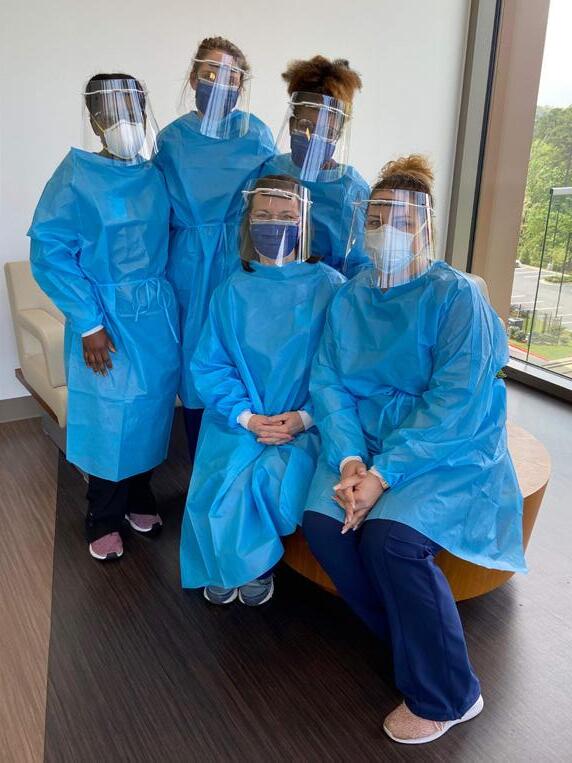
The association pointed to the stagnancy of Medicaid reimbursement, paired with the rising cost of providing care, as one cause for concern. Outdated fee structures make for payments that fail to cover the costs incurred in treating patients. Despite higher pay rates, private insurance companies employ other tactics — such as pre-authorization requirements that delay physician-ordered care and down-coded claims that provide lower reimbursement for care already provided — to create an untenable environment for hospitals, patients and the communities that rely on them. The AHA is advocating for increased oversight and limits on unfair practices to help ameliorate these issues.
For those interested, there are many ways to support the AHA and its mission of enhancing health care throughout the state. Fundraising, volunteering or otherwise getting involved with your community hospital is a place to start, as well as making your voice heard to your elected representatives.
To find out more about AHA and its mission, visit ArkHospitals.org.
Since 2000, our team has been 100% focused on your oral health. We offer our patients the very best that dentistry has to offer through advanced technologies and procedures. We provide personalized dental


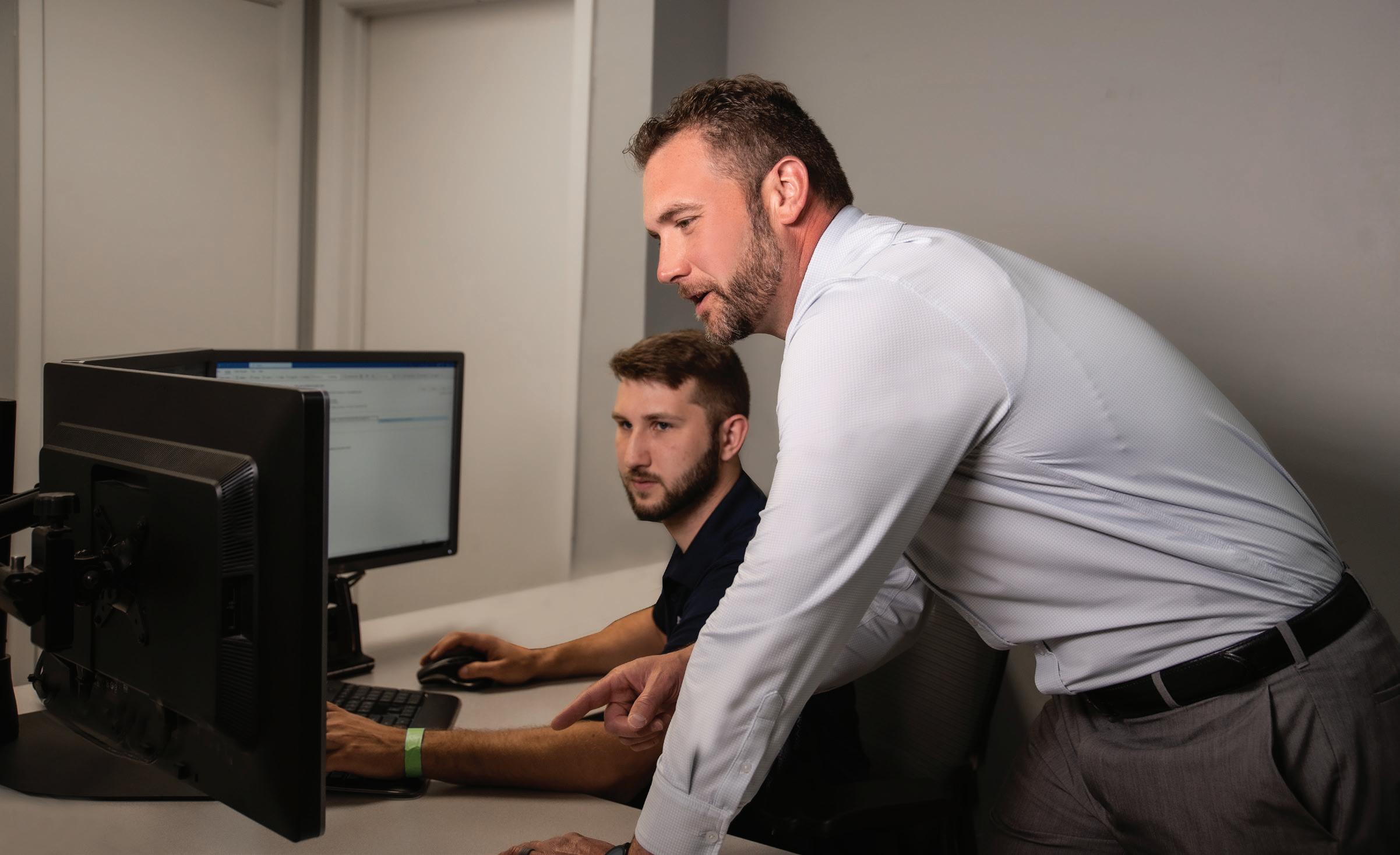


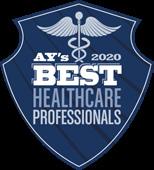



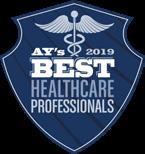
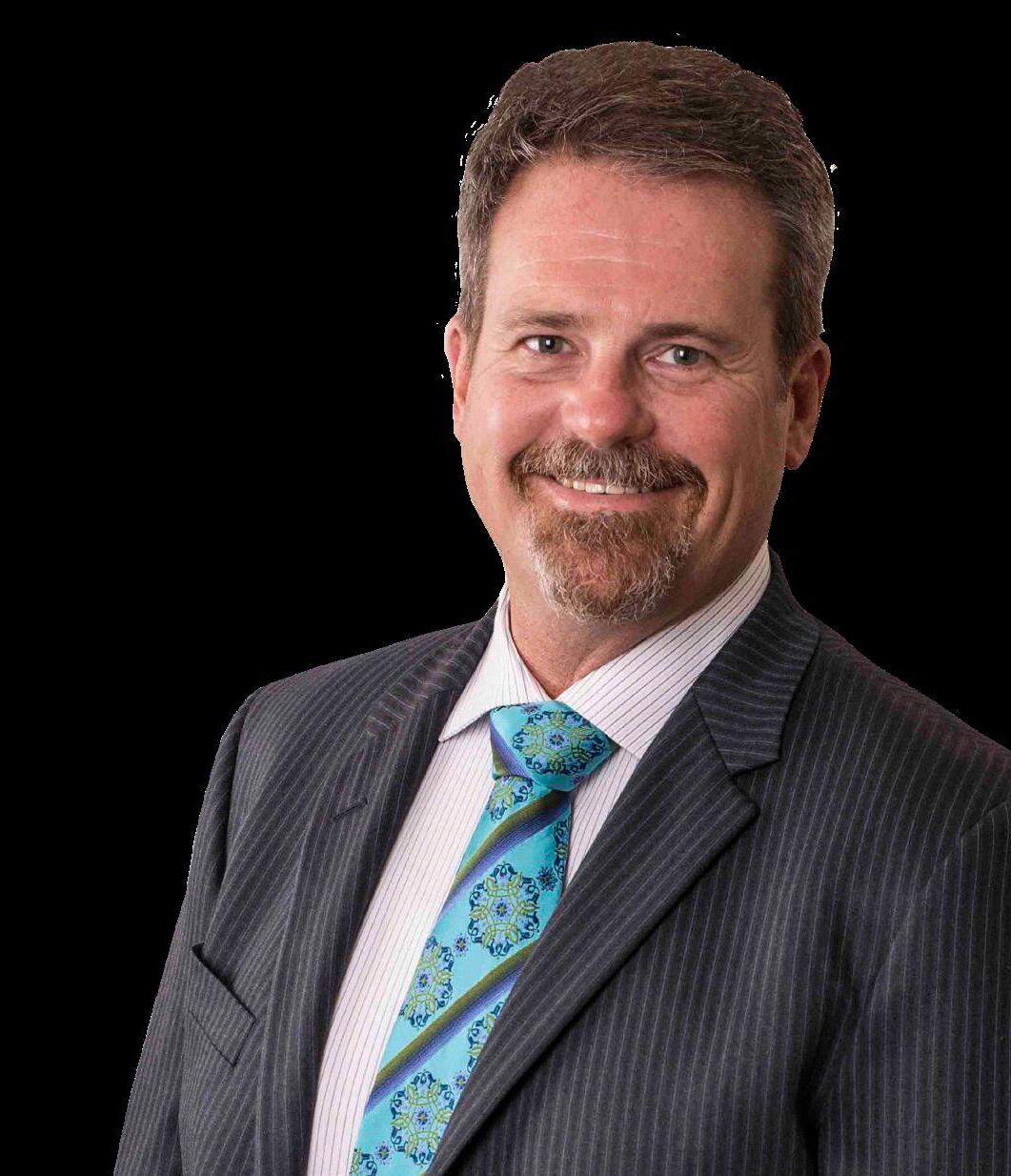
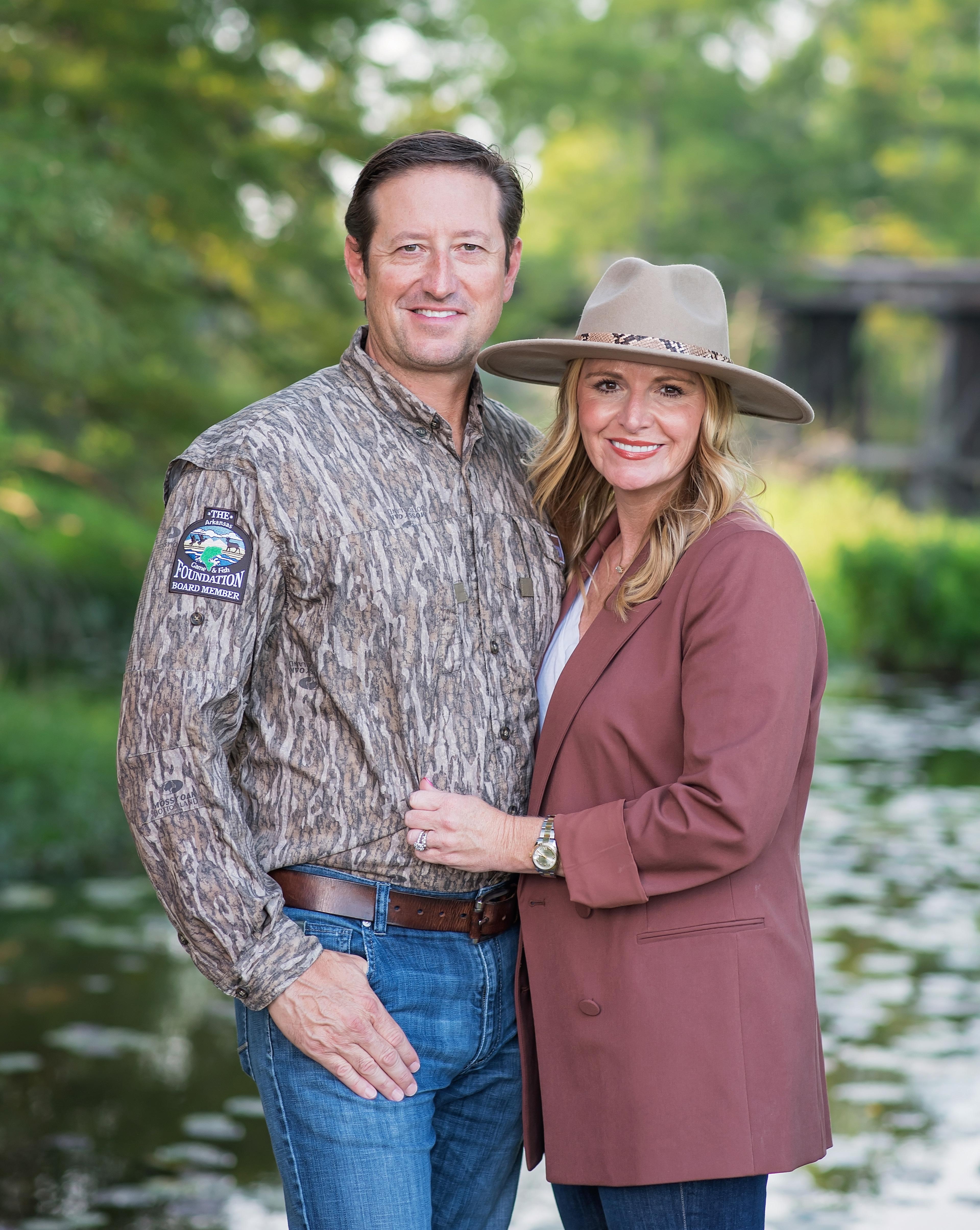
If you went into a lab to create the prototypical Arkansas couple, you’d probably come out with something very close to T.J. and Mandy Lawhon. The Little Rock husband-wife duo with the small-town roots — both were born and raised in McCrory — have all the attributes of what makes Arkansans special, including devotion to family and a love of the outdoors.
“I can remember the earliest opportunities I had in the outdoors was when I was in kindergarten or first grade. I remember my dad would come get me out of school and we would duck hunt in the afternoons,” T.J. said. “We also grew up on the water, floating Arkansas rivers, canoe trips, lake trips to various lakes in the state, camping outdoors. Those were my early experiences that I had connecting with the outdoors.”
“From my perspective, coming from the small farming/hunting community that we did, you didn’t really have any other option but to be introduced to the outdoors at an early age, whether it was by your family members or you or your neighbor. That’s what you knew growing up in McCrory,” said Mandy. “My dad and I were big fishing buddies. He would take me out early mornings and hot days to go fishing. That was probably my earliest memory, and I absolutely loved the outdoors and the beauty of it. I felt there was just a peacefulness about it, being on the water, everything quiet.”
Little wonder, then, that the couple’s considerable passion for wild spaces would lead them to chair this year’s Arkansas Game and Fish Foundation Arkansas Outdoor Hall of Fame Banquet. The event, slated for Aug. 26, celebrates Arkansas’ outdoor culture and the people who have devoted their lives to preserving and enhancing the state’s water, woods and habitat for all.
The organization’s main annual fundraiser, the banquet attracts 1,600 attendees to the Statehouse Convention Center to salute the year’s inductees to the AGFF Arkansas Outdoor Hall of Fame. Proceeds go to AGFF programs and sup-
port the work of the Arkansas Game and Fish Commission, of which the foundation is the fundraising adjunct.
“In 2012, I was asked to join the Game and Fish Foundation board, and shortly thereafter they asked me to join the foundation’s executive committee,” T.J. said. “That’s when I started to develop an appreciation for how the foundation works and what they do and all the various programs that they juggle and the financial requirements it takes to run an organization like that. That’s what led us to eventually agree to help chair the banquet.”
The organization is near and dear to the Lawhons’ hearts for the work that it does to educate and promote outdoor activities for youth, support game wardens and help fund the state’s nature centers, which welcome hundreds of thousands of visitors every year.
“One of the things I did when I was in college at Harding University, I was appointed to a position at the U.S. Fish and Wildlife Service at the Cache River Refuge in Little Dixie,” Mandy said. “I was around the game wardens, the federal officers, the conservationists that came through that organization, and it really helped me understand what conservation was and why we needed it. That became a big thing for me, and I wanted to share that with our kids.”
“With the family side of it, both Mandy and I have involved our kids in the outdoors early,” T.J. said. “We enjoy the same type of activities that I had experienced as a kid out on the water, lakes and rivers. Hunting is our primary passion; I took the kids hunting as early as they were willing to go with me in the mornings to hunt. We want to see that continue for the next generation of families all across Arkansas.”
In addition to inducting this year’s honorees — comprised of Jim Ronquest of Stuttgart; Tom Foti of Little Rock; Ronnie Ritter of Hot Springs; Bob Barringer of Little Rock; Dale Morrell and family of Alma; and Larry and Brenda Potterfield of Columbia, Mo. — the event offers food, networking and an
extensive array of auction items that range from wildlife art to boats to exotic vacations.
“I think everyone is always really excited about the auctions that happen the night of,” Mandy said. “This year, Sissy’s Log Cabin will be our presenting sponsor, and we’re looking forward to some really exciting auction items that will be coming in. We’ve tried to add more items for the ladies; probably four years ago, I was like, ‘OK guys, we’ve got to do something to pull in more women.’ So, we’ve really tried to gather auction items that gear more towards them as well as stuff for the guys.
“There’s always great food, great fellowship. It’s just really fun to see people come together and get excited about the next few months that’ll be heading right into hunting season.”
Being called The Natural State isn’t just a random slogan, it’s a major component of the state’s brand identity. According to the 2023 AGFF Annual Report, outdoor recreation supports 96,000 jobs in Arkansas and generates $9 billion in annual economic benefit through consumer spending. Once overwhelmingly centered in hunting, fishing and camping, the economic model has shifted in recent years to include the rapid growth of non-consumptive activities such as mountain biking, hiking and paddling on the state’s waterways.
Even the pandemic didn’t slow the run to the outdoors much; if anything, it provided an escape
from sheltering in place and allowed people to recreate while maintaining safe distance to curb the spread of COVID, which they did in droves.
Maintaining habitat, expanding land holdings and improving access to wild spaces has always been an expensive proposition for the commission, a state agency that can trace its roots back to 1915. As a function of state government, the commission is prohibited from asking for donations or directly raising funds to augment annual appropriations. This gave birth to the foundation in 1982 and today, the foundation not only supports the commission’s work, but also supports its own slate of programs targeting specific segments of the outdoor demographic.
“The primary focus of the foundation is on conservation and education for Arkansans,” T.J. said. “The various programs and opportunities the foundation supports are pretty diverse.”
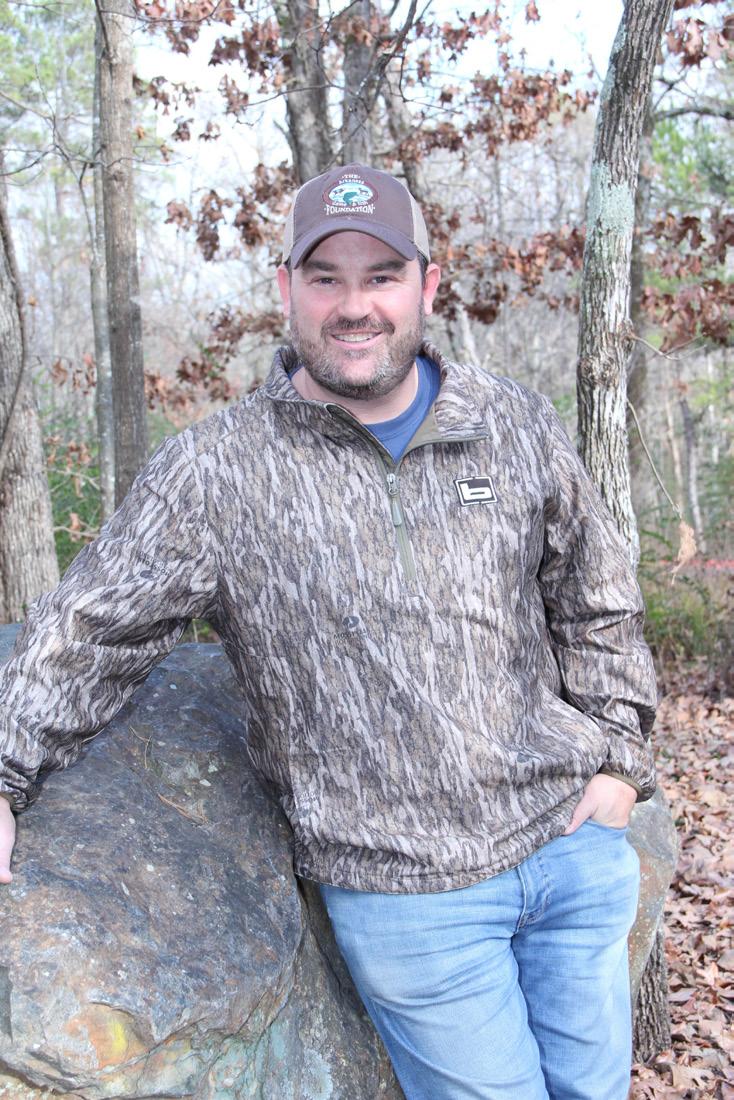
Among these are the Arkansas Outdoor Society, an organization that helps connect young adults with outdoor activities and various youth programs that seek to lure the next generation away from screens and into the great outdoors. These include the statewide Archery in the Schools program, the Arkansas Game and Fish Foundation Shooting Sports Complex in Jacksonville, family and community fishing programs and maintaining the state’s nature centers.
Foundation leadership takes advantage of the captive audience at the banquet to detail the organization’s recent achievements and outline ongoing programmatic goals. This year, that message will lean heavily on AGFF’s Impact Fund, a fundraising vehicle by which donors can target their contributions to the aspects of the outdoors they love most.
“Giving to the Impact Fund helps support critical conservation programs and projects across Arkansas,” said Deke Whitbeck, AGFF president. “The foundation staff works with the Arkansas Game and Fish Commission to identify conservation initiatives and habitat projects that align with a donor’s passion. Donors have more input on how their money is used and more than that, they can see the impact their contribution has had.”
Whitbeck said another attractive feature of the Impact Fund is that the money used is often paired with matching programs that can double or even triple the original donation, thereby doing even more good. Eligible AGFC projects that utilize such money include restoring, conserving, managing and enhancing fish and wildlife habitat for game and nongame species; improving access to public land, rivers, streams and lakes; developing and enhancing recreational shooting ranges; acquiring land for public use; fish and wildlife research projects and species restoration and monitoring.
“The issue in approaching donors has always been trying to figure out, if someone wants to donate $100,000, how we can
show them where their money is going and what we’re going to do with it?” Whitbeck said. “The Impact Fund is a way to provide transparency and accountability to see how the money is being used, specifically.
“Then on top of that we can say, ‘Would you be comfortable if we were able to leverage against U.S. Fish and Wildlife dollars or a private program and use your donation in a threeto-one match?’ And people get really excited about that; they think that’s awesome.”
For families such as the Lawhons, accessing the wilds are second nature. T.J. said the goals of the commission, supported in part by the AGFF, are for that to continue for future generations as well as expand opportunities to families who don’t have a generational link to the outdoors. He said the couple’s part in chairing the AGFF banquet is a small step in that noble crusade.
“I don’t know where I got this from, but I was told at one point that people go through phases in their life with their experiences outdoors, whether that’s hunting or whatever,” he said. “An early phase is it’s all about you, all about what you get to do and where you get to go. Then you transition into a quality or conservation mode where you want good experiences, and you want to leave things better than you found them.
“Then you get into the phase of how can I pass this along to somebody else? How can I see somebody else enjoy what I get to enjoy? I think that’s where we are, seeing someone else enjoy it as much as we do. We see our kids and we see the foundation at work and that helps drive us to participate and be involved.”
A lifelong outdoorsman, media producer and entrepreneur, Ronquest helped develop two of the mid-South’s most iconic outdoor brands: Rich-N-Tone duck calls of Stuttgart and Mississippi-based Drake Waterfowl, a manufacturer of technical hunting and fishing apparel. Ronquest also won the World’s Championship Duck Calling Contest in 2006.
Widely credited with bringing science to the natural area preservation movement in Arkansas, Foti’s career with the Arkansas Natural Heritage Commission resulted in the creation of several important natural areas in the state. Among these, the West Gulf Coastal Plain in southwest Arkansas that served as a model for similar efforts nationwide.
Barringer founded Arkansas Hunters Feeding the Hungry in 2000 to help connect a portion of harvested deer with those in need. Shortly thereafter, Ritter signed on to lead the mission-driven organization. Today, Arkansas Hunters Feeding the Hungry has processed and distributed tens of thousands of pounds of meat to needy families.
Turning a passion for shooting sports into a career, the Potterfields opened a small gun shop in 1977 that would eventually become online hunting retailer MidwayUSA. Their MidwayUSA Foundation, established in 2007, has provided millions in sustainable funding to youth shooting sports teams across the nation.
The family behind the highly successful Morrell® Targets, the Morrell name has come to mean quality, innovation and above all, commitment to the sport of archery. The Morrell Corporation has invested extensively in future generations of archers through the National Archery in the Schools Program and Archers USA’s Varsity Archery.
“The primary focus of the foundation is on conservation and education for Arkansans. The various programs and opportunities the foundation supports are pretty diverse.”
- T.J. Lawhon
TJ and Mandy Lawhon are deeply honored to chair the 32nd Annual Arkansas Game and Fish Foundation Outdoor Hall of Fame Banquet, and they invite all outdoor enthusiasts to join them in recognizing those individuals who have made a significant positive impact on the great Arkansas outdoors. Come celebrate these remarkable honorees and help raise funds to support the vital ongoing work of the Arkansas Game and Fish Commission.

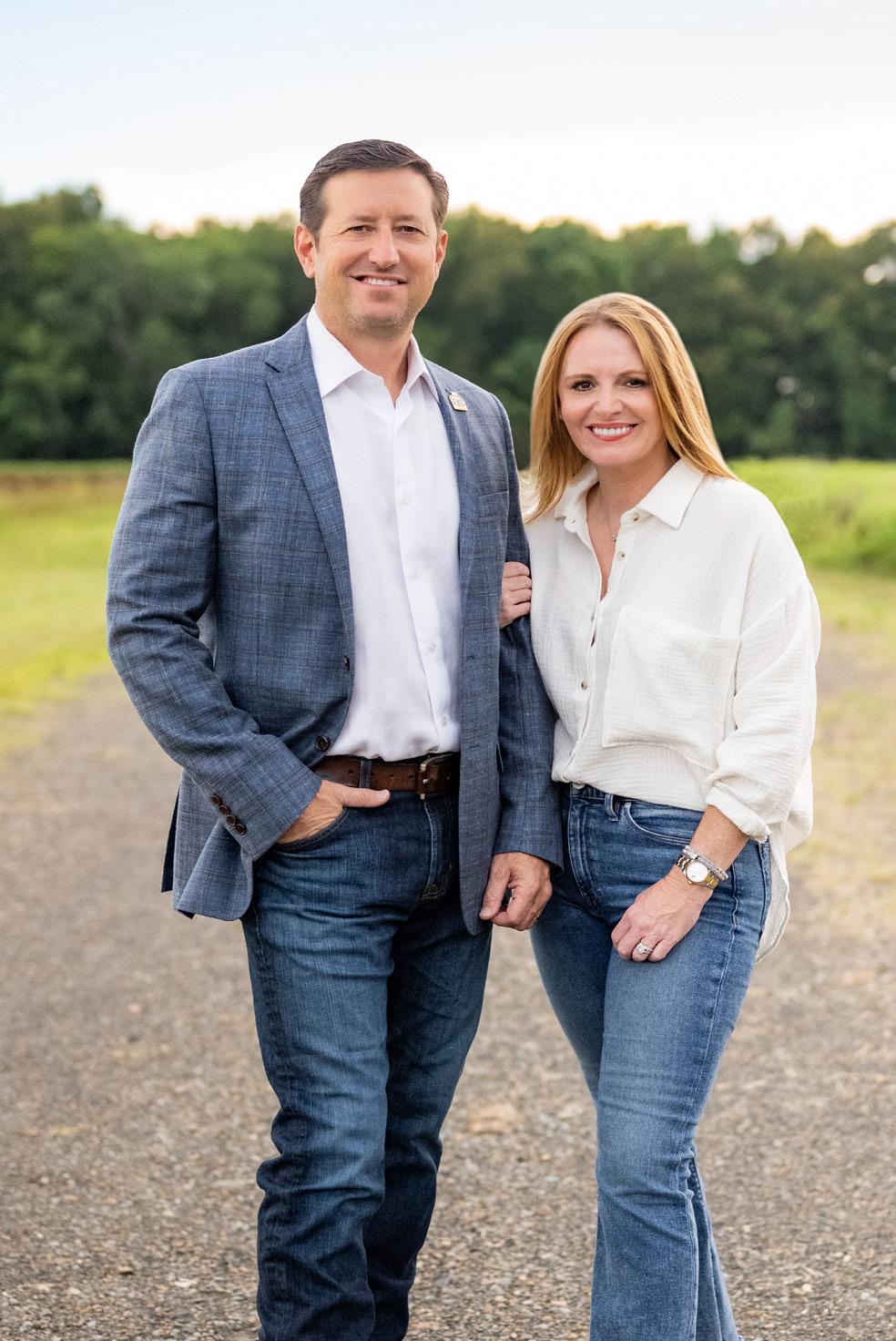
Saturday August 26th, 2023

Statehouse Convention Center Little Rock, AR
Doors Open at 6:00 pm
Dinner - Induction Ceremony - Auctions
Contact Tyler Lawrence - tyler@agff.org

Tickets/Auction - one.bidpal.net/fish
Woodpecker Flats consists of 234± acres in one of the most sought after areas for waterfowl hunting in the state. Just south of Little Dixie, the property has frontage along the Cache River and is in close proximity to both the Cache River National Wildlife Refuge (NWR) and the Dagmar Wildlife Management Area (WMA). All of the acreage is enrolled in the Wetland Reserve Program (WRP) and the easement expires in 8± years. The property offers excellent duck hunting in the two large moist soil units and fantastic deer hunting!

jjones@lilerealestate.com | 870.672.1365



As he takes leave of the Arkansas Game and Fish Commission in an official capacity, capping off a seven-year run as commissioner including the last two as chairman, Bobby Martin of Rogers leaves behind a legacy of commitment to conservation.
And though his term on the commission may have ended June 30 when he handed the gavel to Stan Jones, Martin will continue to be a voice for conservation in Arkansas.
As a commissioner, and then as chairman, Martin prioritized conservation. He grew up duck hunting the public lands and greentree reservoirs of the Arkansas Delta, and that experience instilled in him the importance of natural resources and good stewardship.
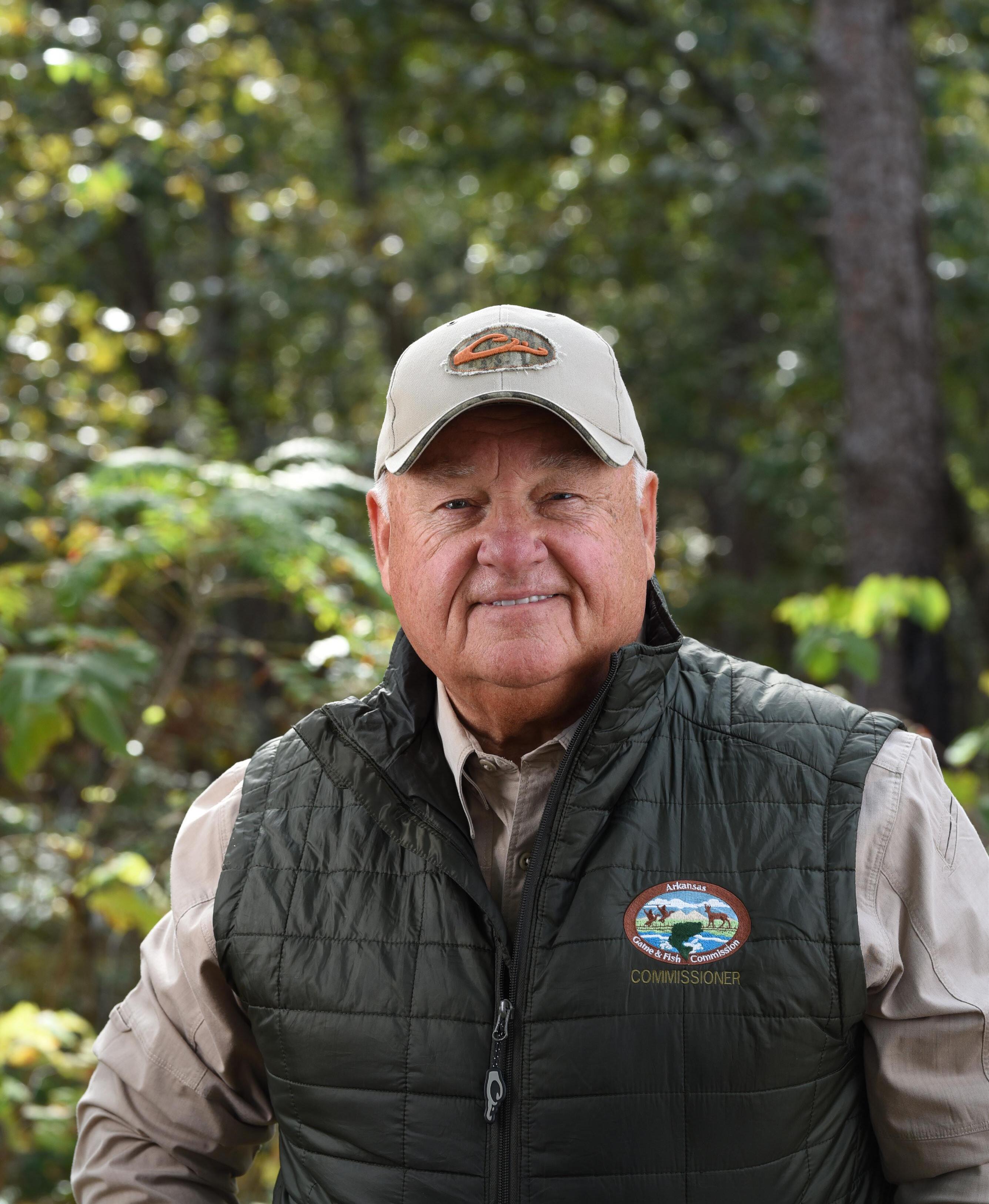
“Conservation matters,” he told Arkansas Money & Politics in 2019. “It matters to our economy, to our quality of life, to tourism. It matters to our personal enjoyment of nature and the relevance of having ourselves connected to it. When people think of Arkansas, they think of the outdoors. And it takes a network of partners to make it work.”
As a commissioner, Martin was always a vocal proponent of conservation. But as chair, he found a platform that allowed him to spread the message of conservation to a wider audience. People may not resonate with “conservation,” he once told AMP, but “they can resonate with clean water, abundant wildlife, quality habitat and access to their version of outdoor recreation.”
As a successful business leader, Martin always appreciated the economics behind conservation and good stewardship. Currently serving as executive chairman of Gap Inc., Martin also is an operating partner with the The Stephens Group, the former CEO of Walmart International, a former executive with Dillard’s and a former chair of the Arkansas Game and Fish Foundation, the commission’s fundraising auxiliary. And for good measure, in addition to many other awards and accolades, Martin was voted to AMP ’s 2022 Influencers of the Year list.
AMP looked back at past visits with Martin about the importance of conservation, its sometimes-not-so-obvious impact, and the role of the commission to foster a spirit of stewardship.
“There’s no other way to say it: We are clearly in a serious fight to save one of the most vital wildlife habitats that we have. And that is our bottomland hardwoods. They’re very much critical and key to the migration and wintering of mallards and other duck species. And so much of it is already lost.”
“The early settlers of Arkansas just about wiped out everything that made The Natural State. Yet through generations of private landowners, legislators and conservationists, we’ve been able to bring back a lot of what we lost. But the work of conserving our wildlife and wild places is never done.
“As we balance recreational use with sustaining the resource, each generation is met with new challenges. Working together to invest in Arkansas’ green timber legacy will certainly be one of the greatest challenges this generation of conservationists and the AGFC has encountered.

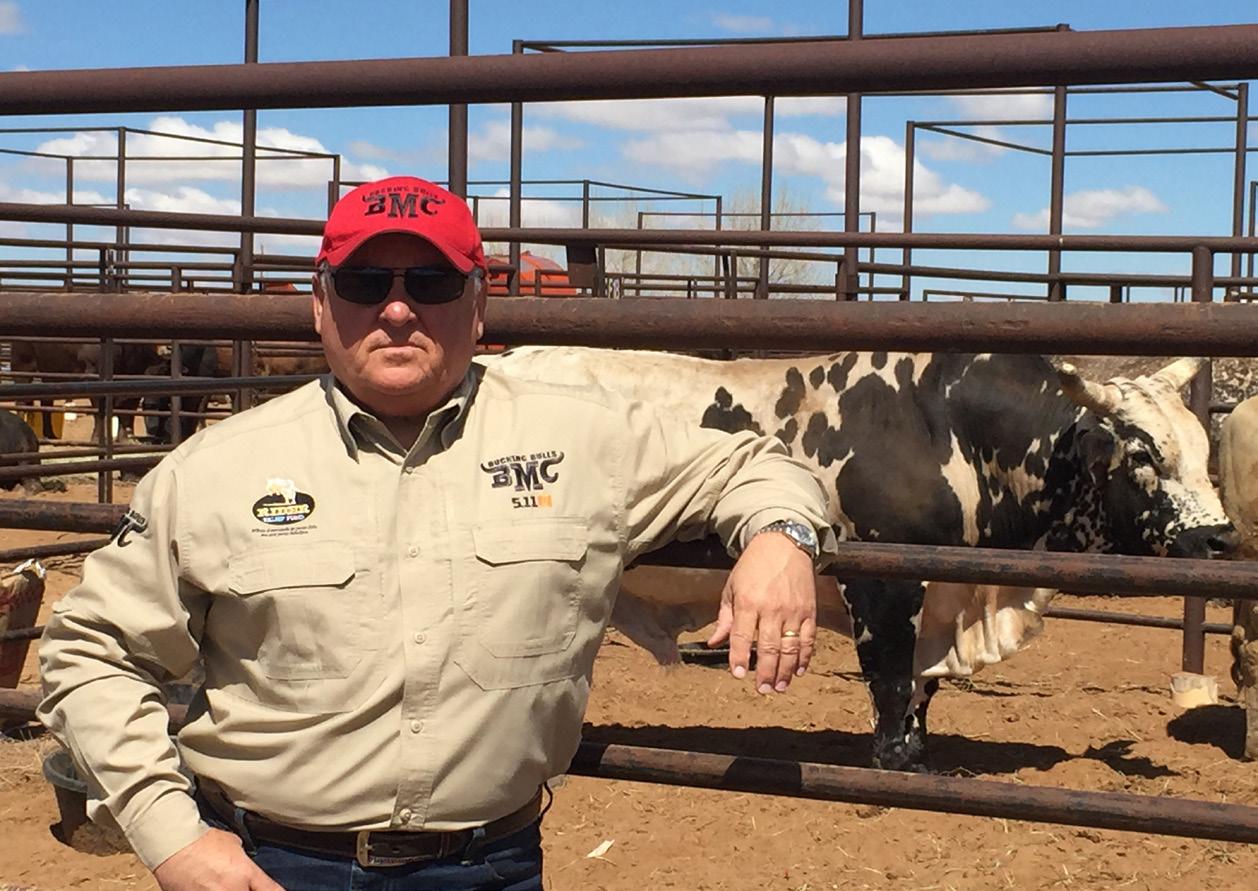
“But it is our collective responsibility to effectively respond in support for all generations.”
On the commission keeping the next generation engaged in the outdoors and addressing declining sales of hunting and fishing licenses
“We’ve got to be sharper in where and how we communicate our message. Anglers and hunters — the hook and bullet crowd — have represented the largest funding source of our conservation body. We have to double down on marketing and social media and how we reach the public. We’re losing a generation, losing potential conservationists, and we can’t let that happen.
The people we serve are changing, and the way we serve has to change. People enjoy the outdoors differently today. It’s not all about hunting and fishing anymore; it’s about natural resources. We need to make sure the next generation stays engaged with the outdoors in some capacity, and we need new folks to engage into conservation.
“It doesn’t have to be hunting or fishing, but they need to know the importance of hunting and fishing in conservation. We cannot, we must not, lose that generation.”
“If we have children who have never even climbed a tree or walked in the forest, how can you ever get to understand or be curious about nature? Most of today’s parents likely grew up closer to nature, enjoyed unstructured play … played in the rain, chased lightning bugs, and know the simple and healthy joy
of this play that in turn shaped how they see the world.
“We’re losing a generation. We’ve got to bring them back and get them reconnected. They need to know what it means to be connected to nature. It is critical for the future of conservation that we must not let that happen [lose that generation].”
“We live in a state that is one of the most rich and diverse in natural resources than anywhere in our country. I don’t know an Arkansan that doesn’t light up when they tell others about life here in The Natural State. From the unique beauty of the Grand Prairie region in east Arkansas to the incredible vistas that overlook the Boston Mountain range in Northwest Arkansas, we enjoy some of the best there is in the outdoors.
“Whether you are a sportsman or woman who is reveling in our world class hunting and fishing or vast opportunities for outdoor recreation in it, I think we all have that sense of pride and ownership in one of nature’s best places on earth. It has always been hard for me to not feel a sense of responsibility to it, to protect and do what I can to enhance it. I like to believe we all encounter that feeling each time we retreat into nature. We are truly blessed here in Arkansas.”
“While most likely hunters will remain among our highest contributors to conservation initiatives, it is time for all of us to stand up and do our part. Keeping our wild places wild and abundant is important to all outdoor recreationists. It is in the DNA of this state, a source of pride, and a path to even greater economic prosperity. But, in order for Arkansas conservation partners to continue to make a significant impact, a more diverse user group will need to rise up and stand in the funding gap.”
And finally, from his closing remarks as commission chair, Martin said he wished more Arkansans could sit in his seat so they could appreciate the invaluable role the commission plays.
“It’s people you’re most impacted by in this experience. In the last seven years, I’ve learned what the people of the AGFC do, and I’ve come to truly appreciate it,” he said. “So often, the work they do is totally misunderstood or missed completely, but they continue doing this work with conviction that it’s the right thing to do.”

The Institute for Integrative & Innovative Research (I³R) at the University of Arkansas in Fayetteville has been featured in recent news as its researchers developed and are evaluating new technology that uses neurostimulation to restore the sense of touch to people who use a prosthetic hand.
The procedure, performed earlier this year by surgeons at the University of Arkansas for Medical Sciences in Little Rock, represented only the second time such a prosthetic limb with the tech had ever been implanted on a person.
But the institute is about much more than that. The National Science Foundation stated that “the grand challenges of today — protecting human health; understanding the food, energy, water nexus; exploring the universe at all scales — will not be solved by one discipline alone. They require convergence: the merging of ideas, approaches and technologies from widely diverse fields of knowledge to stimulate innovation and discovery.”
And that’s where I³R comes in. Ranu Jung, associate vice chancellor and founding executive director, said the institute is
addressing different “ecosystems,” growing and strengthening them through convergence strategy. Jung said the institute’s first “grand challenge” is integrative health and identified three projects underway as examples of research addressing it.
“The evaluation of the neural-enabled prosthetic hand system in Arkansas was launched earlier this year,” Jung said. “It’s been active for several years, and we continue to recruit new participants for the clinical trial. We also will be announcing an important milestone and significant expansion of this project in the coming weeks.”
Within integrative health, many individual challenges await the institute’s attention. The Centers for Disease Control and Prevention reports that heart disease is the leading cause of death in the state, followed by cancer, COVID-19, chronic lower respiratory diseases, accidents, Alzheimer’s disease, stroke, diabetes, kidney disease, influenza and pneumonia. The institute is addressing these problems through health, food and the cyber technology related to both.
“I³R impacts the lives of Arkansans in multiple ways,” said Delia Garcia, the in-
stitute’s director of strategic communications and engagement. “We operate to solve what we call grand challenges, which are wicked problems that, in order to address, require transdisciplinary research to create solutions through innovation and discovery.”
The second project is data-driven agriculture to bridge small farms to regional food supply chains, a National Science Foundation-funded project which helps in fulfilling the UA’s landgrant mission.
By bringing together industry, clinical partners, nonprofits, policymakers, think tanks, researchers and the community, I³R will develop solutions to address metabolic health.
“By leveraging our collective expertise and engaging in an extensive planning and user discovery process to deeply understand the needs of producers, buyers and other stakeholders, we have the opportunity to make both a positive societal and economic impact, particularly here in Arkansas,” said Meredith Adkins, assistant research professor at I³R and lead researcher on the project.
At the institute’s recent topping out ceremony, Chancellor Charles Robinson stressed that innovation thrives at the U of A.
“Research with a purpose is a testament to our land-grant mission to serve the people of our great state, and with a mandate to use research to drive regional economic development, I³R is taking the university’s research capabilities and impact to new heights. It’s research that changes lives.”
Another challenge that falls under the integrative health umbrella is sensorimotor rehabilitation in virtual reality. Sensorimotor is the relationship between a person’s bodily activity and their environment. This project has developed new VR technology to be used by people with physical impairments during the rehabilitation process.
“Recent studies have shown that virtual reality-based interventions can be used for the rehabilitation of mobility and promotion of physical activity for individuals with sensorimotor impairments due to neurological injury or disease,” said Andres Pena, assistant

“I³R is taking the university’s research capabilities and impact to new heights. It’s research that changes lives.”
research professor at I³R. “Moreover, we know neuro-rehab interventions are more effective when paired with sensation/haptics. A factor hindering the effectiveness of virtual reality for rehab is that current virtual reality platforms have limited to no sensory feedback. So, we set out to bridge this gap.
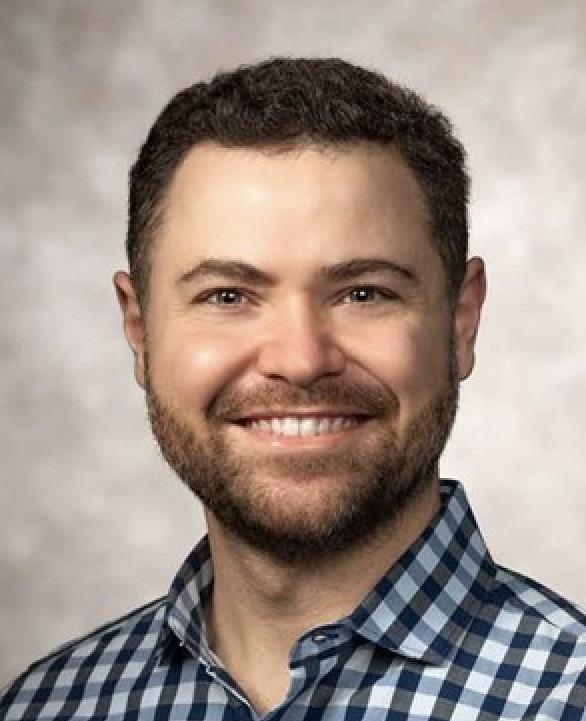
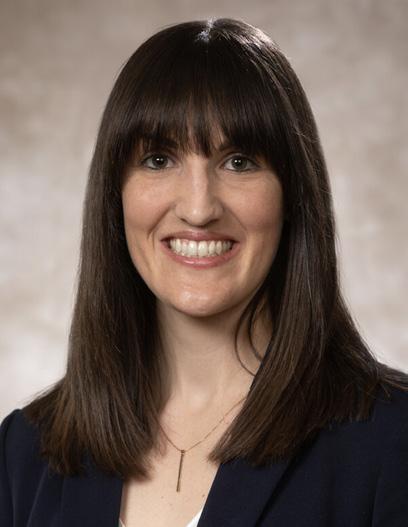
“The team has developed ExtendedTouch (xTouch), a wearable neurohaptic feedback platform for immersive virtual reality. The hands-free design enables users to dynamically interact with and feel objects in virtual reality environments without the need for hand-mounted devices.”
Aliyah Shell, a doctoral fellow at I³R researching this topic, said this innovative experience has profound implications for rehabilitation and physical therapy. The xTouch platform will enhance the immersive virtual reality experience, supplying more realistic visual and auditory feedback about environmental interactions. Another potential application is for combat medical training.
“Imagine being able to train doctors to treat patients in combat through the power of immersive virtual reality with xTouch, which would not only simulate a combat scenario but allow the doctor to feel a scalpel in their hand — a capability that is not currently available but is being developed by the team,” Shell said. “Another application is for physical rehab patients in rural communities who don’t have convenient access to rehabilitation services. They could complete their rehab program virtually.”
In terms of creating wellness for the state’s citizens and creating new sources of economic development, the institute’s work means transformative discoveries, which the institute will develop, translate, deliver and deploy at scale for societal impact in Arkansas and even the world.

“We will move from basic science to making the technology ‘real’ to navigating the complexities of policy, politics and human
behavior,” Jung said. “We will pursue the discovery, development and translation effort from a perspective that attends to the economic, policy and ethical factors that shape the impact of our work. The team is committed to fostering a sense of belonging for all and empowering women and other underrepresented groups that are missing from the workforce. The positive impact will be felt here at home and will grow from the center out.”
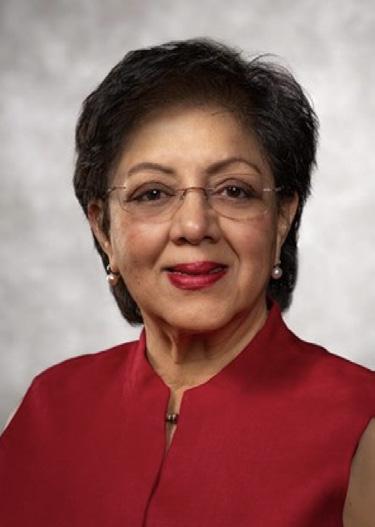
The institute’s mission is to pioneer solutions to problems through convergence research across academic, industry, government and nonprofit sectors to make a positive societal impact by creating and deploying innovations to scale. Its vision is to be the recognized leader in convergence research for societal impact and the preeminent partner in creating and deploying comprehensive, transformative and scalable innovations that stimulate economic growth and improve health and well-being in Arkansas and beyond.
Its current priorities include continuing recruitment for human clinical trials in the neural-enabled prosthetic hand system project, recruiting “brilliant” researchers to conduct leading-edge research that drives innovation and talented staff to support and advance the institute’s work, and securing funding to establish a sustainable protein technology hub in Northwest Arkansas.
“Protein production must drastically increase to meet the nutritional needs of a growing and wealthier world,” said Philip Sambol, I3R project manager. “Current means of production are placing unsustainable demands on our land, water and energy resources. A resilient food system demands innovative methods for resource-efficient and distributed protein production. As a flourishing area with unique, diverse and ample
assets, Northwest Arkansas is fertile ground for development of a globally competitive sustainable protein production ecosystem.”
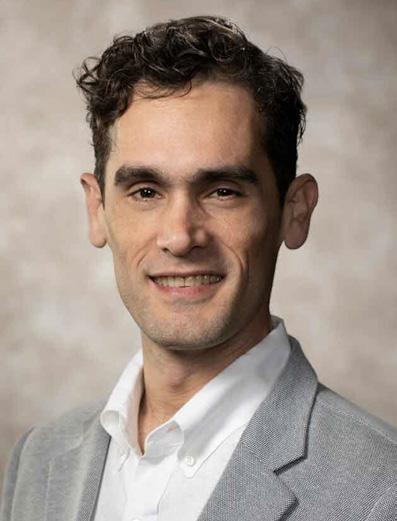
A final priority is the construction of a new building, a 144,000-square-foot, stateof-the-art research facility, which will bring unique capabilities to the UA campus and region. The building will be located at the center of campus at the corner of Dickson
equipment, but perhaps more importantly, every floor will feature expansive collaborative spaces designed to bring the people of I³R together to workshop ideas and move those ideas toward innovation,” Garcia said. “The building’s site was chosen specifically to encourage interaction with all parts and people of the campus and surrounding industry. It is a short walk from the Dickson Street Entertainment District, the Ramble Arts Corridor and entrepreneurship support centers like the Arkansas Small Business and Technology Development Center, Startup Junkie and the Brewer Family Entrepreneurship Hub.”
Jung said the blueprint for success includes excellence in research to propel the university and region as research leaders.
and Duncan Streets, and everything from the building’s workspaces and labs to its location will be designed to foster collaboration, integration and innovation.
“This facility will house leading-edge technology, laboratory space and research

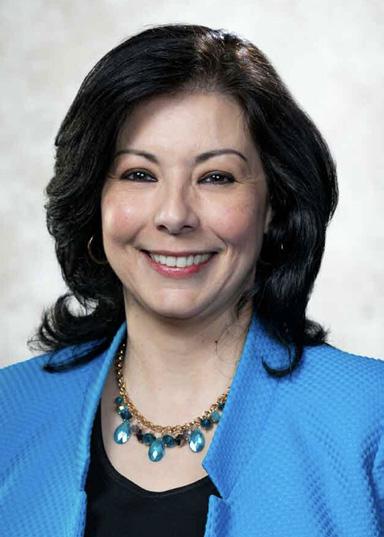
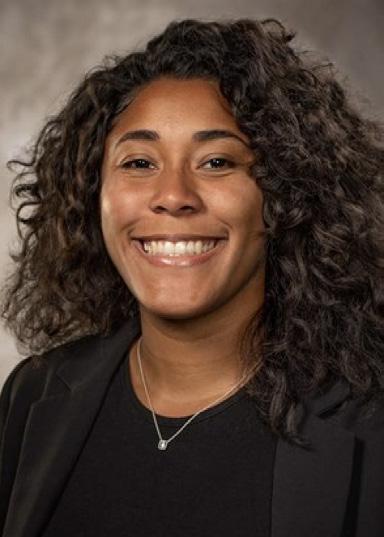
“Educating tomorrow’s generation to ensure continued success for our efforts far into the future, leveraging location for a growing wheel of impact to harness the opportunities and assets available in Northwest Arkansas to further the success of the state and region and make a positive impact far beyond, and collaborations, which are our framework for convergence of all these components to become a reality.”
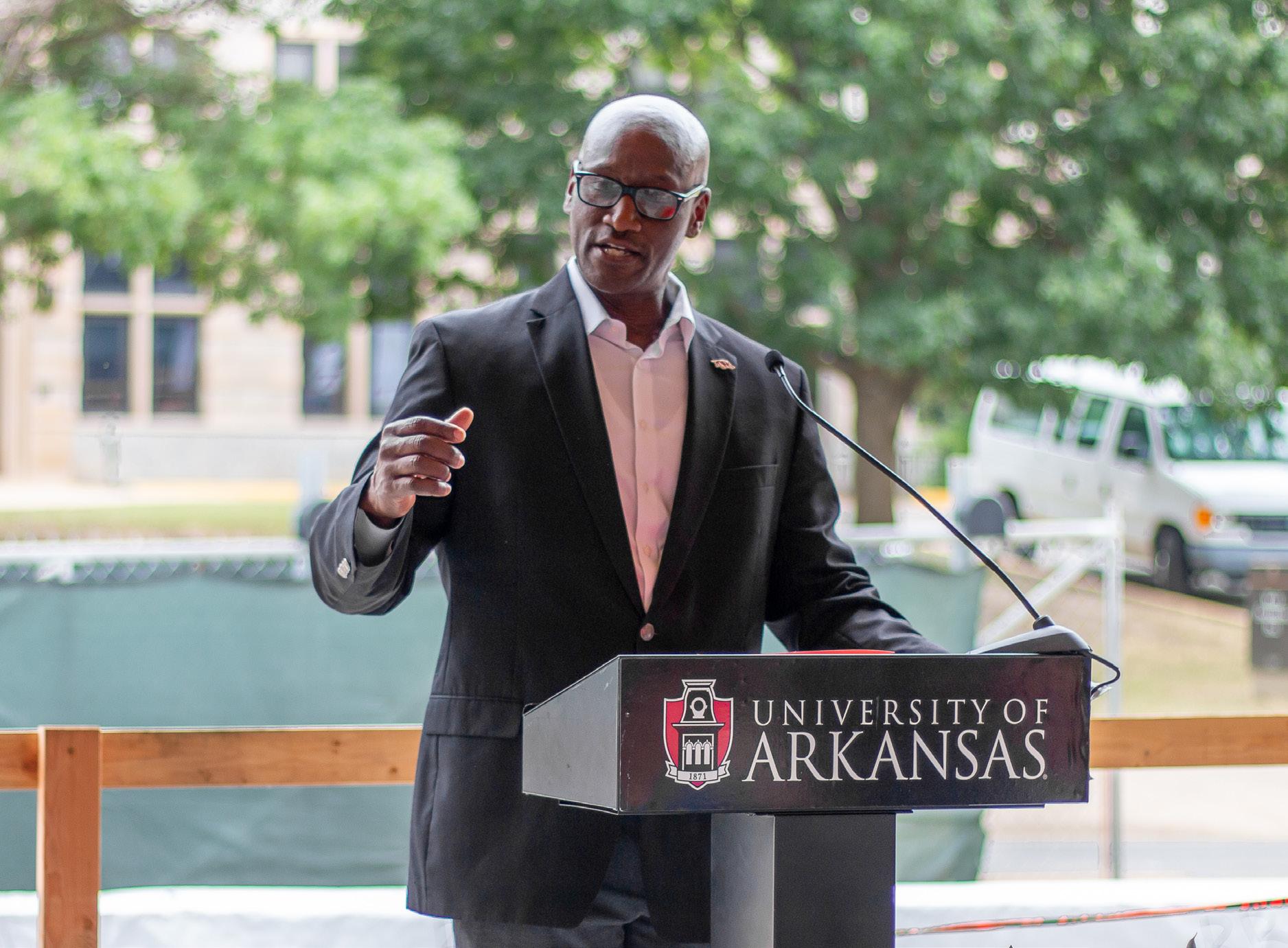
“Imagine being able to train doctors to treat patients in combat through the power of immersive virtual reality with xTouch.”UA Chancellor Charles Robinson spoke at the recent topping out ceremony for the institute. (Photo courtesy of UA) Aliyah Shell Philip Sambol Delia Garcia




At USAble Life, our singular mission is to make a meaningful difference in the lives of others, which includes our employees. We’re consistently voted a Best Place to Work, and that’s because we know that when our employees speak and we listen, we’re collectively able to create a great place to work — helping us to make good on our mission.

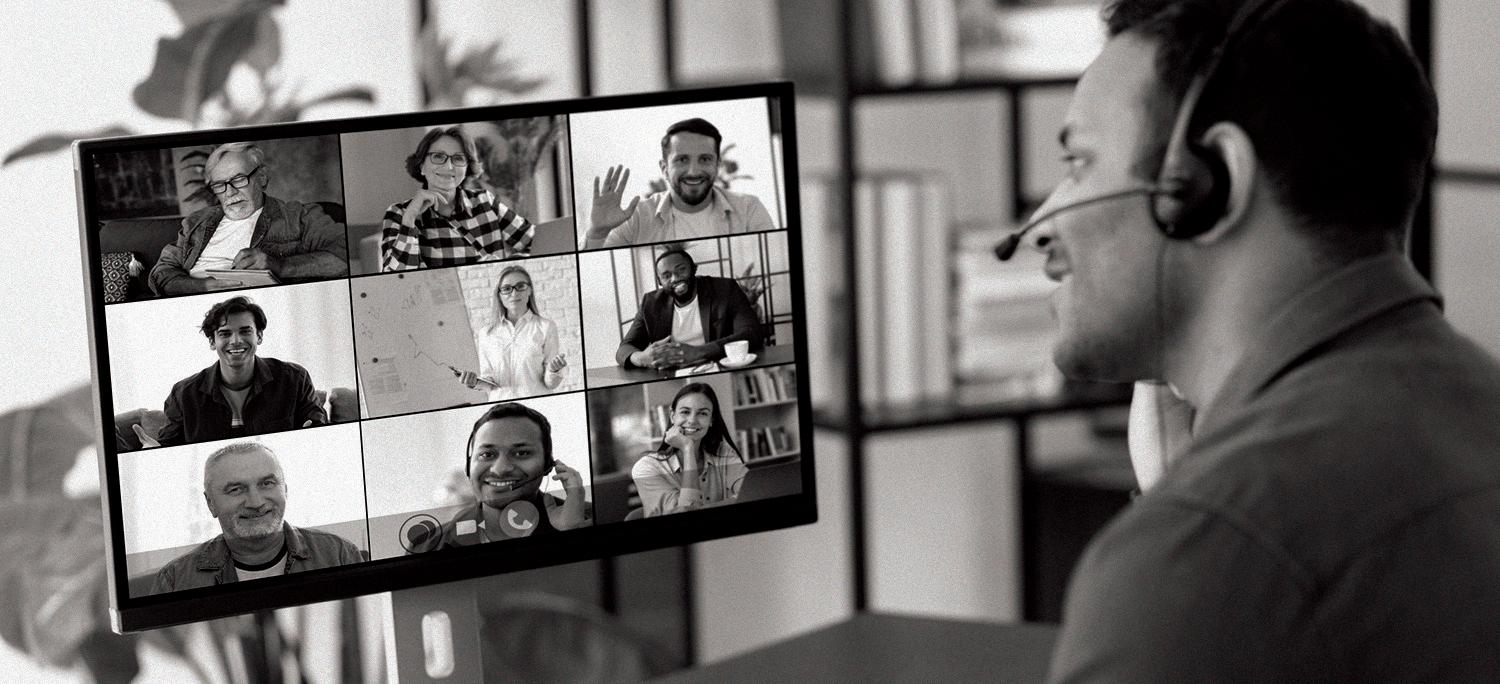
In Arkansas and across the nation, they’re hiring. But there doesn’t seem to be as many eager or available workers as there are jobs.
Inside this month’s issue, AMP visits with Mike Rogers, the state’s first chief workforce officer; hears from businesses — small, medium and large — about remote workforce strategies that help attract workers; hears from Division 1 college coaches about talent recruitment; features the latest from Arkansas-based Be Pro Be Proud, the program that’s helping high school kids discover that good jobs are there for the taking; and explores those hidden pockets of workforce talent that sometimes go overlooked.

When talking business, Mike Rogers — the recently appointed first chief workforce officer for Arkansas — is apt to use terms and phrases like “incentivize,” “reverse engineering,” “synergy” and even “creating a portal of harmony where eHarmony meets Indeed.”
Despite his business acumen, though, Rogers doesn’t own a suit and never has. When Gov. Sarah Sanders named him to lead her newly created Governor’s Workforce Cabinet, Rogers attended the announcement ceremony in Bryant wearing a long-sleeved blue denim-like shirt with bright orange stitching that framed the pockets.
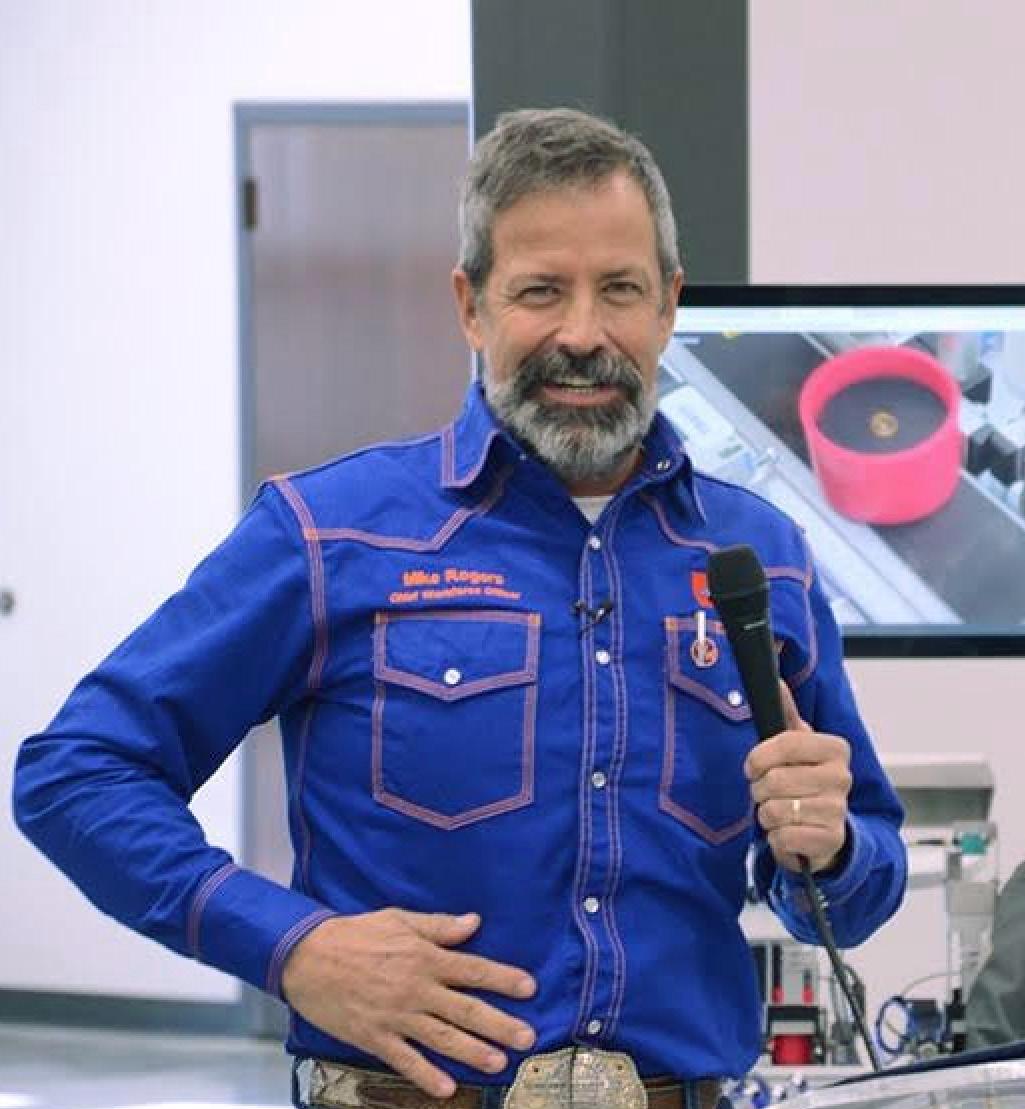
“It’s the way I am,” he said. “What you see is what you get.”
The business lingo he uses is not for show. It’s his passion and Rogers’ way of expressing excitement and optimism for the state’s workforce.
For the first 20 years of his work career, Rogers, 49, worked as an hourly maintenance and refrigeration technician at night. During the day, he taught agriculture and industrial maintenance at Siloam Springs High School. He’s also served as senior director of maintenance and refrigeration for Tyson Foods.
Rogers has been on both sides of the business realm — teaching and working. Now, he wants to use his experience for the benefit of the state.
As the state’s first chief workforce officer, Rogers is charged with advising Sanders on workforce development and career and educational strategy. It’s part of the governor’s wide-sweeping programs aimed at improving opportunities in Arkansas and creating reforms to keep people in the state and recruiting new businesses.
“It’s time for our state to build a strong pipeline of skilled, qualified workers,” Sanders said in announcing Rogers’ appointment. “Mike’s expertise will be crucial to getting that done. He has been on the ground floor of companies across our state, training young workers and developing technical education programs, making him the clear choice to lead our wholeof-government approach to this issue.”
Rogers will oversee the collaboration of six state agencies in creating strategies for developing education and a robust pool of opportunities for potential workers in the state.
The agencies are the state departments of Commerce, Education, Corrections, Labor and Licensing, Human Services and Veterans Affairs. Rogers and the Workforce Cabinet will present a plan to Sanders by Oct. 1.
Rogers has also developed six missions of the governor’s cabinet.
Members of the group will develop an overall com-
munity strategy; develop a “pipeline of talent” of technical and higher education students, underemployed and unemployed; listen to what employers want from employees; establish a service that serves as a matchmaker between employers and potential employees; create types of internships and apprenticeships for various businesses; and prepare for the future of employment in Arkansas.
Rogers didn’t seek out the position he now holds. Instead, it sought him. Along with 19 other business leaders, he was asked to speak on the behalf of the state’s workforce division at a roundtable discussion during Sanders’ gubernatorial campaign.
The event was held at the Saline County Career Technical Campus, an Arkansas State University workforce training facility in Bryant.
“People knew my passion around workforce when I taught the trades and was at Tyson,” Rogers said. “My goal has always been to champion the blue-collar worker. They are undervalued and underrepresented.”
“I shared my visions and my frustrations. I said business decisions were always made by government and educators but not by the workers.”
He said Sanders contacted him after that event and asked him to head the new program she had created. Rogers confided that he wouldn’t have accepted the position if anyone other than Sanders had offered it to him.
She’s not like other politicians who may think they know all the answers, he said.
“She listens,” Rogers said of Sanders. “She surrounds herself with people who’ll give her insight. She quickly processes information, challenges the status quo and is helping better the state.”
Rogers was born in Branson and moved to Northwest Arkansas when he was 3. He’s been there since. He earned a degree in agriculture at the University of Arkansas and later completed his master’s degree in education there.
He taught at Siloam Springs High School and was the energy manager for the school district. At the same time, he worked at Frez-N-Stor and took refrigeration courses through the Refrigeration Engineers and Technicians Association.
Rogers holds six additional teaching licenses with
the Arkansas Department of Education for secondary and post-secondary education. In 2016, he was the runner-up for the Arkansas Teacher of the Year.
If that wasn’t enough, Rogers is also a minister of a cowboy church in Siloam Springs.
He’s open about his faith and doesn’t shy away from discussing it – even when working for the state.
“I’m not worried about saying something that may cause me to lose my job,” he said. “I’m worried about Judgment Day for what I didn’t say.”
He said he lets his faith direct him in decision making.
“The Lord shows me how to do things,” he said.
That faith fuels his positive attitude as well.
“My whole career is about the need to innovate and reduce challenges,” he said. “I see the problem as the solution. When dealing with incarceration, we have too many inmates. We can turn that problem into a solution by preparing inmates for meaningful work during incarceration and re-entry.
“We need to ask employers what they want and incentivize. We can use the prison system like a workflow and teach inmates technical skills suited for their needs. When [inmates] are released, they will already have their resumes built and the needed experience for success.”
This would reduce recidivism in prisons, he said, and noted the same workforce principals could be used to help veterans returning from duty.
“We can use the experiences they already have,” Rogers said of veterans. “What is the best way we can develop this? By cross-walking prior duty experience to civilian jobs, we can help veterans continue to serve. We can become a state that draws from others.
“We can be a leader in this, and people would move to Arkansas for the opportunities.”
As for the potential success of the Governor’s Workforce Cabinet, Rogers equates it with cooking.
“We have to know where all the utensils are in the kitchen and work as a team bringing them together,” he said. “We can work with employers, see what they want and give them the right employees.
“It’s like baking a cake. To make it good, you start with the best ingredients and follow the recipe. The icing on the cake is that Arkansans find purpose through value-added work.”
“People knew my passion around workforce when I taught the trades and was at Tyson. My goal has always been to champion the blue-collar worker. They are under-valued and under-represented.”
Be Pro Be Proud’s Draft Day helps connect students with potential employers.
(Photos provided)
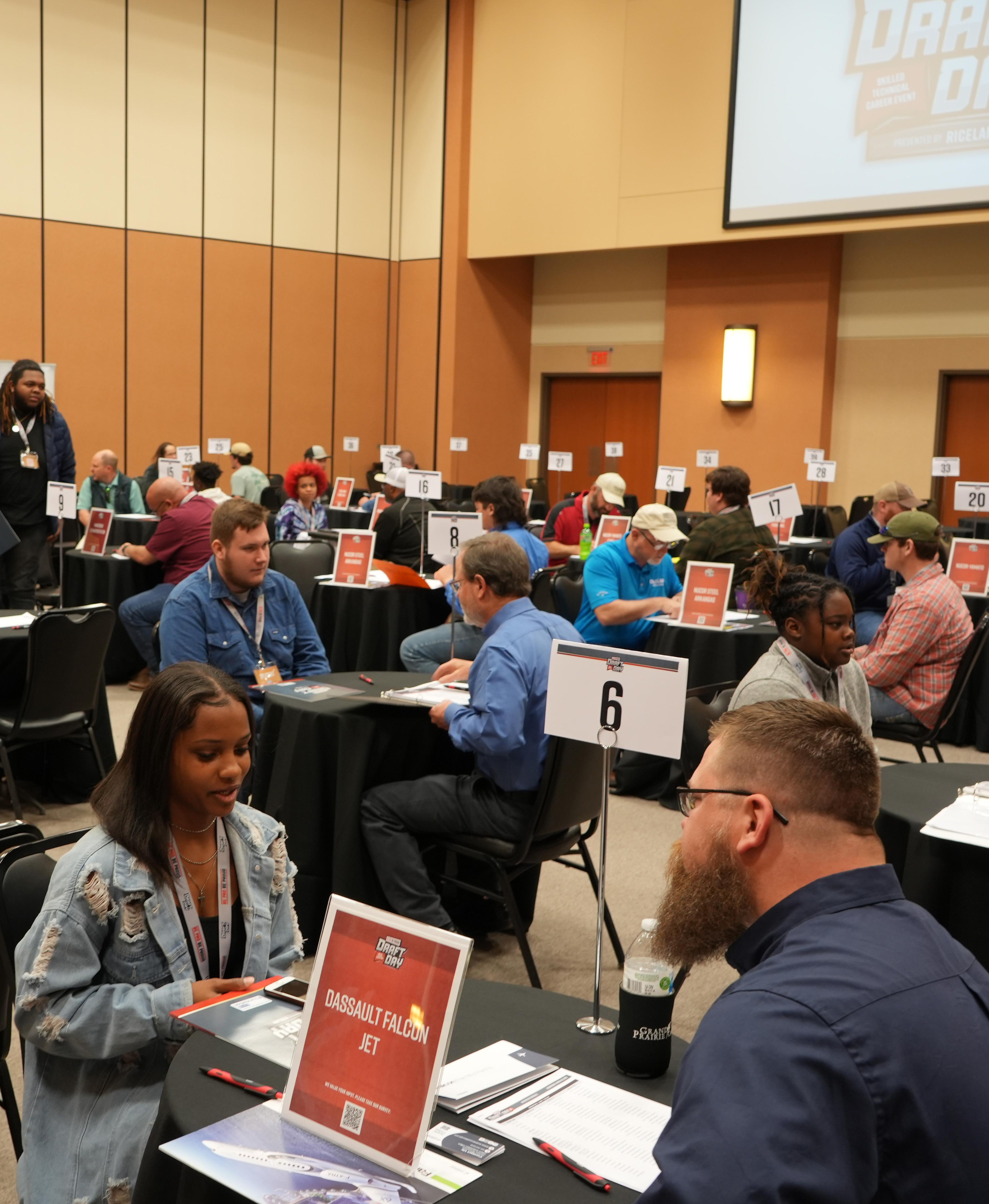
There are many unsung heroes that keep our economy rolling and make our way of life possible in the first place.
Many are the hard-working, blue-collar workers who quite literally keep the gears turning: mechanics, carpenters, millwrights, welders, electricians, plumbers and more besides. For all the good work they do, however, there simply aren’t enough hands on deck. Arkansas’ trade workers are calling for backup, and institutions across the state are moving full steam ahead to fill their ranks with new recruits.
“I would call it a crisis,” said Randy Zook, president and CEO of the Arkansas State Chamber of Commerce. “We have, depending on the source of information, somewhere between 75,000 and 100,000 open jobs in Arkansas. It’s a stunning number, sort of shocking when you hear it, but it’s true nationally. We’ve got about 10 million open jobs in America and only about 6 million people who are categorized as officially unemployed, so it’s nearly a 2-to-1 ratio of open jobs to people in the marketplace who are looking for these jobs.”
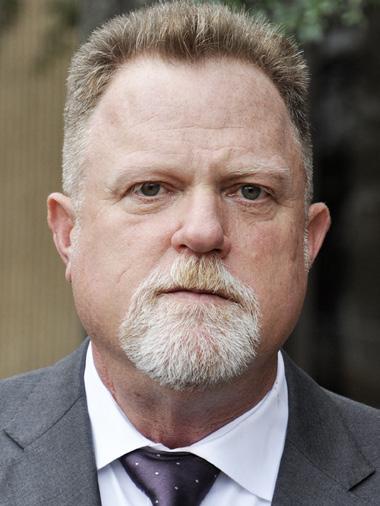
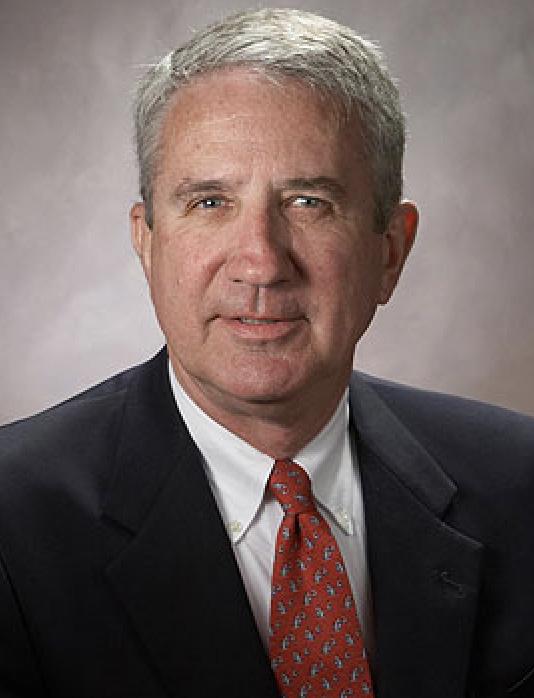
Nor is this crisis limited to any one industry. It runs the gamut from health care to construction, manufacturing to hospitality, the military to service industries. And as much as each of these industries has a need for its own type of skilled technician, there are trades such as plumbing that they all rely on in some form or another.
This lack of workers, both in sufficient quantity and quality, creates a significant bottleneck for growth across businesses of all types. For companies that deal directly in these trade jobs, they are unable to recruit and grow in response to the massive demand they face, while other industries may find their projects and expansions delayed for want of enough workers to get the job done.
According to Bryan Spradley, training director for the Arkansas Oklahoma Carpentry Apprenticeship, there are individual construction projects happening right now in Arkansas in need of 100 carpenters or more. Such shortages translate into lower profits, slower economic growth and lower tax revenue for government at all levels.
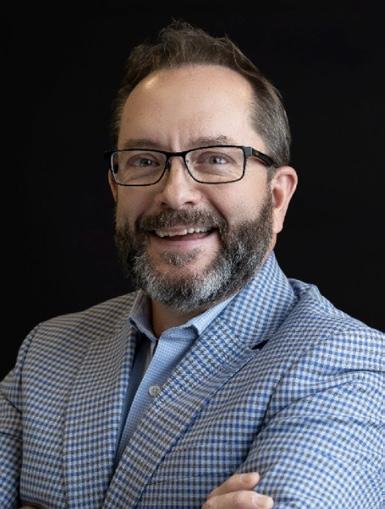
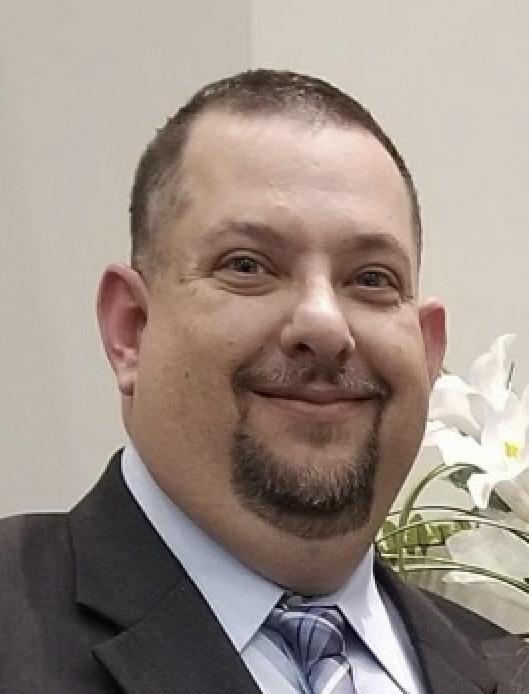
“Each week, we get a phone call from one of our local companies that says, ‘We need this skill set, can you help us?’” said Kendall Ross, executive director of the Center for Economic Development at the University of Arkansas at Fort Smith. “The truth is, there are not enough workers to go around to everyone who needs them. You can drive around town and pretty much see help wanted signs everywhere. So, I think the goal here now is, how do we help people get the skill sets they need in whatever position it is they’re trying to get into?”
Not only would an influx of new trade workers break open the bottleneck, but the potentially thousands of well-paying jobs with good benefits would be a strong economic stimulus of their own.
“You’d have more people able to improve the quality of their lives, you’d have more people able to support their families at the levels that include more and better choices,” Zook said. “Everything from what you eat to where you live, to what you drive and what you do with your time. It would make a larger economic pie in whatever area you’re talking about, whether it’s Arkansas or the country as a whole. We’d be more competitive, more attractive and life would be better.”
Of course, building a new workforce is easier said than done. Even if finding enough willing candidates was a quick process, training them would not be. Combine that with a declining birth rate and the fact that the baby boomer generation is rapidly retiring, and finding new workers is as much a race to replace old ones as it is to actually grow their numbers. Luckily, there are numerous programs across the state to help recruit and train the next generation of working-class heroes.
Among the most prominent and successful of these programs is Be Pro Be Proud, an effort launched in 2016 through the Arkansas State Chamber of Commerce to change perceptions around skilled professions and show that they can be a career of first choice, rather than a backup to a four-year degree path.
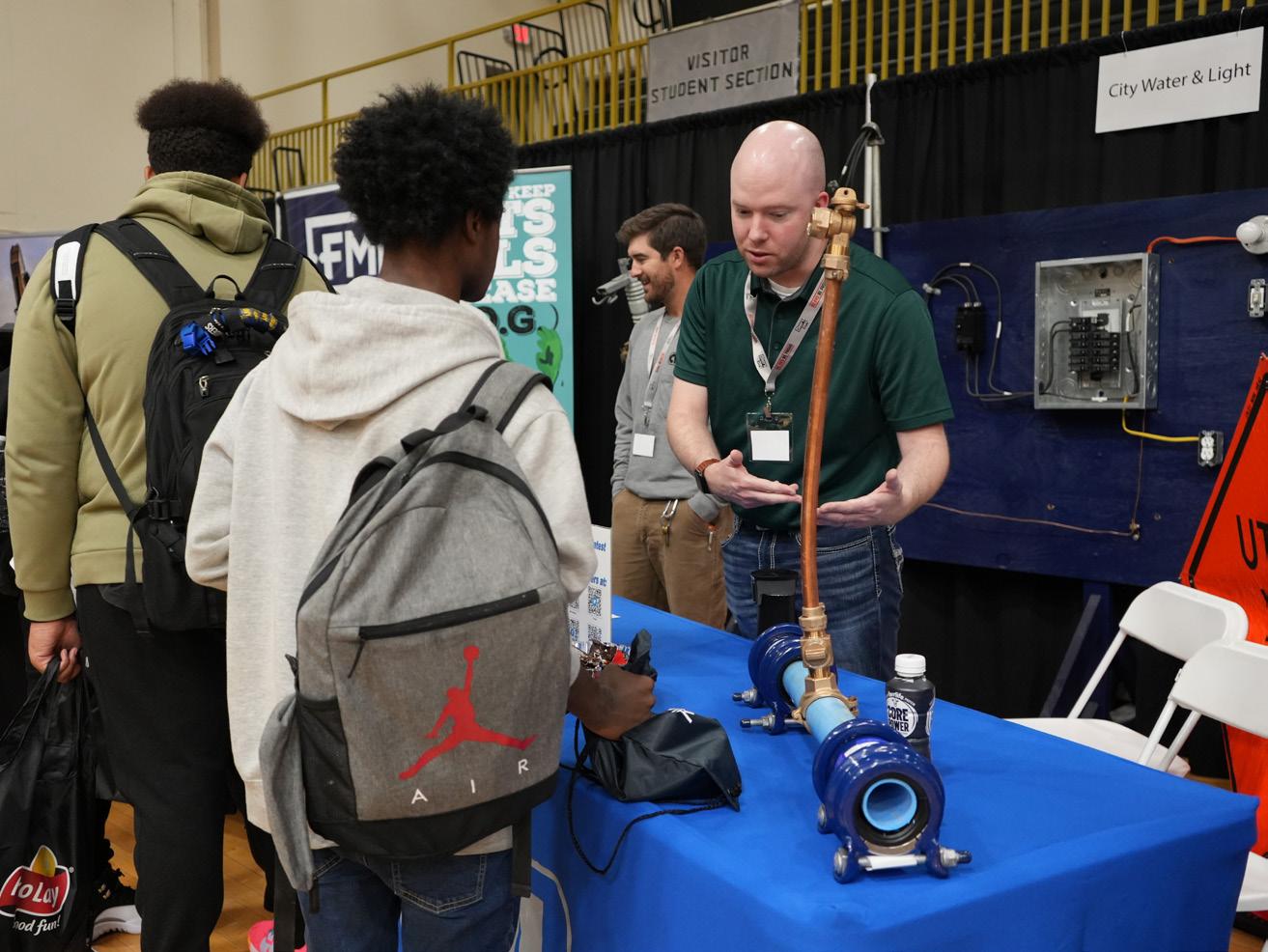
“We let our technical education capacity degrade over a long period of time,” Zook said. “[We thought] everybody’s supposed to go to college; well, that just hasn’t worked out very well. A lot of people don’t have to pursue a four-year degree, they can find above-average, high-demand wage jobs that don’t require that kind of preparation.”
Be Proud works to spread awareness of that idea, especially to middle- and high-school students, through two primary means. The first is Be Pro’s website, which shows students detailed information about a wide array of skilled professions, such as the responsibilities a profession entails, its average income in the first five years, average annual job openings and how long the training takes, as well as program resources, surveys and more. The second approach is, more fittingly, hands-on.
out of the approximately 175-day school year that they are on school campuses across the state. Roughly 20,000 students participate in the workshops annually, with Be Pro estimating that they’ve interacted with some 175,000 students in total.
Once a student’s interest has been captured, Be Pro invites them to continue the conversation and get involved in technical training courses, as well as sharing their contact information with post-secondary training programs and employers. Be Pro provides them with workshops to prepare them for job interviews and prepairing resumes, which culminates in Draft Day, an event that directly matches students with prospective employers, setting them on an immediate career path after graduation. Of 771 seniors who participated in Draft Day last spring, 40 percent were offered jobs or invited back for follow-up interviews. In fact, Be Pro has been so successful that its operations have spread beyond Arkansas to Georgia, North Carolina, South Carolina, Tennessee and New Mexico.
“We have two mobile workshops: custom 53-foot, double-expandable commercial tractor trailers that have about 14 simulator stations on-board,” said Andrew Parker, executive director of Be Pro Be Proud. “They are virtual or fully immersive simulations that allow a student to experience what it would be like to train as a lineman, diesel technician, in robotics, welding, construction, CAD/CAM design, heavy equipment operation. We have a team young enough that they’re relevant to the students they’re talking to, but also have had some experience that makes them reliable for the information they give.”
These mobile workshops see plenty of use: 150 days or more
But just finding a prospective trade worker isn’t enough; they also need to be taught the skills necessary to get the job done right. A good place to start is one of the many educational institutions across the state, such as UAFS and its Center for Economic Development.
Established in May 2022, the center is actually a combination of three other centers: the Family Enterprise Center, a regional office of the Arkansas Small Business and Technology Development Center and the Center for Business and Professional Development. Overall, the center focuses on establishing an entrepreneurship ecosystem in the River Valley region through a variety of programs, including noncredit technical courses in fields such as advanced manufacturing, hydraulics, programming and robotics. Alongside these specialized
“We let our technical education capacity degrade over a long period of time. [We thought] everybody’s supposed to go to college; well, that just hasn’t worked out very well.”
“hard skills,” the center also teaches more widely applicable “soft skills” useful in any profession, such as communication skills, emotional intelligence, work-life balance, ethics and integrity.
“We have a class called industrial electricity that’s happening right now,” Ross said. “We have a morning class and an evening class to help those people that might work in first shift or second shift to give them the opportunity to be trained at a time that’s more feasible for them. There are some lectures, but they are mostly hands-on in the classroom. We provide that training here on campus, but we also provide it at a local manufacturer if someone is interested in that. We’re in the middle of our welding upskilling workshop; it’s a workshop designed to take someone with no skills to be able to weld fairly well in just 40 hours.”
A growing number of two-year institutions have been improving the quality of their training programs in response to the industry’s demand, as well as working with other organizations to establish new apprenticeship programs that bring in more participants. Take, for example, the Russellville Training Center of the Arkansas/Oklahoma Carpenters Apprenticeship and Training Trust Fund, which is part of the Southern States Millwrights Regional Council of the United Brotherhood of Carpenters and Joiners of America (UBC).
The UBC has maintained a training center in Russellville for roughly a century, but a new location was constructed in 2021 to accommodate growth and provide for more advanced technology. Spanning 35,000 square feet, with 20,000 square feet of shop space, the new training center has earned visits from politicians on both sides of the aisle at state and national levels, such as U.S. Sen. John Boozman (R-Arkansas).
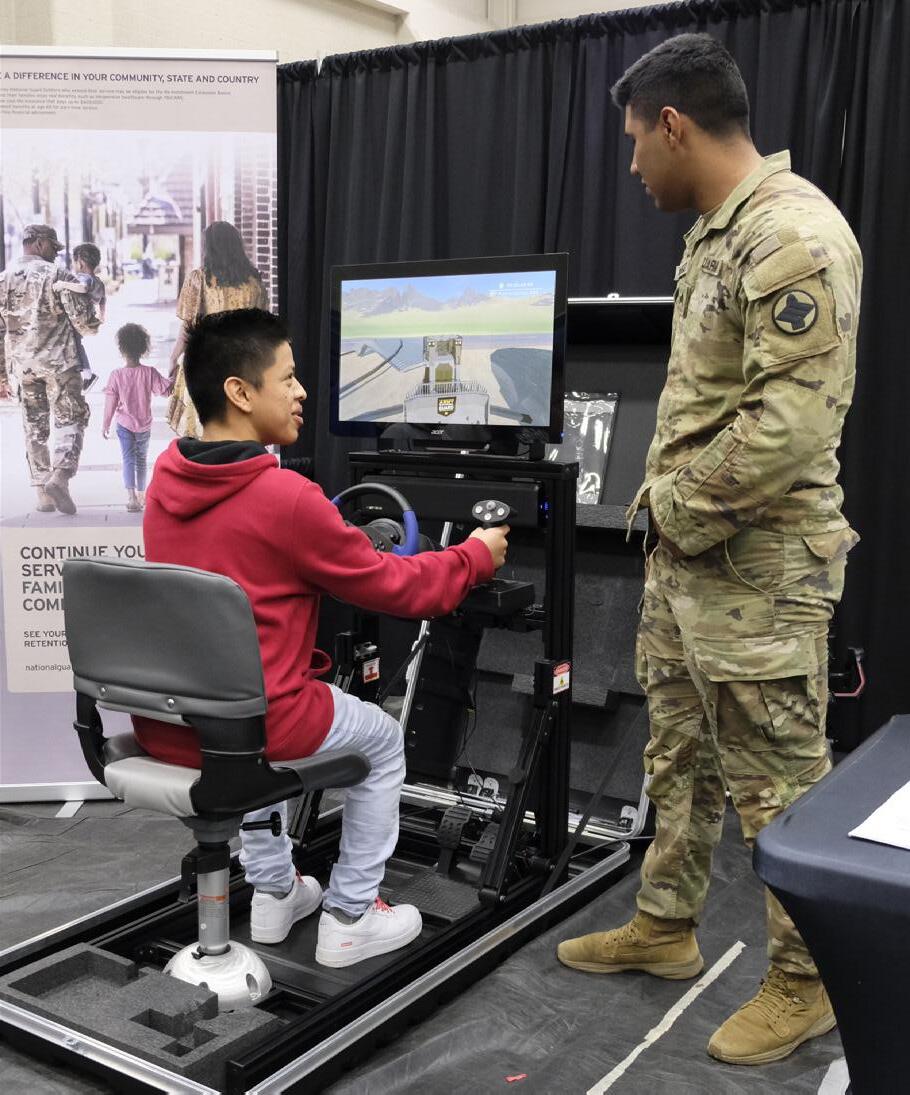
“We have a four-year apprenticeship program, and we train both carpenters and millwrights,” said Spradley. “For carpenters, we can teach anything from scaffolding to concrete forms to interior systems, which encompasses metal studs, drywall, ceiling grids and ceiling tiles, to how to read blueprints. We also have a medical aspect called ICRA, Infection Control Risk Assessment, where we can train our members, apprentices and journeymen to be able to go
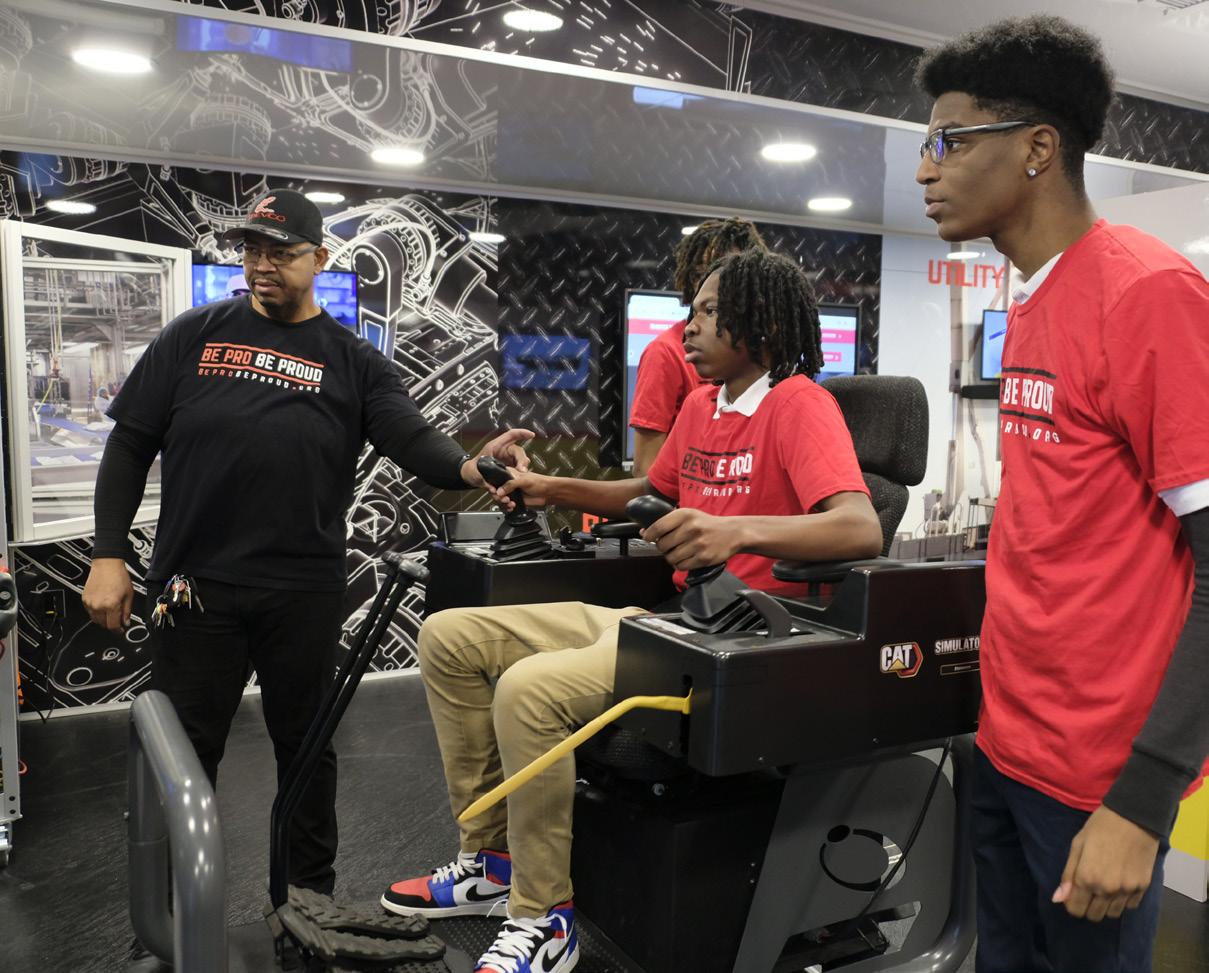
(Clockwise from top left) At Draft Day, students can visit company booths to find out more about what a career might entail; students from Watson Chapel operated a simulator on one of Be Pro’s mobile workshops; Gov. Sarah Sanders even tried her hand; the mobile workshops provide students the chance to get a taste of what it would be like to drive a truck, operate heavy machinery or perform many other jobs.
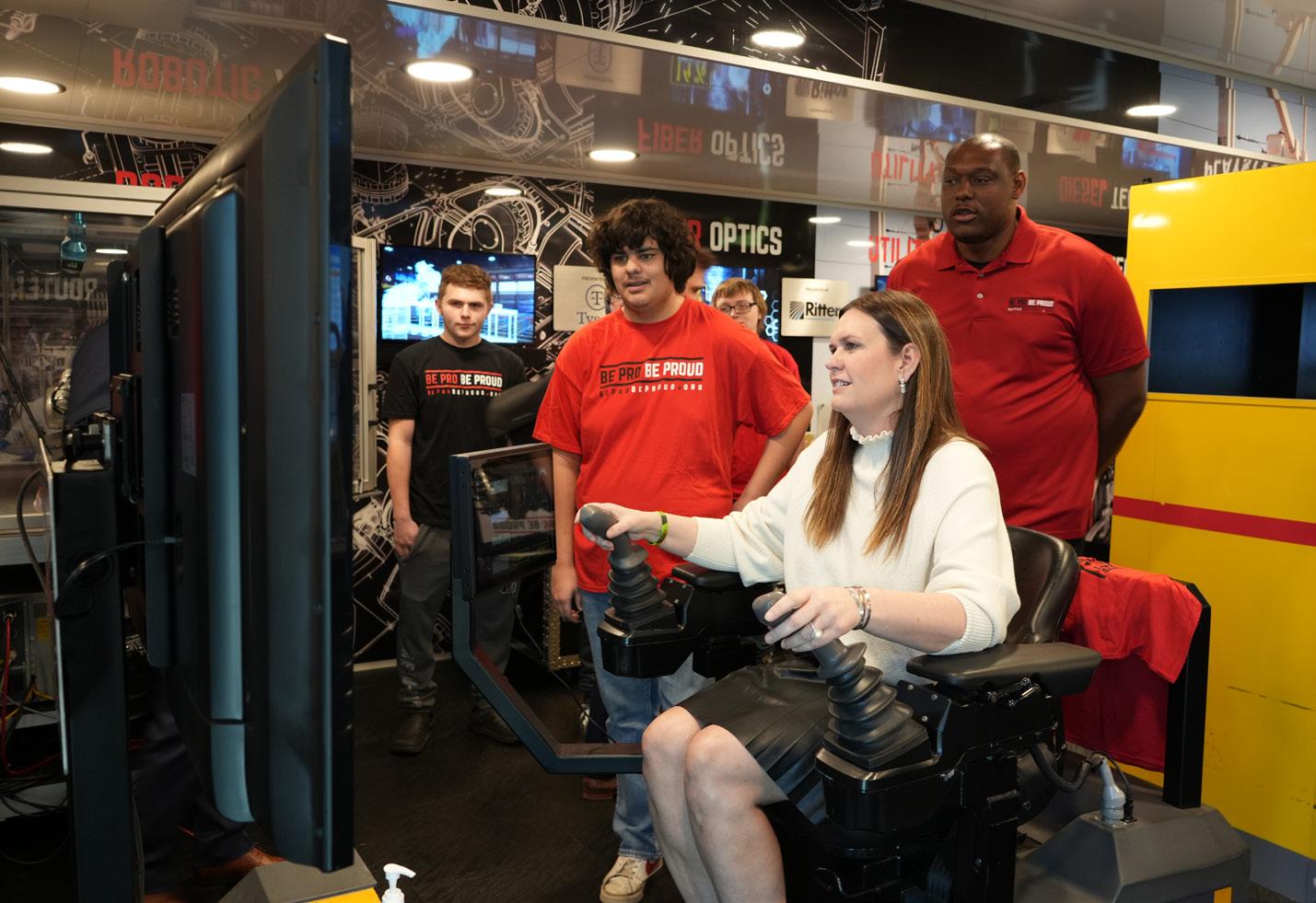
into a hospital and build containments during construction, ensuring minimal risk of infections, particulates and dust spreading throughout the facility.”
Just about anything a carpenter might need to know, the Russellville Training Center can teach, including OSHA safety standards, equipment training and first aid. Millwrights go through a similar program, learning how to weld, read blueprints and align or repair machinery used in everything from factories to nuclear power plants. The carpenter apprenticeship requires 576 classroom hours, with 800 for millwrights and a requirement of 5,200 work hours for both. Should one of the Regional Council’s 279 partner contractors require skills not covered by the standard apprenticeship, they can contact the training center to set up classes to teach them.
“I hate to say the word ‘train,’ because you train dogs, you educate people,” said Rick Halford, political director for the Southern States Region Council. “I like to call this an educational center, because we get them in here and educate them on the apprenticeship side, we educate them on the union side, teach them soft skills, educate them on their benefits and everything they need when they get out there.”
The Arkansas/Oklahoma Carpenters Apprenticeship is actively working to get people in the door, visiting career fairs, high schools and vocational technology centers. They also work with a UBC program called Career Connections, a curriculum that gives high school students a major head start in a carpentry career by providing firsthand experience before graduation, as well as teaching skills valued by employers such as teamwork, goal setting and taking the initiative. The UBC has even established training centers on some military bases, giving veterans a career path once they leave the military.
It’s clear that our society needs trade workers, but what incentive is there for an individual to choose a trade career? Beyond the simple satisfaction of a job well done, Halford and Spradley can vouch that it’s a well-rewarded career path.
“The average man hours per year per member in the 11 states in the Regional Council is 18,000. A 40-hour work week is 2,080 a year, but they’re working 18,000 hours a year,” Halford said. “A lot of that is overtime, so they’ll get paid time-and-a-half over 40 hours, depending on which contract, automatically time-and-ahalf on Saturdays in some places. There’s double-time on Sunday and holidays, so they make a good, substantial living. We have some apprentices that make over $100,000 a year; we’ve got some journeyman millwrights in certain areas that make over $200,000 a year.”
In addition to good pay, a worker with the UBC gets a suite
of benefits like health care, a pension and an annuity, none of which come out of the worker’s wages. They are also largely able to choose how much or how little they want to work, though there is a minimum number of hours required to qualify for health care. Another plus is the near-certainty of demand; the need for skilled professionals will not end anytime soon, and even if work happens to be slow in Arkansas at any point, UBC carpenters or millwrights can find work anywhere else in the nation and keep their benefits.
If starting a trade career is starting to sound appealing, but you aren’t quite sure, it’s worth remembering that no career has to be life-long.
“Trades are solid work, but I would remind people that the average number of jobs people have is 12,” Ross said. “So, over the course of our lifetime, we’re probably going to have 12 different jobs that are going to look a lot different. So, I would always encourage someone who’s going to decide to do a trade, consider perhaps taking some classes in the evening or during the day when they’re not working so they can go ahead and get that degree. Perhaps later in life, they may want to change directions and then they’re well prepared to do that.”
The other side of the coin can also be true: perhaps you’ve started down a different career path and found it wasn’t what you thought it would be. If you feel like the life of a trade worker is calling to you, it’s not too late to make that change.
Though there are far more organizations and programs in Arkansas dedicated to recruiting and training tradesmen than are listed here, the great shortage of workers is proof that more needs to be done.
“I think you’re going to see a push for more public-private partnerships, that is, government, private sector and educational institutions working together. That would help all of us understand our needs, and we can design programs specifically for industry requirements,” Ross said. “I think Arkansas is doing a really good job in supporting workforce development, but I would love to see more financial incentives for businesses that are participating in workforce development programs. Any grants or tax credits to encourage more investment in training and hiring local talent would help keep people in the River Valley.”
“The bottom line is, we’ve got to do this in order to give our kids and our grandkids the level of opportunity they deserve and the level of opportunity that is required to continue to be competitive on a global scale,” Zook said. “We’re in a global contest for economic development. And the countries, communities, states and the people who prepare and make the right kinds of choices are the ones that are going to prevail. And we want to make sure that’s us.”
“The bottom line is, we’ve got to do this in order to give our kids and our grandkids the level of opportunity they deserve and the level of opportunity that is required to continue to be competitive on a global scale.”
As far as watershed moments go, the COVID-19 pandemic seems to have triggered the biggest shakeup in work culture since Henry Ford decided to give the five-day, 40hour workweek a try.
What started as a public health measure has since become a permanent feature of the employment landscape, with Axios noting that more than a third of Americans worked from home on an average day in 2022. That’s down from a peak of 40 percent in 2021, but it’s still well clear of the 22 percent figure from a decade ago. The trend is especially clear for workers with college degrees, of whom some 54 percent work from home on an average day.
According to the most recent survey by the U.S. Bureau of Labor Statistics, Arkansas has more than 8,000 private-sector establishments where employees work remotely at least some of the time. While some businesses have rolled back their pandemic-era policies and returned to the office full time, others have embraced the hybrid or fully remote lifestyle. While approaches to policies, schedules and even the definition of “office” vary, a number of Arkansas companies have gained valuable insight into what works and what doesn’t in this new world of workfrom-anywhere.
******
At Little Rock-based insurance company USAble Life, about 70 of the company’s 500 employees were remote prior to the pandemic, according to President and CEO Richard Macy. When the pandemic hit, it marked a permanent change of course.
“We moved all the remaining jobs to remote status, and we’ve
been operating that way pretty much since,” said Macy. “Now we have people in 38 states. We give people a choice of whether they want to be fully remote, a hybrid schedule or work full-time in the office. Only a handful of people come in every day. A majority of people have chosen to be remote or largely hybrid.”
Macy admitted that prior to the shift, he leaned more on the side of in-office work. As time went on, however, he became convinced that the benefits of remote work outweighed his hesitations.
“I’ve realized, after doing new hire orientation [where] we have people in 10 different states on the call out of 14: these people have self-selected into this virtual environment,” he said. “More often than not, they’re saying ‘This is exactly what I signed up for, and you guys are doing it really well.’”
Macy also pointed to the advantages a remote work option gives to Arkansas employees who live farther away from USAble Life’s West Little Rock office.

“What a benefit for them that they don’t have to get dressed, shower, shave, perfume, whatever it is, sit in a car for 30, 45 minutes to come into the office and then repeat it on the way home,” he said. “And it’s usually the lower-paid people who have the longer commutes, and they [have] dual-income families, children, pets, dishes to wash, meals to cook. I think it’s just better, especially now that we have the tools that enable it.”
Those tools, such as Microsoft Teams, have played a crucial part in the company’s successful transition to a remote-first environment, whether for project tracking or building community.
“One of the bigger things that we did was make it mandatory
that employees’ cameras are on,” Macy said. “We’ve received pushback from that, but we’ve insisted and stuck to it.”
The mandatory camera requirement helped improve engagement between employees and build trust with those on the other end of business calls, he explained. There’s also the mentality aspect to consider; at least one employee made a point to thank Macy for the “cameras on” policy, because it made them prepare for each day and feel less isolated.
Macy is transparent about the challenges remote work does pose, and he encourages his management team to be open about its own struggles. Some have taken quickly to the new working style, while others have needed more time to adjust. The company has provided more training and support to that end, and managers are expected to make some kind of connection every day with their teams, whether that’s small talk about breakfast in the Teams chat or coming together to dig into the details of an upcoming project.
“I did have an employee once say to me – I think this was before the pandemic – ‘When you think of the company, you think of cubes and the office and the address, things like that. Why aren’t we thinking about the people?’ So we’re trying to think about the people, and how they interact in the abstract, without the office,” Macy said.
Macy also noted another change that has stood out among the rest: by and large, almost every employee is happier.
“I think it does vary by industry,” he said. “But people like working from home. So if you can make it work, I think you’re stronger.” ******
Insurance industry colleague Arkansas Blue Cross and Blue Shield has taken a similar approach, though with a few key differences made to suit the needs of their customers and employees. As the worst of the pandemic waned toward the end of 2021, the company made the decision to start bringing employees back to the office.
“Initially, there was some resistance to the prescribed office schedule,” said Max Greenwood, ABCBS vice president of government and media relations. “We held focus groups with employees and listened to their concerns, and that resulted in our decision to revise the scheduling to allow more flexibility for employees.”
Right now, 68 percent of the company’s employees are remote, with another 5 percent in the office full time. The remaining 27 percent follow a flex schedule, where they’re in the office two to three times a week. No matter their location, ABCBS employees have specific goals and deadlines to meet, and they have regular updates and discussions with leadership to keep track of their progress. The company has also created tools and offered training to support managers in strengthening their virtual leadership.
“When we first started remote work, it was obviously focused on keeping our employees healthy, but we have noticed some real benefits to this transition,” Greenwood said. “We have adapted to
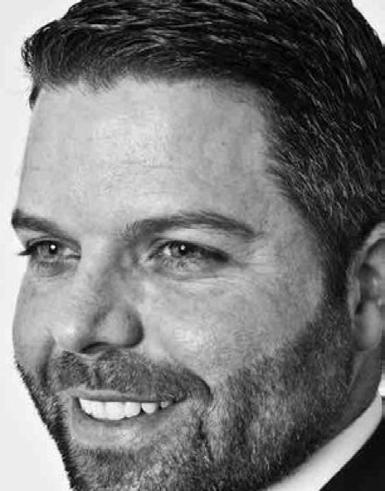
using online collaboration tools and have attracted employees from other states who are experts in their fields. We have been able to reduce our office space and redesign other spaces to be more collaborative. We have embraced virtual internal town halls and are more mindful of our time together.”
When it comes to learning curves in the new work environment, Greenwood cited familiar concerns over interactivity and building strong employee relationships. Open lines of communication between leaders and employees are imperative, she added, for tracking engagement and addressing issues as they arise.
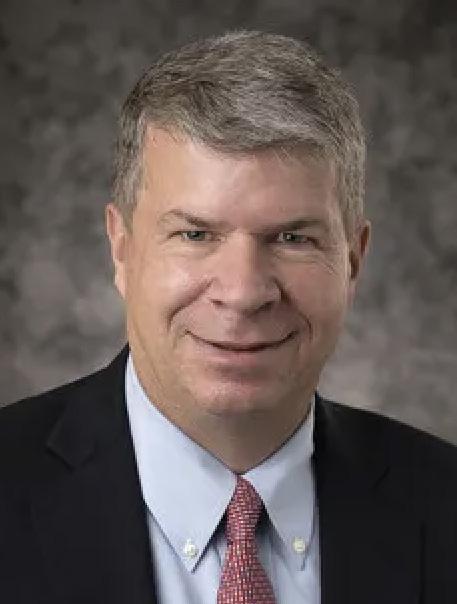
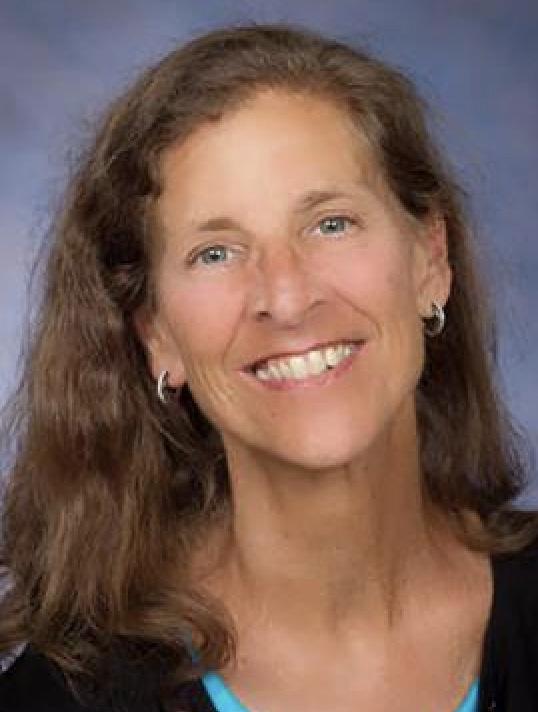
“Building a relationship with an employee you only see remotely is harder, but it can be done. And sometimes, employees need and want to return to the office to work closer with their leaders and colleagues,” Greenwood said. “We have really focused on offering transparency, intentional team building and rewarding and recognizing employees when productive and model behaviors are demonstrated.”
For some companies, the pandemic presented a unique opportunity not just to lean into remote and hybrid work options, but to rethink what it means to work “in-office” entirely. For Little Rock marketing firm MHP/Team SI, those new insights were built on good foresight.
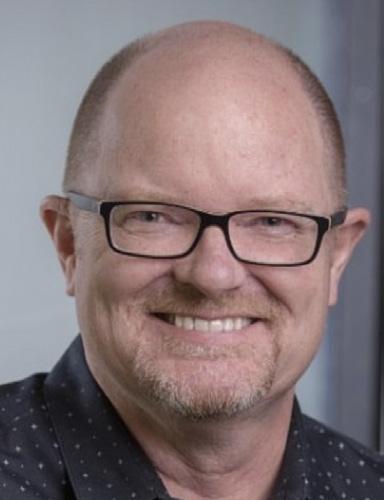
Thanks to employee feedback and market research, the company had begun implementing new technologies for streamlining remote work even before the pandemic. As a result, MHP was among the first businesses to go fully remote at the cusp of the pandemic, and the smooth transition helped the firm hit the ground running when it came to serving clients through the uncertain lockdown period.
Once employees were able to return to the office, MHP leadership began to pull lessons from the experience, taking a closer look at how much work could still be done effectively from home. That resulted in a hybrid setup that would retain the positives from both in-person and remote work.
“I began to really kind of embrace the idea myself,” said David Rainwater, principal at MHP/Team SI. “I think there are certain things that, in the remote work environment, are just as effective. But then there are certain things that are not. I think there’s a real need to be around other people to be able to collaborate on things. I’ve kind of grown to love the hybrid schedule.”
Not content with a hybrid schedule alone, however, the team soon began mulling over an even more ambitious project. Con-
versations between leadership, employees and clients made it clear that a new, more creative space was in order, one uniquely suited to the aspects of the job that could not be done from home.
“The business that we’re in is the idea business. Ideas don’t often come from real structured, Zoom-type meetings,” Rainwater said. “We know that there are still certain times where you really just need to be able to sit across the desk from somebody and have a conversation.”
MHP set out to build a workspace that reflected this culture: out went the cubicles, and in came the coworking space. One business model in particular provided some inspiration for the new design.
“One of our favorite spaces happened to be the Onyx Coffee Lab in Rogers,” Rainwater said. “We began to sort of explore and examine what that space did in terms of how it facilitated communication, how it facilitated people working together, and we developed our office concept in alignment with what Onyx had already done.”
MHP went entirely remote in December of 2022 while the Little Rock renovation took place. When employees returned, the standard office fare had been replaced with couches and living room-style chairs, varying sizes of team tables and new meeting spaces – even an overhauled front desk area with a full coffee bar to drive the point home.
“It was a completely different environment. They had to go find their spot,” he said. “Where was their group going to be? How were they going to interact? Within a day or two, everybody was at home. It was great.”
For employees who prefer the structure of a fully in-office schedule, there are a few workspaces assigned to those willing to come in four days a week. But the company hasn’t had problems convincing people to show up in any case, even when they don’t have to. The reimagined space has inspired more face-to-face interactions as employees frequently stop by for a few hours of work and a cup of coffee with teammates.
The office revamp has been surprising in other ways as well. Rainwater expected to see a strong pattern of older employees preferring the in-office style they were used to, while younger employees would leap at the chance to work from home. Instead, there’s been a more balanced split: a good number of the younger team members have opted for more time in-office, and some of the veterans have relished the distraction-free home environment.
While the new setup has been a huge success, Rainwater and the rest of the team at MHP will continue listening to feedback when it comes to the best ways to work and work together.
“I made a presentation to our staff back in November about the change that was going to come to the office space, and it was all predicated on this idea that our corporate slogan is ‘Innovation lives here.’ This is a physical manifestation of that,” Rainwater said. “Anything that we can do to help facilitate an environment where people can create, where they have big ideas, where they can innovate, that’s what we should do. We should always be looking for more ways to do that.” ******
Of course, not every company or industry is suited to a remote or even mostly remote work environment. In those situations, guidelines tailored to the specific demands of the workforce can
go a long way. Travis Guidry, senior manager of HR program management and work location flexibility policy SME at Entergy, explained how the utility company is threading that needle.
“As a regulated utility, there are many plant and field roles that simply cannot work remotely due to the onsite nature of their work, “Guidry said. “For all other positions, we decided to adopt a balanced approach to post-pandemic telecommuting.”
Because of the company’s broad operational footprint, many employees were used to being spread out across multiple locations. Still, working and managing others from home during the pandemic was a new experience, and there were initial concerns about whether teams would be able to maintain optimal performance.
“Although employees had to adjust to finding an ideal space to work within their homes, we soon began receiving feedback across the company that employees were taking on more and outperforming expectations,” Guidry said. “This led to a call from employees to shift to a more flexible schedule on a more permanent basis.”
The company is avoiding a one-size-fits-all approach, instead letting the needs of the team dictate whether a given position is onsite, hybrid or remote. Currently, that shakes out to about 70 percent of Entergy employees working onsite, with 25 percent having a hybrid schedule and less than 5 percent working fully remotely.
Even for a position that is fully remote, teams are expected to come together for specific meetings or special projects as needed. Certain teams have also made it a requirement that new employees start work in person before transitioning to the hybrid setup, especially for roles where apprenticeship and mentoring are key to learning the ropes.
“It is expected that deadlines are met and wins are being put on the board for every position, regardless of onsite, hybrid or remote,” Guidry added. “We did, however, provide leaders with tools to set norms at the business and department level when the policy was launched to ensure that expectations are clear and employees are accountable.”
There is a necessary level of trust that comes with the territory, he added, and many managers have had to transition away from the mindset of needing to physically see their employees at work to believe they’re getting the job done. And on a structural level, the fundamentals of the work have stayed the same. The tenets of a good leader, as well as what is expected of that leader, remain consistent whether managing onsite, hybrid or remote employees, Guidry said.
All things considered, Entergy’s approach has allowed it to stay at the forefront of a competitive labor market, and having diverse perspectives across multiple locations ultimately helps the company better serve its customers. It also provides benefits not just to employees, but to communities and owners as well, in everything from reduced carbon emissions caused by commuting to lower real estate expenses.
“Don’t set out trying to ‘boil the ocean’ and solve every potential exception or problem,” Guidry said. “Aim to do what is best for the company mission and the majority of employees. Put clear guardrails in place and consult with leadership early on and frequently throughout the process.”
There have been any number of terms used to describe the current labor crunch in Arkansas, and with current statistics being what they are, economists can now apply another descriptor: historic.
No matter how you slice it, Arkansas is in uncharted water when it comes to its unemployment rate. On July 26, the St. Louis Fed reported unemployment in the state had fallen to 2.6 percent in June, the third straight month of decline after falling below 3 percent for the first time ever in April. The state’s unemployment rate is a full percentage point lower than the national average, about as much as the rate has dropped in just the first six months of the year.
While on the one hand, it’s decidedly positive news that so many in Arkansas are gainfully employed, the inches-deep labor pool presents steep challenges for companies in the state looking to grow after reeling from COVID, supply chain and inflationary blows over the past three years.
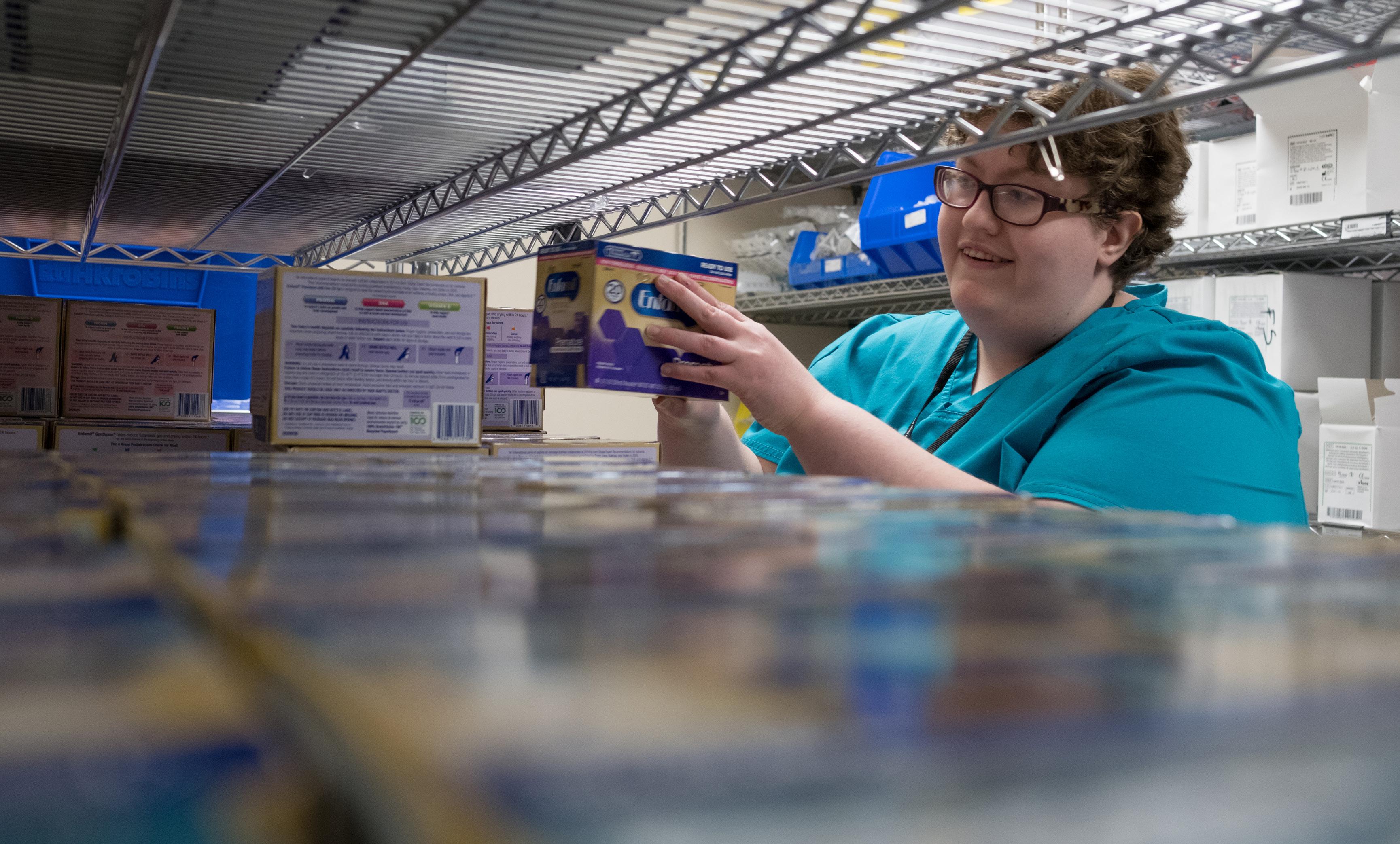
Employment in Arkansas increased by more than 4,200 month-over-month, per the Bureau of Labor Statistics, while the labor force grew by only about 2,900, demonstrating how job creation is outpacing the available bodies needed to fill them.
Yet there are many individuals that still go overlooked by companies. Individuals with disabilities, immigrants and the formerly incarcerated have long been on the fringes of the hiring mainstream, either due to mistrust of past deeds, language and culture barriers or because of stereotypical thinking about what accommodations are needed to put such individuals to work.
According to Restore Hope Arkansas, a Little Rock-based organization formed to help individuals move successfully from incarceration back into to society, the state averages between 8,000 and 8,500 individuals released from state incarceration annually. Half of these individuals reenter society in Arkansas without full time employment.
“We served 2,932 parents statewide in the last 12 months and 78 percent of those are moms and 22 percent are dads,” said Karen Phillips, Restore Hope’s associate director, community development, who is based in Fort Smith. “These all have children under the age of 18 and 48 percent, when they come in to meet with us, have no income from any source. The issues they’re facing are difficult, like 31 percent of them having been convicted of a felony at some point in time. That does cause inability to obtain employment, especially the type of employment that a parent needs that would work well with parenting young children.”
Contrary to popular belief, there are relatively few jobs that are closed to people by state or federal law strictly based on one’s criminal record, particularly nonviolent offenses. But where those restrictions do exist, they present another hurdle to people looking to get back into the labor force.
“There are some statutes that keep parents from being able to access certain types of employment after they’ve been convicted of a felony, or even a misdemeanor,” Phillips said. “There are tons of misdemeanor charges that keep people from being employed, such as childcare. A lot of these moms have little ones,
so they want to work in the childcare field. I believe it’s three years, if you’ve been convicted of certain types of misdemeanors, where you’re not allowed to work in childcare. I have a mama that was doing amazing and that came up. So, she was no longer allowed to work there.”
Past that, most restrictions in hiring based on background are more often a company policy as opposed to a legal matter, meaning most companies can exercise their own judgement when considering felons for job openings. And more companies are doing just that, including corporate bell cows Google, Lowe’s and Arkansas’ own Tyson Foods. In fact, Tyson’s employment application doesn’t even inquire about prior convictions.
“[These individuals are] rehabilitated; they’ve recovered from a lot of past issues, and they just want to support their families. And they do work hard,” said Phillips. “It’s not that they don’t want to work hard. I have seen parents benefit greatly from employers removing some of those barriers that they used to have and saying that they will hire people with certain types of felonies.”
Such is not to say that bringing the formerly incarcerated on board will be exactly like any other applicant. Ex-cons commonly face challenges other employees don’t such as reliable transportation or court dates or probation requirements they must meet to remain on the outside. Challenges related to children can also be more acute for a family trying to reunite after a parent’s time in the system.
“If there’s not any flexibility in the hours and I can’t get my kids to school in the morning, or at least get them to the bus stop and then go in, then that’s a problem,” Phillips said. “I think that a lot of it has to do with keeping in mind how life works for the people that you’re trying to get hired and the things that they’re trying to overcome. Most can’t just call Mom to come watch the kids.
“Another piece of the flexibility is they almost always have regular parole probation meetings that they have to go to, and then they have court that they have to go to, and then they have to stop in for
a drug test every week, which is as good thing. If you’re an employer, you would probably be like, ‘yay, they’re getting drug tested every single week.’ But they have no choice in having to do all this. They have to be able to go to those meetings or they’re absconding.”
Communities also have an important role to play in the successful reentry of former inmates by breaking down barriers between service agencies. Such is the mission of Restore Hope’s 100 Families Initiative, which helps communities identify bottlenecks that complicate access to needed services. Through this program, city stakeholders work together to help provide a single point of contact from which an individual can access multiple agencies and service providers.
The results of these efforts at both the company and municipal level have been impressive. Where it’s been deployed, the 100 Families Initiative has cut recidivism, reunited children in foster care with their parents, and boosted employment among former inmates at rates well ahead of state and national averages.
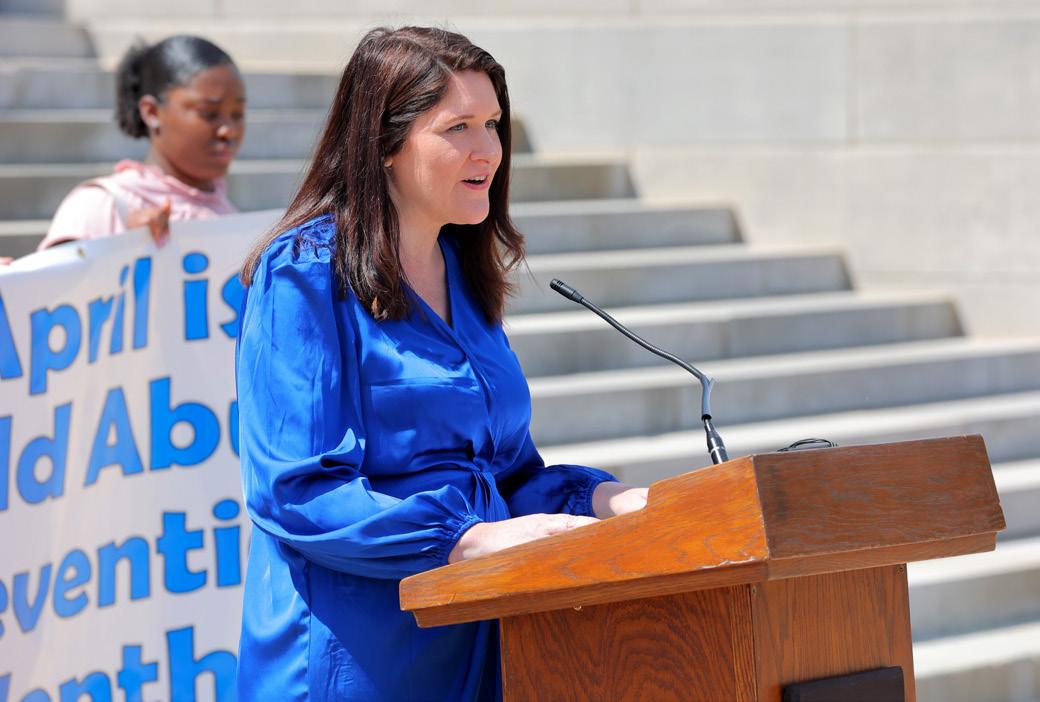
Companies that have gone to the time and effort to adjust to the needs of this employee pool have also benefited. As the Second Chance Business Coalition noted, 85 percent of human resources leaders and 81 percent of business leaders report people with criminal records perform the same as, or better than, employees without criminal records. Similarly, the Society for Human Resource Management reported employers as describing employees with criminal records as strongly motivated, highly dedicated and long tenured.
“These folks want to be good employees,” Phillips said. “I’ve definitely seen more flexibility on the part of employers, and we have more people that are able to get employed because of that. If companies can look beyond some past felony charge, it makes such a huge difference in these people’s lives.”
Imagine being a hiring manager and having access to a potential labor pool that not only numbers in the millions nationwide, but that data has shown to bring substantial gains in productivity, shareholder value and profitability. That’s exactly what Americans with disabilities offer for employers.
According to a national study by Accenture, this employee demographic checks all the boxes that any company could want. Those companies that have welcomed such workers — what Accenture called “disability inclusion champions” — have reaped substantial benefits including 72 percent more productivity, 30 percent higher profit margins and a whopping 200 percent higher net income, to say nothing of brand enhancement as a truly inclusive workplace.
Yet despite numbering 15.1 million people of working age in the U.S., only a fraction of this pool participated in the workforce in 2018 — Accenture reported it as 29 percent; the Bureau of Labor Statistics claims it’s closer to 19 percent — compared to 75 percent of American workers without a disability. And the unemployment rate for individuals with disabilities is roughly twice as high as the able-bodied, at 9.2 percent versus 4.2 percent, respectively, per Accenture.
One of the leading hesitancies by employers to hire a disabled worker stems from the belief it would require extensive and costly accommodations to do so. However, a recent study by Job Accommodation Network, a service of the U.S. De-
partment of Labor’s Office of Disability Employment Policy, debunked such fears. Survey respondents reported nearly 60 percent of accommodations cost absolutely nothing to make, while the rest typically cost only about $500 per affected employee.
Access Academy of Little Rock has been changing minds about the employability of people with disabilities for years, one company, one employee at a time. Its adult programs include a variety of job training curriculums that have helped many clients find their way into meaningful employment and greater independence.
“Our young adults tend to stay on the job for a long period of time,” said Jenny Adams, director of adult services. “One of our big goals is finding the right job match; we don’t just find a job to find a job, that isn’t the point of our program. We try to find the right job match, one that our young adults enjoy and fits their ability levels and their interest level, because we want them to stay in that position for longevity.
“As a result, we have young adults who are celebrating 10 years on the job, and they are just as happy 10 years later as they were on the first day on the job. We even have some graduates who have been so successful at their job that they now mentor others in their department, in a leadership position. It’s really come full circle in that sense.”
Access offers multiple programs that address job skills and employability. One, Project Search, matches participants with local businesses through internships. Typically utilizing the hospital setting, the intern gets to learn and experience different departments during the course of their experience. To date, the program has graduated 400 over the last decade, with current cohorts numbering about 80 individuals.
The program, which is active in Fort Smith, Jonesboro, Hot Springs, Pine Bluff and Camden as well as Little Rock, has been enormously successful. Adams said 93 percent of graduates find and hold a job, thanks to the internship’s real-world training and ongoing support from the organization. Clients can receive additional job readiness training as needed through the organization’s AccessLife campusbased program.
“After [Project Search participants] graduate in May, we work to help them find employment in the community, based on the skill set that they’ve learned,” Adams said. “The majority of them find work in the community and then our job shifts to provide what’s called follow-along or employment support. We go with them and help them during orientation and then we help them learn their new job.”
Adams said companies that are new to the program tend to have certain trepidation that comes from inexperience being around people with disabilities in a workplace. Access over-
comes these objections by helping to create common understanding between the potential employer and the job applicant.
“We are very open from the beginning, which I think is helpful,” Adams said. “From the first moment of the interview, we introduce ourselves as Project Search and that this is a young adult with a disability. Another thing is, we help the young adult by giving them the chance to talk about themselves. It’s important for them to be able to advocate for themselves and what their strengths are and what their needs are. I think that helps set things up for success with the employers.”
Access also plays an active role in educating employers on the myths versus the realities of adding individuals with disabilities to their workforce. She said while some accommodation may be needed, it’s usually not as extensive as people expect.
“What’s really helpful is that our staff is onsite when the young adult starts the job, and they act as a job coach who works sideby-side with them,” she said. “We know the young adult well, we know what their needs are and we’re standing next to them as they start the job.
“We’re also able to see when accommodations are needed, and we can help communicate to supervisors what those needs are. They’re typically small things, such as maybe extra time to complete a task or an anti-fatigue mat to stand on. Or it could be the task just may not be the right task for them and so we explore if there are different areas that might be a better fit. Typically, employers are very willing to try something different.”
Adams said the graduates of the program have found a place in a variety of work settings, from hospitality and hospitals to fulfillment and distribution centers. She said with a little bit of vision and flexibility on the employer’s part, most employees adapt and do very well in employment, so much so that the program has become a model for other organizations across the country and internationally.
“Some employers are used to saying, ‘I want it this way, exactly this way, every time,’ because that’s what they expect of their other employees,” she said. “What they realize is, if they allow a little bit of flexibility something really great can happen. Some employers, they hire their first young adult from us and then they call back and say, ‘Do you have anyone else that we could hire?’ And they are more than willing to make the accommodations that they need, because that creates an employee that is valuable to their company.
“Employers who are willing to be a little flexible find an employee that’s really wonderful; one who will show up every day, on time, with a smile on their face and be happy to do what they do.”
For more information about community-based programming serving the formerly incarcerated, contact Restore Hope Arkansas (RestoreHopeAR.org). For more information on Project Search and other vocational programs, contact Access (AccessGroupInc.org).
“We served 2,932 parents statewide in the last 12 months and 78 percent of those are moms and 22 percent are dads.”
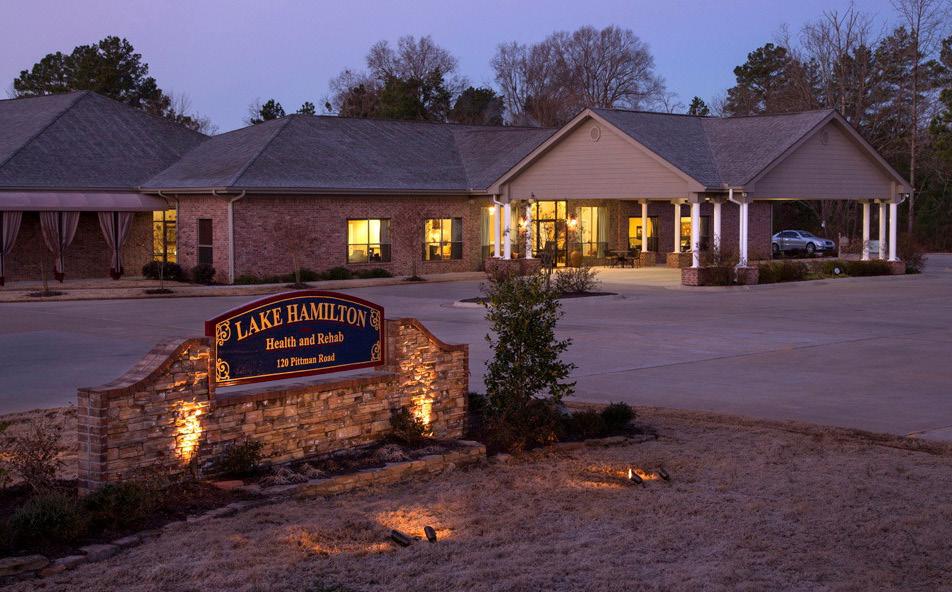

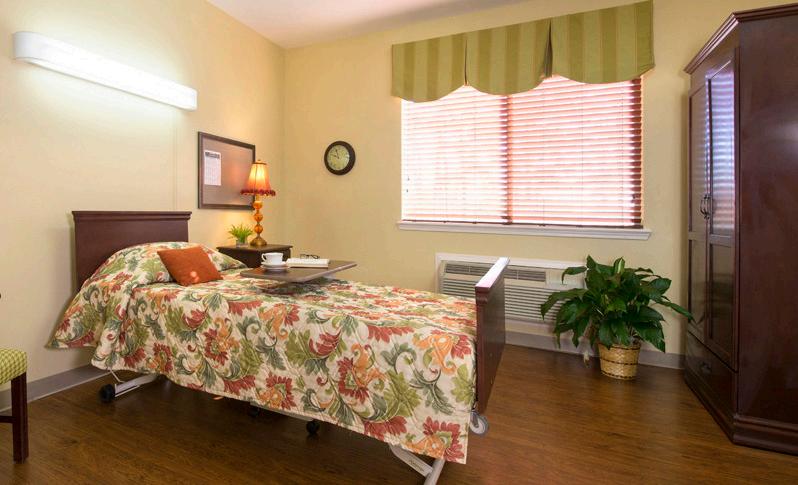

Whether it’s in relation to Greek life, college athletics or finding a job, the process of recruiting is an essential aspect to bringing any group of people together. In 2023, recruiting athletes to a Division 1 school is essentially a fulltime gig, taking place year-round except for dead periods and NCAA-mandated breaks from the process.
In the workforce, career recruitment mimics the athletic process, with resumes collected nonstop and talent acquisition emerging as an industry itself.
On the surface, recruiting college athletes to campus may not seem the same as recruiting employees to the corporate world, but there are many similarities. In the case of recruiting an athlete, coaches are looking for coachable talent and academically minded athletes who
will add to the success of their program. The main goal for college coaches is to form a team, the members of which work well together and can succeed at a high level.
In the corporate world, recruiting talent boils down to the same thing — getting the best people and placing them in positions to “win,” ultimately benefiting the “team.”
According to Next College Student Athletes (NCSA), most colleges recruit similarly across all sports, generally following the same five-step process:
No. 1 — finding a list of prospective athletes who meet basic requirements
No. 2 — sending out recruiting letters, questionnaires and camp invites to prospects
No. 3 — conducting in-depth academic and character evaluations of recruits
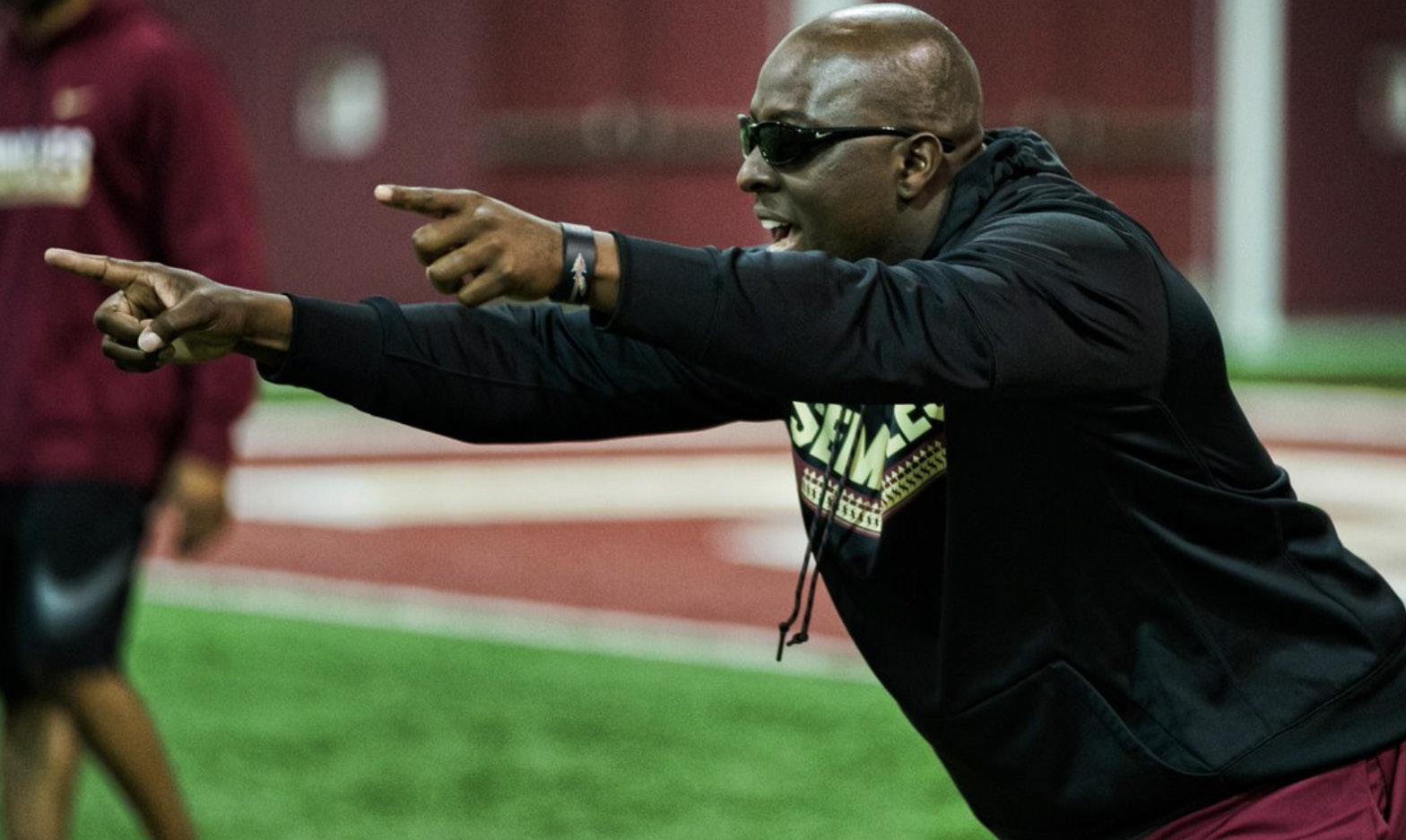
No. 4 — extending scholarship offers
No. 5 — signing athletes after ensuring academic eligibility is a good fit for the school
For athletes, the recruitment process may take place over several years. In corporate recruiting, the process is sped up significantly, leaving less time for research and more time to wow potential employees.
According to the World Economic Forum’s Future of Jobs Report 2023, the second-most popular roles from 2018-2022 were human resources and talent acquisition roles, which both relate heavily to talent acquisition and recruitment. The
• Talent progression and promotion processes
• Higher wages
• Effective reskilling and upskilling
• Positions that articulate purpose and impact
• Remote and hybrid work opportunities
• Internal communication strategies
• More diversity, equity and inclusion programs
Jobs Report also showed that in 2023, 81 percent of companies are investing in learning and on-the-job training as a key strategy in talent acquisition and retention. As much as D1 coaches in Arkansas are looking for academically minded players, corporations and job seekers are also passionate about continuing-education opportunities.
And, according to the Jobs Report, prospective hirees today are looking for the following:
• Support for employee health and well-being
• Improved working hours and overtime
• Safety in the workplace
• Less emphasis on degree requirements and more skill based hiring
• Supplemented childcare for working parents
• Jobs that support worker representation
The World Economic Forum predicts that between 2023 and 2027, these practices will represent the best way to attract talent. The Harvard Business Review reports that corporate recruiters now are hiring more on potential rather than experience, a practice not unheard of when it comes to college coaches. For those on the Division 1 level, recruiting essentially is a year-long practice, and coaches have to adopt a mindset similar to that of corporate recruiters.
“I believe the way we recruit can translate to any profession. We recruit off personality and fit before we recruit off talent,” said Nathan Brown, head football coach at the University of Central Arkansas. “If we sign young men that fit our program culture, we believe we can have success. This is something that any organization can use when hiring people for their departments.”
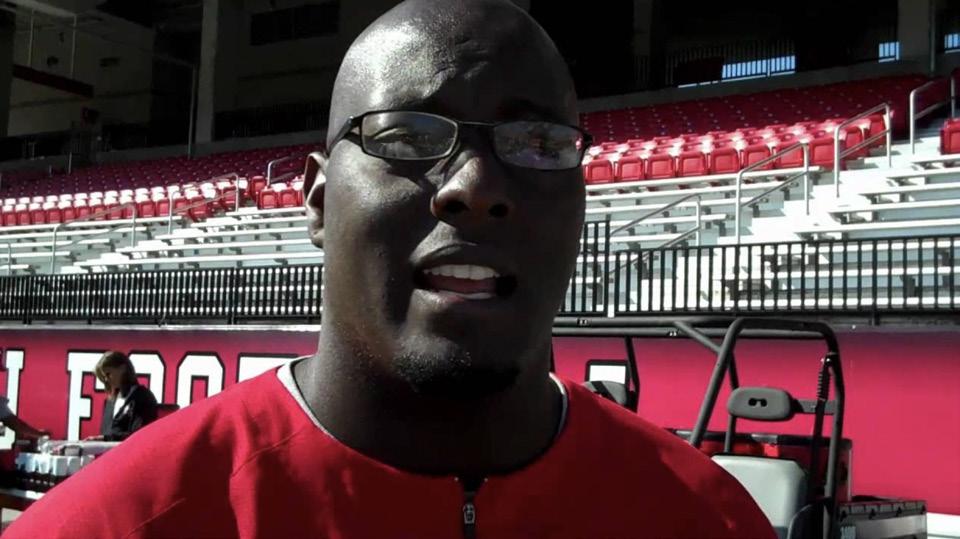
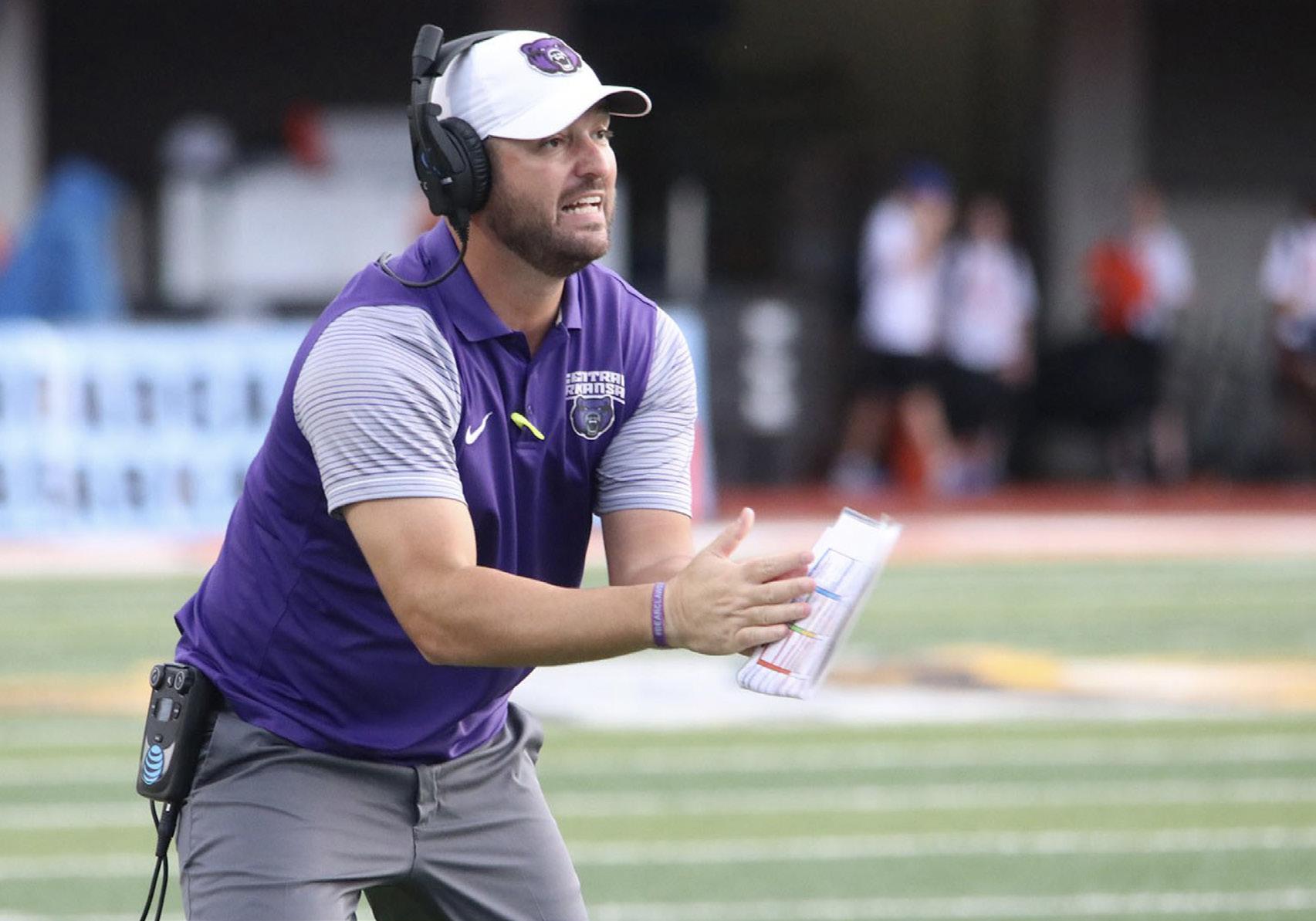 UCA’s Nathan Brown
UAPB’s Alonzo Hampton
UCA’s Nathan Brown
UAPB’s Alonzo Hampton
Other D1 coaches in Arkansas say recruitment strategies are generally the same. If they were to offer corporate recruiters any advice, it would be to remain realistic with prospective team members; gather as much information as possible, understanding that prospects are doing the same; check within one’s shared networks for connections; and look for evidence of culture fit.
And in today’s competitive world, it’s important not to narrow a search so much that you miss out on great hires.
“There are a lot of talented kids who seem to stay at the same level they were at when you first became aware of them,” Brown said. “In our program, we want to look for people who are seeking opportunities to improve their skills, no matter what level they are currently at.”
Brown is a firm believer in wanting to see prospective student athletes aim to achieve more than they have already successfully accomplished. For many hiring and recruiting managers, it is important to not immediately rule out those from different career backgrounds, but to look at what prospective hirees can offer in terms of experience.
Mike Neighbors, head women’s basketball coach at the University of Arkansas, is entering his seventh year leading the Razorbacks and his 10th as a head coach. The most important thing in recruiting, he said, is to show prospective athletes or employees the reality of the situation.
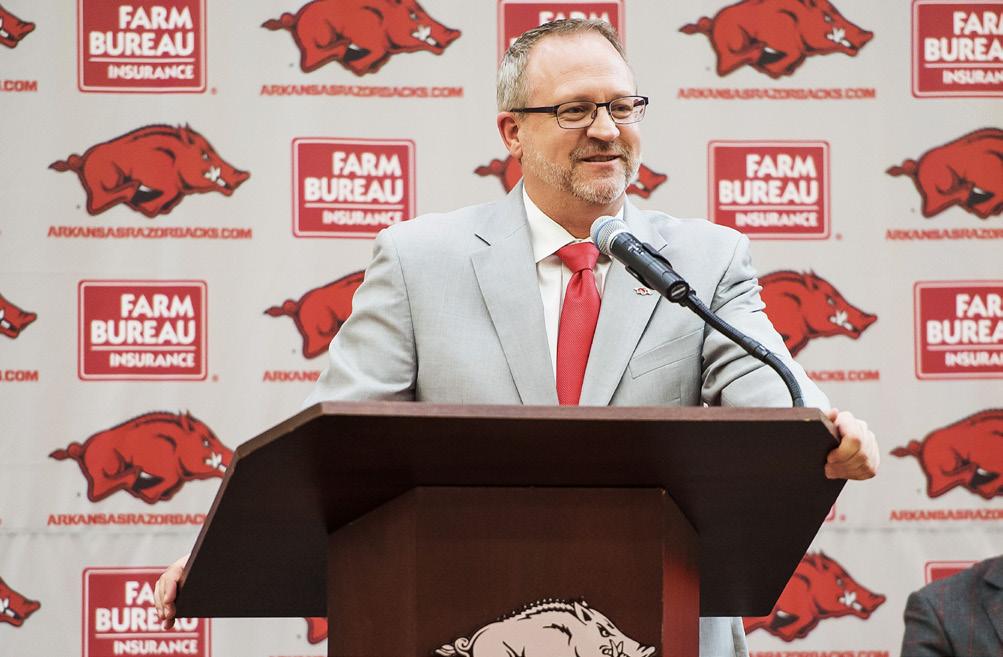

“We don’t roll out the red carpet when prospective athletes visit, we don’t put on a 48-hour facade,” he said. “We show them the actuality of being a student athlete in the program with no tricks, just evidence. We want them to know what their living arrangements would likely be, where they would actually eat on campus, what it would be like to have practice and then take a test.”
Neighbors attributes this philosophy to his program’s low player turnover. Showing prospective employees what their job would be like, or players their roles, results in a higher level of respect from both sides. And there is no bait and switch in the Razorback program, something that could apply to the corporate world, he said.
Just as job searchers are doing their homework on prospective employers, athletes looking to play at the next level are doing the same with prospective schools.
According to University of Arkansas at Pine Bluff head football coach Alonzo Hampton, this process is standard, and every person who plays a role in recruiting at a high level will likely be looking for the same thing: high character.
“During the recruiting process, we check with the community, we talk to their teachers, position coaches, we search for their social media, we are looking to ensure there won’t be liability with adding the recruit to our roster,” Hampton said, explaining that background research is often one of the most important parts of the process.
A University of Idaho study found that job seekers’ attitudes toward prospective employers could be impacted by the appearance of their social media accounts. More specifically, corporate Facebook and LinkedIn accounts seemed to make the most difference for those applying to vacant positions. High character may be a major factor in the hiring process for businesses, but it goes both ways.
“You can tell people all day what you can offer them, but you’ll get farther by actually showing them,” Neighbors said
Arkansas is known as a state that knows how to do business. Whether the subject is Fortune 500 mainstays or hometown businesses that fuel local economies, Arkansas is pro-business.

In this month’s issue, Arkansas Money & Politics highlights a special sales section dedicated to some of the state’s most distinguished businesses, our 2023 Companies of Distinction.

Since 1999, Elder Independence Home Care in Bryant has been committed to the dignity of the elderly. Elder Independence makes some of the tough decisions easier by providing high-quality, affordable home care services, allowing clients to continue living in the comfort and safety of their own homes.
Elder Independence aids clients with non-medical personal care, companionship, light housekeeping, meal preparation, medication services and other acts of service to help them feel respected and cared for. A client’s individual needs are carefully assessed, understood and met through the selective assignment of qualified and compassionate caregivers.
Under the ownership and guidance of Kim Clatworthy since 2014, Elder Independence has solidified its place as the care provider of choice for elderly Arkansans. In the coming years, Clatworthy hopes to see the company expand further throughout the state and ensure that no elderly individual goes without the opportunity to be cared for.
One of the greatest strengths of Elder Independence is that they are not a franchise company. This allows the team at Elder Independence to provide more personalized care than many of their competitors. Caregivers will always show loved ones and family members the same level of quality care and compassion that they would expect for their own.
While it might seem like a high bar to some, excellent elder care is second nature to the staff at Elder Independence. With a dedicated team and a track record of exceptional service, the choice for families and their loved ones is simple.
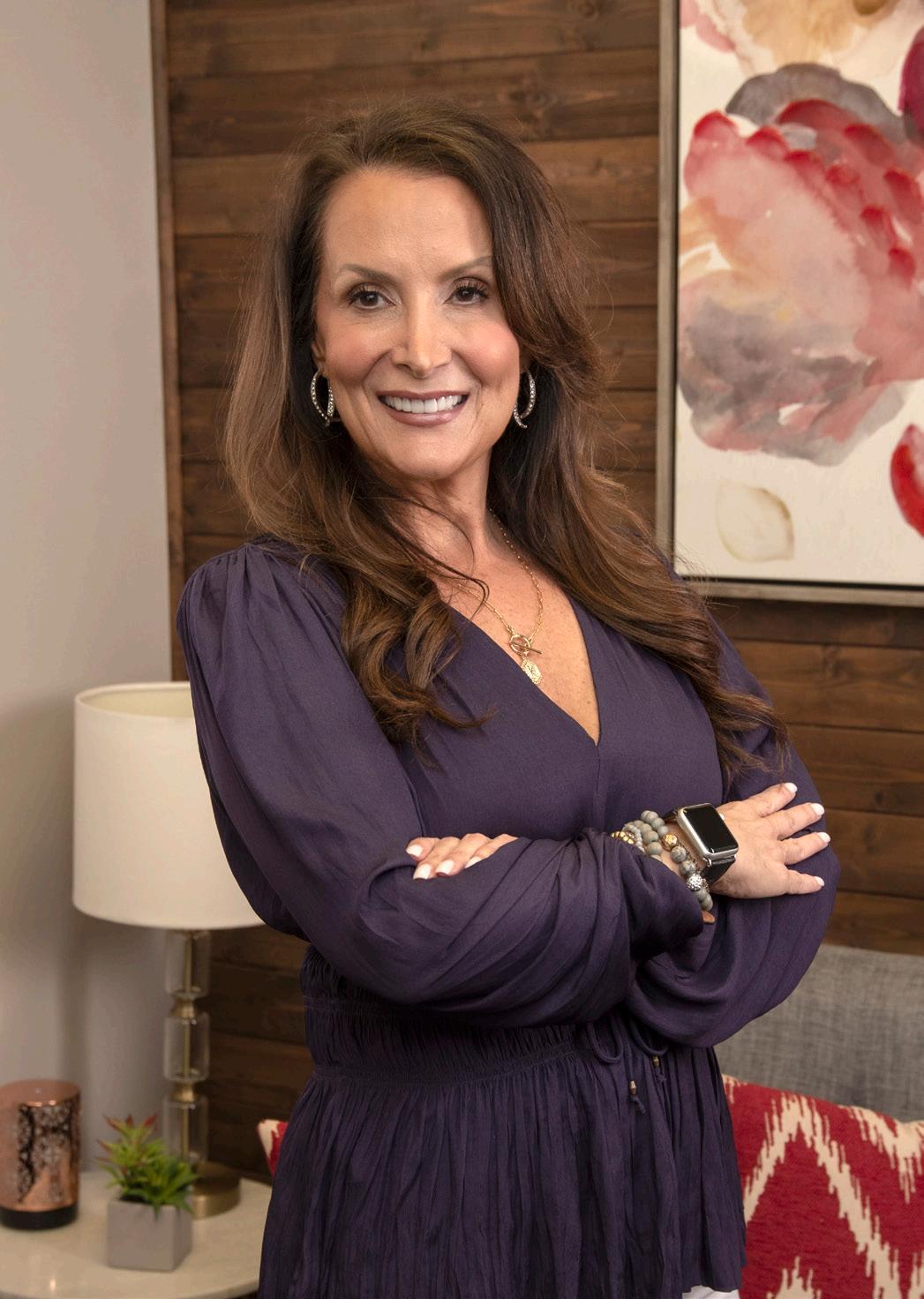
Montgomery “Monty” Heathman, DDS is the founder and owner of Heathman Family Dental in Little Rock and The Dental Clinic at Stuttgart. Heathman has been serving families in Arkansas for over 22 years, and his commitment to excellence keeps patients coming back.
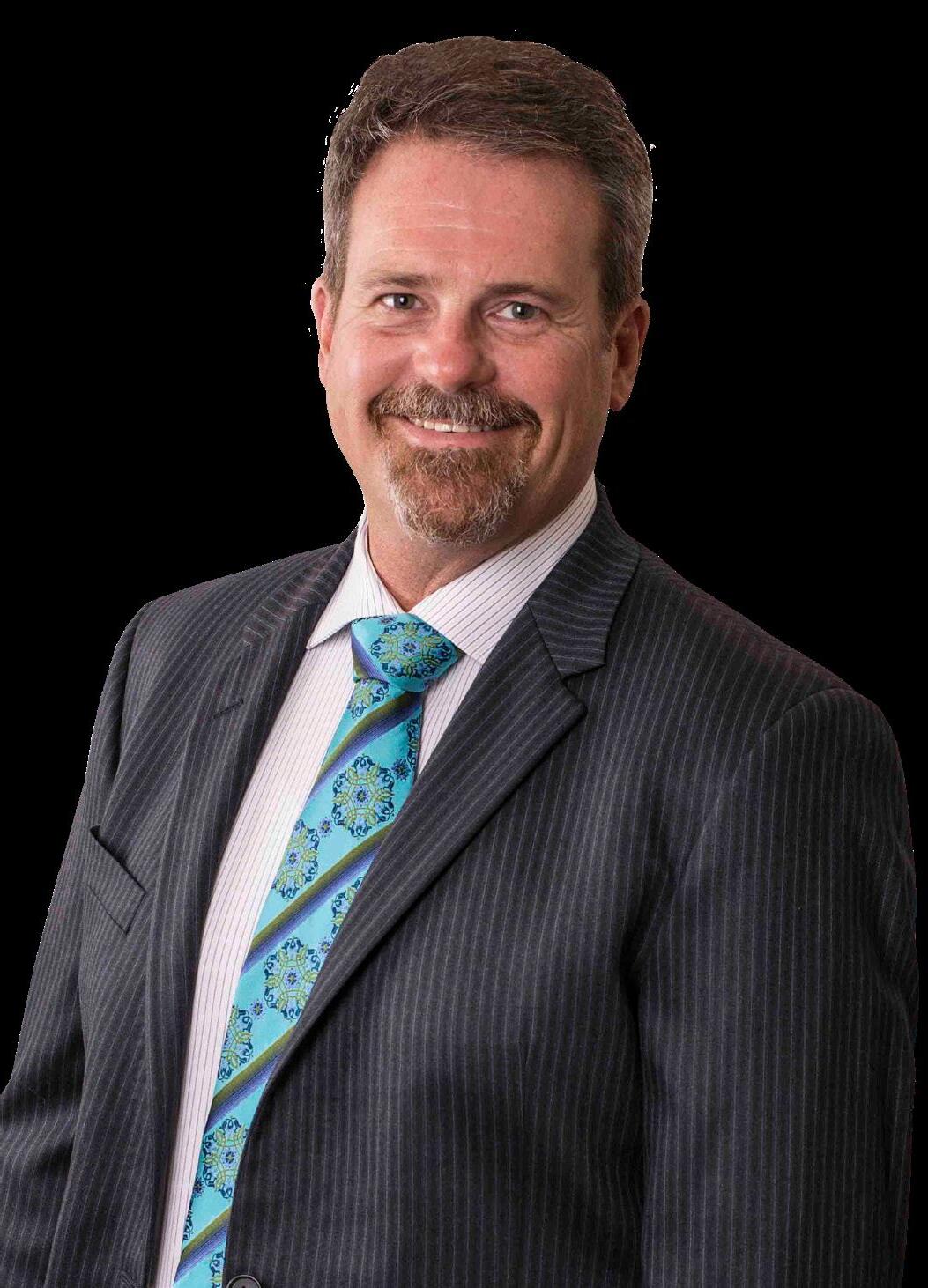
Heathman’s passion for quality dental care is matched only by his compassion for patients. He treats patients of all ages, and his clinics offer the latest in cosmetic procedures as well as general dentistry, including tooth-colored fillings, ceramic crowns and veneers, root canal therapy, tooth extractions, TMJ therapies, implant restorations, all-on-four implant dentures, smile makeovers, full mouth rehabilitation and Botox and dermal fillers. Heathman’s use of state-of-the-art techniques ensures the latest and most effective treatments possible.
“Our team members are integral to our success,” Heathman says. “Our mission is to treat our patients like family in a caring and compassionate atmosphere.”
Heathman and his team also believe that one of the most important things they can do is to educate patients and guide them along the journey to attaining optimal oral health. Listening to patients’ needs and concerns allows Heathman to tailor custom treatment plans and establish long-lasting relationships in the communities he serves.
From routine cleaning to total smile makeovers, patients continue to trust their oral health with the experts at Heathman Family Dental and The Dental Clinic at Stuttgart.
501.223.3838 | Little Rock • 870.673.2687 | Stuttgart
Ryan Flynn, president of Network Services Group, is clear about what sets his company apart in the IT world. “Other providers in this industry want to have full control of all decisions surrounding IT and cyber security,” he said. “We want to advise our clients of the best way to handle IT and cybersecurity, but we understand that some suggestions may take time to implement, and we work with them to accomplish these goals over time.”
Customers have come to expect a genuine and consultative relationship with NSG, where the goal is to understand their company’s unique needs and customize a solution for long-term stability and security.
“Having the opportunity to help our clients accomplish their business goals by providing a worry-free IT solution that utilizes technology is the most exciting part of what we do at Network Services Group,” Flynn explained.
Paying attention to ever-evolving trends in technology is key for NSG, as well as a willingness to change and adapt – both in approach and offerings – in order to better serve clients.
Flynn also recognizes the importance of quality personnel. Members of the NSG team are more than that: they’re family members. The culture at NSG is one that prioritizes communication, support and feedback, all with the aim of helping employees reach their personal and professional goals.
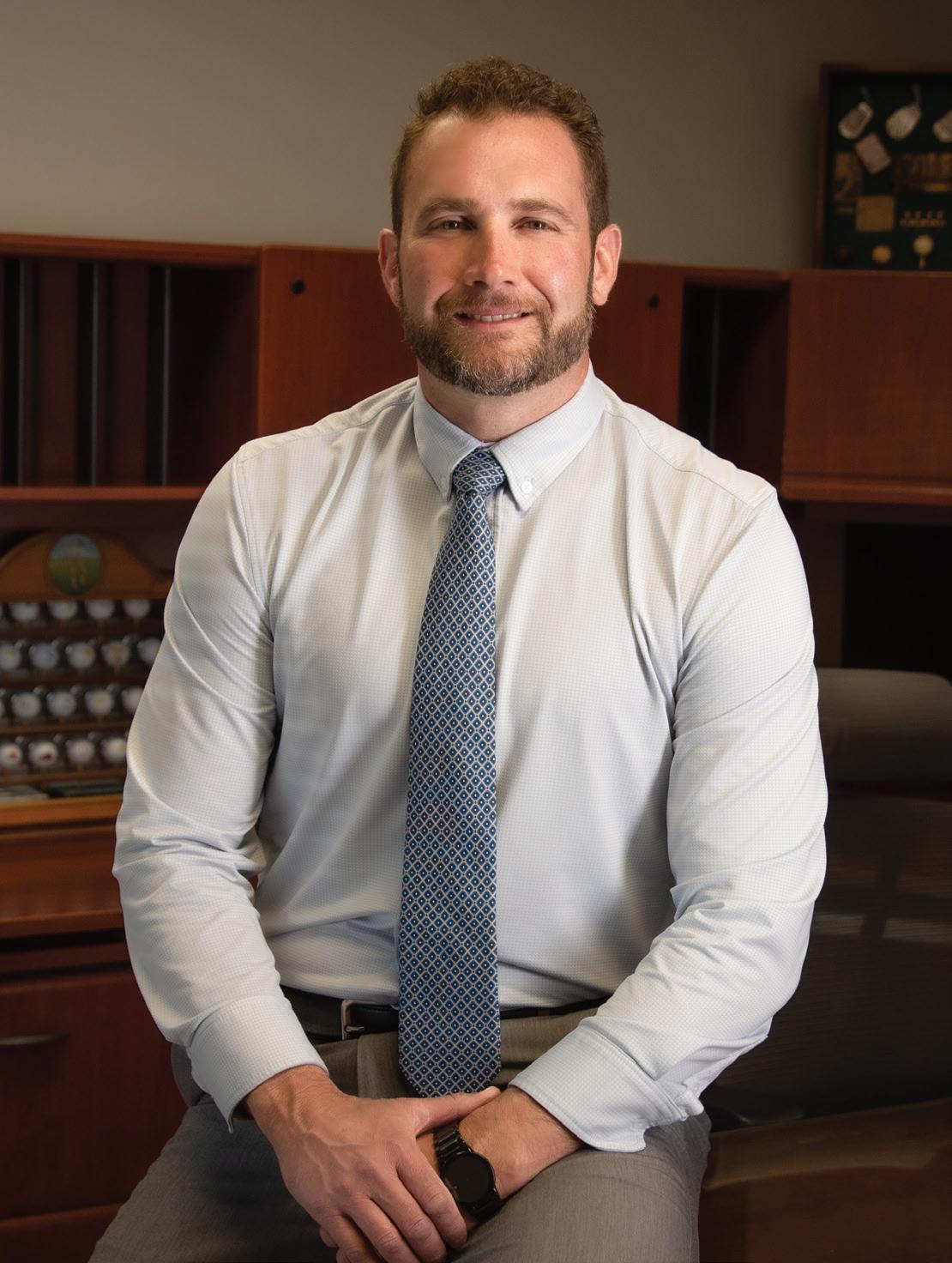
“We want to not only provide a place to work, but also a place that feels like home for our employees,” Flynn said.
For too long, many underserved areas, such as rural and minority communities, were neglected by traditional banks, leaving these communities with limited or no access to the capital and tools needed to create economic opportunities. In 1986, some of the nation’s leading political, business and philanthropic minds created Southern Bancorp to be something different: a community development bank that would serve everyone in the community, no matter the zip code, income level or financial history. Today, the Arkadelphia-based Community Development Financial Institution (CDFI) has grown into a $2.5 billion asset organization with a unique array of financial products and services designed to help individuals at all stages of life’s financial journey. Southern Bancorp combines traditional banking and lending services with financial development tools and public policy advocacy to help families and communities grow stronger.
Southern Bancorp’s approach to creating economic opportunity in the most persistently impoverished areas is rooted in the fact that net worth drives economic opportunity, and its strategic framework provides individuals an opportunity to build net worth through homeownership, entrepreneurship and savings.
With 56 locations across the Mid-South, Southern Bancorp is active in the communities it serves in a wide variety of ways, from volunteering and supporting local causes and events – such as the King Biscuit Blues Festival in Helena – to participating in the IRS’ Volunteer Income Tax Assistance program, which provides free tax prep for underserved communities. Southern Bancorp believes that wealth building isn’t just for the wealthy; they seek to be wealth builders for everyone.
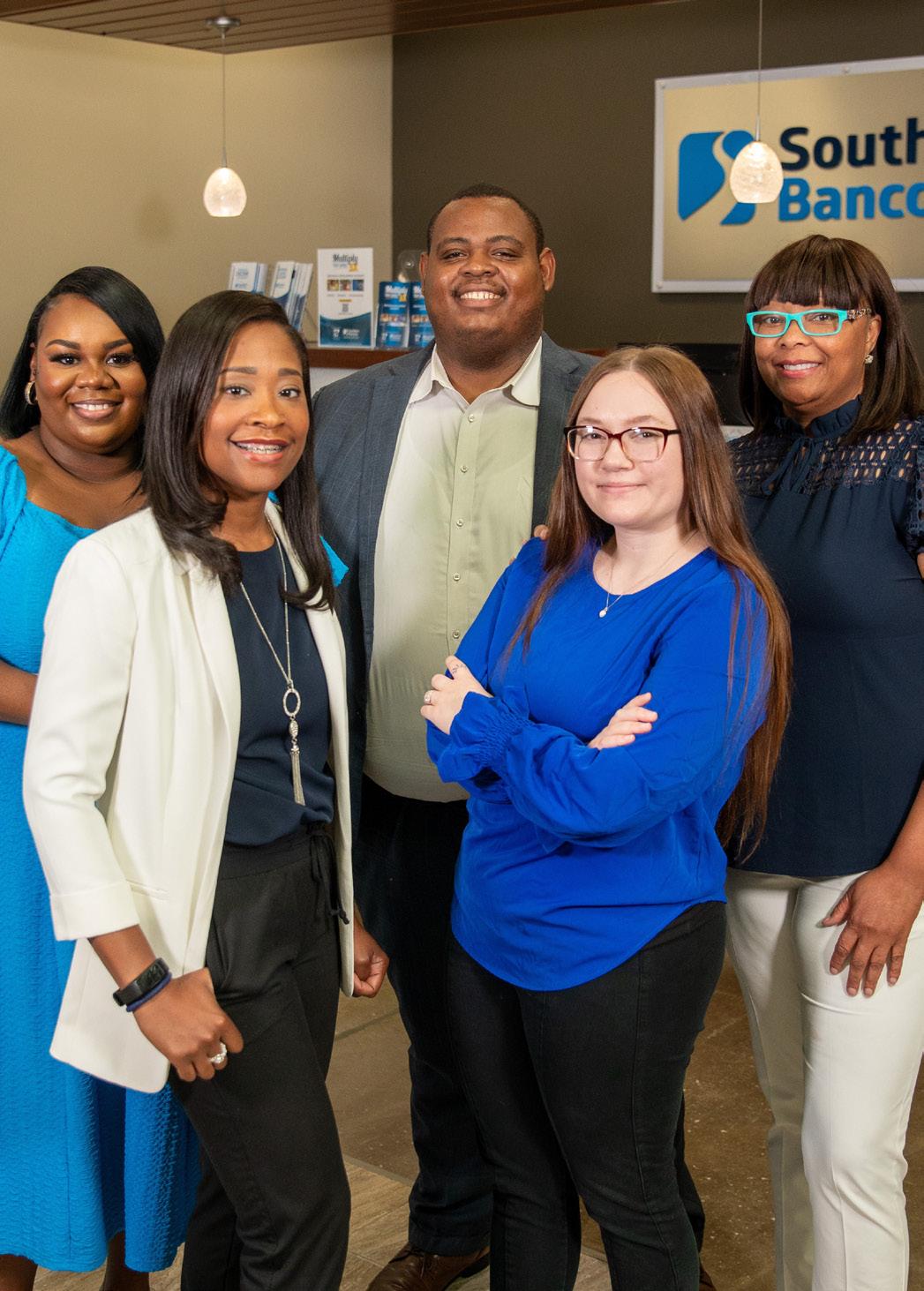
In the competitive landscape of the fast-casual dining industry, one small business stands out as a shining example of success — Tropical Smoothie Cafe. What started as a simple smoothie joint in Tallahassee, Fla., in 1997, has blossomed into a nationwide sensation, captivating the taste buds of health-conscious consumers across the United States.
Tropical Smoothie Cafe was founded by Eric and Delora Jenrich with humble beginnings. The idea was born in 1993 on a beach in Destin.
“They often describe the first location as nothing more than founder Eric Jenrich selling smoothies on a beach down in Florida,” said Glen Johnson, DYNE Hospitality Group franchisee for Tropical Smoothie in Arkansas.
From its inception, the founders had a clear vision — to offer an alternative to traditional fast food that wouldn’t compromise on taste or nutrition. Tropical Smoothie distinguished itself by crafting a menu of fresh, nutritious smoothies made from real fruits, vegetables and high-quality ingredients.
“As Tropical Smoothie started franchising locations, it led to expanding their smoothies. One of the most unique things about Tropical Smoothie is that all smoothies are made-to-order with real, fresh fruit — none of it is prepackaged,” Johnson said.
With a continued focus on health and flavor, Tropical Smoothie Cafe expanded the ingredients that went into their smoothies before expanding into healthy food items as well. In the early 2000s, the brand started to gain popularity and began expansion through franchising. The company’s approach resonated with consumers beyond Florida seeking healthier dining options.
“Originally, I think it was just sandwiches, and then we added on wraps and then flatbreads and then salads and quesadillas. Over the period of 10 to 20 years, we turned into the brand that we are today,” Johnson said.
This focus on health and flavor set the company apart from the saturated market of greasy fast-food chains. Today, the brand has 1,312 active locations, including 55 cafes in 23 Arkansas cities, making it one of the largest smoothie chains in the country.
Tropical Smoothie grew steadily over the past two decades, expanding across the U.S. and developing a bigger menu to cater to different tastes and dietary preferences.
“In addition to serving up great-tasting, nutritious food and smoothies, we like to give people the option to have lots of flexibility in what they order,” Johnson said.
Johnson and his business partner, Nick Crouch, oversee the largest Tropical Smoothie franchise in the country through DYNE Hospitality Group, with more than 100 locations across the South. Johnson, who lives in Little Rock with his family,
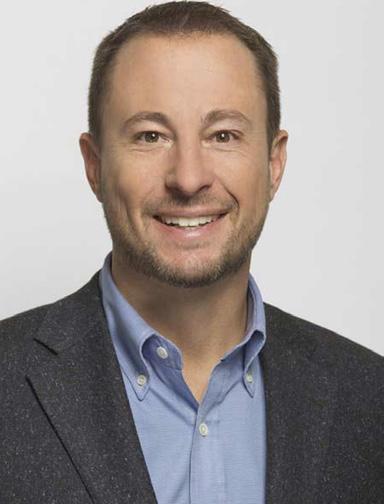
started his business career in real estate at age 16 and has extensive experience in the retail, oil and gas and private equity industries. Crouch, meanwhile, lives with his family in St. Augustine, Fla., and brings more than 20 years of experience in restaurants to the team.
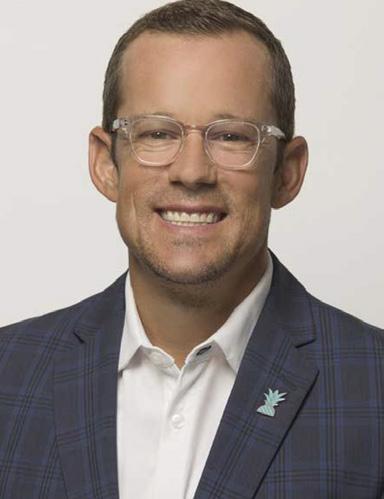
“I’ve been here for 14 years, and the brand has really changed a lot since I got started in 2011,” Johnson said. “One of the biggest changes has been that we’ve focused on convenience and adding a drive-through. In 2010, 2011, there weren’t really many healthy, quick options out there. If you were busy and on the go, or you got off at a highway exit, there really weren’t many healthy options, so that’s probably one of the biggest changes, making it easier for guests to choose a healthy option.”
For Johnson, the franchise and brand share values that elevate each.
“One of our values is that relationships rule, and so we prioritize relationships with our team and the relationships with our guests, and we really want to focus on hospitality and creating that unique experience with every customer that walks in the door,” he said.
Despite its growth, Tropical Smoothie Cafe remains embedded in its core values, and roughly 70 percent of new locations are opened by existing operators like DYNE. This year alone, the brand has opened 90 new cafes.
The brand stands out in another way — Tropical Smoothie Cafe only owns the original location. Headquartered in Atlanta, the brand works with nearly 300 individual franchisees to help the business grow in cities across the country.
Johnson is excited for the future and what lies around the bend.
“Tropical Smoothie’s very innovative. We’re always out there looking for a new smoothie, or a recipe that we can experiment with, a new food item or new product. There’s a lot that we have in the pipeline that we’re going to be rolling out, sharing with our guests that we’re testing in different markets to see what consumers think,” he said. “So, I think menu innovation is one of the biggest things that we’re doing currently to expand the Tropical Smoothie Cafe brand.”






John Flake has built more buildings and managed more real estate than even his prodigious memory can count. And while asking him to name his favorite is akin to singling out a favorite grandchild, a cursory reading of his life’s work draws two immediately to the eye.
The first is arguably the most obvious, the 40-story Capitol Tower now known as Simmons Bank Tower. Christened in 1986, it was then and remains today the tallest building in the state at 546 feet. It bested the previous record holder, Regions Center across the street, by 92 feet.
A second project that speaks of Flake’s ethos happened at about the same time, but with far less fanfare. He spearheaded the community effort to save from foreclosure the historic Daisy Bates home, where the Little Rock Nine would gather before school to talk strategy during the integration of Little Rock Central High in 1957.
Both structures have their own place in Arkansas history. One drove a literal
stake into the ground for reimagining and reinvigorating the flagging core of the state’s capital city; the other stands as a living testament to inspire and embolden future civic activists in the name of opportunity and justice for all.
To Flake himself, it’s all part of a clear moral code that has guided his steps through decades as an entrepreneur, a man of faith and a lifelong advocate of his beloved hometown.
“We’ve had several phenomenal proj-
ects that we’ve been able to do. I’ve had some really, really terrific people to work with along the way,” he said. “I’ve had some great mentors who have really given me some great advice as well as some business. We’ve been very fortunate to have relationships where people believed in us and let us do our thing.
“I always tried to maintain quality about us. People knew that when they come to a property we own, there’s not going to be trash and dirt on the floors.
I’ll tell you, I probably did a lousy job of balancing family and work. I missed a lot of things. I remember going one time on vacation, and I literally got there and they’re calling saying, ‘John, you’ve got to come back home because of so-and-so.’ You just melt down and say, ‘Do I ever get any time off? Can anybody make a decision other than me?’ And I don’t know of an entrepreneur that has not had to really fight for that balance between home and office. You’ve just got to get comfortable enough to where you can delegate.
Throughout my career, I’d preach, ‘Whatever we do, put quality in it.’ The public will see that and embrace it.”
The Flake name is iconic in Arkansas real estate development. His father, Leon Flake, established the family business in 1932 during the Great Depression. The third of four boys, John Flake attended public schools in Little Rock, graduating from Hall High School, all the while his pedigree was pointing him toward real estate as a career.
“I think you’ll see that sons of doctors tend to follow their dad, as do dentists and real estate,” Flake said. “At night, we’d talk real estate around the table when I was seven, eight, nine years old. That’s all I heard about, and after a while you think, maybe that’s what I need to do.
“Dad started out in residential, and he told me, ‘Whatever you do, don’t do that.’ I said, ‘Why is that, Dad?’ He said, ‘Because you’re going to have to show houses on Sunday.’”

If you’re not constantly changing, you’re backing up and you’re getting behind. I’ve seen some really driven companies that started out in real estate and other industries that didn’t accept change, and they ultimately got swallowed up. I think the biggest thing is to embrace change and to reward change. When someone comes up with an idea of a different way to do it, they ought to be rewarded for their ingenuity.
John Flake headed to the University of Illinois, where he majored in finance and minored in accounting. He then went to graduate school at Babson College in Boston, where he not only earned an MBA, he solidified his resolve to one day own his own shop.
“Babson is the number-one school in the country for entrepreneurs,” Flake said. “Basically, they teach you how to become an entrepreneur, if you don’t know how. My education, between Illinois and Babson, was phenomenal. I was very prepared to go into business after that.
“I would have to say that when I was working on my MBA, I knew that I could not start out initially on my own, but at that point I felt that I had the skill set to do it at the right opportunity.”
Flake initially learned at the arm of his eldest brother, Dickson, who had returned to Little Rock at their father’s urging, first with the family firm and then as co-founder of Barnes, Quinn, Flake & Anderson Inc. (now Colliers International|Arkansas) in 1971. Dickson, who died in 2020, was responsible for developing some 2 million square feet of real estate in his career, en route to enshrinement in the Arkansas Business Hall of Fame.
The elder Flake’s long client list included projects for J.B. Hunt Transport Services, Systematics (now Fidelity and Windstream), Arkansas Blue Cross and Blue Shield and the Arkansas Department of Human Services, to name a few. It was, in John Flake’s estimation, the perfect learning lab for an aspiring developer.
“Joining my brother was terrific,” he said. “We did some amazing projects together.”
By October of 1979, John Flake was prepared to go out on his own, founding Flake & Company.
“Let me say for the entrepreneur: there is never just a right opportunity,” he said. “When you take the leap, you have to just go with that and have faith in yourself that you can be successful. You also have to understand that regardless of how things are going, the people who work for you have to get paid. You might not get any money, but the people under you and the operation get paid every two weeks.
“When you’re at that step, it’s not just one where there’s a eureka moment and it’s just laid out and it’s all golden. It’s one where you must really want to cross the line and take the risk.”
Flake recalls having a couple of things going for him in his solo venture. First, he had name recognition and the solid reputation it carried from his father and brother. Second, he was operating in his hometown, where he understood the historical, political and commercial lay of the land. And finally, he was young enough to dream audaciously about what was possible and endure the hours and stress that came with it.
“There clearly is a benefit to being from here and then starting your business here,” he said. “You can go borrow money from a bank and the bank already knows you, knows your family, your background. For an entrepreneur to get any money, that’s really important.
“Second thing, because they know you, unless you’ve spent a little time in the penitentiary or something, they’ll have trust in you. And if you’ve got a product, they’ll be glad to purchase
The gameplan didn’t call for specialization, and in classic bootstrap fashion, Flake & Company knitted together whatever work it could to pay the bills. Among the company’s first projects were medical offices for physicians — 12,000 square feet here, 20,000 square feet there — built on the Baptist Health campus.
“Starting out, we had to be a generalist,” he said. “We always wanted to be in development, but at some point, you have to realize that you have to meet payroll, so you have to develop a property management company and you had to have brokerage transactions to support your development activities.”
Casting a wide business net also proved an essential buttress against shifting economic tides, which easily capsized companies that were light on capital.
“The period there between ῾79 and ῾83 was a real difficult time to get moving,” Flake said. “What got us through the tough years was having a very stable company and having a balance of divisions within our company.
“We found, for instance, property management and asset management basically carried us through the hard times.
We’ve had some projects, like anybody, that were difficult and gave us a lot of problems. But rather than sitting there and whining about it, you’ve got to basically roll up your shirt sleeves and go in there and attack it. When that happened to me, I tried to say “This is an opportunity. This is a challenge. This is not a layup, but I’m going to go in and attack it with my full force and get it done.”
I think if you’ve got that attitude towards things, you can’t be beat.
Development and brokerage occurred when times were good, but when they weren’t, when they were slow, property management, while not glamorous, was the part of the company that always consistently paid the bills.”
Just four years into his venture, Flake would make the gamble of his lifetime, envisioning an unprecedented office tower to redefine the Little Rock skyline and jump-start the crumbling city core in the process. Even today, it is incredible to imagine a 30-something developer, hometown boy or not, walking into any financial institution with the ask Flake had in mind.
ing projects for Baptist Health, Walmart, Dillard’s, Verizon, Acxiom, Entergy, the Electric Cooperatives of Arkansas and CARTI. Success was sweet, but not without its price.
“In 2019, I had heart surgery. I’m doing great now, I feel like I’m 40 or 50,” Flake said. “But it really was an epiphany in that you start questioning what stress
all the years the city supported me.”
Having had only daughters, Flake said he used to worry about the family name being gone and forgotten one day. Nearly a half-century of projects later, he knows that can’t happen. His legacy is sealed into every brick, block and girder, his ethics and character carried forth by the next generation seek-
The reason why we have done as well as we have is I go in looking at a tenant as my partner. Without them being able to make money in their business, they can’t pay me rent. So, I’ve got to figure out a way, particularly in an economy with rising interest rates and rising inflation, how do I get a return? I might say ‘Look, I’ll work with you. I’ll make just enough to pay my bills and I’m not going to make a return on you for a couple years. Let me get you on your feet.’ And we’ve done that many times with tenants.
But having already done much of the legwork with some of the city’s top corporate tenants, selling them on the idea of relocating to what would be the most prestigious address in Arkansas, he’d sweetened the pot considerably for would-be lenders.
“If that 33-year-old person walked in with nothing, forget it,” he said. “But if that 33-year-old person walked in and said I’ve got the power company as a tenant, I’ve got Merrill Lynch as a tenant, I’ve got this law firm as a tenant, I’ve got this accounting firm, that’s different. We were 55 percent preleased before we ever dropped a spade.”
With that, a certain gleam sparked in his eye, then an almost imperceptible shake of the head.
“You think about that. Our loan started out at $65 million, and that was in 1983,” he said, a chuckle curling around his words. “There is a lot of difference in risk you want to take when you’re 33 and when you’re 75, I’ll tell you that.”
The triumph of the Capitol Tower opened the floodgates for Flake & Company, both in projects and, in the years to come, partners. In time, the company would gain and shed a number of names above the door, its final incarnation being Flake and Kelley. Along the way, the company became a bona-fide cornerstone of Arkansas real estate, complet-
does to you. I’ve never seen it, but I wonder if anyone’s ever done a study on the life cycle of an entrepreneur versus a person who just works every day and does a great job but doesn’t have that stress and doesn’t have that workload.”
The following year, Flake made what he calls his last career change, leaving the firm he founded and built for 41 years to join the new Flake & Company created by his daughter, Jessica Flake Dearnley, and her business partner, Tyler Wilson. Rumor has it is he draws no paycheck from the venture, which has projects in five states, and he even borrowed a stray conference room for this interview, lacking a proper office. He said the chance to work with his daughter was all the compensation a guy could ask for.
“Jessica is an extremely driven person; she’s very, very bright,” he said. “She holds three master’s degrees. She’s much more prepared, much more educated than I am, and can do a hell of a lot better job than I do. She allows me to hang out here.
“What I’m trying to do now is, 50 percent of my time I try to help her and 50 percent of my time help other organizations. I’ve been very involved in Jericho Way, and this is giving me that time to pay back, working for the homeless or whatever it is. It’s my way of saying thanks for
ing to shape the horizon.
“My view is, and I might be in the minority on this, but I view that what I’ve done is God’s,” he said. “When you are born, you have nothing. When you die, you have nothing. What God is doing is letting us manage these assets while we’re here, and I think He judges us on the basis of how well we’ve done that.
“The work that we did and the times we’ve had, it’s been a great ride, a lot of fun. I’m just thankful to God every day for what he’s given me.”
Don’t be afraid to take a risk. Make sure you manage it, but don’t be afraid to take risks. If you want to go anywhere other than a salary in life, you’re going to have to take a risk. It’s just part of it. Embrace that risk and go for it. Whatever you’re doing, just embrace life and be happy that God has given you the chance to do it.
MORE ENTREPRENEURS ARE COMING FORWARD ABOUT THE TOLL ON MENTAL HEALTH
 By Dwain Hebda
By Dwain Hebda
In 2018, VC Fintech, hosted by the Venture Center, included one company with ties to Arkansas. The young founder was so taken with the state, he opened a Bentonville office as a satellite location for his California-based startup. In a piece for Arkansas Money & Politics profiling that year’s participants, he happily discussed with me the purpose of his app, which sought to simplify ecommerce and reduce the carbon footprint related to creating new coins. It was an ingenious and userfriendly concept that had wowed investors and landed him in the exclusive accelerator.
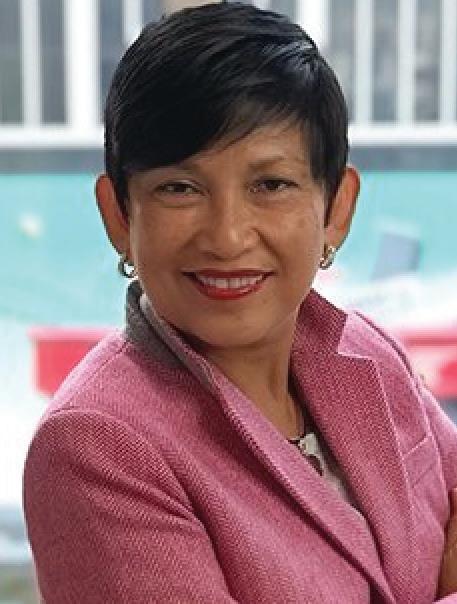


Three years later, I reached out to the Venture Center for the entrepreneur’s contact information, hoping to interview him for another story. I was informed the Bentonville office had closed and the founder was deceased, having taken his own life. The finality of the news, applied to the upbeat and intelligent person I’d interviewed previously, was jarring.
Every chapter in American business history has its titans, individuals who built empires, amassed fortunes and drew hundreds, if not thousands of imitators in their wake, hoping to replicate their success. For the past 30 years, the modern tycoons have not come from steel, oil or even Wall Street but from the digital world, and its impact on the marketplace and society has arguably been greater than all of history’s previous business revolutions combined.
Google, Amazon and Facebook all reached stratospheric heights and their founders earned iconic social status, entrepreneurs who changed the world with seemingly nothing more than a good idea and a laptop. These new founders were young, smart and capable of building gargantuan fortunes practically overnight and, to all appearances, singlehandedly. Millions of entrepreneurs adopted the new model, dubbed the startup, which eschewed conventional business thinking and set its sights on recasting society itself. And why not? From the outside, it just looked so easy.
But like all gold rushes and booms, the startup revolution has settled back from its adrenalinesoaked nitrous days into something more in pace with previous generations. As it does so, this new brand of entrepreneurship is starting to show its darker side, where the freedom to do and work as one pleases comes with a double helping of pressure and unyielding demands. A culture where never sleeping at all is a status symbol, admitting feelings of depression and anxiety remain stubbornly stigmatized, and spartan work ethic and tough-it-out endurance bordering on the masochistic is expected, even beatified.
“I think the nature of entrepreneurship is you’re running as fast as you can to accomplish as many things as you can because you know not everything is going to work,” said Susie Reynolds Reese, an author, lecturer and internationally recognized authority on the subject of suicide-centered lived experience. “The hope is, if I can divide my attention and my energy across as many projects and opportunities as possible, at least one of them is going to finally be successful.
“The nature of that mindset is very burnout-prone and can be very difficult for individuals, especially those who are really new to working for themselves or trying to navigate multiple different types of contracts and organizations as collaborators.”
Sadly, an increasing number of outcomes from this new environment have been tragic. Entrepreneur noted last year that 72 percent of founders report having mental health concerns. And while not all of them result in selfharming behaviors, there is no reliable data to indicate how many actually do.
Some sources suggest entrepreneurs are twice as likely to harbor suicidal thoughts than the general population. That’s significant when considering what we do know, that studies show more than 9 percent of people experience suicidal ideation over their lifetimes. In fact, data from 2015 to 2019 gathered by the Centers for Disease Control and Prevention indicated more than four in 10 Americans have had suicidal thoughts over the previous year.
“When you look at the overview of what being an entrepreneur is in the scheme of professionalism, it’s a very disconnected role. It’s very much one person, not a large industry or large organization,” Reynolds Reece said. “They often can’t turn to the person next to them or go knock on the door of an office down the hall and say, ‘I need to talk to you’. Many entrepreneurs are also of the mindset, ‘Who has time to pause and think about wellbeing and mental health when being able to support myself or my family is dependent on my ability to move forward?’”
It’s somewhat ironic to consider how many founders suffer in such isolation given the visible arena in which many operate. The rash of confirmed and suspected suicides in this space has claimed many of the brightest and most ambitious entrepreneurs, from Unfiltered founder Jake Millar and anti-virus software pioneer John McAfee to Zappos founder Tony Hsieh and Reddit’s Aaron Swartz.
One of the reasons these and many other high-profile deaths have been so jarring is that these were the ones who had, to outside appearances, moved past the hard part. They’d landed
millions in funding, gained traction for their ventures and were lauded in business magazines and the tech community alike as the next big thing.
And while being well-known, successful and ostensibly happy is no free pass when it comes to mental health, experts note today’s entrepreneurs do not seem to be afforded the same latitude for talking about their demons as the general public.
“Rather than showing vulnerability, business leaders have practiced what social psychiatrists call impression management — also known as ‘fake it till you make it,’” wrote Jessica Bruder for Inc., who went on to cite one CEO on the nature of appearance versus reality.
“[He] explains the phenomenon with his favorite analogy: a man riding a lion. ‘People look at him and think, ‘This guy’s really got it together! He’s brave!’ And the man riding the lion is thinking, “How the hell did I get on a lion, and how do I keep from getting eaten?””
Reynolds Reece said the role of entrepreneur is difficult to untangle from the nature of the person when trying to decipher how one impacts the other. For some people dealing with mental health issues, the pressures of a startup might be the last straw; in other cases, individuals who have never experienced problems before may have them brought on by their unending workday and demands of investors.
“Unfortunately, I lost a really good friend of mine last November, and we had multiple conversations throughout our relationship about the one thing he could do was just show up when needed for work, and then he couldn’t,” Reynolds Reece said. “I think that just destroyed a major part of who he was in some ways, because he had established mental health issues prior to that, and the nature of the industry just chipped away at little pieces.”
Another thing that complicates the scenario, experts say, is the very same attributes, even mental issues, that can ultimately prove harmful are often what make the individual a good entrepreneur, at least in certain situations. As Bruder wrote, “Call it the downside of being up.”
“The same passionate dispositions that drive founders heedlessly toward success can sometimes consume them. Business owners are ‘vulnerable to the dark side of obsession,’ suggest researchers from the Swinburne University of Technology in Melbourne, Australia. They conducted interviews with founders for a study about entrepreneurial passion. The researchers found that many subjects displayed signs of clinical obsession, including strong feelings of distress and anxiety, which have ‘the potential to lead to impaired functioning.’
“I come from a culture where you’re told you cannot fail, you cannot fail ... talking about things like mental health is often taken as a sign of weakness.”
- Mimi San Pedro
“In his book ‘The Hypomanic Edge: The Link Between (a Little) Craziness and (a Lot of) Success in America’, [author John] Gartner argues that an often-overlooked temperament — hypomania — may be responsible for some entrepreneurs’ strengths as well as their flaws,” Bruder added.
Such findings only thicken the web in which many founders are caught, struggling with stress, anxiety and worry with few perceived outlets for help. These feelings are often reinforced by the outside world’s inability to recognize their suffering due to entrepreneurs sharing few common characteristics or red flags. Combined, these elements have created a demographic with higher rates of self-harm than other segments of the population, study after study shows.
“I wish I could tell you it was just this simple one-or-the-other thing,” Reynolds Reece said. “Unfortunately, what I’ve learned is that every experience is different and there’s so much nuance and complexity. The nature of this space is very fast-paced; it’s prone for burnout. Some individuals just aren’t able to navigate it. It’s just not built for them.”
The tragic incident involving the former VC Fintech mentee described at the outset did not go unnoticed by the staff of the Venture Center, which began to examine the kinds of support the Little-Rock based organization could provide to the entrepreneurs they worked with, in addition to the business mentoring and networking that had existed all along.
Mimi San Pedro, chief strategy officer, said as a former founder herself, she understands intimately how pressures can build up and push some people to the tipping point.
“The most stress that I had running a startup company was the employees, making sure that they make the mortgage payment or their tuition for their kids,” she said. “That was what really weighed heavily on my day-to-day, which gave me the motivation and the goal of every day growing the company. It was all about making payroll, making payroll, making payroll. That was a big stress level for me.”
Drawing from her own experience, San Pedro spearheaded an effort at the Venture Center called Women Achieve, which helped female founders cope with the added pressures they sometimes face as both breadwinner and caregiver.
“The Venture Center has always had mentorship programs, but what I know is that women have different needs,” she said. “They are taking care of their family, taking care of their kids, taking care of aging parents. They want to have a mentor who understands them and their struggles as an entrepreneur.
“Another thing that I wanted to make sure of is the diversity part of it. Not only is it about women talking to other women, but a Hispanic woman talking to a Hispanic entrepreneur, an Asian woman talking to an Asian entrepreneur, an African American woman talking to an African American entrepreneur.”
Such an approach is more than just political correctness. San Pedro said it’s an important way for people of similar backgrounds to get at the real meat of issues, based on a shared cultural experience as well as understanding the same gender expectations and challenges.
“I have personally and professionally benefitted from having women mentors in my life,” she said. “I come from a culture where you’re told you cannot fail, you cannot fail. Coming from that background, talking about things like mental health is often taken as a sign of weakness. So, seeking an outlet becomes a trust issue.
“Luckily, I have some great mentors that I can disclose pretty much everything to about what I’m going through both practically and emotionally, somebody I can just sit down with and go, ‘Look I’ve just had enough.’ And they just kind of pat me on the back and then the next day they call and say, ‘OK. Get back up. Let’s talk about how you’re gonna do this today.’”
Meanwhile, the grind continues for founders. The Small Business Administration reports there are some 3.2 million small businesses in the U.S. Of these, SmallBusinessTrends.com reported only two in five startups were profitable while a third lose money. Faillory.com reports 90 percent of startups fail, 10 percent in the first year and 70 percent in years two through five. Fewer than two in 10 first-time founders succeed, per Exploding Topics.com, with the most common reason for going under being under-capitalization.
Life as a founder is a far more brutal existence than most people realize. Reynolds Reece’s advice to those who chase the dream anyway is simple, but not easy, for meeting the struggles entrepreneurs face, quite often as a literal matter of life and death.
“Whatever experience you’re having, recognize that it is not wrong,” she said. “There is no reason to feel shame. There is no reason or need to hide it. If you’re having to hide any part of yourself or feel shame about who you are or what you’re experiencing, you are surrounded by the wrong people, quite frankly, so find new people. That can be overwhelming because we are so tied into the connections that we have. But re-evaluate, find small spaces where you can bring your full self to the table and not have to keep your mouth shut or not wear the thing, whatever it may be.
“While realizing your feelings are valid, you also have to take account of what those feelings are, and if there are things that you can do to make it a little easier or a little better. Hope is not an answer, hope is an ideal. We often really push that word around, but I can’t hold onto hope. I can’t touch it. It is not something that is tangible, actionable or offers solutions, so find something that is. Find help in another person. Find help in yourself.
“Honestly, we have got to really start to accept that this is not the way we were supposed to be functioning as human beings and mental health care is a necessity. The world is very weird. Let’s just recognize that.”
If you or someone you know is struggling, the 988 Suicide & Crisis Lifeline (formerly known as the National Suicide Prevention Lifeline) provides free and confidential emotional support to people in suicidal crisis or emotional distress 24 hours a day, seven days a week, across the United States. Simply dial 988 or visit 988Lifeline.org to learn more.
 By Mark Carter
By Mark Carter
That Arkansas was picked to finish fifth in the SEC West this season by media members who cover the conference should be viewed more as portent of good than as sign of disrespect.
Because as every dutiful Arkansas fan knows, the Hogs historically prefer defying expectations to meeting them. But while everyone from Coral Gables to Pullman acknowledges that Sam Pittman succeeded in pulling the Razorback program out of the ditch from whence he found it in December 2019, most outside The Natural State expect the Hogs to remain mired in the SEC middle again in 2023. Despite the return of the SEC’s top QBrunning back duo.
Granted, the SEC middle would equate to conference titles elsewhere. But we cash the rather large check from Birmingham each year, so griping about the murderer’s row of the SEC West is futile.
And the fact remains — Arkansas would be picked to finish higher than fifth in any other division in college football. Athlon has the Hogs at preseason No. 29, after all. The offense is poised to continue its juggernaut run, and if the defense can show any signs of improvement, the Hogs should be positioned to win the close games that haunted them in 2022, and dare I say it, flirt again with nine, maybe even 10 wins…
Though Pittman has led the Hogs to consecutive bowl wins for the first time since Bobby Petrino did so in 2011 and 2012 — three if you count what should be a forfeit win over TCU in the 2020 Texas Bowl, and I do — the Hogs limped to a 3-5 SEC finish in 2022 with four losses by a total of nine points and star QB K.J. Jefferson less than 100 percent or out for more than a third of the season.
This season, Pittman’s fourth on The Hill, will determine whether the program remains mired in the middle or if it’s ready to take the next step.
The wild three-overtime win over Kansas in the Liberty Bowl book-ended a roller coaster season that began with a top 20 win in the season opener over Cincinnati, it of the 2021-22 college football playoff and now of the Power 5. The Hogs reached No. 8 in the September polls for the second straight season only to succumb to injuries, the annual schedule grind and several rounds of just plain hard luck. (I mean, who could’ve forecasted the craziness that turned a blooming rout into an off-thetop-of-the-upright loss in Arlington?)
Still, Pittman makes no excuses and admits the team didn’t meet expectations. And at SEC Media Days this summer, he promised 2022 would be the last time one of
his Arkansas teams failed to do so. Typical coachspeak perhaps, but Pittman is one of the few in college ball not versed in it. More likely, his insistence is the result of learning on the job. Outside of high school or juco ball, Arkansas represents his first head coaching gig, after all, and Pittman wants it to be his first and only. And though the “col’ beer,” country boy persona is genuine, it takes the spotlight off the shrewd, career tactician, a role Pittman has needed to play to last as long as he has in the business. And once the regular season ended with another head-scratching, heartbreaking loss, the tactician emerged. In 2023, the staff will look a lot different than it did last year. ***
Considering the Hogs’ remarkable 2022 run of bad luck, the fact that Pittman’s 48 managed a win with backs against the wall in the bowl game could be telling for expectations in �23. Forty-eight, of course, is the number of scholarship players that dressed for the bowl game after portal transfers and opt-outs last December. Indeed, the would-be Arkansas rout of Kansas turned into a nail-biter at the Liberty Bowl, thanks to a Pac 12 crew that apparently was watching another game. Its performance even
Head Hog Sam Pittman admitted to SEC media members that the 2022 season didn’t live up to his expectations.
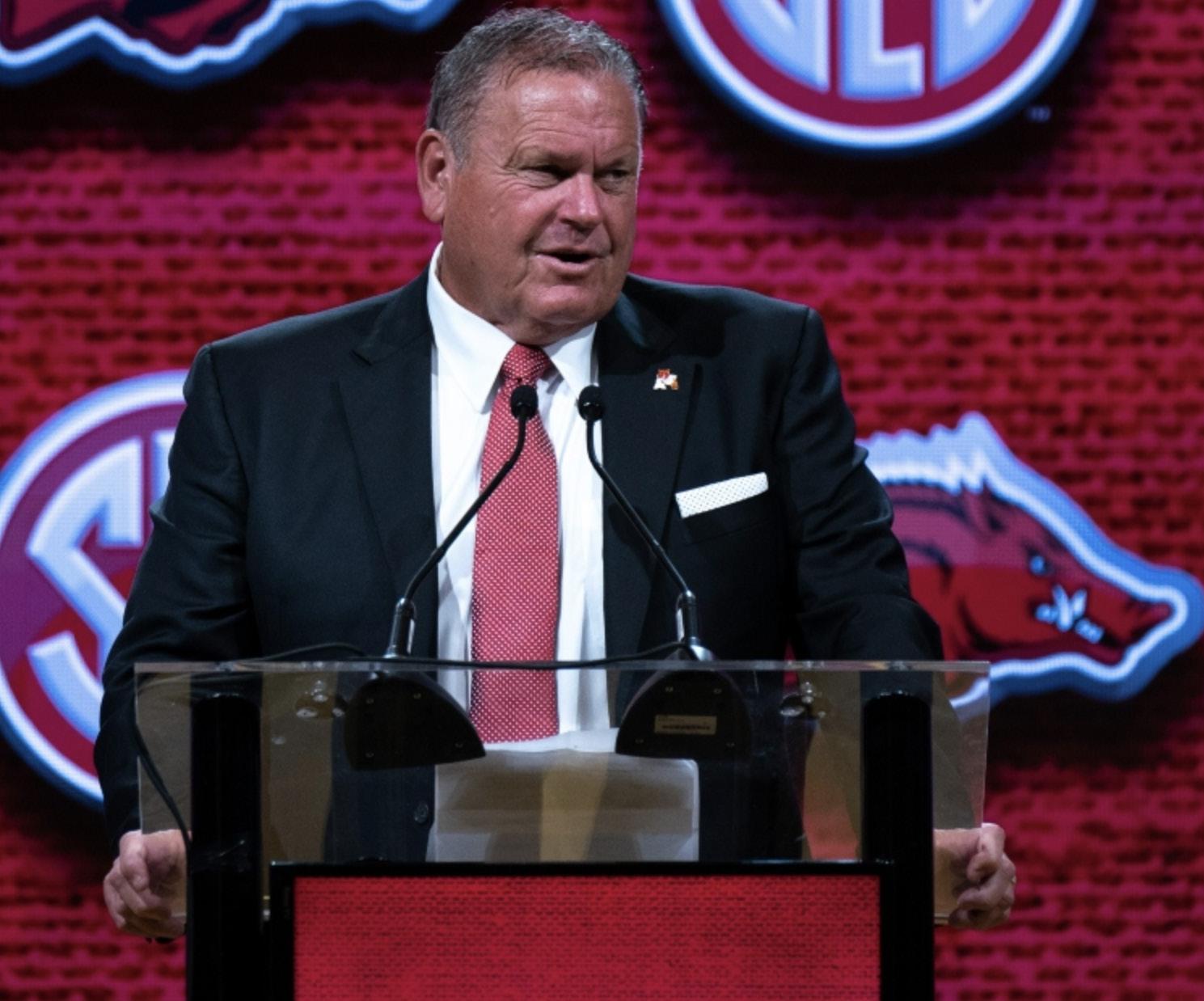
Sanders was named to the Maxwell Award watch list; last year, he ran for more than 1,400 yards and 10 scores.
drew sarcasm at SEC Media Days from Commissioner Greg Sankey, he of the “at Alabama/Georgia/Florida/Chiefs/�85 Bears/Lombardy Packers” scheduling philosophy where Arkansas is concerned.
Many teams would’ve folded given the circumstances of that nightmare fourth quarter in Memphis. That this bunch didn’t is encouraging. It feels like Pittman has adjusted. (I won’t say players were culled, although that certainly could apply to a few prima donna players and coaches who left or were asked to do so, even some fan favorites, and is simply part of the game.) Pittman knows much is riding on this season. For Arkansas, and for him. Hog fans were more than willing to give him time, but they need to see progress.
Pittman successfully pulled Arkansas out of the ditch, but will it be stuck in the slow lane, where national perception says it belongs? The man who prefers big O-linemen and jukeboxes loud believes Arkansas can compete at the highest level in football, just as it does in every other sport. Football, of course, is a different animal. But Pittman has played the portal game seem-
ingly as well as anyone, and depending on your source, the Arkansas NIL game is good or at least adequate. And if TCU can do it… Of course, TCU doesn’t have to navigate anything close to resembling the SEC mine field.
(Raise your hands, Hog fans, if you’ve ever been frustrated to the point of frothing at the mouth by the relative ease with which teams like Cincinnati and TCU can make the college football playoffs. I’m sure fans of teams like Mississippi State, South Carolina and Kentucky feel the same way. Well, the ones in the Bluegrass State for whom football matters. But again, we get back to that big SEC check with all the zeros…)
The chaos theory itself would seem to suggest that the Hogs won’t get hit by the injury bug as hard this year. But if any hard-


luck program can defy science, it’s ours. And the internal drama that quietly seethed beneath the surface of last year’s squad won’t make a repeat appearance this fall. Pittman made sure of that.
But from a national perspective, the casual college football followers (fans AND writers) see that Arkansas lost both its coordinators, a higher-than-average number of players to the portal and continue to focus on KJ’s bad moments when he was playing hurt over his literal college-Cam Newton impersonations.
The staff indeed has a new look. Pittman has never been shy about asking good position coaches to look for another opportunity of they weren’t pulling their weight, and his new additions have nothing but at their previous stops. The Hogs’ 2024 class was on pace to be among the highest ever at Arkansas.
Let’s start on defense. Barry Odom, the former Missouri head coach and Pittman confidante, was masterful for most of three years on The Hill. He took a bare cupboard and turned it into enough of a functioning component to help the Hogs earn three straight bowl invites.
Odom’s cover-8, bend-but-don’t-break system, employed out of necessity, worked to perfection early in 2020 when the Hogs beat Mike Leach’s Bulldogs in Starkville to end an SEC losing streak. That year, against one of the toughest college schedules ever conceived, Odom was a miracle worker. Think Hudson Clark against Ole Miss. Out-talented, but not out-fought. But the question became, can the depth-challenged D hold up late? Too often, it couldn’t, and the record book reveals a historically bad

Remember all those yards and records accumulated under the Allen brothers at quarterback? Enos.Dan Enos helped elevate Brandon Allen’s game. Can he do the same for KJ Jefferson?
pass defense in 2022.
You have to think Odom and Pittman agreed that the next offer needed to be the one, and UNLV obliged. Under new DC Travis Williams, the former Auburn linebacker who most recently led the UCF defense, the Hogs will play fast and aggressive in a new-look 4-2-5 scheme. Rush three and drop eight? Not anymore. And if Arkansas continues to give up big plays, well, it did that last year anyway dropping everyone. At least in �23, expect the D to be disruptive. And that’s just what Pittman was looking for.
Plus, the portal delivered some defensive prizes — DBs Alfahiym Walcott from Baylor and Jaheim Singletary from Georgia, Pitt DE John Morgan III, Missouri DL Trajan Jeffcoat, South Florida LB Antonio Grier among them — that gives Williams a fighting chance to field a defense that can contribute.
Of course, looking good on paper is one thing. But the Hogs have some experienced talent coming back. Will it be enough in �23? Veterans like CB Dwight McGlothern, DL Cam Ball and Taurean Carter, LB Chris Paul and DE Landon Jackson, all standouts last year, think it will be.
On the other side, much has been made of the losses of OC Kendal Briles to TCU and Dowell Loggains, the former Hog player and NFL coordinator who many had as the OC-in-waiting once Briles left, to South Carolina.

Briles genuinely did like it here, and genuinely did turn down Miami, but he also liked the attention. And Pittman tired of the job flirting. Loggains wanted to be OC in Fayetteville (and ultimately head coach, I think) and waited out Briles as long as he could. Once it became apparent Briles would be around for at least another year, or so it appeared, Loggains took the first Power 5 coordinator offer. He wants to be a college head coach, and Pittman’s path notwithstanding, that’s how you do it.
Hog fans can debate Loggains’ credentials, but they can’t deny his love of the Hogs. When college assistants leave for a new job, they leave their old school gear behind, unless maybe they want to save a hat or shirt from each of their previous stops.
I can easily see Barry Odom’s sweat-stained, red Arkansas script Nike hat sitting in his closet at home in Vegas. When Pittman took the OL coach job at Georgia after he and Bielema could no longer work together, he gave most of his UA coaching swag to Goodwill. Loggains, on the other hand, took his entire UAissued Razorback wardrobe with him to Columbia, S.C.
Either he’s a warrior on eBay or he’s a Hog fan.
I liked the Briles offense. When it’s humming, it’s a thing of beauty. But the propensity to get cute at the wrong time and the red zone inefficiency cost us games.
Enter Dan Enos, who returns to Fayetteville from Maryland, where he coordinated the offense and coached Taulia Tagovailoa.
Pittman told SEC media members that Enos is the best offensive coach he ever worked with, and he did so during the program’s mid-2010s relevancy tease under Bret Bielema. Pittman coached the OL and Enos the QBs as OC. Remember all those yards and records accumulated under the Allen brothers at quarterback? Enos.
The 2015 and 2016 Razorback offenses each rank among the top 10 in school history for total yards and yards per game. The 2015 offense (with Pittman coaching the OL) averaged 36 points a game and set the school record for touchdowns with 62.
The offense will look a bit more traditional under Enos — Hello, Mr. Tight End — but it shouldn’t lack for explosiveness. Jefferson is a clear all-star candidate behind center, the best returning QB in the SEC, and Rocket Sanders leads one of the better RB rooms in the SEC, if not the country. Both were named
Under new DC Travis Williams, the Hogs will play fast and aggressive in a new-look 4-2-5 scheme.
to the preseason Maxwell Award watch lists as well as various all-SEC and even All-America lists. Jefferson should flirt with the record book this season following an injury-plagued �22 campaign in which he threw for more than 2,600 yards and 24 touchdowns, with just five picks (most of which weren’t his fault), while completing 68 percent of his passes. (For those not familiar, that’s very good.) He also ran for 640 yards and 10 TDs.
A perhaps-underutilized Sanders led the SEC in rushing for most of the year, averaged more than 100 rushing yards per game and finished with more than 1,400 yards and 10 rushing scores.
Arkansas beat a cast of bluebloods for the signatures of highly coveted transfer receivers Tyrone Broden (all 6’7” of him), Andrew Armstrong and Isaac TeSlaa (emphasis on second syllable) as well as North Texas TE Var’keyes Gumms, a second-team freshman All-American in �22. The Hogs needed the portal here, losing 67 percent of its receiver production from �22.
And the Hogs seem to have a clear heir apparent behind KJ in promising Morrilton native and North Carolina transfer Jacolby Criswell.
Up front, the Hogs replace three starters, but Pittman thinks he has quality depth here. He’ll still tell anyone that he’s just an ol’ line coach at heart. Veteran Beaux Limmer moves over to center from right guard and Brady Latham is back at left guard in his fourth year in the program. And in a template for how the big boys do it, the Hogs have multi-year players in the wings waiting their turns to step in and contribute — Ty’Kieast Crawford, E’Marion Harris, Patrick Kutas … come on down. A portal prize doesn’t hurt, of course, and the Hogs appear to have gotten one in Florida transfer guard Joshua Braun, the likely starter at right guard.
Assuming the O-line holds up — and folks in and around the program rave about new strength and conditioning coach Ben Sowders and his staff — the Hogs should score points.
The reliable Cam Little (50-for-50 PATS, 13-for-16 FGs) is back,
as is Aussie punter Max Fletcher, who started part-time last year and averaged just 38 yards a kick but reportedly booms ‘em in practice. We’ll see if he can consistently do so on Saturdays now with a year of — say it with me, real — football under his belt.
The Hogs open at home for the season’s first three weeks. I say, “at home.” Western Carolina in Little Rock is the opener on Labor Day weekend. (And why the program still plays games at War Memorial is a soapbox for another corner.)
Kent State and BYU then await before a brutal, only-the-SECcould-dream-this-up-for-us stretch of: at LSU, A&M in Dallas, at Ole Miss and at �Bama. Come out of that gauntlet 2-2, and who knows. Then again, the Hogs have a history of losing the return game in Fayetteville in past non-conference home-and-homes. Under Beliema, the Hogs beat TCU and Texas Tech on the road only to lose both return games in Razorback Stadium. And BYU has been a Power 5 school in everything but name for decades. And this little tidbit from a Deseret News game-by-game analysis of the Cougars’ �23 schedule:
“If there is hope for the Cougars, it is that history suggests they tend to play better in return games against Power Five schools. They bounced back after routs against Wisconsin, Baylor and Utah after drubbings in the previous years.”
Don’t count BYU as an automatic. Then again, no one is counting Arkansas as one, either.
The offense shouldn’t skip a beat and almost assuredly will improve on its short-yardage and red-zone efficiency. Because it has to. The OL will be fine, because it’s Pittman. But can a newlook defense make the difference in three, four, five close games? One thing’s for sure — as much as I appreciated Barry Odom’s ability to make lemonade, it’ll be nice seeing a defense play a little offense. And KJ etch his name in the record books. (He lifts weights, I’ve heard.)
Grab the jug of Kool-Aid, cause Sept. 2 awaits just around the corner and the Hogs have some expectations to exceed.

Summerwood Sports’ calendar was filling up even before it opened in Bryant earlier this summer. Opened by brothers Doug and David Hendrix Sr., who recently sold their Central Arkansas Big Red convenience-store franchise, Summerwood is becoming a go-to destination for AAU and club basketball and volleyball teams. Summerwood Sports represents the Little Rock metro’s first athletics complex of its kind.
The facility currently has two full-sized gyms for basketball and volleyball and has developed into something of a home court for AAU outfits like the Arkansas Hawks. The facility’s grand opening weekend featured a hoops jamboree with Hawks teams from different age groups taking on regional squads.
Summerwood had been on the radar of the Hendrix brothers, Saline County lads who grew up loving and playing sports, even before they sold Big Red. The facility was named for Big Red’s parent company, itself named for the street in Benton on which the boys grew up.
The brothers worked with the city to plan Summerwood, and now own 31 acres off Bryant Parkway on which they plan to expand. The hope is that Summerwood might spark a string of dining and entertainment options nearby.

“We’re pleased and grateful for the response we have received from our community thus far,” Doug Hendrix said. “We have had much interest in our facilities and are excited to continue to expand.”
That expansion, already on the draw-
ing board, will include two new gyms, each capable of holding roughly 1,500. Also being considered are plans for baseball, softball and soccer fields, said Emily Bradford, the Summerwood facility manager and jack of all trades. She does a little bit of everything at the Summerwood gyms, from front office work to running the scoreboards to sweeping the floors.
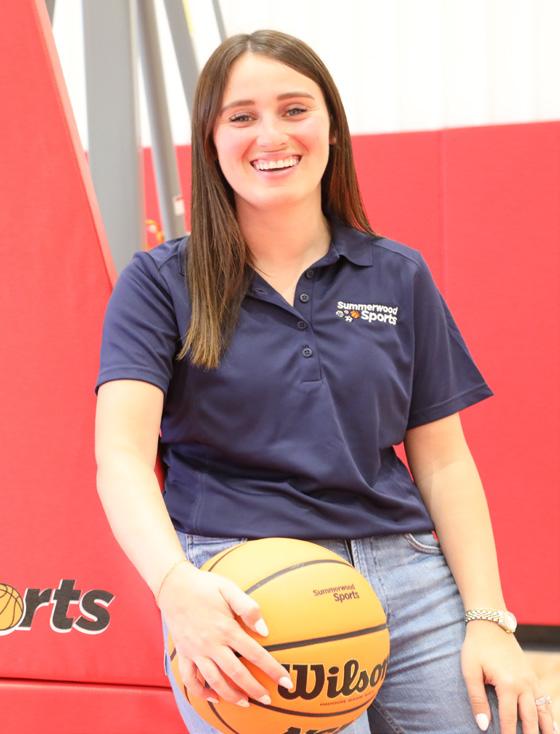
“We want to be a resource for all of Central Arkansas, but especially for the Saline County community,” she said.
In addition to AAU and club ball, the Summerwood gyms are available to be rented out for special events and school functions. And local high school teams use the facility as well, including the Benton High boys basketball team, coached by another Hendrix — Dexter, son of David. Dexter even hosted youth basketball skills camps open to the public on Sundays throughout June and July.
“Our schools have such awesome facilities but they’re so busy with school activities,” he told Fox 16. “To have another place to practice, host games, host camps, basketball volleyball, is just something I think the community has really needed and now they have the opportunity to come here and do it.”
Bryant Mayor Allen Scott, not surprisingly, was happy to work with the Summerwood group on the project.
“The Hendrix family has been integral to Bryant and Saline County for years,” he said. “When they owned the Big Red
stores, they supported local organizations financially and in other ways. Now that they have started Summerwood Sports, they are still contributing. They have constructed a state-of-the-art complex for teams to play volleyball and basketball in Bryant. This will draw people from all over Central Arkansas to Bryant. It will help Bryant and Saline County become a driving force in developing skilled players in volleyball and basketball. I am extremely happy that they continue to be vital members of Bryant and Saline County.”
Bradford said Summerwood checks a much-needed box for Central Arkansas athletes. That may apply especially to kids from Little Rock proper, where facilities are lacking. Bradford expects to draw from all over the region.
“There’s been a lot of interest,” Bradford said, noting that many Little Rock basketball club teams are making the short drive to use the gyms. “And we would expect the same thing with baseball, softball and soccer, if we add those sports.”
Already this summer, Summerwood hosted a Memphis Grizzlies youth basketball summer camp, and a shooting camp led by former Hog great and current Oklahoma City Thunder player Isaiah Joe, was scheduled for Aug. 12.

Summerwood’s two gyms take up but a slice of the 31-acre property that soon will house two more gyms and multiple baseball, softball and soccer fields. Construction on the new gyms is expected to begin in the next few weeks.

In 1950, Maxine Miller was a single woman living in Fayetteville, a bustling college town nestled in the rolling hills of the Ozarks. After borrowing money from her parents, she opened a bar, Maxine’s Tap Room, which has become one of Fayetteville’s iconic downtown spots.
For a woman in the 1950s, borrowing money to open a business was a brave move. And as Maxine’s became part of the local tapestry, Miller became known as a shrewd businesswoman who also was the cashier behind the counter every day from open until close. According to local legend, Miller was a great dominoes player and enforced the bar rules to regulars and guests alike. And she became locally famous for her daily last call: “May I have your attention, please. You have 10 minutes to drink, and get the hell out.”
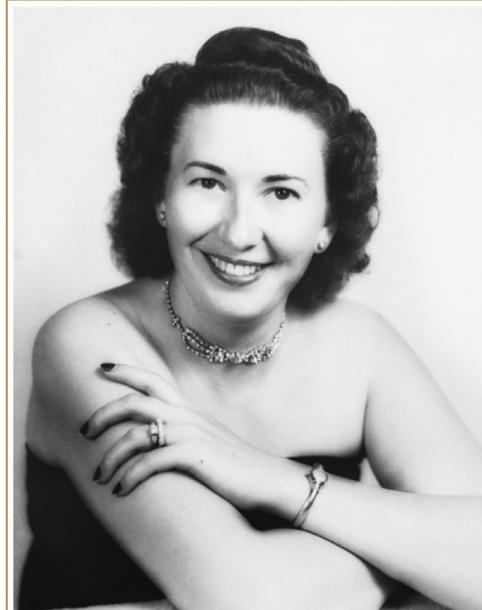
Miller died in 2006 at 82, but Maxine’s Taproom stands as a memorial of sorts, harkening back to past decades. Current caretakers Hannah Withers and her husband, Ben Gitchel, view their roles as keeping Miller’s name and legacy alive, and they collaborate with Andrea Foren, Miller’s great-niece, to do so.
“We are honored to partner with Maxine’s family as caretakers of a place named after a woman who affected, and was adored, by many,” Withers said. “The longer we’re here, the more stories we hear from the many different eras of Maxine’s Tap Room, and we strive to continue the stories and memories made in this very spot
with live music, drinks and friends.”
The duo first became familiar with Maxine’s Tap Room during the 14-year period they owned Little Bread Company, located across the street from the bar. During this time, they met Foren, as many Block Avenue businesses were working with each other to host the annual Block Street Block Party.
“When you work in a bakery, you work really early hours. We would get to our place at 2 a.m. and leave at 2 p.m., and Maxine’s really was the only place open when we were there,” Withers said. “We started hanging out there with our staff from Little Bread Company and we made a lot of memories there.”
Ever since Withers and Gitchel became involved with the landmark bar, they’ve tried to leave their own mark on the Maxine’s lore with a focus on classic and craft cocktails.

“We decided that it made sense to do a throwback to the time that Maxine opened the bar in 1950, and we started with eight classic cocktails that all did really well. It has grown and evolved, snowballing into what it is now,” Withers said.
Currently, the menu includes about 20 cocktails at any given time on both the classic and custom menus. Maxine’s team of bartenders works together to introduce new cocktails, jurying them together and making collective decisions, a process Withers credits for creating a diverse menu.
Though Withers and Gitchel are currently involved in operating the bar, they recognize that the bar will always truly belong to Miller.
“It’s a really cool thing to see so many people bring stories about Maxine’s to us. From ex-employees to parents and students on Alumni Weekend, we hear about so many things that have happened in this space,” Withers said. “This building is a living, breathing thing that has almost nothing to do with us, and our job is to keep Maxine’s relevant and to continue to help the bar resonate with the community.”
The bar was remodeled in 2013, but still contains just as much charm as it did when it was first opened 73 years ago. Withers said Maxine’s has almost a museum feel, capturing the essence of Fayetteville throughout the decades. And in homage to Miller, many of the bar’s original fixtures remain in the building and the walls are decorated with photos of Miller throughout her life.
“One of the best stories about Maxine that I heard was from Mike Malone,” Withers said. “He told the story that his uncle David, who owned Bob’s Photography next door to Maxine’s, would tell him. He said, ‘David and his friends would stop by for happy hour and grab a bag of Fritos for themselves and one for Maxine. She would sit on a bar stool, open the bag of chips and lift it into the ceiling to feed a raccoon trapped in the ceiling.’ We now have a stuffed raccoon that is placed in the ceiling over the front door.”
Maxine’s has always been a popular spot, even before Block Avenue became home to so many dining and shopping destinations. And the new caretakers want to ensure that Maxine’s remains an integral part of the Block Street experience.
“I love that Block Avenue, while it’s changed really quickly, has always been off the main drag of downtown. We are on this sort of in-between Dickson Street and the square, and so because of that, I think a lot of college students don’t really discover us until maybe their senior year, or when they’re graduate students,” Withers said.
“It’s always drawn on an older crowd, and I think the last couple of years has been the first time we’ve really seen a consistent demographic of 21- and 22-year-olds at Maxine’s.”
This phenomenon has been interesting to watch, she said, and also revealed how many customer evolutions Miller must have seen in the 63 years she maintained the space. Withers and Gitchel seemingly are as concerned with archiving the history of Maxine’s Tap Room as they are creating new cocktails.


“My husband and I have started our own businesses from scratch, and both of those are owned by other people who we were happy to pass the torch to,” Withers said. “I think that the fact that Maxine’s bar is still here, and that people are still telling stories about the way it used to be, shows us just how important places like bars and restaurants can be in our social culture downtown.”
Foren and the caretakers have also been working to provide an endowed scholarship in Miller’s name at the University of Arkansas. They started a crowdfunding campaign for the scholarship in May, and according to Withers, the scholarship is close to being endowed. The scholarship includes a partnership with Dr. Lisa Corrigan from the Gender Studies Department at the university.
“I think that it’s a really honorable way to honor a small business owner. Maxine was a community cornerstone for a lot of people,” Withers said.
Recently, Maxine’s partnered with Ozark Beer Company of Rogers for a crowdfunding event in May. The brewery made a legacy lager in Maxine’s name and hosted a few different events in the bar, raising close to $35,000. According to Withers, they are already planning another crowdfunding event next year, and are hoping to have the scholarship fully endowed in a year.
The culture may be changing in Fayetteville but for now, several businesses are working hard to preserve the history of the people who have helped shape the city into what it is today.
“It’s important that people understand the history of our town,” Withers said. “A lot of buildings are changing or are going away, and I think it’s nice to support people who are trying to preserve the integrity of how Fayetteville was a long time ago.
“We’re watching a really good shift in our culture and within the attendance of the university, and I would encourage people to support local music, local businesses and places that make Fayetteville feel like Fayetteville. There’s a reason it is so attractive to all of the people moving here now, and we want to retain as much of that magic as possible.”
[Editor’s note: The original version of this story mischaracterized the relationship of Hannah Withers and Ben Gitchel to Maxine’s. It has been corrected to reflect their role as caretakers.]
Maybe it’s my humble Minnesota upbringing that keeps me from being too boastful.
It could be that I’m generally shy with strangers in public and am not that keen on sharing too much personal information.
Or maybe it’s merely the fact that I really have not had that eventful or exciting a life.
Whatever the reason, I seem to constantly lose in the game of Besting the Other Person’s Story. I don’t just lose. I come in dead last.
You know the game. When people get together and one offers some tale of medical mishaps, financial distress or other claims of mayhem, invariably, someone else will have a personal anecdote of even worse fare.
Not to sound sexist, but women often do this when relating childbirth. One woman may say she was in labor for 16 hours. Another will pipe in and say her childbirth lasted 20 hours and no one at the hospital could find the doctor. Then a third will say she gave birth while in the back of a stalled Honda Accord on a lonely stretch of Kansas highway while packs of coyotes bayed nearby.
And, we have a winner.
I once worked at a newspaper where the “Top This” game was played constantly. I could sneeze and say offhandedly that I must be allergic to pollen in the Arkansas spring air. Our advertising salesperson would then regale us with a tale of her sinus surgery that involved drilling through her nose to alleviate pressure on her sinus cavity.
The fact that I always lose these things was very evident recently when I waited at the Walnut Ridge Amtrak station for my wife’s train to return from her trip to Chicago. I tend to arrive quite early for things like that and, realizing I had at least 45 minutes before the train was scheduled to roll into Lawrence County, I had two options.
I could either sit in the darkened car in the parking lot or I could go into the lit depot and read a while.
I chose the second and anticipated reading the book I
brought with me.
Instead, I found the depot full of travelers … and they were playing Top This.
“I got in a wreck on the road between Biggers and Reyno,” one man said, referring to a stretch of highway in Randolph County. He sat back in the plastic depot chair, smugly as if expecting to win. “They flew me to Memphis in a helicopter, and I died on the way over. They had to shock me back to life.”
The second fellow topped that story, though.
“My car rolled over five times in Clay County once, and it took them two hours to get me out,” he said. “I died twice on the flight to Memphis.”
They then looked at me.
I put my book down and thought.
“A truck once backed into my car in the Walmart parking lot and left a dent in it,” I said meekly.
I paused.
“But I wasn’t in the car when it happened.”
The others stared.
The noise from the frequent freight trains that went through the area stopped. Even the chirping crickets and the constant whine of the gazillion mosquitoes that lived at the station ceased.
“Dang,” the first guy said, shaking his head.
They then returned to their tales of woe.
I’m not sure why people play Top This with negative stories. You’d think they’d rather brag about good things and not disasters. I’d much rather try to top the other person’s story about how much he won in the lottery than how many stitches I may have received during some medical procedure.
Perhaps it’s a lack of self-esteem. If they can’t be better than someone else, maybe they can be worse.
All I know is that if I ever get into a discussion about car wrecks with others, I better have died three times if I want to be a contender for Top This.


When your family needs medical care, you can trust Conway Regional to provide you with the comprehensive care you deserve when you need it most.
Conway Regional Health System is honored to once again be recognized as a Champion of Healthcare. From primary care to specialty care, we offer a seamless referral process, ensuring you get the care you need. Call our patient navigation center at 501-506-CRHS to make an appointment with any provider.

